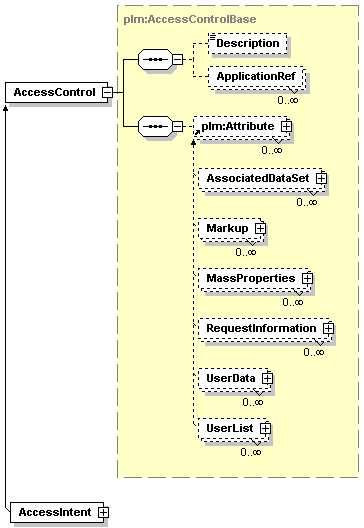
| Name | Type | Use | Default | Fixed | Annotation |
| id | xsd:ID | optional | |||
| attributeRefs | xsd:IDREFS | optional |
<xsd:element name="AccessControl" type="plm:AccessControlBase" substitutionGroup="plm:AttribOwner"/>
| schema location: | C:\sdk\plmxml\schemas\PLMXMLSchema.xsd |
| targetNamespace: | http://www.plmxml.org/Schemas/PLMXMLSchema |
| diagram |  |
||||||||||||||||||
| namespace | http://www.plmxml.org/Schemas/PLMXMLSchema | ||||||||||||||||||
| type | plm:AccessControlBase | ||||||||||||||||||
| children | Description ApplicationRef plm:Attribute | ||||||||||||||||||
| attributes |
|
||||||||||||||||||
| source | <xsd:element name="AccessControl" type="plm:AccessControlBase" substitutionGroup="plm:AttribOwner"/> |
| diagram | 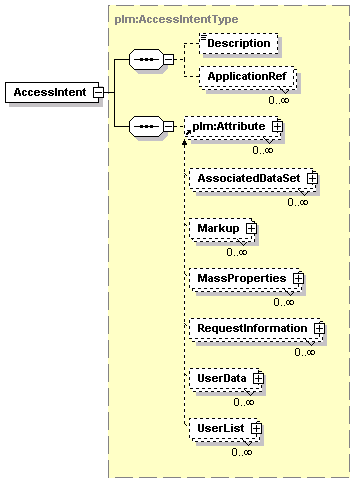 |
||||||||||||||||||||||||||||||
| namespace | http://www.plmxml.org/Schemas/PLMXMLSchema | ||||||||||||||||||||||||||||||
| type | plm:AccessIntentType | ||||||||||||||||||||||||||||||
| children | Description ApplicationRef plm:Attribute | ||||||||||||||||||||||||||||||
| attributes |
|
||||||||||||||||||||||||||||||
| source | <xsd:element name="AccessIntent" type="plm:AccessIntentType" substitutionGroup="plm:AccessControl"/> |
| diagram | 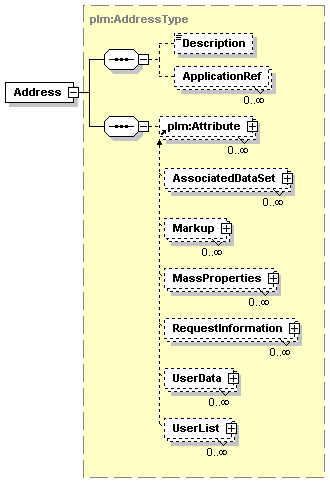 |
||||||||||||||||||||||||||||||||||||||||||||||||||||||||||||||||||||||||
| namespace | http://www.plmxml.org/Schemas/PLMXMLSchema | ||||||||||||||||||||||||||||||||||||||||||||||||||||||||||||||||||||||||
| type | plm:AddressType | ||||||||||||||||||||||||||||||||||||||||||||||||||||||||||||||||||||||||
| children | Description ApplicationRef plm:Attribute | ||||||||||||||||||||||||||||||||||||||||||||||||||||||||||||||||||||||||
| attributes |
|
||||||||||||||||||||||||||||||||||||||||||||||||||||||||||||||||||||||||
| source | <xsd:element name="Address" type="plm:AddressType" substitutionGroup="plm:AttribOwner"/> |
| diagram | 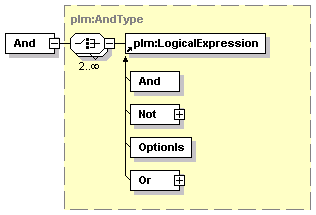 |
| namespace | http://www.plmxml.org/Schemas/PLMXMLSchema |
| type | plm:AndType |
| children | plm:LogicalExpression |
| source | <xsd:element name="And" type="plm:AndType" substitutionGroup="plm:LogicalExpression"/> |
| diagram | 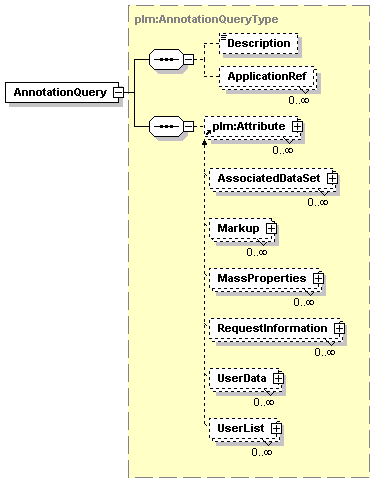 |
||||||||||||||||||||||||
| namespace | http://www.plmxml.org/Schemas/PLMXMLSchema | ||||||||||||||||||||||||
| type | plm:AnnotationQueryType | ||||||||||||||||||||||||
| children | Description ApplicationRef plm:Attribute | ||||||||||||||||||||||||
| attributes |
|
||||||||||||||||||||||||
| source | <xsd:element name="AnnotationQuery" type="plm:AnnotationQueryType" substitutionGroup="plm:Query"/> |
| diagram | 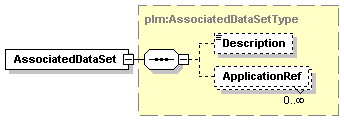 |
||||||||||||||||||||||||
| namespace | http://www.plmxml.org/Schemas/PLMXMLSchema | ||||||||||||||||||||||||
| type | plm:AssociatedDataSetType | ||||||||||||||||||||||||
| children | Description ApplicationRef | ||||||||||||||||||||||||
| attributes |
|
||||||||||||||||||||||||
| source | <xsd:element name="AssociatedDataSet" type="plm:AssociatedDataSetType" substitutionGroup="plm:Attribute"/> |
| diagram |  |
||||||||||||||||||
| namespace | http://www.plmxml.org/Schemas/PLMXMLSchema | ||||||||||||||||||
| type | plm:AttribOwnerBase | ||||||||||||||||||
| children | Description ApplicationRef plm:Attribute | ||||||||||||||||||
| used by |
|
||||||||||||||||||
| attributes |
|
||||||||||||||||||
| source | <xsd:element name="AttribOwner" type="plm:AttribOwnerBase"/> |
| diagram | 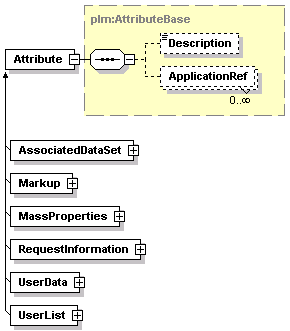 |
||||||||||||
| namespace | http://www.plmxml.org/Schemas/PLMXMLSchema | ||||||||||||
| type | plm:AttributeBase | ||||||||||||
| children | Description ApplicationRef | ||||||||||||
| used by |
|
||||||||||||
| attributes |
|
||||||||||||
| source | <xsd:element name="Attribute" type="plm:AttributeBase"/> |
| diagram | |||||||||||||
| namespace | http://www.plmxml.org/Schemas/PLMXMLSchema | ||||||||||||
| type | plm:AttributeClassBase | ||||||||||||
| attributes |
|
||||||||||||
| source | <xsd:element name="AttributeClass" type="plm:AttributeClassBase"/> |
| diagram | |||||||||||||
| namespace | http://www.plmxml.org/Schemas/PLMXMLSchema | ||||||||||||
| type | plm:AttributeLegalOwnerType | ||||||||||||
| attributes |
|
||||||||||||
| source | <xsd:element name="AttributeLegalOwner" type="plm:AttributeLegalOwnerType"/> |
| diagram | 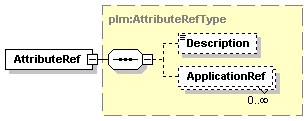 |
||||||||||||||||||||||||||||||||||||||||||||||||||||||
| namespace | http://www.plmxml.org/Schemas/PLMXMLSchema | ||||||||||||||||||||||||||||||||||||||||||||||||||||||
| type | plm:AttributeRefType | ||||||||||||||||||||||||||||||||||||||||||||||||||||||
| children | Description ApplicationRef | ||||||||||||||||||||||||||||||||||||||||||||||||||||||
| attributes |
|
||||||||||||||||||||||||||||||||||||||||||||||||||||||
| source | <xsd:element name="AttributeRef" type="plm:AttributeRefType" substitutionGroup="plm:EntityRef"/> |
| diagram | 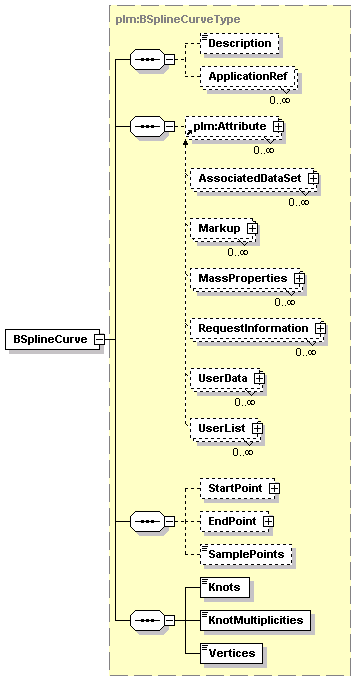 |
||||||||||||||||||||||||||||||||||||||||||||||||||||||||||||||||||||||||
| namespace | http://www.plmxml.org/Schemas/PLMXMLSchema | ||||||||||||||||||||||||||||||||||||||||||||||||||||||||||||||||||||||||
| type | plm:BSplineCurveType | ||||||||||||||||||||||||||||||||||||||||||||||||||||||||||||||||||||||||
| children | Description ApplicationRef plm:Attribute StartPoint EndPoint SamplePoints Knots KnotMultiplicities Vertices | ||||||||||||||||||||||||||||||||||||||||||||||||||||||||||||||||||||||||
| attributes |
|
||||||||||||||||||||||||||||||||||||||||||||||||||||||||||||||||||||||||
| source | <xsd:element name="BSplineCurve" type="plm:BSplineCurveType" substitutionGroup="plm:Curve"/> |
| diagram | 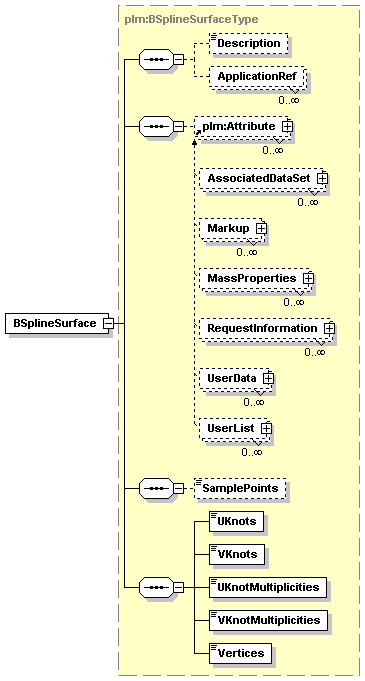 |
||||||||||||||||||||||||||||||||||||||||||||||||||||||||||||||||||||||||||||||||||||||||||||||||||||||||||||
| namespace | http://www.plmxml.org/Schemas/PLMXMLSchema | ||||||||||||||||||||||||||||||||||||||||||||||||||||||||||||||||||||||||||||||||||||||||||||||||||||||||||||
| type | plm:BSplineSurfaceType | ||||||||||||||||||||||||||||||||||||||||||||||||||||||||||||||||||||||||||||||||||||||||||||||||||||||||||||
| children | Description ApplicationRef plm:Attribute SamplePoints UKnots VKnots UKnotMultiplicities VKnotMultiplicities Vertices | ||||||||||||||||||||||||||||||||||||||||||||||||||||||||||||||||||||||||||||||||||||||||||||||||||||||||||||
| attributes |
|
||||||||||||||||||||||||||||||||||||||||||||||||||||||||||||||||||||||||||||||||||||||||||||||||||||||||||||
| source | <xsd:element name="BSplineSurface" type="plm:BSplineSurfaceType" substitutionGroup="plm:Surface"/> |
| diagram | |||||||||||||
| namespace | http://www.plmxml.org/Schemas/PLMXMLSchema | ||||||||||||
| type | plm:CheckMessageType | ||||||||||||
| used by |
|
||||||||||||
| attributes |
|
||||||||||||
| source | <xsd:element name="CheckMessage" type="plm:CheckMessageType" substitutionGroup="plm:Message"/> |
| diagram | 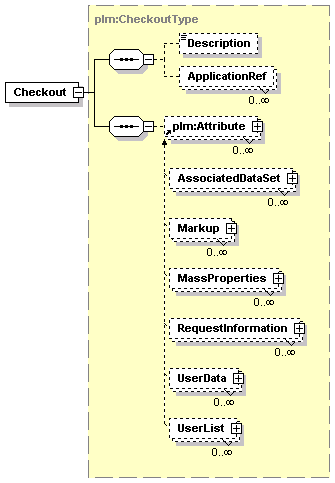 |
||||||||||||||||||||||||||||||
| namespace | http://www.plmxml.org/Schemas/PLMXMLSchema | ||||||||||||||||||||||||||||||
| type | plm:CheckoutType | ||||||||||||||||||||||||||||||
| children | Description ApplicationRef plm:Attribute | ||||||||||||||||||||||||||||||
| attributes |
|
||||||||||||||||||||||||||||||
| source | <xsd:element name="Checkout" type="plm:CheckoutType" substitutionGroup="plm:CheckoutStatus"/> |
| diagram | 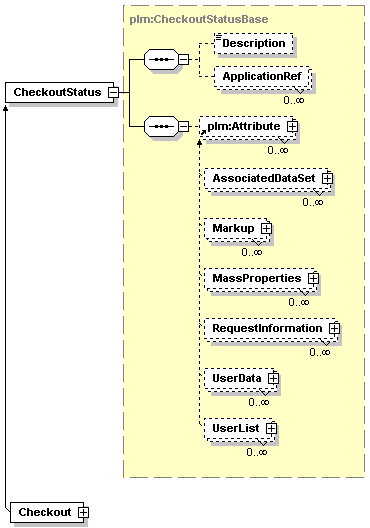 |
||||||||||||||||||
| namespace | http://www.plmxml.org/Schemas/PLMXMLSchema | ||||||||||||||||||
| type | plm:CheckoutStatusBase | ||||||||||||||||||
| children | Description ApplicationRef plm:Attribute | ||||||||||||||||||
| attributes |
|
||||||||||||||||||
| source | <xsd:element name="CheckoutStatus" type="plm:CheckoutStatusBase" substitutionGroup="plm:AttribOwner"/> |
| diagram | 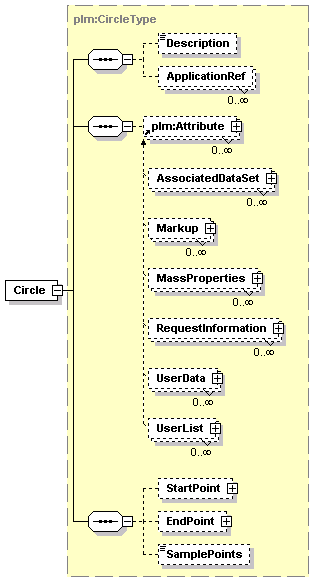 |
||||||||||||||||||||||||||||||||||||||||||||||||||||||||||||
| namespace | http://www.plmxml.org/Schemas/PLMXMLSchema | ||||||||||||||||||||||||||||||||||||||||||||||||||||||||||||
| type | plm:CircleType | ||||||||||||||||||||||||||||||||||||||||||||||||||||||||||||
| children | Description ApplicationRef plm:Attribute StartPoint EndPoint SamplePoints | ||||||||||||||||||||||||||||||||||||||||||||||||||||||||||||
| attributes |
|
||||||||||||||||||||||||||||||||||||||||||||||||||||||||||||
| source | <xsd:element name="Circle" type="plm:CircleType" substitutionGroup="plm:Curve"/> |
| diagram | 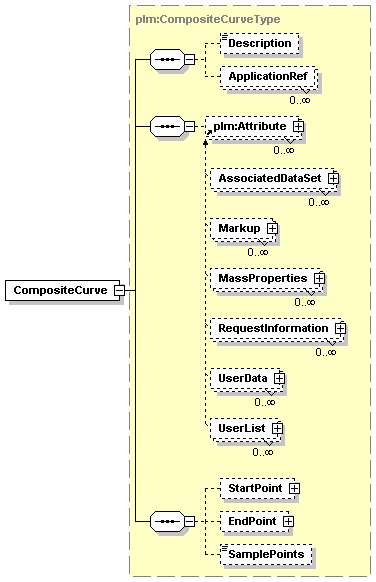 |
||||||||||||||||||||||||||||||||||||||||||||||||
| namespace | http://www.plmxml.org/Schemas/PLMXMLSchema | ||||||||||||||||||||||||||||||||||||||||||||||||
| type | plm:CompositeCurveType | ||||||||||||||||||||||||||||||||||||||||||||||||
| children | Description ApplicationRef plm:Attribute StartPoint EndPoint SamplePoints | ||||||||||||||||||||||||||||||||||||||||||||||||
| attributes |
|
||||||||||||||||||||||||||||||||||||||||||||||||
| source | <xsd:element name="CompositeCurve" type="plm:CompositeCurveType" substitutionGroup="plm:Curve"/> |
| diagram | 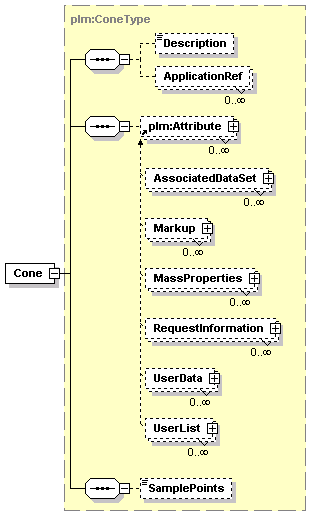 |
||||||||||||||||||||||||||||||||||||||||||||||||||||||||||||||||||||||||||||||
| namespace | http://www.plmxml.org/Schemas/PLMXMLSchema | ||||||||||||||||||||||||||||||||||||||||||||||||||||||||||||||||||||||||||||||
| type | plm:ConeType | ||||||||||||||||||||||||||||||||||||||||||||||||||||||||||||||||||||||||||||||
| children | Description ApplicationRef plm:Attribute SamplePoints | ||||||||||||||||||||||||||||||||||||||||||||||||||||||||||||||||||||||||||||||
| attributes |
|
||||||||||||||||||||||||||||||||||||||||||||||||||||||||||||||||||||||||||||||
| source | <xsd:element name="Cone" type="plm:ConeType" substitutionGroup="plm:Surface"/> |
| diagram | 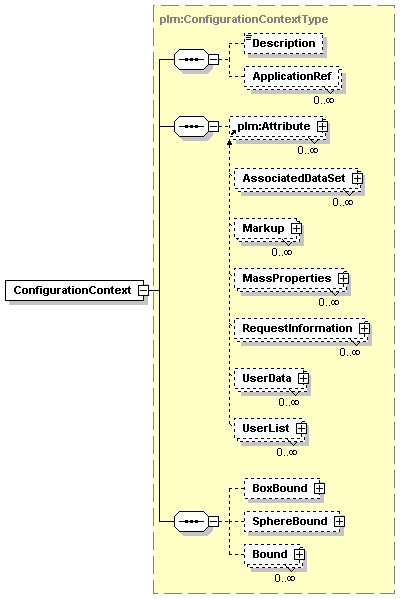 |
||||||||||||||||||||||||||||||||||||||||||||||||
| namespace | http://www.plmxml.org/Schemas/PLMXMLSchema | ||||||||||||||||||||||||||||||||||||||||||||||||
| type | plm:ConfigurationContextType | ||||||||||||||||||||||||||||||||||||||||||||||||
| children | Description ApplicationRef plm:Attribute BoxBound SphereBound Bound | ||||||||||||||||||||||||||||||||||||||||||||||||
| attributes |
|
||||||||||||||||||||||||||||||||||||||||||||||||
| source | <xsd:element name="ConfigurationContext" type="plm:ConfigurationContextType" substitutionGroup="plm:Managed"/> |
| diagram | 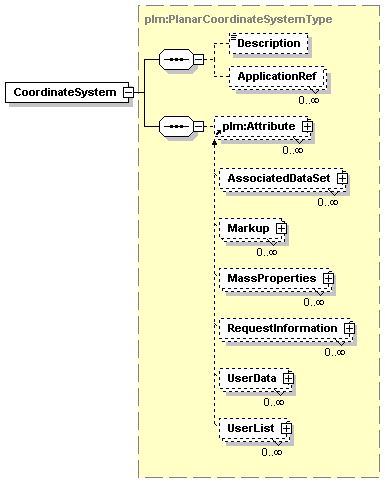 |
||||||||||||||||||||||||||||||||||||||||||
| namespace | http://www.plmxml.org/Schemas/PLMXMLSchema | ||||||||||||||||||||||||||||||||||||||||||
| type | plm:PlanarCoordinateSystemType | ||||||||||||||||||||||||||||||||||||||||||
| children | Description ApplicationRef plm:Attribute | ||||||||||||||||||||||||||||||||||||||||||
| used by |
|
||||||||||||||||||||||||||||||||||||||||||
| attributes |
|
||||||||||||||||||||||||||||||||||||||||||
| source | <xsd:element name="CoordinateSystem" type="plm:PlanarCoordinateSystemType"/> |
| diagram | 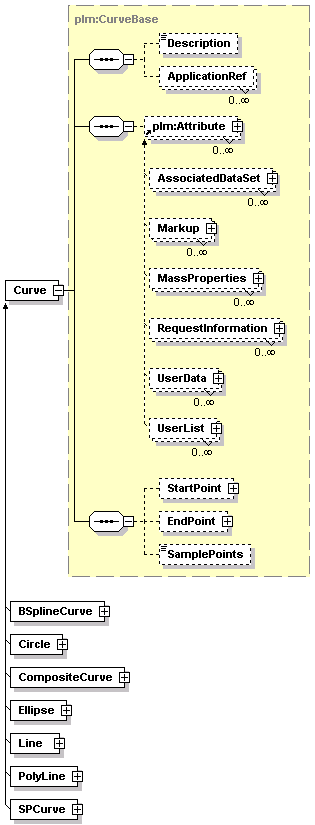 |
||||||||||||||||||||||||||||||||||||
| namespace | http://www.plmxml.org/Schemas/PLMXMLSchema | ||||||||||||||||||||||||||||||||||||
| type | plm:CurveBase | ||||||||||||||||||||||||||||||||||||
| children | Description ApplicationRef plm:Attribute StartPoint EndPoint SamplePoints | ||||||||||||||||||||||||||||||||||||
| used by |
|
||||||||||||||||||||||||||||||||||||
| attributes |
|
||||||||||||||||||||||||||||||||||||
| source | <xsd:element name="Curve" type="plm:CurveBase"/> |
| diagram | 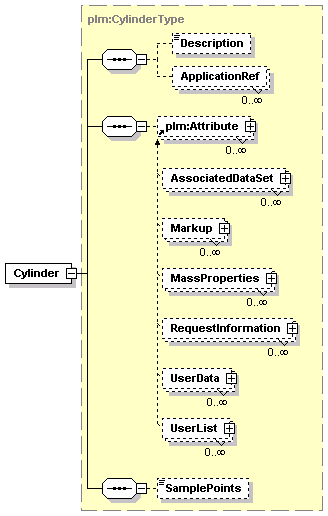 |
||||||||||||||||||||||||||||||||||||||||||||||||||||||||||||||||||||||||
| namespace | http://www.plmxml.org/Schemas/PLMXMLSchema | ||||||||||||||||||||||||||||||||||||||||||||||||||||||||||||||||||||||||
| type | plm:CylinderType | ||||||||||||||||||||||||||||||||||||||||||||||||||||||||||||||||||||||||
| children | Description ApplicationRef plm:Attribute SamplePoints | ||||||||||||||||||||||||||||||||||||||||||||||||||||||||||||||||||||||||
| attributes |
|
||||||||||||||||||||||||||||||||||||||||||||||||||||||||||||||||||||||||
| source | <xsd:element name="Cylinder" type="plm:CylinderType" substitutionGroup="plm:Surface"/> |
| diagram | 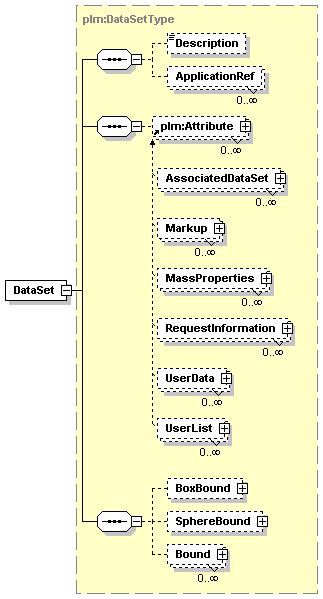 |
||||||||||||||||||||||||||||||||||||||||||||||||||||||||||||||||||
| namespace | http://www.plmxml.org/Schemas/PLMXMLSchema | ||||||||||||||||||||||||||||||||||||||||||||||||||||||||||||||||||
| type | plm:DataSetType | ||||||||||||||||||||||||||||||||||||||||||||||||||||||||||||||||||
| children | Description ApplicationRef plm:Attribute BoxBound SphereBound Bound | ||||||||||||||||||||||||||||||||||||||||||||||||||||||||||||||||||
| attributes |
|
||||||||||||||||||||||||||||||||||||||||||||||||||||||||||||||||||
| source | <xsd:element name="DataSet" type="plm:DataSetType" substitutionGroup="plm:AttribOwner"/> |
| diagram | 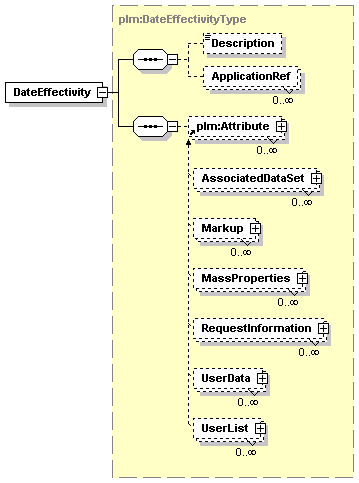 |
||||||||||||||||||||||||||||||||||||
| namespace | http://www.plmxml.org/Schemas/PLMXMLSchema | ||||||||||||||||||||||||||||||||||||
| type | plm:DateEffectivityType | ||||||||||||||||||||||||||||||||||||
| children | Description ApplicationRef plm:Attribute | ||||||||||||||||||||||||||||||||||||
| attributes |
|
||||||||||||||||||||||||||||||||||||
| source | <xsd:element name="DateEffectivity" type="plm:DateEffectivityType" substitutionGroup="plm:Effectivity"/> |
| diagram | 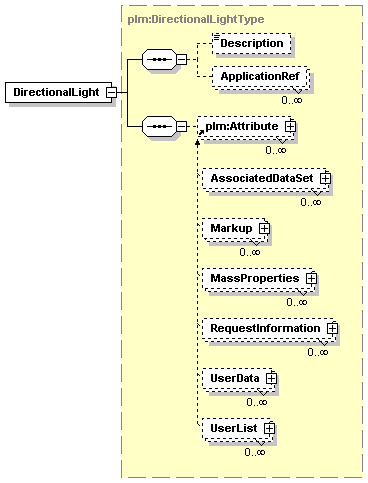 |
||||||||||||||||||||||||||||||||||||||||||||||||||||||
| namespace | http://www.plmxml.org/Schemas/PLMXMLSchema | ||||||||||||||||||||||||||||||||||||||||||||||||||||||
| type | plm:DirectionalLightType | ||||||||||||||||||||||||||||||||||||||||||||||||||||||
| children | Description ApplicationRef plm:Attribute | ||||||||||||||||||||||||||||||||||||||||||||||||||||||
| attributes |
|
||||||||||||||||||||||||||||||||||||||||||||||||||||||
| source | <xsd:element name="DirectionalLight" type="plm:DirectionalLightType" substitutionGroup="plm:LightSource"/> |
| diagram | 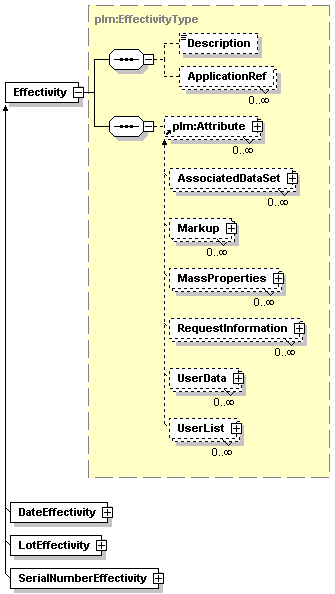 |
||||||||||||||||||||||||
| namespace | http://www.plmxml.org/Schemas/PLMXMLSchema | ||||||||||||||||||||||||
| type | plm:EffectivityType | ||||||||||||||||||||||||
| children | Description ApplicationRef plm:Attribute | ||||||||||||||||||||||||
| attributes |
|
||||||||||||||||||||||||
| source | <xsd:element name="Effectivity" type="plm:EffectivityType" substitutionGroup="plm:AttribOwner"/> |
| diagram | 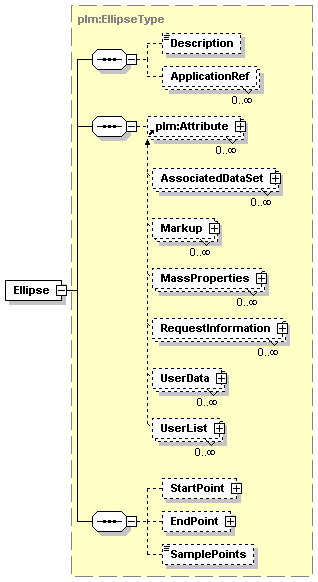 |
||||||||||||||||||||||||||||||||||||||||||||||||||||||||||||||||||
| namespace | http://www.plmxml.org/Schemas/PLMXMLSchema | ||||||||||||||||||||||||||||||||||||||||||||||||||||||||||||||||||
| type | plm:EllipseType | ||||||||||||||||||||||||||||||||||||||||||||||||||||||||||||||||||
| children | Description ApplicationRef plm:Attribute StartPoint EndPoint SamplePoints | ||||||||||||||||||||||||||||||||||||||||||||||||||||||||||||||||||
| attributes |
|
||||||||||||||||||||||||||||||||||||||||||||||||||||||||||||||||||
| source | <xsd:element name="Ellipse" type="plm:EllipseType" substitutionGroup="plm:Curve"/> |
| diagram | 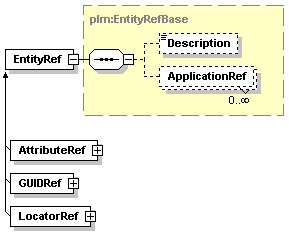 |
||||||||||||||||||||||||||||||
| namespace | http://www.plmxml.org/Schemas/PLMXMLSchema | ||||||||||||||||||||||||||||||
| type | plm:EntityRefBase | ||||||||||||||||||||||||||||||
| children | Description ApplicationRef | ||||||||||||||||||||||||||||||
| used by |
|
||||||||||||||||||||||||||||||
| attributes |
|
||||||||||||||||||||||||||||||
| source | <xsd:element name="EntityRef" type="plm:EntityRefBase"/> |
| diagram | 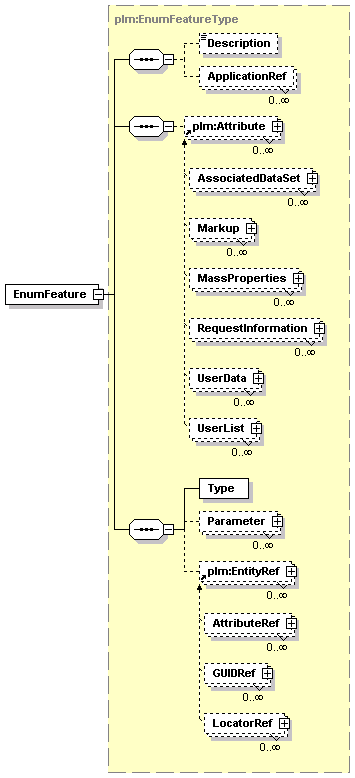 |
||||||||||||||||||||||||||||||||||||||||||||||||||||||
| namespace | http://www.plmxml.org/Schemas/PLMXMLSchema | ||||||||||||||||||||||||||||||||||||||||||||||||||||||
| type | plm:EnumFeatureType | ||||||||||||||||||||||||||||||||||||||||||||||||||||||
| children | Description ApplicationRef plm:Attribute Type Parameter plm:EntityRef | ||||||||||||||||||||||||||||||||||||||||||||||||||||||
| attributes |
|
||||||||||||||||||||||||||||||||||||||||||||||||||||||
| source | <xsd:element name="EnumFeature" type="plm:EnumFeatureType" substitutionGroup="plm:Feature"/> |
| diagram | |||||||||||||
| namespace | http://www.plmxml.org/Schemas/PLMXMLSchema | ||||||||||||
| type | plm:ErrorMessageType | ||||||||||||
| attributes |
|
||||||||||||
| source | <xsd:element name="ErrorMessage" type="plm:ErrorMessageType" substitutionGroup="plm:Message"/> |
| diagram | 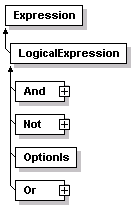 |
| namespace | http://www.plmxml.org/Schemas/PLMXMLSchema |
| type | plm:ExpressionBase |
| source | <xsd:element name="Expression" type="plm:ExpressionBase" substitutionGroup="plm:Operand"/> |
| diagram | 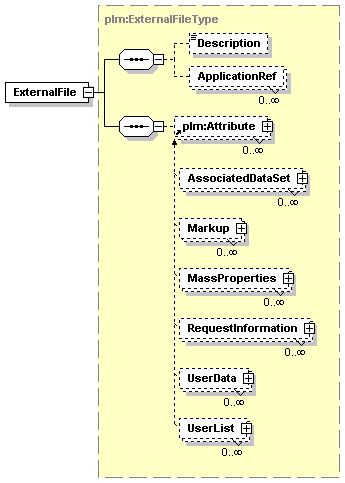 |
||||||||||||||||||||||||||||||
| namespace | http://www.plmxml.org/Schemas/PLMXMLSchema | ||||||||||||||||||||||||||||||
| type | plm:ExternalFileType | ||||||||||||||||||||||||||||||
| children | Description ApplicationRef plm:Attribute | ||||||||||||||||||||||||||||||
| attributes |
|
||||||||||||||||||||||||||||||
| source | <xsd:element name="ExternalFile" type="plm:ExternalFileType" substitutionGroup="plm:AttribOwner"/> |
| diagram | 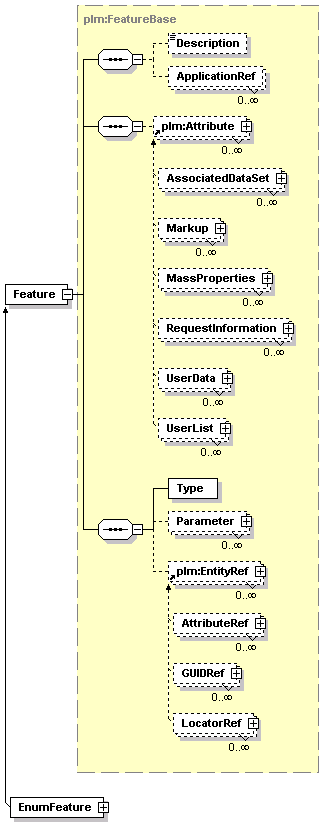 |
||||||||||||||||||||||||||||||||||||||||||||||||||||||
| namespace | http://www.plmxml.org/Schemas/PLMXMLSchema | ||||||||||||||||||||||||||||||||||||||||||||||||||||||
| type | plm:FeatureBase | ||||||||||||||||||||||||||||||||||||||||||||||||||||||
| children | Description ApplicationRef plm:Attribute Type Parameter plm:EntityRef | ||||||||||||||||||||||||||||||||||||||||||||||||||||||
| used by |
|
||||||||||||||||||||||||||||||||||||||||||||||||||||||
| attributes |
|
||||||||||||||||||||||||||||||||||||||||||||||||||||||
| source | <xsd:element name="Feature" type="plm:FeatureBase"/> |
| diagram | 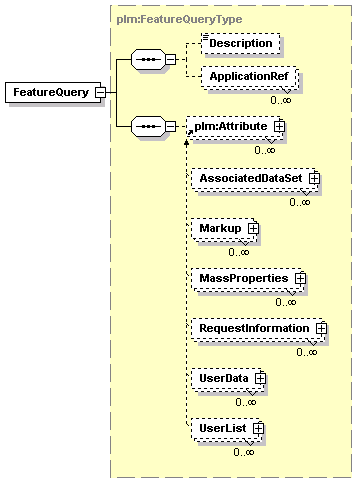 |
||||||||||||||||||||||||
| namespace | http://www.plmxml.org/Schemas/PLMXMLSchema | ||||||||||||||||||||||||
| type | plm:FeatureQueryType | ||||||||||||||||||||||||
| children | Description ApplicationRef plm:Attribute | ||||||||||||||||||||||||
| attributes |
|
||||||||||||||||||||||||
| source | <xsd:element name="FeatureQuery" type="plm:FeatureQueryType" substitutionGroup="plm:Query"/> |
| diagram | 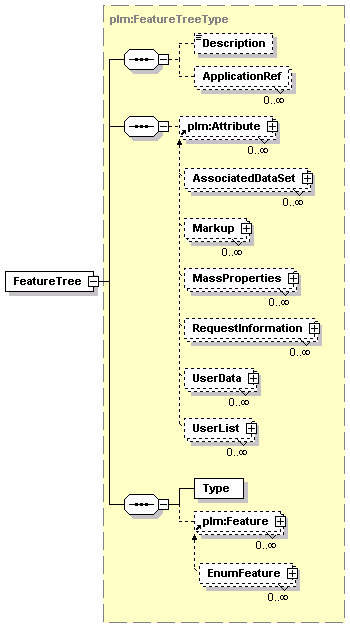 |
||||||||||||||||||||||||||||||||||||
| namespace | http://www.plmxml.org/Schemas/PLMXMLSchema | ||||||||||||||||||||||||||||||||||||
| type | plm:FeatureTreeType | ||||||||||||||||||||||||||||||||||||
| children | Description ApplicationRef plm:Attribute Type plm:Feature | ||||||||||||||||||||||||||||||||||||
| attributes |
|
||||||||||||||||||||||||||||||||||||
| source | <xsd:element name="FeatureTree" type="plm:FeatureTreeType" substitutionGroup="plm:InternalRep"/> |
| diagram | |||||||||||||||||||
| namespace | http://www.plmxml.org/Schemas/PLMXMLSchema | ||||||||||||||||||
| type | plm:FixType | ||||||||||||||||||
| attributes |
|
||||||||||||||||||
| source | <xsd:element name="Fix" type="plm:FixType" substitutionGroup="plm:Statement"/> |
| diagram | 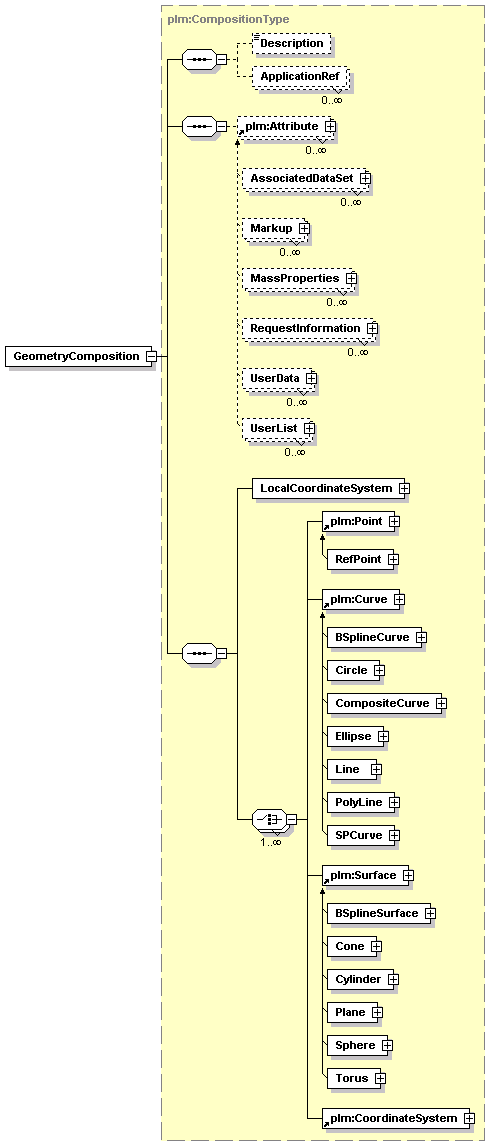 |
||||||||||||||||||||||||
| namespace | http://www.plmxml.org/Schemas/PLMXMLSchema | ||||||||||||||||||||||||
| type | plm:CompositionType | ||||||||||||||||||||||||
| children | Description ApplicationRef plm:Attribute LocalCoordinateSystem plm:Point plm:Curve plm:Surface plm:CoordinateSystem | ||||||||||||||||||||||||
| used by |
|
||||||||||||||||||||||||
| attributes |
|
||||||||||||||||||||||||
| source | <xsd:element name="GeometryComposition" type="plm:CompositionType"/> |
| diagram | 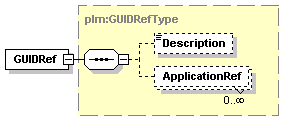 |
||||||||||||||||||||||||||||||||||||
| namespace | http://www.plmxml.org/Schemas/PLMXMLSchema | ||||||||||||||||||||||||||||||||||||
| type | plm:GUIDRefType | ||||||||||||||||||||||||||||||||||||
| children | Description ApplicationRef | ||||||||||||||||||||||||||||||||||||
| attributes |
|
||||||||||||||||||||||||||||||||||||
| source | <xsd:element name="GUIDRef" type="plm:GUIDRefType" substitutionGroup="plm:EntityRef"/> |
| diagram | 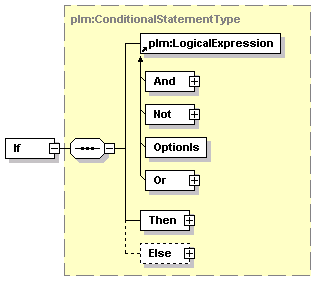 |
| namespace | http://www.plmxml.org/Schemas/PLMXMLSchema |
| type | plm:ConditionalStatementType |
| children | plm:LogicalExpression Then Else |
| source | <xsd:element name="If" type="plm:ConditionalStatementType" substitutionGroup="plm:Statement"/> |
| diagram | |||||||||||||
| namespace | http://www.plmxml.org/Schemas/PLMXMLSchema | ||||||||||||
| type | plm:InformMessageType | ||||||||||||
| attributes |
|
||||||||||||
| source | <xsd:element name="InformMessage" type="plm:InformMessageType" substitutionGroup="plm:Message"/> |
| diagram | 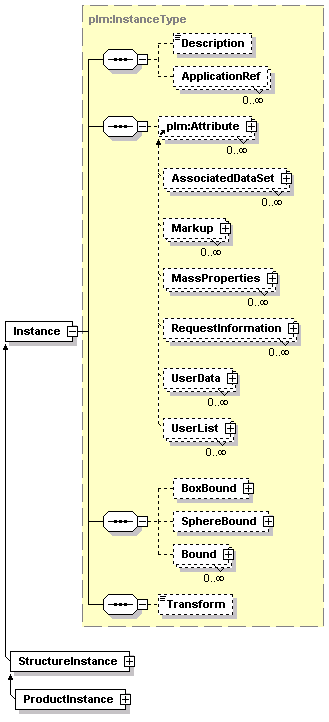 |
||||||||||||||||||||||||||||||||||||||||||||||||||||||||||||||||||||||||||||||||||||||||||
| namespace | http://www.plmxml.org/Schemas/PLMXMLSchema | ||||||||||||||||||||||||||||||||||||||||||||||||||||||||||||||||||||||||||||||||||||||||||
| type | plm:InstanceType | ||||||||||||||||||||||||||||||||||||||||||||||||||||||||||||||||||||||||||||||||||||||||||
| children | Description ApplicationRef plm:Attribute BoxBound SphereBound Bound Transform | ||||||||||||||||||||||||||||||||||||||||||||||||||||||||||||||||||||||||||||||||||||||||||
| used by |
|
||||||||||||||||||||||||||||||||||||||||||||||||||||||||||||||||||||||||||||||||||||||||||
| attributes |
|
||||||||||||||||||||||||||||||||||||||||||||||||||||||||||||||||||||||||||||||||||||||||||
| source | <xsd:element name="Instance" type="plm:InstanceType" substitutionGroup="plm:Managed"/> |
| diagram | 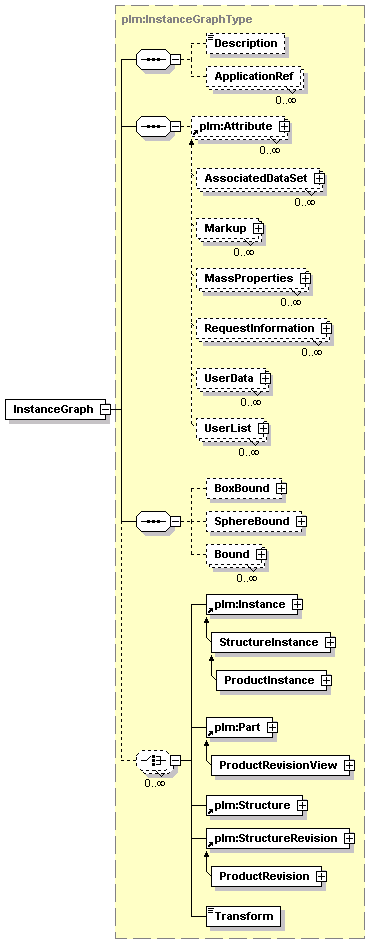 |
||||||||||||||||||||||||||||||||||||||||||
| namespace | http://www.plmxml.org/Schemas/PLMXMLSchema | ||||||||||||||||||||||||||||||||||||||||||
| type | plm:InstanceGraphType | ||||||||||||||||||||||||||||||||||||||||||
| children | Description ApplicationRef plm:Attribute BoxBound SphereBound Bound plm:Instance plm:Part plm:Structure plm:StructureRevision Transform | ||||||||||||||||||||||||||||||||||||||||||
| used by |
|
||||||||||||||||||||||||||||||||||||||||||
| attributes |
|
||||||||||||||||||||||||||||||||||||||||||
| source | <xsd:element name="InstanceGraph" type="plm:InstanceGraphType"/> |
| diagram | 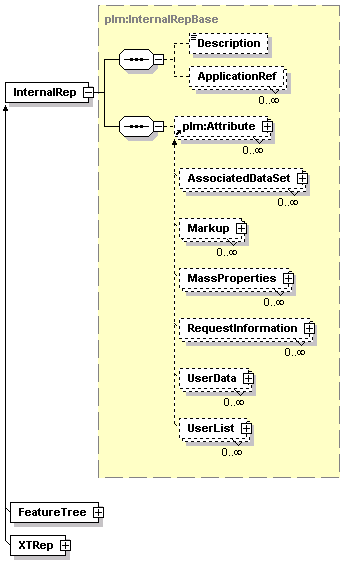 |
||||||||||||||||||
| namespace | http://www.plmxml.org/Schemas/PLMXMLSchema | ||||||||||||||||||
| type | plm:InternalRepBase | ||||||||||||||||||
| children | Description ApplicationRef plm:Attribute | ||||||||||||||||||
| used by |
|
||||||||||||||||||
| attributes |
|
||||||||||||||||||
| source | <xsd:element name="InternalRep" type="plm:InternalRepBase"/> |
| diagram | 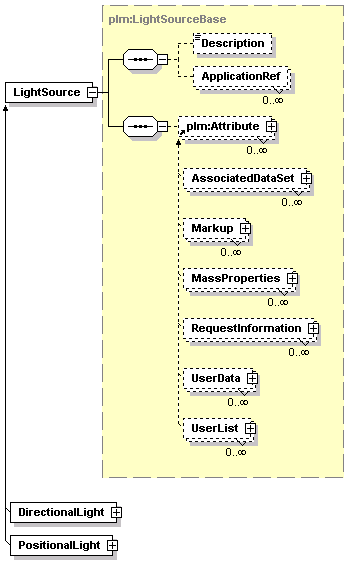 |
||||||||||||||||||||||||||||||||||||||||||||||||
| namespace | http://www.plmxml.org/Schemas/PLMXMLSchema | ||||||||||||||||||||||||||||||||||||||||||||||||
| type | plm:LightSourceBase | ||||||||||||||||||||||||||||||||||||||||||||||||
| children | Description ApplicationRef plm:Attribute | ||||||||||||||||||||||||||||||||||||||||||||||||
| used by |
|
||||||||||||||||||||||||||||||||||||||||||||||||
| attributes |
|
||||||||||||||||||||||||||||||||||||||||||||||||
| source | <xsd:element name="LightSource" type="plm:LightSourceBase"/> |
| diagram | 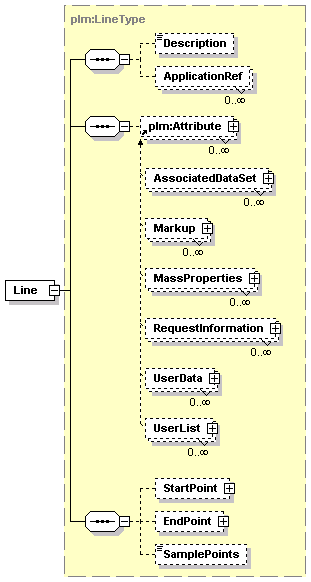 |
||||||||||||||||||||||||||||||||||||||||||||||||
| namespace | http://www.plmxml.org/Schemas/PLMXMLSchema | ||||||||||||||||||||||||||||||||||||||||||||||||
| type | plm:LineType | ||||||||||||||||||||||||||||||||||||||||||||||||
| children | Description ApplicationRef plm:Attribute StartPoint EndPoint SamplePoints | ||||||||||||||||||||||||||||||||||||||||||||||||
| attributes |
|
||||||||||||||||||||||||||||||||||||||||||||||||
| source | <xsd:element name="Line" type="plm:LineType" substitutionGroup="plm:Curve"/> |
| diagram | 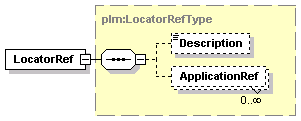 |
||||||||||||||||||||||||||||||||||||||||||
| namespace | http://www.plmxml.org/Schemas/PLMXMLSchema | ||||||||||||||||||||||||||||||||||||||||||
| type | plm:LocatorRefType | ||||||||||||||||||||||||||||||||||||||||||
| children | Description ApplicationRef | ||||||||||||||||||||||||||||||||||||||||||
| attributes |
|
||||||||||||||||||||||||||||||||||||||||||
| source | <xsd:element name="LocatorRef" type="plm:LocatorRefType" substitutionGroup="plm:EntityRef"/> |
| diagram | 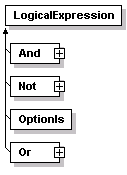 |
||
| namespace | http://www.plmxml.org/Schemas/PLMXMLSchema | ||
| type | plm:LogicalExpressionBase | ||
| used by |
|
||
| source | <xsd:element name="LogicalExpression" type="plm:LogicalExpressionBase" substitutionGroup="plm:Expression"/> |
| diagram | 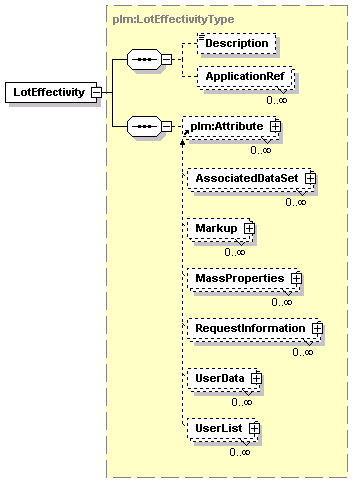 |
||||||||||||||||||||||||||||||
| namespace | http://www.plmxml.org/Schemas/PLMXMLSchema | ||||||||||||||||||||||||||||||
| type | plm:LotEffectivityType | ||||||||||||||||||||||||||||||
| children | Description ApplicationRef plm:Attribute | ||||||||||||||||||||||||||||||
| attributes |
|
||||||||||||||||||||||||||||||
| source | <xsd:element name="LotEffectivity" type="plm:LotEffectivityType" substitutionGroup="plm:Effectivity"/> |
| diagram |  |
||||||||||||||||||||||||||||||||||||
| namespace | http://www.plmxml.org/Schemas/PLMXMLSchema | ||||||||||||||||||||||||||||||||||||
| type | plm:ManagedBase | ||||||||||||||||||||||||||||||||||||
| children | Description ApplicationRef plm:Attribute BoxBound SphereBound Bound | ||||||||||||||||||||||||||||||||||||
| attributes |
|
||||||||||||||||||||||||||||||||||||
| source | <xsd:element name="Managed" type="plm:ManagedBase" substitutionGroup="plm:Properties"/> |
| diagram | 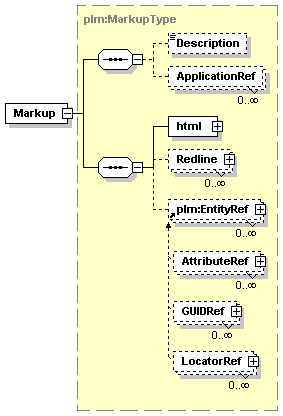 |
||||||||||||||||||||||||||||||
| namespace | http://www.plmxml.org/Schemas/PLMXMLSchema | ||||||||||||||||||||||||||||||
| type | plm:MarkupType | ||||||||||||||||||||||||||||||
| children | Description ApplicationRef html Redline plm:EntityRef | ||||||||||||||||||||||||||||||
| attributes |
|
||||||||||||||||||||||||||||||
| source | <xsd:element name="Markup" type="plm:MarkupType" substitutionGroup="plm:Attribute"/> |
| diagram | 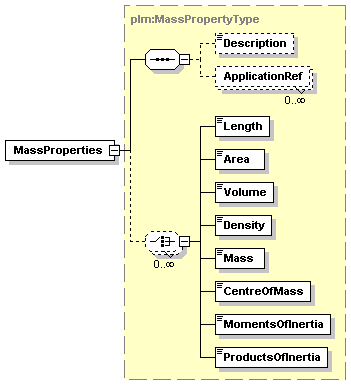 |
||||||||||||||||||
| namespace | http://www.plmxml.org/Schemas/PLMXMLSchema | ||||||||||||||||||
| type | plm:MassPropertyType | ||||||||||||||||||
| children | Description ApplicationRef Length Area Volume Density Mass CentreOfMass MomentsOfInertia ProductsOfInertia | ||||||||||||||||||
| attributes |
|
||||||||||||||||||
| source | <xsd:element name="MassProperties" type="plm:MassPropertyType" substitutionGroup="plm:Attribute"/> |
| diagram | 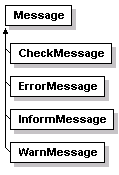 |
| namespace | http://www.plmxml.org/Schemas/PLMXMLSchema |
| type | plm:MessageBase |
| source | <xsd:element name="Message" type="plm:MessageBase" substitutionGroup="plm:Statement"/> |
| diagram | 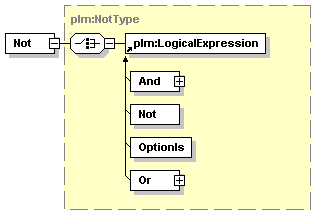 |
| namespace | http://www.plmxml.org/Schemas/PLMXMLSchema |
| type | plm:NotType |
| children | plm:LogicalExpression |
| source | <xsd:element name="Not" type="plm:NotType" substitutionGroup="plm:LogicalExpression"/> |
| diagram | 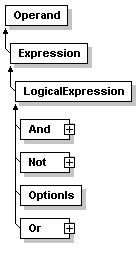 |
| namespace | http://www.plmxml.org/Schemas/PLMXMLSchema |
| type | plm:OperandBase |
| source | <xsd:element name="Operand" type="plm:OperandBase"/> |
| diagram | 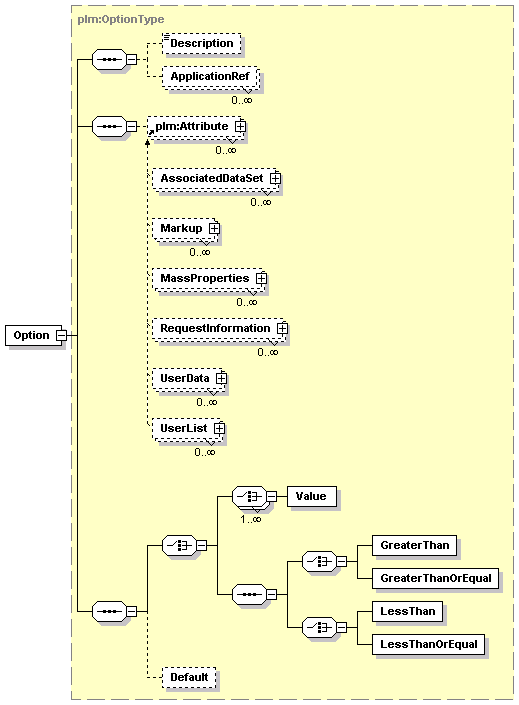 |
||||||||||||||||||||||||||||||||||||
| namespace | http://www.plmxml.org/Schemas/PLMXMLSchema | ||||||||||||||||||||||||||||||||||||
| type | plm:OptionType | ||||||||||||||||||||||||||||||||||||
| children | Description ApplicationRef plm:Attribute Value GreaterThan GreaterThanOrEqual LessThan LessThanOrEqual Default | ||||||||||||||||||||||||||||||||||||
| attributes |
|
||||||||||||||||||||||||||||||||||||
| source | <xsd:element name="Option" type="plm:OptionType" substitutionGroup="plm:AttribOwner"/> |
| diagram | |||||||||||||||||||||||||
| namespace | http://www.plmxml.org/Schemas/PLMXMLSchema | ||||||||||||||||||||||||
| type | plm:OptionIsType | ||||||||||||||||||||||||
| attributes |
|
||||||||||||||||||||||||
| source | <xsd:element name="OptionIs" type="plm:OptionIsType" substitutionGroup="plm:LogicalExpression"/> |
| diagram | 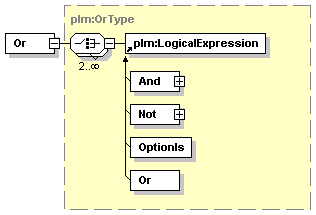 |
| namespace | http://www.plmxml.org/Schemas/PLMXMLSchema |
| type | plm:OrType |
| children | plm:LogicalExpression |
| source | <xsd:element name="Or" type="plm:OrType" substitutionGroup="plm:LogicalExpression"/> |
| diagram | 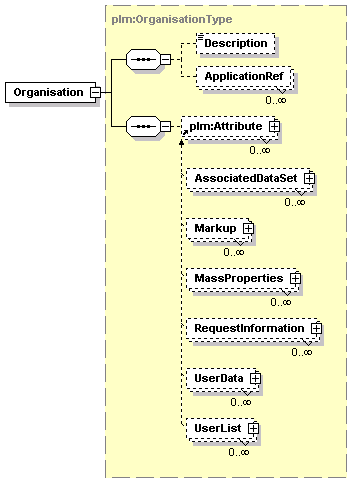 |
||||||||||||||||||||||||||||||||||||
| namespace | http://www.plmxml.org/Schemas/PLMXMLSchema | ||||||||||||||||||||||||||||||||||||
| type | plm:OrganisationType | ||||||||||||||||||||||||||||||||||||
| children | Description ApplicationRef plm:Attribute | ||||||||||||||||||||||||||||||||||||
| attributes |
|
||||||||||||||||||||||||||||||||||||
| source | <xsd:element name="Organisation" type="plm:OrganisationType" substitutionGroup="plm:Owner"/> |
| diagram | 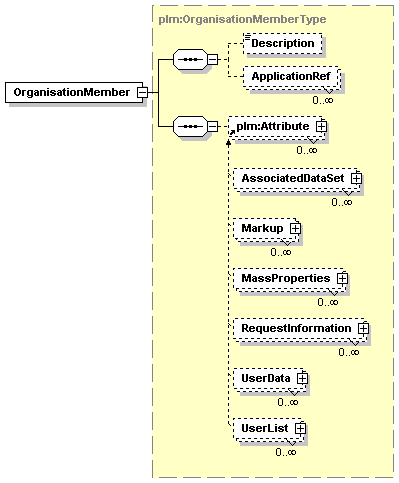 |
||||||||||||||||||||||||||||||||||||
| namespace | http://www.plmxml.org/Schemas/PLMXMLSchema | ||||||||||||||||||||||||||||||||||||
| type | plm:OrganisationMemberType | ||||||||||||||||||||||||||||||||||||
| children | Description ApplicationRef plm:Attribute | ||||||||||||||||||||||||||||||||||||
| attributes |
|
||||||||||||||||||||||||||||||||||||
| source | <xsd:element name="OrganisationMember" type="plm:OrganisationMemberType" substitutionGroup="plm:AttribOwner"/> |
| diagram | 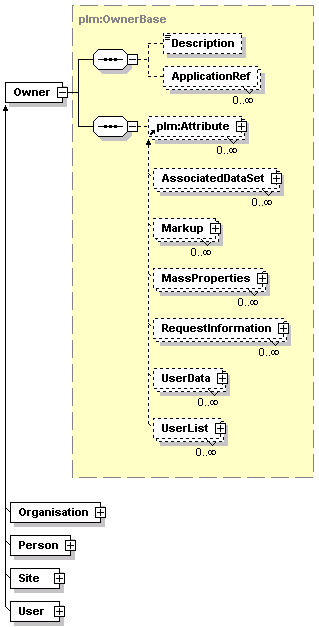 |
||||||||||||||||||
| namespace | http://www.plmxml.org/Schemas/PLMXMLSchema | ||||||||||||||||||
| type | plm:OwnerBase | ||||||||||||||||||
| children | Description ApplicationRef plm:Attribute | ||||||||||||||||||
| attributes |
|
||||||||||||||||||
| source | <xsd:element name="Owner" type="plm:OwnerBase" substitutionGroup="plm:AttribOwner"/> |
| diagram | 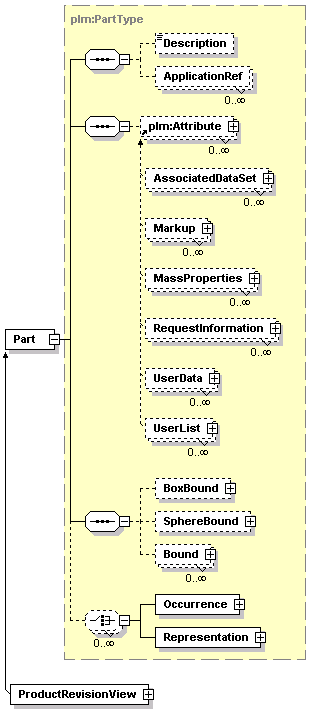 |
||||||||||||||||||||||||||||||||||||||||||||||||||||||||||||||||||||||||||||||||||||||||||||||||||||||
| namespace | http://www.plmxml.org/Schemas/PLMXMLSchema | ||||||||||||||||||||||||||||||||||||||||||||||||||||||||||||||||||||||||||||||||||||||||||||||||||||||
| type | plm:PartType | ||||||||||||||||||||||||||||||||||||||||||||||||||||||||||||||||||||||||||||||||||||||||||||||||||||||
| children | Description ApplicationRef plm:Attribute BoxBound SphereBound Bound Occurrence Representation | ||||||||||||||||||||||||||||||||||||||||||||||||||||||||||||||||||||||||||||||||||||||||||||||||||||||
| used by |
|
||||||||||||||||||||||||||||||||||||||||||||||||||||||||||||||||||||||||||||||||||||||||||||||||||||||
| attributes |
|
||||||||||||||||||||||||||||||||||||||||||||||||||||||||||||||||||||||||||||||||||||||||||||||||||||||
| source | <xsd:element name="Part" type="plm:PartType" substitutionGroup="plm:StructureRevisionView"/> |
| diagram | 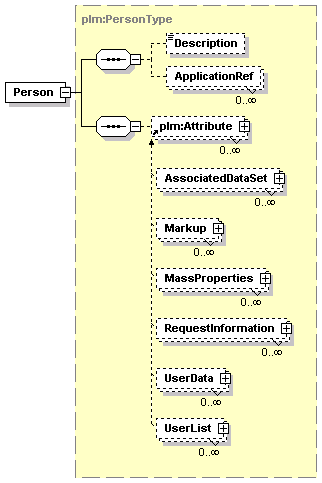 |
||||||||||||||||||||||||||||||||||||||||||||||||
| namespace | http://www.plmxml.org/Schemas/PLMXMLSchema | ||||||||||||||||||||||||||||||||||||||||||||||||
| type | plm:PersonType | ||||||||||||||||||||||||||||||||||||||||||||||||
| children | Description ApplicationRef plm:Attribute | ||||||||||||||||||||||||||||||||||||||||||||||||
| attributes |
|
||||||||||||||||||||||||||||||||||||||||||||||||
| source | <xsd:element name="Person" type="plm:PersonType" substitutionGroup="plm:Owner"/> |
| diagram | 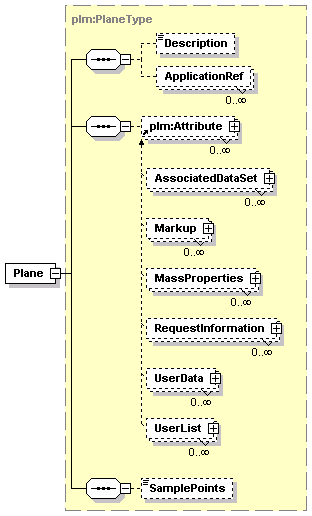 |
||||||||||||||||||||||||||||||||||||||||||||||||||||||||||||||||||
| namespace | http://www.plmxml.org/Schemas/PLMXMLSchema | ||||||||||||||||||||||||||||||||||||||||||||||||||||||||||||||||||
| type | plm:PlaneType | ||||||||||||||||||||||||||||||||||||||||||||||||||||||||||||||||||
| children | Description ApplicationRef plm:Attribute SamplePoints | ||||||||||||||||||||||||||||||||||||||||||||||||||||||||||||||||||
| attributes |
|
||||||||||||||||||||||||||||||||||||||||||||||||||||||||||||||||||
| source | <xsd:element name="Plane" type="plm:PlaneType" substitutionGroup="plm:Surface"/> |
| diagram |  |
||||||||||||||||||||||||||||||||||||||||||
| namespace | http://www.plmxml.org/Schemas/PLMXMLSchema | ||||||||||||||||||||||||||||||||||||||||||
| type | plm:PLMXMLType | ||||||||||||||||||||||||||||||||||||||||||
| children | Description ApplicationRef ProductDef plm:StructureDef Representation ConstructionGeometry plm:Structure plm:StructureRevision plm:Attribute plm:AttribOwner | ||||||||||||||||||||||||||||||||||||||||||
| attributes |
|
||||||||||||||||||||||||||||||||||||||||||
| annotation |
|
||||||||||||||||||||||||||||||||||||||||||
| source | <xsd:element name="PLMXML" type="plm:PLMXMLType"> <xsd:annotation> <xsd:appinfo source="PLMXMLSchemaGenerator">sdkname=Document</xsd:appinfo> </xsd:annotation> </xsd:element> |
| diagram | 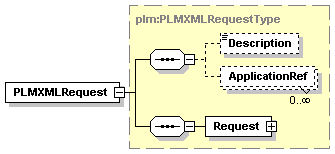 |
||||||||||||||||||||||||||||||||||||||||||||||||||||||
| namespace | http://www.plmxml.org/Schemas/PLMXMLSchema | ||||||||||||||||||||||||||||||||||||||||||||||||||||||
| type | plm:PLMXMLRequestType | ||||||||||||||||||||||||||||||||||||||||||||||||||||||
| children | Description ApplicationRef Request | ||||||||||||||||||||||||||||||||||||||||||||||||||||||
| attributes |
|
||||||||||||||||||||||||||||||||||||||||||||||||||||||
| annotation |
|
||||||||||||||||||||||||||||||||||||||||||||||||||||||
| source | <xsd:element name="PLMXMLRequest" type="plm:PLMXMLRequestType"> <xsd:annotation> <xsd:appinfo source="PLMXMLSchemaGenerator">sdkname=RequestDocument</xsd:appinfo> </xsd:annotation> </xsd:element> |
| diagram | 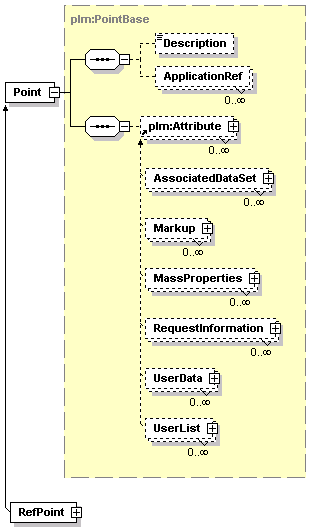 |
||||||||||||||||||||||||||||||
| namespace | http://www.plmxml.org/Schemas/PLMXMLSchema | ||||||||||||||||||||||||||||||
| type | plm:PointBase | ||||||||||||||||||||||||||||||
| children | Description ApplicationRef plm:Attribute | ||||||||||||||||||||||||||||||
| used by |
|
||||||||||||||||||||||||||||||
| attributes |
|
||||||||||||||||||||||||||||||
| source | <xsd:element name="Point" type="plm:PointBase"/> |
| diagram | 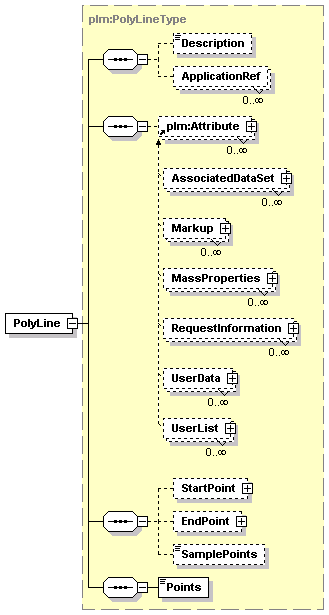 |
||||||||||||||||||||||||||||||||||||||||||
| namespace | http://www.plmxml.org/Schemas/PLMXMLSchema | ||||||||||||||||||||||||||||||||||||||||||
| type | plm:PolyLineType | ||||||||||||||||||||||||||||||||||||||||||
| children | Description ApplicationRef plm:Attribute StartPoint EndPoint SamplePoints Points | ||||||||||||||||||||||||||||||||||||||||||
| attributes |
|
||||||||||||||||||||||||||||||||||||||||||
| source | <xsd:element name="PolyLine" type="plm:PolyLineType" substitutionGroup="plm:Curve"/> |
| diagram | 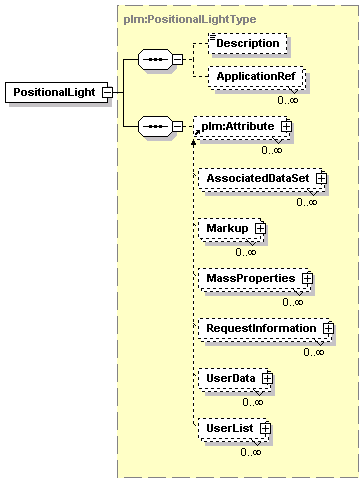 |
||||||||||||||||||||||||||||||||||||||||||||||||||||||||||||||||||||||||||||||
| namespace | http://www.plmxml.org/Schemas/PLMXMLSchema | ||||||||||||||||||||||||||||||||||||||||||||||||||||||||||||||||||||||||||||||
| type | plm:PositionalLightType | ||||||||||||||||||||||||||||||||||||||||||||||||||||||||||||||||||||||||||||||
| children | Description ApplicationRef plm:Attribute | ||||||||||||||||||||||||||||||||||||||||||||||||||||||||||||||||||||||||||||||
| attributes |
|
||||||||||||||||||||||||||||||||||||||||||||||||||||||||||||||||||||||||||||||
| source | <xsd:element name="PositionalLight" type="plm:PositionalLightType" substitutionGroup="plm:LightSource"/> |
| diagram | 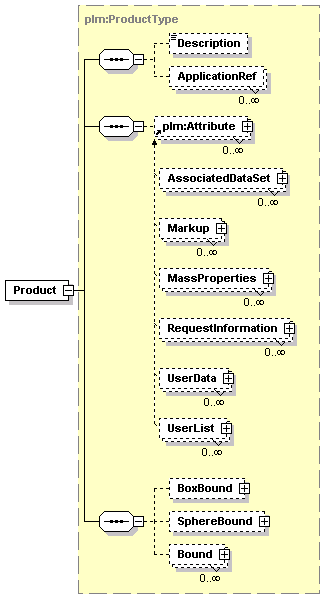 |
||||||||||||||||||||||||||||||||||||||||||||||||||||||||||||||||||||||||
| namespace | http://www.plmxml.org/Schemas/PLMXMLSchema | ||||||||||||||||||||||||||||||||||||||||||||||||||||||||||||||||||||||||
| type | plm:ProductType | ||||||||||||||||||||||||||||||||||||||||||||||||||||||||||||||||||||||||
| children | Description ApplicationRef plm:Attribute BoxBound SphereBound Bound | ||||||||||||||||||||||||||||||||||||||||||||||||||||||||||||||||||||||||
| attributes |
|
||||||||||||||||||||||||||||||||||||||||||||||||||||||||||||||||||||||||
| source | <xsd:element name="Product" type="plm:ProductType" substitutionGroup="plm:Managed"/> |
| diagram | 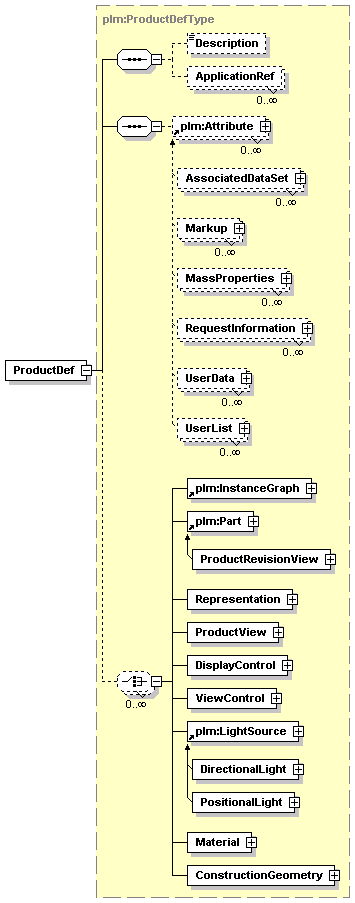 |
||||||||||||||||||||||||||||||||||||||||||
| namespace | http://www.plmxml.org/Schemas/PLMXMLSchema | ||||||||||||||||||||||||||||||||||||||||||
| type | plm:ProductDefType | ||||||||||||||||||||||||||||||||||||||||||
| children | Description ApplicationRef plm:Attribute plm:InstanceGraph plm:Part Representation ProductView DisplayControl ViewControl plm:LightSource Material ConstructionGeometry | ||||||||||||||||||||||||||||||||||||||||||
| attributes |
|
||||||||||||||||||||||||||||||||||||||||||
| source | <xsd:element name="ProductDef" type="plm:ProductDefType" substitutionGroup="plm:StructureDef"/> |
| diagram | 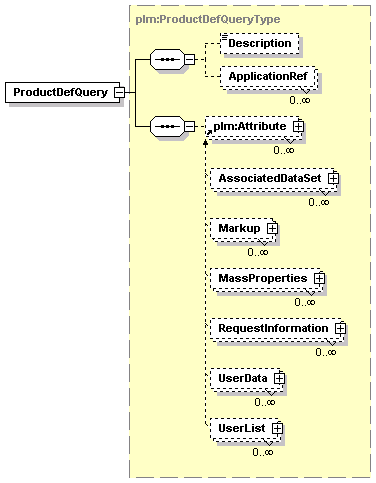 |
||||||||||||||||||
| namespace | http://www.plmxml.org/Schemas/PLMXMLSchema | ||||||||||||||||||
| type | plm:ProductDefQueryType | ||||||||||||||||||
| children | Description ApplicationRef plm:Attribute | ||||||||||||||||||
| attributes |
|
||||||||||||||||||
| source | <xsd:element name="ProductDefQuery" type="plm:ProductDefQueryType" substitutionGroup="plm:Query"/> |
| diagram | 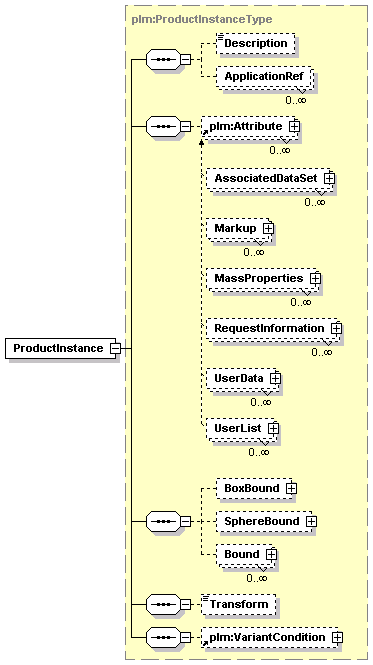 |
||||||||||||||||||||||||||||||||||||||||||||||||||||||||||||||||||||||||||||||||||||||||||||||||||||||||||||
| namespace | http://www.plmxml.org/Schemas/PLMXMLSchema | ||||||||||||||||||||||||||||||||||||||||||||||||||||||||||||||||||||||||||||||||||||||||||||||||||||||||||||
| type | plm:ProductInstanceType | ||||||||||||||||||||||||||||||||||||||||||||||||||||||||||||||||||||||||||||||||||||||||||||||||||||||||||||
| children | Description ApplicationRef plm:Attribute BoxBound SphereBound Bound Transform plm:VariantCondition | ||||||||||||||||||||||||||||||||||||||||||||||||||||||||||||||||||||||||||||||||||||||||||||||||||||||||||||
| attributes |
|
||||||||||||||||||||||||||||||||||||||||||||||||||||||||||||||||||||||||||||||||||||||||||||||||||||||||||||
| source | <xsd:element name="ProductInstance" type="plm:ProductInstanceType" substitutionGroup="plm:StructureInstance"/> |
| diagram | 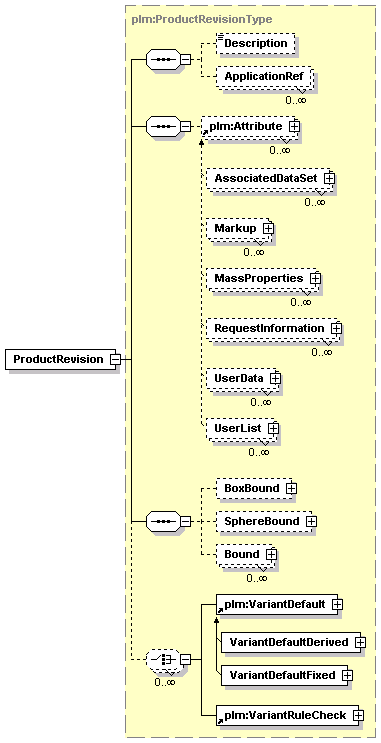 |
||||||||||||||||||||||||||||||||||||||||||||||||||||||||||||||||||||||||||||||||||||||||||
| namespace | http://www.plmxml.org/Schemas/PLMXMLSchema | ||||||||||||||||||||||||||||||||||||||||||||||||||||||||||||||||||||||||||||||||||||||||||
| type | plm:ProductRevisionType | ||||||||||||||||||||||||||||||||||||||||||||||||||||||||||||||||||||||||||||||||||||||||||
| children | Description ApplicationRef plm:Attribute BoxBound SphereBound Bound plm:VariantDefault plm:VariantRuleCheck | ||||||||||||||||||||||||||||||||||||||||||||||||||||||||||||||||||||||||||||||||||||||||||
| attributes |
|
||||||||||||||||||||||||||||||||||||||||||||||||||||||||||||||||||||||||||||||||||||||||||
| source | <xsd:element name="ProductRevision" type="plm:ProductRevisionType" substitutionGroup="plm:StructureRevision"/> |
| diagram | 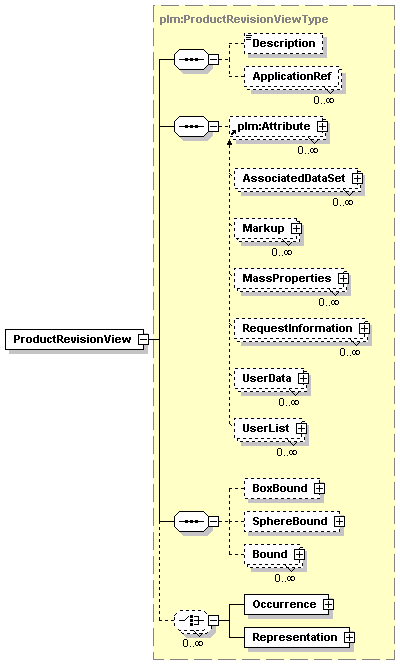 |
||||||||||||||||||||||||||||||||||||||||||||||||||||||||||||||||||||||||||||||||||||||||||||||||||||||||||||
| namespace | http://www.plmxml.org/Schemas/PLMXMLSchema | ||||||||||||||||||||||||||||||||||||||||||||||||||||||||||||||||||||||||||||||||||||||||||||||||||||||||||||
| type | plm:ProductRevisionViewType | ||||||||||||||||||||||||||||||||||||||||||||||||||||||||||||||||||||||||||||||||||||||||||||||||||||||||||||
| children | Description ApplicationRef plm:Attribute BoxBound SphereBound Bound Occurrence Representation | ||||||||||||||||||||||||||||||||||||||||||||||||||||||||||||||||||||||||||||||||||||||||||||||||||||||||||||
| attributes |
|
||||||||||||||||||||||||||||||||||||||||||||||||||||||||||||||||||||||||||||||||||||||||||||||||||||||||||||
| source | <xsd:element name="ProductRevisionView" type="plm:ProductRevisionViewType" substitutionGroup="plm:Part"/> |
| diagram |  |
||||||||||||||||||
| namespace | http://www.plmxml.org/Schemas/PLMXMLSchema | ||||||||||||||||||
| type | plm:PropertiesBase | ||||||||||||||||||
| children | Description ApplicationRef plm:Attribute BoxBound SphereBound Bound | ||||||||||||||||||
| attributes |
|
||||||||||||||||||
| source | <xsd:element name="Properties" type="plm:PropertiesBase" substitutionGroup="plm:AttribOwner"/> |
| diagram | 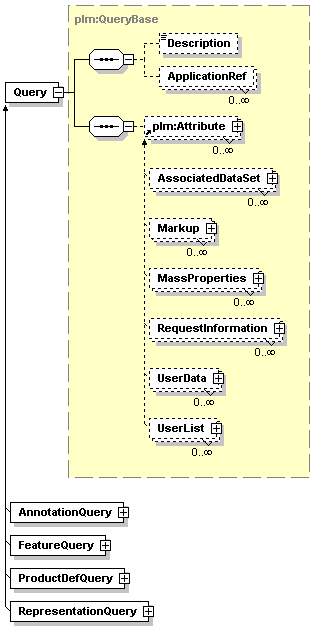 |
||||||||||||||||||
| namespace | http://www.plmxml.org/Schemas/PLMXMLSchema | ||||||||||||||||||
| type | plm:QueryBase | ||||||||||||||||||
| children | Description ApplicationRef plm:Attribute | ||||||||||||||||||
| used by |
|
||||||||||||||||||
| attributes |
|
||||||||||||||||||
| source | <xsd:element name="Query" type="plm:QueryBase"/> |
| diagram | 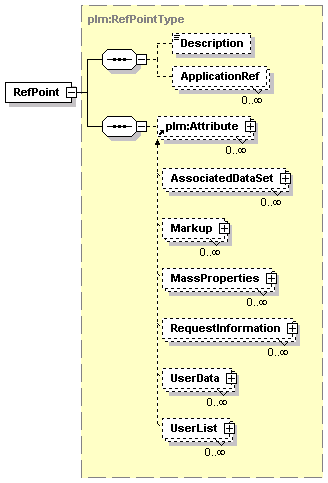 |
||||||||||||||||||||||||||||||
| namespace | http://www.plmxml.org/Schemas/PLMXMLSchema | ||||||||||||||||||||||||||||||
| type | plm:RefPointType | ||||||||||||||||||||||||||||||
| children | Description ApplicationRef plm:Attribute | ||||||||||||||||||||||||||||||
| attributes |
|
||||||||||||||||||||||||||||||
| source | <xsd:element name="RefPoint" type="plm:RefPointType" substitutionGroup="plm:Point"/> |
| diagram | 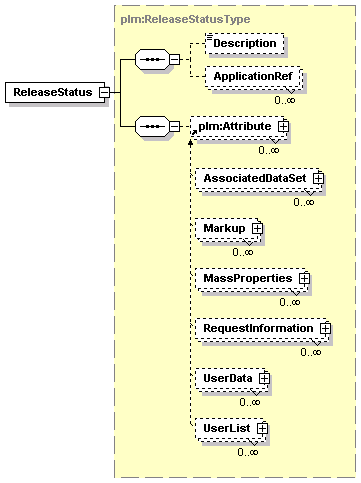 |
||||||||||||||||||||||||||||||||||||
| namespace | http://www.plmxml.org/Schemas/PLMXMLSchema | ||||||||||||||||||||||||||||||||||||
| type | plm:ReleaseStatusType | ||||||||||||||||||||||||||||||||||||
| children | Description ApplicationRef plm:Attribute | ||||||||||||||||||||||||||||||||||||
| attributes |
|
||||||||||||||||||||||||||||||||||||
| source | <xsd:element name="ReleaseStatus" type="plm:ReleaseStatusType" substitutionGroup="plm:AttribOwner"/> |
| diagram | 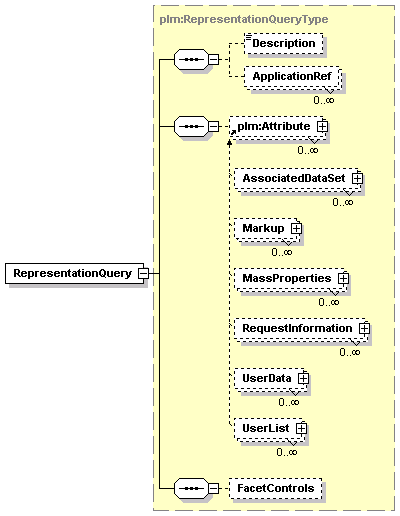 |
||||||||||||||||||||||||||||||
| namespace | http://www.plmxml.org/Schemas/PLMXMLSchema | ||||||||||||||||||||||||||||||
| type | plm:RepresentationQueryType | ||||||||||||||||||||||||||||||
| children | Description ApplicationRef plm:Attribute FacetControls | ||||||||||||||||||||||||||||||
| attributes |
|
||||||||||||||||||||||||||||||
| source | <xsd:element name="RepresentationQuery" type="plm:RepresentationQueryType" substitutionGroup="plm:Query"/> |
| diagram | 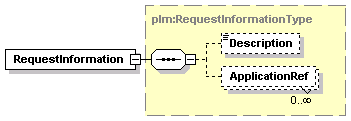 |
||||||||||||||||||||||||||||||
| namespace | http://www.plmxml.org/Schemas/PLMXMLSchema | ||||||||||||||||||||||||||||||
| type | plm:RequestInformationType | ||||||||||||||||||||||||||||||
| children | Description ApplicationRef | ||||||||||||||||||||||||||||||
| attributes |
|
||||||||||||||||||||||||||||||
| source | <xsd:element name="RequestInformation" type="plm:RequestInformationType" substitutionGroup="plm:Attribute"/> |
| diagram | 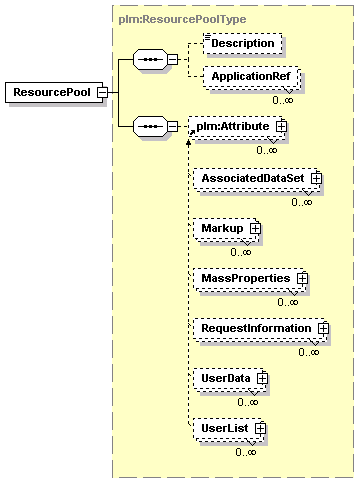 |
||||||||||||||||||||||||||||||
| namespace | http://www.plmxml.org/Schemas/PLMXMLSchema | ||||||||||||||||||||||||||||||
| type | plm:ResourcePoolType | ||||||||||||||||||||||||||||||
| children | Description ApplicationRef plm:Attribute | ||||||||||||||||||||||||||||||
| attributes |
|
||||||||||||||||||||||||||||||
| source | <xsd:element name="ResourcePool" type="plm:ResourcePoolType" substitutionGroup="plm:AttribOwner"/> |
| diagram | 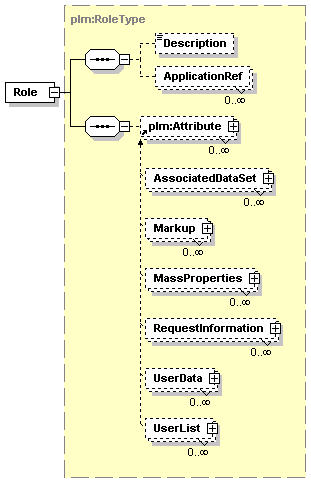 |
||||||||||||||||||||||||
| namespace | http://www.plmxml.org/Schemas/PLMXMLSchema | ||||||||||||||||||||||||
| type | plm:RoleType | ||||||||||||||||||||||||
| children | Description ApplicationRef plm:Attribute | ||||||||||||||||||||||||
| attributes |
|
||||||||||||||||||||||||
| source | <xsd:element name="Role" type="plm:RoleType" substitutionGroup="plm:AttribOwner"/> |
| diagram | 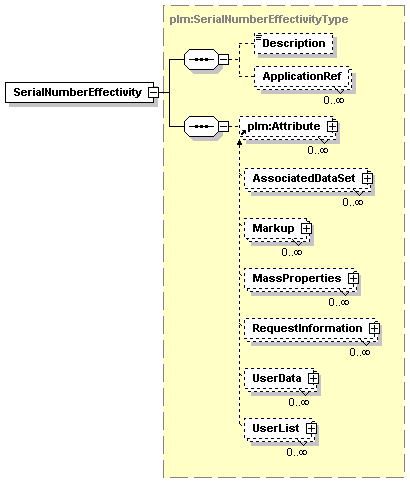 |
||||||||||||||||||||||||||||||||||||
| namespace | http://www.plmxml.org/Schemas/PLMXMLSchema | ||||||||||||||||||||||||||||||||||||
| type | plm:SerialNumberEffectivityType | ||||||||||||||||||||||||||||||||||||
| children | Description ApplicationRef plm:Attribute | ||||||||||||||||||||||||||||||||||||
| attributes |
|
||||||||||||||||||||||||||||||||||||
| source | <xsd:element name="SerialNumberEffectivity" type="plm:SerialNumberEffectivityType" substitutionGroup="plm:Effectivity"/> |
| diagram | |||||||||||||||||||
| namespace | http://www.plmxml.org/Schemas/PLMXMLSchema | ||||||||||||||||||
| type | plm:SetType | ||||||||||||||||||
| used by |
|
||||||||||||||||||
| attributes |
|
||||||||||||||||||
| source | <xsd:element name="Set" type="plm:SetType" substitutionGroup="plm:Statement"/> |
| diagram | |||||||||||||||||||
| namespace | http://www.plmxml.org/Schemas/PLMXMLSchema | ||||||||||||||||||
| type | plm:SetDefaultType | ||||||||||||||||||
| used by |
|
||||||||||||||||||
| attributes |
|
||||||||||||||||||
| source | <xsd:element name="SetDefault" type="plm:SetDefaultType" substitutionGroup="plm:Statement"/> |
| diagram | 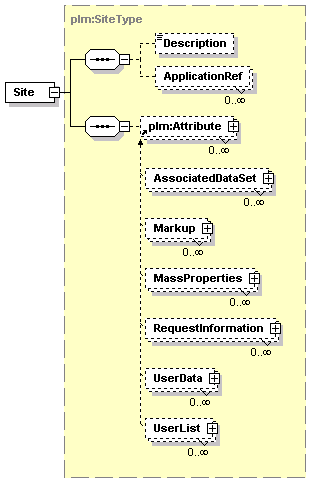 |
||||||||||||||||||||||||||||||||||||
| namespace | http://www.plmxml.org/Schemas/PLMXMLSchema | ||||||||||||||||||||||||||||||||||||
| type | plm:SiteType | ||||||||||||||||||||||||||||||||||||
| children | Description ApplicationRef plm:Attribute | ||||||||||||||||||||||||||||||||||||
| attributes |
|
||||||||||||||||||||||||||||||||||||
| source | <xsd:element name="Site" type="plm:SiteType" substitutionGroup="plm:Owner"/> |
| diagram | 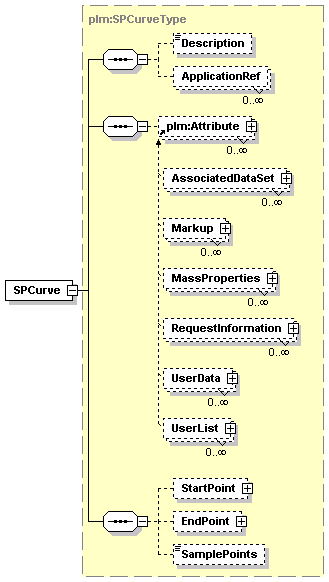 |
||||||||||||||||||||||||||||||||||||||||||||||||
| namespace | http://www.plmxml.org/Schemas/PLMXMLSchema | ||||||||||||||||||||||||||||||||||||||||||||||||
| type | plm:SPCurveType | ||||||||||||||||||||||||||||||||||||||||||||||||
| children | Description ApplicationRef plm:Attribute StartPoint EndPoint SamplePoints | ||||||||||||||||||||||||||||||||||||||||||||||||
| attributes |
|
||||||||||||||||||||||||||||||||||||||||||||||||
| source | <xsd:element name="SPCurve" type="plm:SPCurveType" substitutionGroup="plm:Curve"/> |
| diagram | 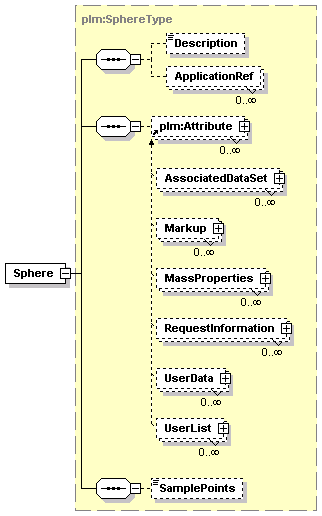 |
||||||||||||||||||||||||||||||||||||||||||||||||||||||||||||||||||||||||
| namespace | http://www.plmxml.org/Schemas/PLMXMLSchema | ||||||||||||||||||||||||||||||||||||||||||||||||||||||||||||||||||||||||
| type | plm:SphereType | ||||||||||||||||||||||||||||||||||||||||||||||||||||||||||||||||||||||||
| children | Description ApplicationRef plm:Attribute SamplePoints | ||||||||||||||||||||||||||||||||||||||||||||||||||||||||||||||||||||||||
| attributes |
|
||||||||||||||||||||||||||||||||||||||||||||||||||||||||||||||||||||||||
| source | <xsd:element name="Sphere" type="plm:SphereType" substitutionGroup="plm:Surface"/> |
| diagram | 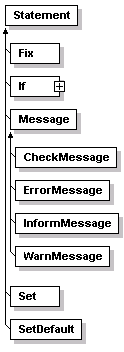 |
||
| namespace | http://www.plmxml.org/Schemas/PLMXMLSchema | ||
| type | plm:StatementBase | ||
| used by |
|
||
| source | <xsd:element name="Statement" type="plm:StatementBase"/> |
| diagram | 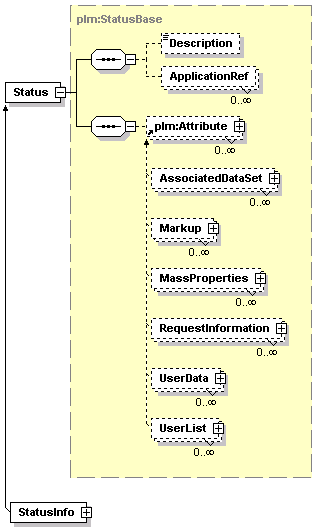 |
||||||||||||||||||
| namespace | http://www.plmxml.org/Schemas/PLMXMLSchema | ||||||||||||||||||
| type | plm:StatusBase | ||||||||||||||||||
| children | Description ApplicationRef plm:Attribute | ||||||||||||||||||
| attributes |
|
||||||||||||||||||
| source | <xsd:element name="Status" type="plm:StatusBase" substitutionGroup="plm:AttribOwner"/> |
| diagram | 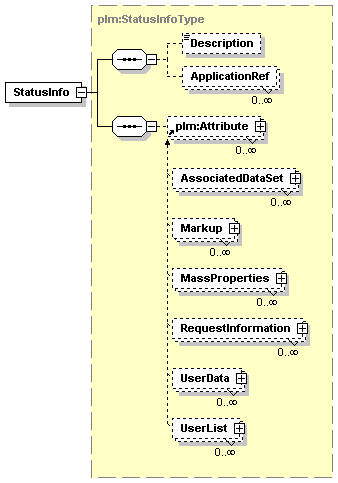 |
||||||||||||||||||||||||||||||||||||
| namespace | http://www.plmxml.org/Schemas/PLMXMLSchema | ||||||||||||||||||||||||||||||||||||
| type | plm:StatusInfoType | ||||||||||||||||||||||||||||||||||||
| children | Description ApplicationRef plm:Attribute | ||||||||||||||||||||||||||||||||||||
| attributes |
|
||||||||||||||||||||||||||||||||||||
| source | <xsd:element name="StatusInfo" type="plm:StatusInfoType" substitutionGroup="plm:Status"/> |
| diagram | 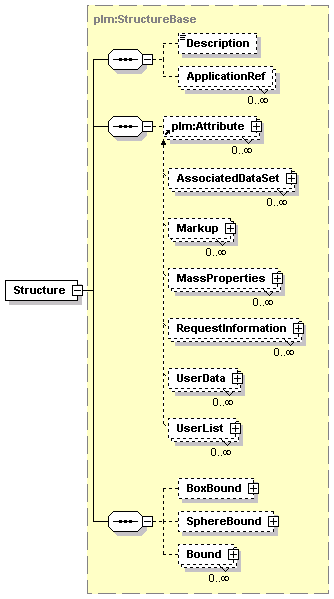 |
||||||||||||||||||||||||||||||||||||||||||||||||||||||||||||
| namespace | http://www.plmxml.org/Schemas/PLMXMLSchema | ||||||||||||||||||||||||||||||||||||||||||||||||||||||||||||
| type | plm:StructureBase | ||||||||||||||||||||||||||||||||||||||||||||||||||||||||||||
| children | Description ApplicationRef plm:Attribute BoxBound SphereBound Bound | ||||||||||||||||||||||||||||||||||||||||||||||||||||||||||||
| used by |
|
||||||||||||||||||||||||||||||||||||||||||||||||||||||||||||
| attributes |
|
||||||||||||||||||||||||||||||||||||||||||||||||||||||||||||
| source | <xsd:element name="Structure" type="plm:StructureBase" substitutionGroup="plm:Managed"/> |
| diagram | 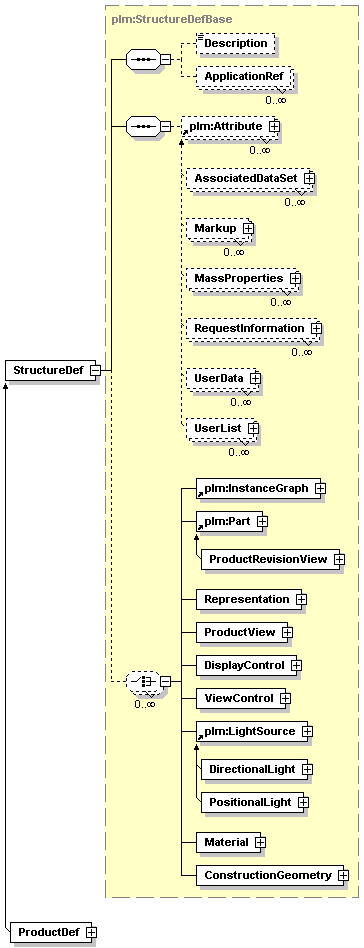 |
||||||||||||||||||||||||||||||||||||||||||
| namespace | http://www.plmxml.org/Schemas/PLMXMLSchema | ||||||||||||||||||||||||||||||||||||||||||
| type | plm:StructureDefBase | ||||||||||||||||||||||||||||||||||||||||||
| children | Description ApplicationRef plm:Attribute plm:InstanceGraph plm:Part Representation ProductView DisplayControl ViewControl plm:LightSource Material ConstructionGeometry | ||||||||||||||||||||||||||||||||||||||||||
| used by |
|
||||||||||||||||||||||||||||||||||||||||||
| attributes |
|
||||||||||||||||||||||||||||||||||||||||||
| source | <xsd:element name="StructureDef" type="plm:StructureDefBase" substitutionGroup="plm:AttribOwner"/> |
| diagram | 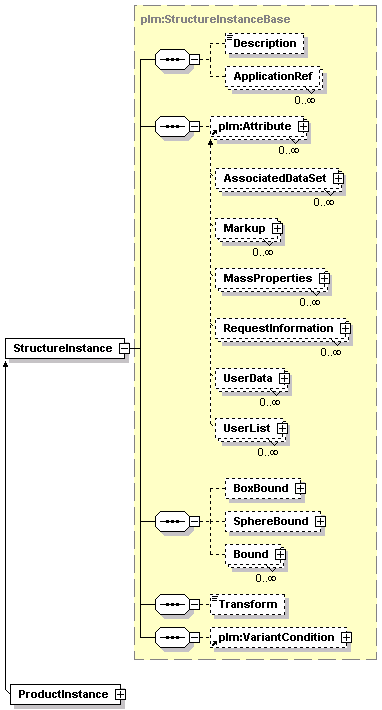 |
||||||||||||||||||||||||||||||||||||||||||||||||||||||||||||||||||||||||||||||||||||||||||||||||||||||
| namespace | http://www.plmxml.org/Schemas/PLMXMLSchema | ||||||||||||||||||||||||||||||||||||||||||||||||||||||||||||||||||||||||||||||||||||||||||||||||||||||
| type | plm:StructureInstanceBase | ||||||||||||||||||||||||||||||||||||||||||||||||||||||||||||||||||||||||||||||||||||||||||||||||||||||
| children | Description ApplicationRef plm:Attribute BoxBound SphereBound Bound Transform plm:VariantCondition | ||||||||||||||||||||||||||||||||||||||||||||||||||||||||||||||||||||||||||||||||||||||||||||||||||||||
| attributes |
|
||||||||||||||||||||||||||||||||||||||||||||||||||||||||||||||||||||||||||||||||||||||||||||||||||||||
| source | <xsd:element name="StructureInstance" type="plm:StructureInstanceBase" substitutionGroup="plm:Instance"/> |
| diagram | 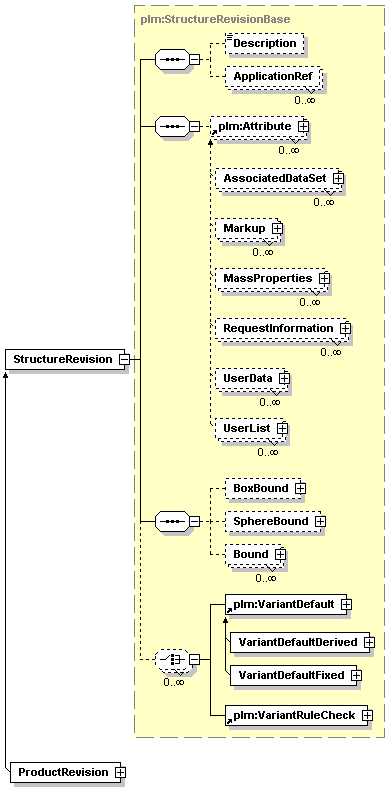 |
||||||||||||||||||||||||||||||||||||||||||||||||||||||||||||||||||||||||||||||||||||||||||
| namespace | http://www.plmxml.org/Schemas/PLMXMLSchema | ||||||||||||||||||||||||||||||||||||||||||||||||||||||||||||||||||||||||||||||||||||||||||
| type | plm:StructureRevisionBase | ||||||||||||||||||||||||||||||||||||||||||||||||||||||||||||||||||||||||||||||||||||||||||
| children | Description ApplicationRef plm:Attribute BoxBound SphereBound Bound plm:VariantDefault plm:VariantRuleCheck | ||||||||||||||||||||||||||||||||||||||||||||||||||||||||||||||||||||||||||||||||||||||||||
| used by |
|
||||||||||||||||||||||||||||||||||||||||||||||||||||||||||||||||||||||||||||||||||||||||||
| attributes |
|
||||||||||||||||||||||||||||||||||||||||||||||||||||||||||||||||||||||||||||||||||||||||||
| source | <xsd:element name="StructureRevision" type="plm:StructureRevisionBase" substitutionGroup="plm:Managed"/> |
| diagram | 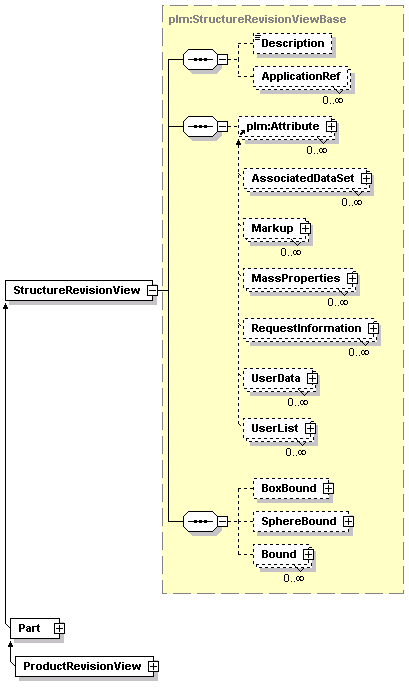 |
||||||||||||||||||||||||||||||||||||||||||||||||||||||||||||
| namespace | http://www.plmxml.org/Schemas/PLMXMLSchema | ||||||||||||||||||||||||||||||||||||||||||||||||||||||||||||
| type | plm:StructureRevisionViewBase | ||||||||||||||||||||||||||||||||||||||||||||||||||||||||||||
| children | Description ApplicationRef plm:Attribute BoxBound SphereBound Bound | ||||||||||||||||||||||||||||||||||||||||||||||||||||||||||||
| attributes |
|
||||||||||||||||||||||||||||||||||||||||||||||||||||||||||||
| source | <xsd:element name="StructureRevisionView" type="plm:StructureRevisionViewBase" substitutionGroup="plm:Managed"/> |
| diagram | 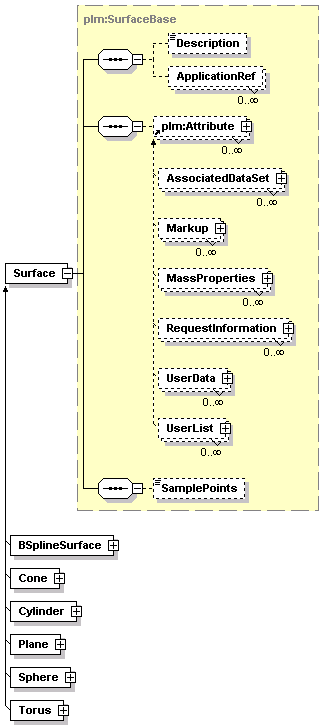 |
||||||||||||||||||||||||||||||||||||||||||||||||
| namespace | http://www.plmxml.org/Schemas/PLMXMLSchema | ||||||||||||||||||||||||||||||||||||||||||||||||
| type | plm:SurfaceBase | ||||||||||||||||||||||||||||||||||||||||||||||||
| children | Description ApplicationRef plm:Attribute SamplePoints | ||||||||||||||||||||||||||||||||||||||||||||||||
| used by |
|
||||||||||||||||||||||||||||||||||||||||||||||||
| attributes |
|
||||||||||||||||||||||||||||||||||||||||||||||||
| source | <xsd:element name="Surface" type="plm:SurfaceBase"/> |
| diagram | 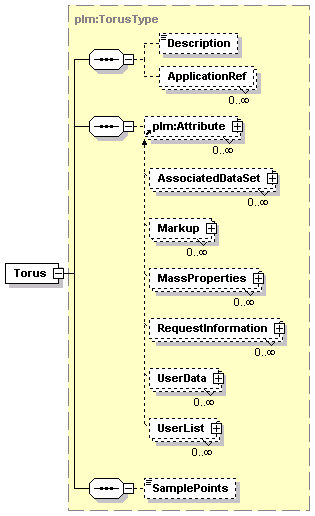 |
||||||||||||||||||||||||||||||||||||||||||||||||||||||||||||||||||||||||||||||
| namespace | http://www.plmxml.org/Schemas/PLMXMLSchema | ||||||||||||||||||||||||||||||||||||||||||||||||||||||||||||||||||||||||||||||
| type | plm:TorusType | ||||||||||||||||||||||||||||||||||||||||||||||||||||||||||||||||||||||||||||||
| children | Description ApplicationRef plm:Attribute SamplePoints | ||||||||||||||||||||||||||||||||||||||||||||||||||||||||||||||||||||||||||||||
| attributes |
|
||||||||||||||||||||||||||||||||||||||||||||||||||||||||||||||||||||||||||||||
| source | <xsd:element name="Torus" type="plm:TorusType" substitutionGroup="plm:Surface"/> |
| diagram | 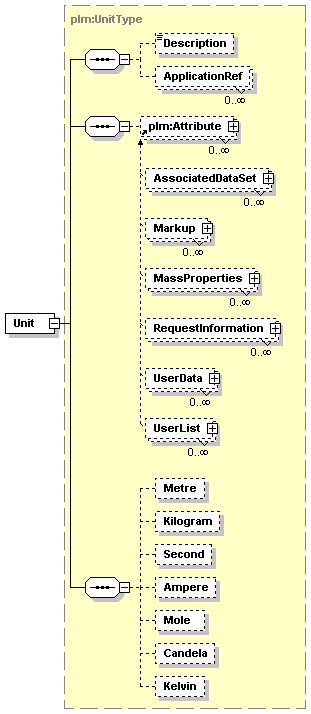 |
||||||||||||||||||
| namespace | http://www.plmxml.org/Schemas/PLMXMLSchema | ||||||||||||||||||
| type | plm:UnitType | ||||||||||||||||||
| children | Description ApplicationRef plm:Attribute Metre Kilogram Second Ampere Mole Candela Kelvin | ||||||||||||||||||
| attributes |
|
||||||||||||||||||
| source | <xsd:element name="Unit" type="plm:UnitType" substitutionGroup="plm:AttribOwner"/> |
| diagram | 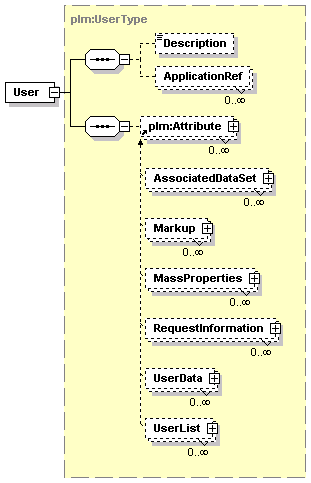 |
||||||||||||||||||||||||||||||
| namespace | http://www.plmxml.org/Schemas/PLMXMLSchema | ||||||||||||||||||||||||||||||
| type | plm:UserType | ||||||||||||||||||||||||||||||
| children | Description ApplicationRef plm:Attribute | ||||||||||||||||||||||||||||||
| attributes |
|
||||||||||||||||||||||||||||||
| source | <xsd:element name="User" type="plm:UserType" substitutionGroup="plm:Owner"/> |
| diagram | 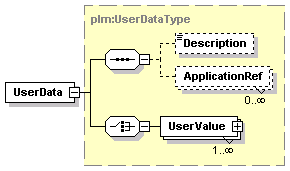 |
||||||||||||||||||
| namespace | http://www.plmxml.org/Schemas/PLMXMLSchema | ||||||||||||||||||
| type | plm:UserDataType | ||||||||||||||||||
| children | Description ApplicationRef UserValue | ||||||||||||||||||
| attributes |
|
||||||||||||||||||
| source | <xsd:element name="UserData" type="plm:UserDataType" substitutionGroup="plm:Attribute"/> |
| diagram | 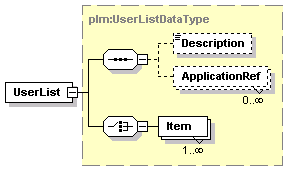 |
||||||||||||||||||||||||
| namespace | http://www.plmxml.org/Schemas/PLMXMLSchema | ||||||||||||||||||||||||
| type | plm:UserListDataType | ||||||||||||||||||||||||
| children | Description ApplicationRef Item | ||||||||||||||||||||||||
| attributes |
|
||||||||||||||||||||||||
| source | <xsd:element name="UserList" type="plm:UserListDataType" substitutionGroup="plm:Attribute"/> |
| diagram | 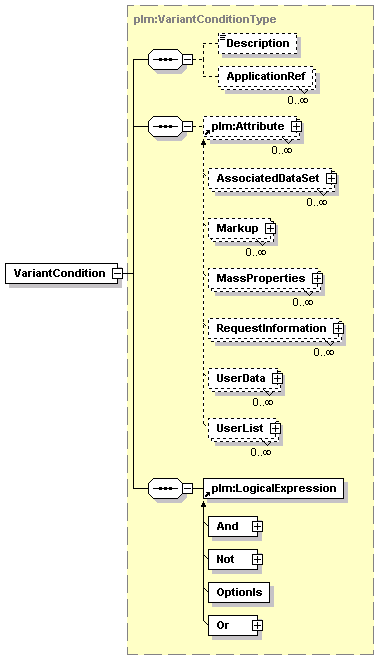 |
||||||||||||||||||
| namespace | http://www.plmxml.org/Schemas/PLMXMLSchema | ||||||||||||||||||
| type | plm:VariantConditionType | ||||||||||||||||||
| children | Description ApplicationRef plm:Attribute plm:LogicalExpression | ||||||||||||||||||
| used by |
|
||||||||||||||||||
| attributes |
|
||||||||||||||||||
| source | <xsd:element name="VariantCondition" type="plm:VariantConditionType"/> |
| diagram | 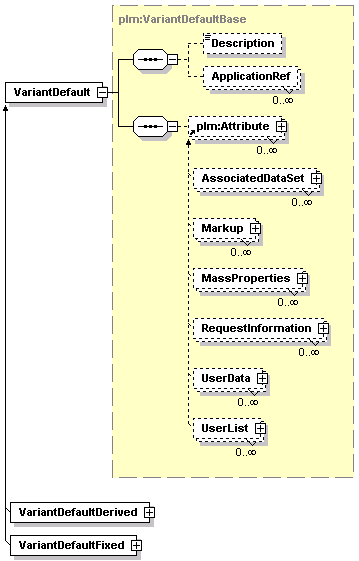 |
||||||||||||||||||
| namespace | http://www.plmxml.org/Schemas/PLMXMLSchema | ||||||||||||||||||
| type | plm:VariantDefaultBase | ||||||||||||||||||
| children | Description ApplicationRef plm:Attribute | ||||||||||||||||||
| used by |
|
||||||||||||||||||
| attributes |
|
||||||||||||||||||
| source | <xsd:element name="VariantDefault" type="plm:VariantDefaultBase"/> |
| diagram | 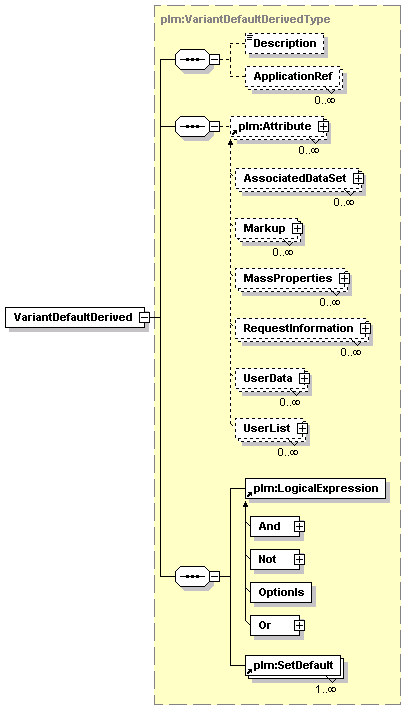 |
||||||||||||||||||
| namespace | http://www.plmxml.org/Schemas/PLMXMLSchema | ||||||||||||||||||
| type | plm:VariantDefaultDerivedType | ||||||||||||||||||
| children | Description ApplicationRef plm:Attribute plm:LogicalExpression plm:SetDefault | ||||||||||||||||||
| attributes |
|
||||||||||||||||||
| source | <xsd:element name="VariantDefaultDerived" type="plm:VariantDefaultDerivedType" substitutionGroup="plm:VariantDefault"/> |
| diagram | 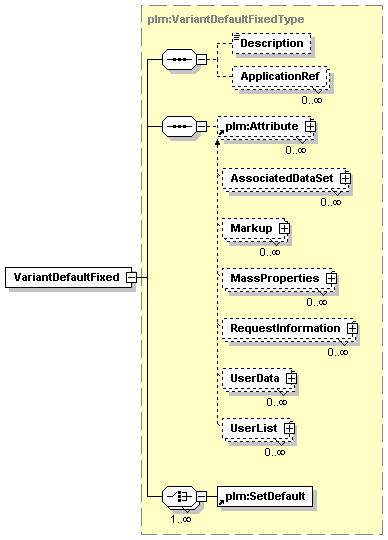 |
||||||||||||||||||
| namespace | http://www.plmxml.org/Schemas/PLMXMLSchema | ||||||||||||||||||
| type | plm:VariantDefaultFixedType | ||||||||||||||||||
| children | Description ApplicationRef plm:Attribute plm:SetDefault | ||||||||||||||||||
| attributes |
|
||||||||||||||||||
| source | <xsd:element name="VariantDefaultFixed" type="plm:VariantDefaultFixedType" substitutionGroup="plm:VariantDefault"/> |
| diagram | 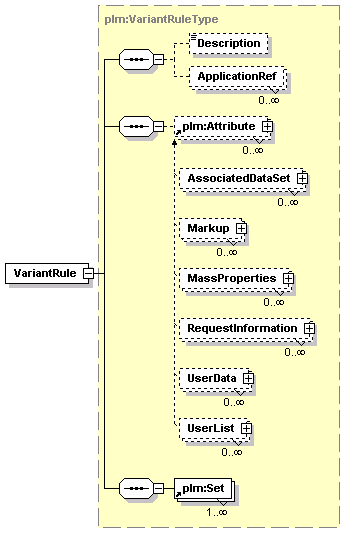 |
||||||||||||||||||||||||||||||
| namespace | http://www.plmxml.org/Schemas/PLMXMLSchema | ||||||||||||||||||||||||||||||
| type | plm:VariantRuleType | ||||||||||||||||||||||||||||||
| children | Description ApplicationRef plm:Attribute plm:Set | ||||||||||||||||||||||||||||||
| attributes |
|
||||||||||||||||||||||||||||||
| source | <xsd:element name="VariantRule" type="plm:VariantRuleType" substitutionGroup="plm:AttribOwner"/> |
| diagram | 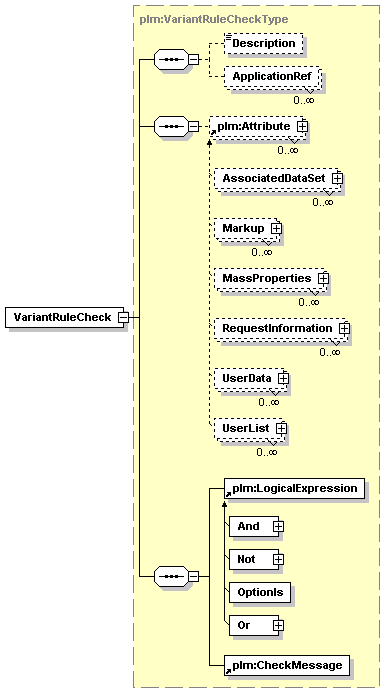 |
||||||||||||||||||
| namespace | http://www.plmxml.org/Schemas/PLMXMLSchema | ||||||||||||||||||
| type | plm:VariantRuleCheckType | ||||||||||||||||||
| children | Description ApplicationRef plm:Attribute plm:LogicalExpression plm:CheckMessage | ||||||||||||||||||
| used by |
|
||||||||||||||||||
| attributes |
|
||||||||||||||||||
| source | <xsd:element name="VariantRuleCheck" type="plm:VariantRuleCheckType"/> |
| diagram | 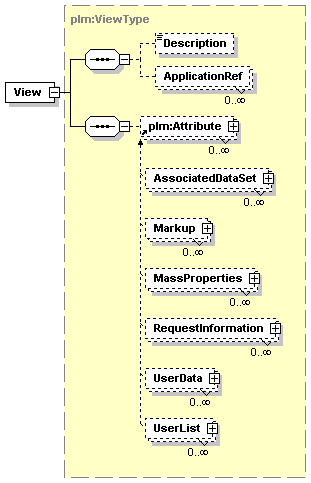 |
||||||||||||||||||||||||
| namespace | http://www.plmxml.org/Schemas/PLMXMLSchema | ||||||||||||||||||||||||
| type | plm:ViewType | ||||||||||||||||||||||||
| children | Description ApplicationRef plm:Attribute | ||||||||||||||||||||||||
| attributes |
|
||||||||||||||||||||||||
| source | <xsd:element name="View" type="plm:ViewType" substitutionGroup="plm:AttribOwner"/> |
| diagram | |||||||||||||
| namespace | http://www.plmxml.org/Schemas/PLMXMLSchema | ||||||||||||
| type | plm:WarnMessageType | ||||||||||||
| attributes |
|
||||||||||||
| source | <xsd:element name="WarnMessage" type="plm:WarnMessageType" substitutionGroup="plm:Message"/> |
| diagram | 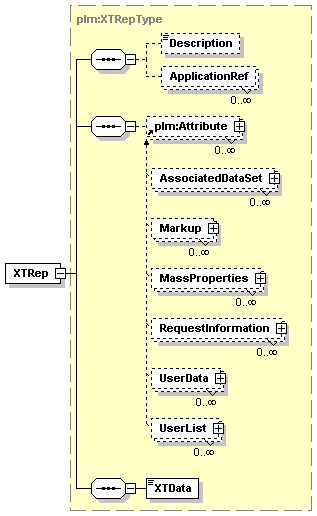 |
||||||||||||||||||
| namespace | http://www.plmxml.org/Schemas/PLMXMLSchema | ||||||||||||||||||
| type | plm:XTRepType | ||||||||||||||||||
| children | Description ApplicationRef plm:Attribute XTData | ||||||||||||||||||
| attributes |
|
||||||||||||||||||
| source | <xsd:element name="XTRep" type="plm:XTRepType" substitutionGroup="plm:InternalRep"/> |
| diagram | 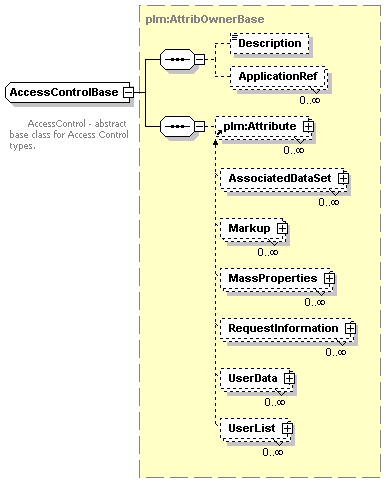 |
||||||||||||||||||
| namespace | http://www.plmxml.org/Schemas/PLMXMLSchema | ||||||||||||||||||
| type | extension of plm:AttribOwnerBase | ||||||||||||||||||
| children | Description ApplicationRef plm:Attribute | ||||||||||||||||||
| used by |
|
||||||||||||||||||
| attributes |
|
||||||||||||||||||
| annotation |
|
||||||||||||||||||
| source | <xsd:complexType name="AccessControlBase" abstract="true"> <xsd:annotation> <xsd:documentation> AccessControl - abstract base class for Access Control types. </xsd:documentation> </xsd:annotation> <xsd:complexContent> <xsd:extension base="plm:AttribOwnerBase"/> </xsd:complexContent> </xsd:complexType> |
| diagram | 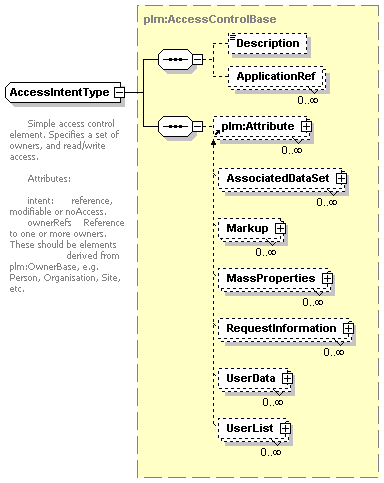 |
||||||||||||||||||||||||||||||
| namespace | http://www.plmxml.org/Schemas/PLMXMLSchema | ||||||||||||||||||||||||||||||
| type | extension of plm:AccessControlBase | ||||||||||||||||||||||||||||||
| children | Description ApplicationRef plm:Attribute | ||||||||||||||||||||||||||||||
| used by |
|
||||||||||||||||||||||||||||||
| attributes |
|
||||||||||||||||||||||||||||||
| annotation |
|
||||||||||||||||||||||||||||||
| source | <xsd:complexType name="AccessIntentType"> <xsd:annotation> <xsd:documentation> Simple access control element. Specifies a set of owners, and read/write access. Attributes: intent: reference, modifiable or noAccess. ownerRefs Reference to one or more owners. These should be elements derived from plm:OwnerBase, e.g. Person, Organisation, Site, etc. </xsd:documentation> </xsd:annotation> <xsd:complexContent> <xsd:extension base="plm:AccessControlBase"> <xsd:attribute name="ownerRefs" type="plm:uriReferenceListType" use="optional"/> <xsd:attribute name="intent" type="plm:AccessIntentEnum" default="modifiable"/> </xsd:extension> </xsd:complexContent> </xsd:complexType> |
| diagram | 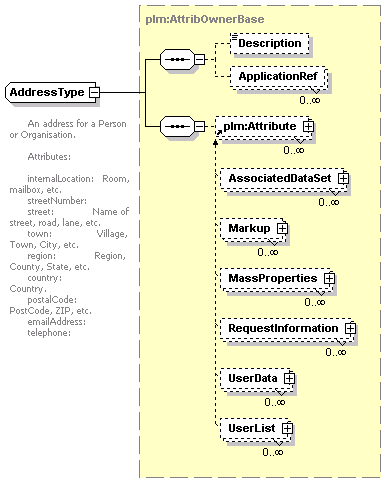 |
||
| namespace | http://www.plmxml.org/Schemas/PLMXMLSchema | ||
| type | extension of plm:AttribOwnerBase | ||
| children | Description ApplicationRef plm:Attribute | ||
| used by |
|
||
| attributes | |||
| annotation |
|
||
| source | <xsd:complexType name="AddressType"> <xsd:annotation> <xsd:documentation> An address for a Person or Organisation. Attributes: internalLocation: Room, mailbox, etc. streetNumber: street: Name of street, road, lane, etc. town: Village, Town, City, etc. region: Region, County, State, etc. country: Country. postalCode: PostCode, ZIP, etc. emailAddress: telephone: </xsd:documentation> </xsd:annotation> <xsd:complexContent> <xsd:extension base="plm:AttribOwnerBase"> <xsd:attribute name="internalLocation" type="xsd:string" use="optional"/> <xsd:attribute name="streetNumber" type="xsd:string" use="optional"/> <xsd:attribute name="street" type="xsd:string" use="optional"/> <xsd:attribute name="town" type="xsd:string" use="optional"/> <xsd:attribute name="region" type="xsd:string" use="optional"/> <xsd:attribute name="postalCode" type="xsd:string" use="optional"/> <xsd:attribute name="country" type="xsd:string" use="optional"/> <xsd:attribute name="emailAddress" type="xsd:string" use="optional"/> <xsd:attribute name="telephone" type="xsd:string" use="optional"/> </xsd:extension> </xsd:complexContent> </xsd:complexType> |
| diagram | 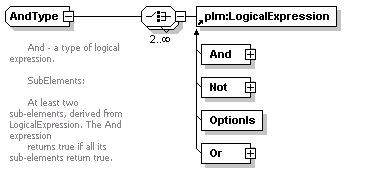 |
||
| namespace | http://www.plmxml.org/Schemas/PLMXMLSchema | ||
| type | extension of plm:LogicalExpressionBase | ||
| children | plm:LogicalExpression | ||
| used by |
|
||
| annotation |
|
||
| source | <xsd:complexType name="AndType"> <xsd:annotation> <xsd:documentation> And - a type of logical expression. SubElements: At least two sub-elements, derived from LogicalExpression. The And expression returns true if all its sub-elements return true. </xsd:documentation> </xsd:annotation> <xsd:complexContent> <xsd:extension base="plm:LogicalExpressionBase"> <xsd:choice minOccurs="2" maxOccurs="unbounded"> <xsd:element ref="plm:LogicalExpression"/> </xsd:choice> </xsd:extension> </xsd:complexContent> </xsd:complexType> |
| diagram | 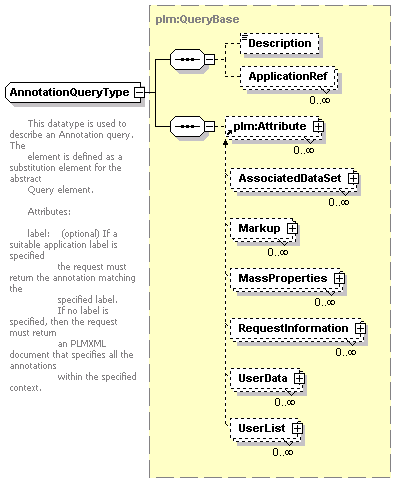 |
||||||||||||||||||||||||
| namespace | http://www.plmxml.org/Schemas/PLMXMLSchema | ||||||||||||||||||||||||
| type | extension of plm:QueryBase | ||||||||||||||||||||||||
| children | Description ApplicationRef plm:Attribute | ||||||||||||||||||||||||
| used by |
|
||||||||||||||||||||||||
| attributes |
|
||||||||||||||||||||||||
| annotation |
|
||||||||||||||||||||||||
| source | <xsd:complexType name="AnnotationQueryType"> <xsd:annotation> <xsd:documentation> This datatype is used to describe an Annotation query. The element is defined as a substitution element for the abstract Query element. Attributes: label: (optional) If a suitable application label is specified the request must return the annotation matching the specified label. If no label is specified, then the request must return an PLMXML document that specifies all the annotations within the specified context. </xsd:documentation> </xsd:annotation> <xsd:complexContent> <xsd:extension base="plm:QueryBase"> <xsd:attribute name="label" type="xsd:string" use="optional"/> </xsd:extension> </xsd:complexContent> </xsd:complexType> |
| diagram |  |
||||||||||||||||||||||||
| namespace | http://www.plmxml.org/Schemas/PLMXMLSchema | ||||||||||||||||||||||||
| used by |
|
||||||||||||||||||||||||
| attributes |
|
||||||||||||||||||||||||
| annotation |
|
||||||||||||||||||||||||
| source | <xsd:complexType name="ApplicationRefType"> <xsd:annotation> <xsd:documentation> The ApplicationRef element is meant to relate the parent element (Part, Representation, etc) back to the owning entity in the sending application. Attributes: application: the context in which the contents of the label and version attributes make sense. Whether this field includes an application version number is up to the application, as long as it starts with something identifiable to the sending application. label: the string which identifies the application entity - the value of this field is only meaningful to the sending/authoring application. The receiving application can compare the contents of the attribute to test if two entities are the 'same' entity. But the actual value is meaningless to the receiving application. version: the optional string attribute which identifies the version of the application entity. This attribute can only be used to test if the versions of an entity are the same (i.e. the test is only meaningful if the label attribute values are the same). No version ordering can be deduced from the value. Similar to the label attribute, the version attribute contents are meaningless to the receiving application. </xsd:documentation> </xsd:annotation> <xsd:attribute name="application" type="xsd:string" use="required"/> <xsd:attribute name="label" type="xsd:string" use="required"/> <xsd:attribute name="version" type="xsd:string" use="optional"/> </xsd:complexType> |
| diagram | |||||||||||||
| namespace | http://www.plmxml.org/Schemas/PLMXMLSchema | ||||||||||||
| type | restriction of plm:MassPropertyRealType | ||||||||||||
| used by |
|
||||||||||||
| attributes |
|
||||||||||||
| source | <xsd:complexType name="AreaType"> <xsd:simpleContent> <xsd:restriction base="plm:MassPropertyRealType"/> </xsd:simpleContent> </xsd:complexType> |
| diagram | 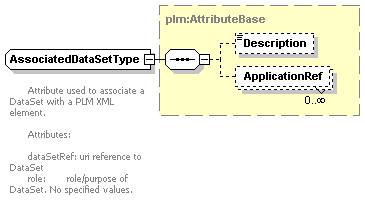 |
||||||||||||||||||||||||
| namespace | http://www.plmxml.org/Schemas/PLMXMLSchema | ||||||||||||||||||||||||
| type | extension of plm:AttributeBase | ||||||||||||||||||||||||
| children | Description ApplicationRef | ||||||||||||||||||||||||
| used by |
|
||||||||||||||||||||||||
| attributes |
|
||||||||||||||||||||||||
| annotation |
|
||||||||||||||||||||||||
| source | <xsd:complexType name="AssociatedDataSetType"> <xsd:annotation> <xsd:documentation> Attribute used to associate a DataSet with a PLM XML element. Attributes: dataSetRef: uri reference to DataSet role: role/purpose of DataSet. No specified values. </xsd:documentation> </xsd:annotation> <xsd:complexContent> <xsd:extension base="plm:AttributeBase"> <xsd:attribute name="dataSetRef" type="plm:anyURIType" use="required"/> <xsd:attribute name="role" type="xsd:string" use="required"/> </xsd:extension> </xsd:complexContent> </xsd:complexType> |
| diagram | 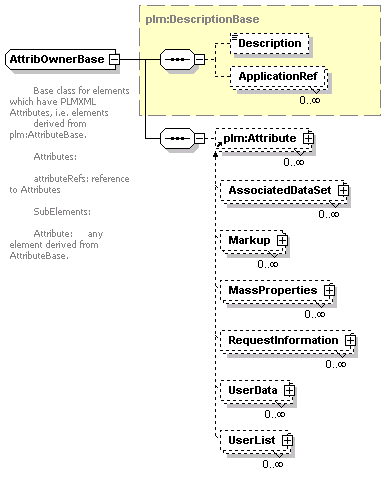 |
||||||||||||||||||
| namespace | http://www.plmxml.org/Schemas/PLMXMLSchema | ||||||||||||||||||
| type | extension of plm:DescriptionBase | ||||||||||||||||||
| children | Description ApplicationRef plm:Attribute | ||||||||||||||||||
| used by | |||||||||||||||||||
| attributes |
|
||||||||||||||||||
| annotation |
|
||||||||||||||||||
| source | <xsd:complexType name="AttribOwnerBase" abstract="true"> <xsd:annotation> <xsd:documentation> Base class for elements which have PLMXML Attributes, i.e. elements derived from plm:AttributeBase. Attributes: attributeRefs: reference to Attributes SubElements: Attribute: any element derived from AttributeBase. </xsd:documentation> </xsd:annotation> <xsd:complexContent> <xsd:extension base="plm:DescriptionBase"> <xsd:sequence> <xsd:element ref="plm:Attribute" minOccurs="0" maxOccurs="unbounded"/> </xsd:sequence> <xsd:attribute name="attributeRefs" type="xsd:IDREFS" use="optional"/> </xsd:extension> </xsd:complexContent> </xsd:complexType> |
| diagram | 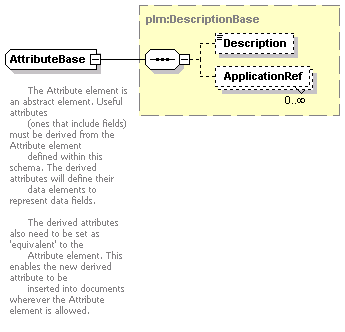 |
||||||||||||
| namespace | http://www.plmxml.org/Schemas/PLMXMLSchema | ||||||||||||
| type | extension of plm:DescriptionBase | ||||||||||||
| children | Description ApplicationRef | ||||||||||||
| used by |
|
||||||||||||
| attributes |
|
||||||||||||
| annotation |
|
||||||||||||
| source | <xsd:complexType name="AttributeBase" abstract="true"> <xsd:annotation> <xsd:documentation> The Attribute element is an abstract element. Useful attributes (ones that include fields) must be derived from the Attribute element defined within this schema. The derived attributes will define their data elements to represent data fields. The derived attributes also need to be set as 'equivalent' to the Attribute element. This enables the new derived attribute to be inserted into documents wherever the Attribute element is allowed. </xsd:documentation> </xsd:annotation> <xsd:complexContent> <xsd:extension base="plm:DescriptionBase"/> </xsd:complexContent> </xsd:complexType> |
| diagram | |||||||||||||
| namespace | http://www.plmxml.org/Schemas/PLMXMLSchema | ||||||||||||
| used by |
|
||||||||||||
| attributes |
|
||||||||||||
| annotation |
|
||||||||||||
| source | <xsd:complexType name="AttributeClassBase" abstract="true"> <xsd:annotation> <xsd:appinfo source="PLMXMLSchemaGenerator">output=ignore</xsd:appinfo> </xsd:annotation> <xsd:attribute name="name" type="plm:AttributeClassType" use="required"/> </xsd:complexType> |
| diagram | |||||||||||||
| namespace | http://www.plmxml.org/Schemas/PLMXMLSchema | ||||||||||||
| used by |
|
||||||||||||
| attributes |
|
||||||||||||
| annotation |
|
||||||||||||
| source | <xsd:complexType name="AttributeLegalOwnerType"> <xsd:annotation> <xsd:appinfo source="PLMXMLSchemaGenerator">output=ignore</xsd:appinfo> </xsd:annotation> <xsd:attribute name="name" type="plm:AttributeOwnerType" use="required"/> </xsd:complexType> |
| diagram | 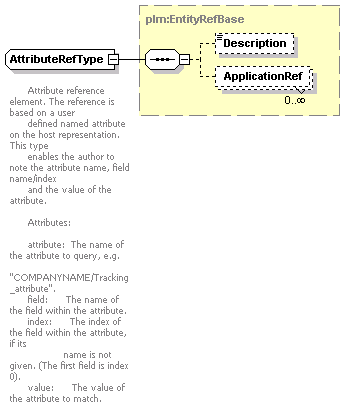 |
||
| namespace | http://www.plmxml.org/Schemas/PLMXMLSchema | ||
| type | extension of plm:EntityRefBase | ||
| children | Description ApplicationRef | ||
| used by |
|
||
| attributes | |||
| annotation |
|
||
| source | <xsd:complexType name="AttributeRefType"> <xsd:annotation> <xsd:documentation> Attribute reference element. The reference is based on a user defined named attribute on the host representation. This type enables the author to note the attribute name, field name/index and the value of the attribute. Attributes: attribute: The name of the attribute to query, e.g. "COMPANYNAME/Tracking_attribute". field: The name of the field within the attribute. index: The index of the field within the attribute, if its name is not given. (The first field is index 0). value: The value of the attribute to match. </xsd:documentation> </xsd:annotation> <xsd:complexContent> <xsd:extension base="plm:EntityRefBase"> <xsd:attribute name="attribute" type="xsd:string" use="required"/> <xsd:attribute name="field" type="xsd:string" use="optional"/> <xsd:attribute name="index" type="xsd:integer" use="optional"/> <xsd:attribute name="value" type="xsd:string" use="required"/> </xsd:extension> </xsd:complexContent> </xsd:complexType> |
| diagram | 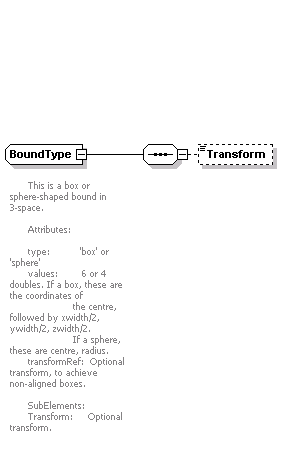 |
||||||||||||||||||||||||
| namespace | http://www.plmxml.org/Schemas/PLMXMLSchema | ||||||||||||||||||||||||
| children | Transform | ||||||||||||||||||||||||
| used by |
|
||||||||||||||||||||||||
| attributes |
|
||||||||||||||||||||||||
| annotation |
|
||||||||||||||||||||||||
| source | <xsd:complexType name="BoundType"> <xsd:annotation> <xsd:documentation> This is a box or sphere-shaped bound in 3-space. Attributes: type: 'box' or 'sphere' values: 6 or 4 doubles. If a box, these are the coordinates of the centre, followed by xwidth/2, ywidth/2, zwidth/2. If a sphere, these are centre, radius. transformRef: Optional transform, to achieve non-aligned boxes. SubElements: Transform: Optional transform. </xsd:documentation> </xsd:annotation> <xsd:sequence> <xsd:element name="Transform" type="plm:TransformType" minOccurs="0"/> </xsd:sequence> <xsd:attribute name="type" type="plm:BoundingType" default="box"/> <xsd:attribute name="values" type="plm:DoubleListType" use="required"/> <xsd:attribute name="transformRef" type="xsd:IDREF" use="optional"/> </xsd:complexType> |
| diagram | |||||||||||||||||||
| namespace | http://www.plmxml.org/Schemas/PLMXMLSchema | ||||||||||||||||||
| type | plm:TransformType | ||||||||||||||||||
| facets |
|
||||||||||||||||||
| attributes |
|
||||||||||||||||||
| source | <xsd:element name="Transform" type="plm:TransformType" minOccurs="0"/> |
| diagram | 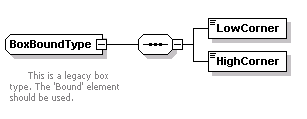 |
||||
| namespace | http://www.plmxml.org/Schemas/PLMXMLSchema | ||||
| children | LowCorner HighCorner | ||||
| used by |
|
||||
| annotation |
|
||||
| source | <xsd:complexType name="BoxBoundType"> <xsd:annotation> <xsd:documentation> This is a legacy box type. The 'Bound' element should be used. </xsd:documentation> <xsd:appinfo source="PLMXMLSchemaGenerator">output=ignore</xsd:appinfo> </xsd:annotation> <xsd:sequence> <xsd:element name="LowCorner" type="plm:VectorType"/> <xsd:element name="HighCorner" type="plm:VectorType"/> </xsd:sequence> </xsd:complexType> |
| diagram | |||
| namespace | http://www.plmxml.org/Schemas/PLMXMLSchema | ||
| type | plm:VectorType | ||
| facets |
|
||
| source | <xsd:element name="LowCorner" type="plm:VectorType"/> |
| diagram | |||
| namespace | http://www.plmxml.org/Schemas/PLMXMLSchema | ||
| type | plm:VectorType | ||
| facets |
|
||
| source | <xsd:element name="HighCorner" type="plm:VectorType"/> |
| diagram | 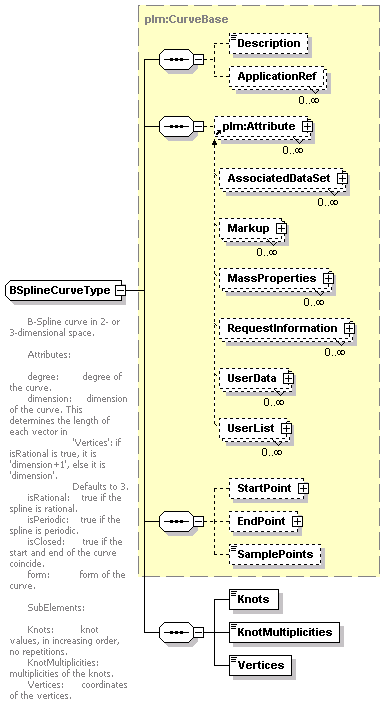 |
||
| namespace | http://www.plmxml.org/Schemas/PLMXMLSchema | ||
| type | extension of plm:CurveBase | ||
| children | Description ApplicationRef plm:Attribute StartPoint EndPoint SamplePoints Knots KnotMultiplicities Vertices | ||
| used by |
|
||
| attributes | |||
| annotation |
|
||
| source | <xsd:complexType name="BSplineCurveType"> <xsd:annotation> <xsd:documentation> B-Spline curve in 2- or 3-dimensional space. Attributes: degree: degree of the curve. dimension: dimension of the curve. This determines the length of each vector in 'Vertices': if isRational is true, it is 'dimension+1', else it is 'dimension'. Defaults to 3. isRational: true if the spline is rational. isPeriodic: true if the spline is periodic. isClosed: true if the start and end of the curve coincide. form: form of the curve. SubElements: Knots: knot values, in increasing order, no repetitions. KnotMultiplicities: multiplicities of the knots. Vertices: coordinates of the vertices. </xsd:documentation> </xsd:annotation> <xsd:complexContent> <xsd:extension base="plm:CurveBase"> <xsd:sequence> <xsd:element name="Knots" type="plm:DoubleListType"/> <xsd:element name="KnotMultiplicities" type="plm:IntegerListType"/> <xsd:element name="Vertices" type="plm:DoubleListType"/> </xsd:sequence> <xsd:attribute name="degree" type="xsd:positiveInteger" use="required"/> <xsd:attribute name="dimension" type="plm:SplineDimensionType" default="3"/> <xsd:attribute name="isRational" type="xsd:boolean" use="required"/> <xsd:attribute name="isPeriodic" type="xsd:boolean" use="required"/> <xsd:attribute name="isClosed" type="xsd:boolean" use="required"/> <xsd:attribute name="form" type="plm:SplineCurveFormType" default="unknown"/> </xsd:extension> </xsd:complexContent> </xsd:complexType> |
| diagram | |
| namespace | http://www.plmxml.org/Schemas/PLMXMLSchema |
| type | plm:DoubleListType |
| source | <xsd:element name="Knots" type="plm:DoubleListType"/> |
| diagram | |
| namespace | http://www.plmxml.org/Schemas/PLMXMLSchema |
| type | plm:IntegerListType |
| source | <xsd:element name="KnotMultiplicities" type="plm:IntegerListType"/> |
| diagram | |
| namespace | http://www.plmxml.org/Schemas/PLMXMLSchema |
| type | plm:DoubleListType |
| source | <xsd:element name="Vertices" type="plm:DoubleListType"/> |
| diagram | 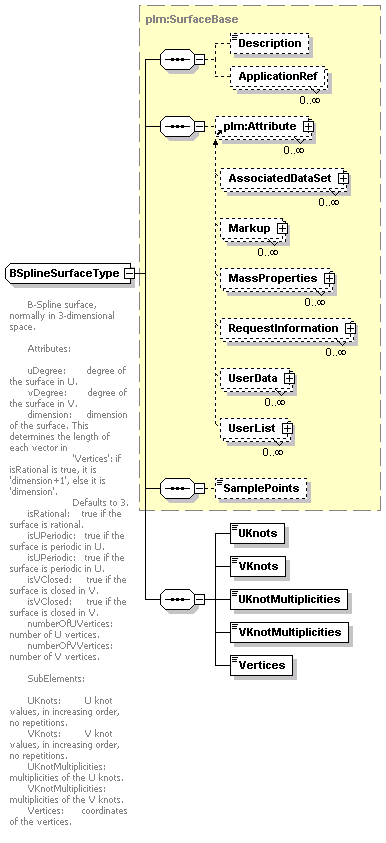 |
||
| namespace | http://www.plmxml.org/Schemas/PLMXMLSchema | ||
| type | extension of plm:SurfaceBase | ||
| children | Description ApplicationRef plm:Attribute SamplePoints UKnots VKnots UKnotMultiplicities VKnotMultiplicities Vertices | ||
| used by |
|
||
| attributes | |||
| annotation |
|
||
| source | <xsd:complexType name="BSplineSurfaceType"> <xsd:annotation> <xsd:documentation> B-Spline surface, normally in 3-dimensional space. Attributes: uDegree: degree of the surface in U. vDegree: degree of the surface in V. dimension: dimension of the surface. This determines the length of each vector in 'Vertices': if isRational is true, it is 'dimension+1', else it is 'dimension'. Defaults to 3. isRational: true if the surface is rational. isUPeriodic: true if the surface is periodic in U. isUPeriodic: true if the surface is periodic in U. isVClosed: true if the surface is closed in V. isVClosed: true if the surface is closed in V. numberOfUVertices: number of U vertices. numberOfVVertices: number of V vertices. SubElements: UKnots: U knot values, in increasing order, no repetitions. VKnots: V knot values, in increasing order, no repetitions. UKnotMultiplicities: multiplicities of the U knots. VKnotMultiplicities: multiplicities of the V knots. Vertices: coordinates of the vertices. </xsd:documentation> </xsd:annotation> <xsd:complexContent> <xsd:extension base="plm:SurfaceBase"> <xsd:sequence> <xsd:element name="UKnots" type="plm:DoubleListType"/> <xsd:element name="VKnots" type="plm:DoubleListType"/> <xsd:element name="UKnotMultiplicities" type="plm:IntegerListType"/> <xsd:element name="VKnotMultiplicities" type="plm:IntegerListType"/> <xsd:element name="Vertices" type="plm:DoubleListType"/> </xsd:sequence> <xsd:attribute name="dimension" type="plm:SplineDimensionType" default="3"/> <xsd:attribute name="numberOfUVertices" type="xsd:positiveInteger" use="required"/> <xsd:attribute name="numberOfVVertices" type="xsd:positiveInteger" use="required"/> <xsd:attribute name="uDegree" type="xsd:positiveInteger" use="required"/> <xsd:attribute name="vDegree" type="xsd:positiveInteger" use="required"/> <xsd:attribute name="isRational" type="xsd:boolean" use="required"/> <xsd:attribute name="isUPeriodic" type="xsd:boolean" use="required"/> <xsd:attribute name="isVPeriodic" type="xsd:boolean" use="required"/> <xsd:attribute name="isUClosed" type="xsd:boolean" use="required"/> <xsd:attribute name="isVClosed" type="xsd:boolean" use="required"/> </xsd:extension> </xsd:complexContent> </xsd:complexType> |
| diagram | |
| namespace | http://www.plmxml.org/Schemas/PLMXMLSchema |
| type | plm:DoubleListType |
| source | <xsd:element name="UKnots" type="plm:DoubleListType"/> |
| diagram | |
| namespace | http://www.plmxml.org/Schemas/PLMXMLSchema |
| type | plm:DoubleListType |
| source | <xsd:element name="VKnots" type="plm:DoubleListType"/> |
| diagram | |
| namespace | http://www.plmxml.org/Schemas/PLMXMLSchema |
| type | plm:IntegerListType |
| source | <xsd:element name="UKnotMultiplicities" type="plm:IntegerListType"/> |
| diagram | |
| namespace | http://www.plmxml.org/Schemas/PLMXMLSchema |
| type | plm:IntegerListType |
| source | <xsd:element name="VKnotMultiplicities" type="plm:IntegerListType"/> |
| diagram | |
| namespace | http://www.plmxml.org/Schemas/PLMXMLSchema |
| type | plm:DoubleListType |
| source | <xsd:element name="Vertices" type="plm:DoubleListType"/> |
| diagram | |||||||||||||
| namespace | http://www.plmxml.org/Schemas/PLMXMLSchema | ||||||||||||
| type | restriction of plm:MassPropertyVectorType | ||||||||||||
| used by |
|
||||||||||||
| facets |
|
||||||||||||
| attributes |
|
||||||||||||
| source | <xsd:complexType name="CentreOfMassType"> <xsd:simpleContent> <xsd:restriction base="plm:MassPropertyVectorType"/> </xsd:simpleContent> </xsd:complexType> |
| diagram | 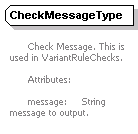 |
||||||||||||
| namespace | http://www.plmxml.org/Schemas/PLMXMLSchema | ||||||||||||
| type | extension of plm:MessageBase | ||||||||||||
| used by |
|
||||||||||||
| attributes |
|
||||||||||||
| annotation |
|
||||||||||||
| source | <xsd:complexType name="CheckMessageType"> <xsd:annotation> <xsd:documentation> Check Message. This is used in VariantRuleChecks. Attributes: message: String message to output. </xsd:documentation> </xsd:annotation> <xsd:complexContent> <xsd:extension base="plm:MessageBase"> <xsd:attribute name="message" type="xsd:string" use="required"/> </xsd:extension> </xsd:complexContent> </xsd:complexType> |
| diagram | 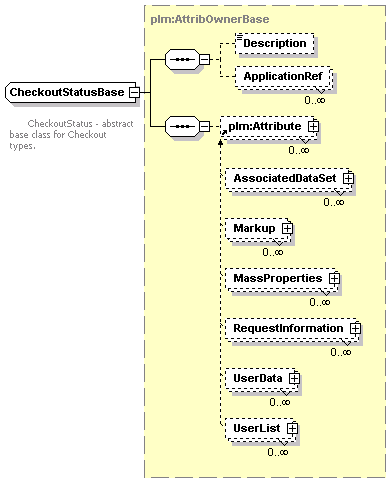 |
||||||||||||||||||
| namespace | http://www.plmxml.org/Schemas/PLMXMLSchema | ||||||||||||||||||
| type | extension of plm:AttribOwnerBase | ||||||||||||||||||
| children | Description ApplicationRef plm:Attribute | ||||||||||||||||||
| used by |
|
||||||||||||||||||
| attributes |
|
||||||||||||||||||
| annotation |
|
||||||||||||||||||
| source | <xsd:complexType name="CheckoutStatusBase" abstract="true"> <xsd:annotation> <xsd:documentation> CheckoutStatus - abstract base class for Checkout types. </xsd:documentation> </xsd:annotation> <xsd:complexContent> <xsd:extension base="plm:AttribOwnerBase"/> </xsd:complexContent> </xsd:complexType> |
| diagram | 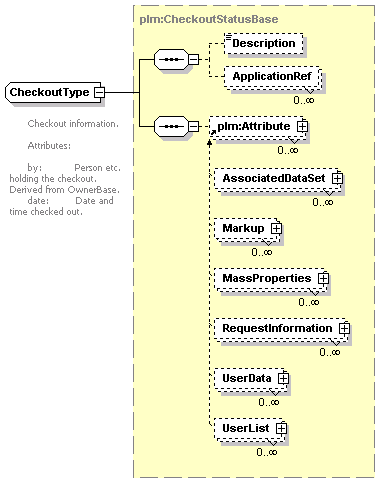 |
||||||||||||||||||||||||||||||
| namespace | http://www.plmxml.org/Schemas/PLMXMLSchema | ||||||||||||||||||||||||||||||
| type | extension of plm:CheckoutStatusBase | ||||||||||||||||||||||||||||||
| children | Description ApplicationRef plm:Attribute | ||||||||||||||||||||||||||||||
| used by |
|
||||||||||||||||||||||||||||||
| attributes |
|
||||||||||||||||||||||||||||||
| annotation |
|
||||||||||||||||||||||||||||||
| source | <xsd:complexType name="CheckoutType"> <xsd:annotation> <xsd:documentation> Checkout information. Attributes: by: Person etc. holding the checkout. Derived from OwnerBase. date: Date and time checked out. </xsd:documentation> </xsd:annotation> <xsd:complexContent> <xsd:extension base="plm:CheckoutStatusBase"> <xsd:attribute name="date" type="xsd:dateTime" use="optional"/> <xsd:attribute name="by" type="plm:anyURIType" use="optional"/> </xsd:extension> </xsd:complexContent> </xsd:complexType> |
| diagram | 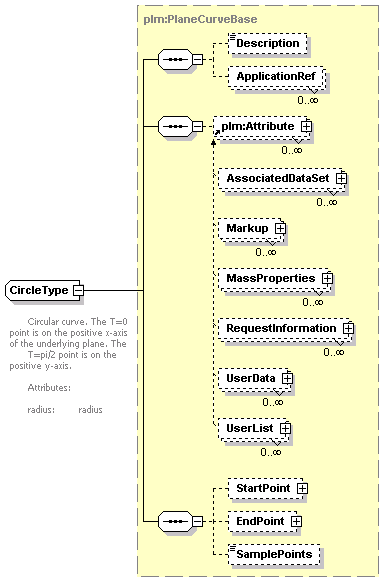 |
||
| namespace | http://www.plmxml.org/Schemas/PLMXMLSchema | ||
| type | extension of plm:PlaneCurveBase | ||
| children | Description ApplicationRef plm:Attribute StartPoint EndPoint SamplePoints | ||
| used by |
|
||
| attributes | |||
| annotation |
|
||
| source | <xsd:complexType name="CircleType"> <xsd:annotation> <xsd:documentation> Circular curve. The T=0 point is on the positive x-axis of the underlying plane. The T=pi/2 point is on the positive y-axis. Attributes: radius: radius </xsd:documentation> </xsd:annotation> <xsd:complexContent> <xsd:extension base="plm:PlaneCurveBase"> <xsd:attribute name="radius" type="xsd:double" use="required"/> </xsd:extension> </xsd:complexContent> </xsd:complexType> |
| diagram | 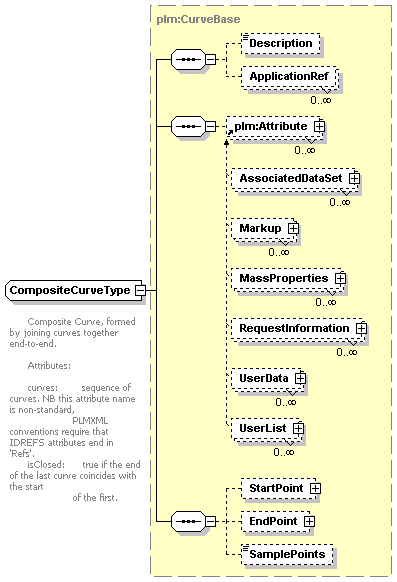 |
||
| namespace | http://www.plmxml.org/Schemas/PLMXMLSchema | ||
| type | extension of plm:CurveBase | ||
| children | Description ApplicationRef plm:Attribute StartPoint EndPoint SamplePoints | ||
| used by |
|
||
| attributes | |||
| annotation |
|
||
| source | <xsd:complexType name="CompositeCurveType"> <xsd:annotation> <xsd:documentation> Composite Curve, formed by joining curves together end-to-end. Attributes: curves: sequence of curves. NB this attribute name is non-standard, PLMXML conventions require that IDREFS attributes end in 'Refs'. isClosed: true if the end of the last curve coincides with the start of the first. </xsd:documentation> </xsd:annotation> <xsd:complexContent> <xsd:extension base="plm:CurveBase"> <xsd:attribute name="curves" type="xsd:IDREFS" use="required"/> <xsd:attribute name="isClosed" type="xsd:boolean" default="false"/> </xsd:extension> </xsd:complexContent> </xsd:complexType> |
| diagram | 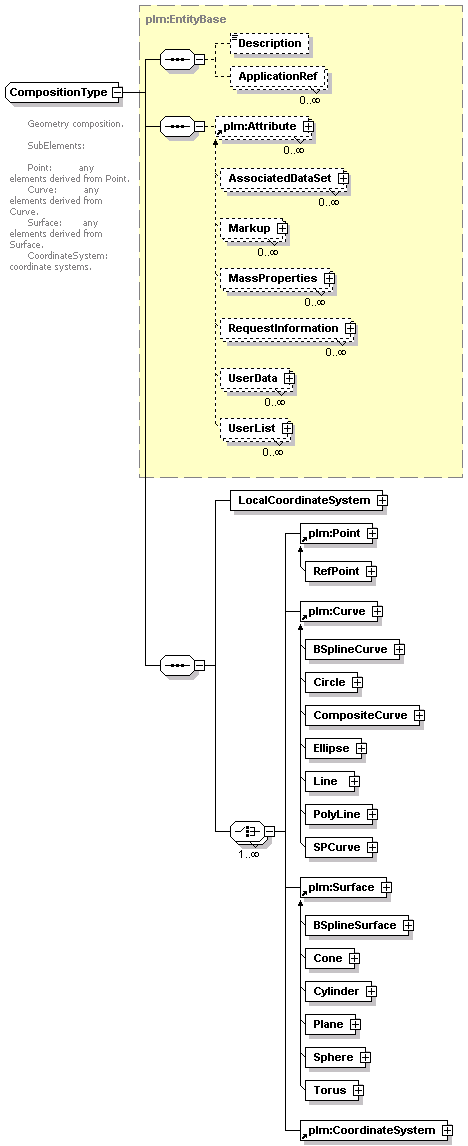 |
||||||||||||||||||||||||
| namespace | http://www.plmxml.org/Schemas/PLMXMLSchema | ||||||||||||||||||||||||
| type | extension of plm:EntityBase | ||||||||||||||||||||||||
| children | Description ApplicationRef plm:Attribute LocalCoordinateSystem plm:Point plm:Curve plm:Surface plm:CoordinateSystem | ||||||||||||||||||||||||
| used by |
|
||||||||||||||||||||||||
| attributes |
|
||||||||||||||||||||||||
| annotation |
|
||||||||||||||||||||||||
| source | <xsd:complexType name="CompositionType"> <xsd:annotation> <xsd:documentation> Geometry composition. SubElements: Point: any elements derived from Point. Curve: any elements derived from Curve. Surface: any elements derived from Surface. CoordinateSystem: coordinate systems. </xsd:documentation> </xsd:annotation> <xsd:complexContent> <xsd:extension base="plm:EntityBase"> <xsd:sequence> <xsd:element name="LocalCoordinateSystem" type="plm:PlanarCoordinateSystemType"/> <xsd:choice maxOccurs="unbounded"> <xsd:element ref="plm:Point"/> <xsd:element ref="plm:Curve"/> <xsd:element ref="plm:Surface"/> <xsd:element ref="plm:CoordinateSystem"/> </xsd:choice> </xsd:sequence> </xsd:extension> </xsd:complexContent> </xsd:complexType> |
| diagram | 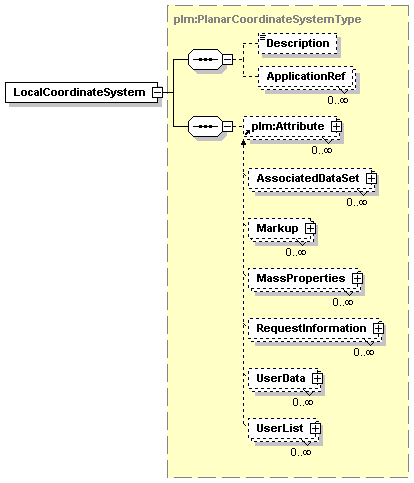 |
||||||||||||||||||||||||||||||||||||||||||
| namespace | http://www.plmxml.org/Schemas/PLMXMLSchema | ||||||||||||||||||||||||||||||||||||||||||
| type | plm:PlanarCoordinateSystemType | ||||||||||||||||||||||||||||||||||||||||||
| children | Description ApplicationRef plm:Attribute | ||||||||||||||||||||||||||||||||||||||||||
| attributes |
|
||||||||||||||||||||||||||||||||||||||||||
| source | <xsd:element name="LocalCoordinateSystem" type="plm:PlanarCoordinateSystemType"/> |
| diagram | 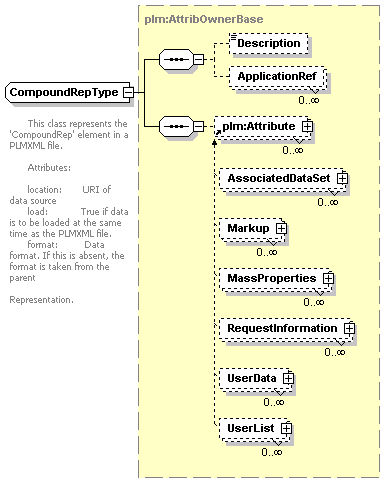 |
||||||||||||||||||||||||||||||||||||
| namespace | http://www.plmxml.org/Schemas/PLMXMLSchema | ||||||||||||||||||||||||||||||||||||
| type | extension of plm:AttribOwnerBase | ||||||||||||||||||||||||||||||||||||
| children | Description ApplicationRef plm:Attribute | ||||||||||||||||||||||||||||||||||||
| used by |
|
||||||||||||||||||||||||||||||||||||
| attributes |
|
||||||||||||||||||||||||||||||||||||
| annotation |
|
||||||||||||||||||||||||||||||||||||
| source | <xsd:complexType name="CompoundRepType"> <xsd:annotation> <xsd:documentation> This class represents the 'CompoundRep' element in a PLMXML file. Attributes: location: URI of data source load: True if data is to be loaded at the same time as the PLMXML file. format: Data format. If this is absent, the format is taken from the parent Representation. </xsd:documentation> </xsd:annotation> <xsd:complexContent> <xsd:extension base="plm:AttribOwnerBase"> <xsd:attributeGroup ref="plm:referenceGroup"/> <xsd:attribute name="format" type="plm:RepresentationFormatType" use="optional"/> </xsd:extension> </xsd:complexContent> </xsd:complexType> |
| diagram | 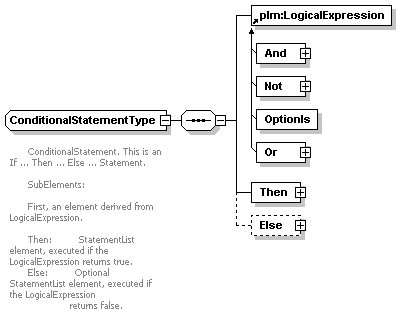 |
||
| namespace | http://www.plmxml.org/Schemas/PLMXMLSchema | ||
| type | extension of plm:StatementBase | ||
| children | plm:LogicalExpression Then Else | ||
| used by |
|
||
| annotation |
|
||
| source | <xsd:complexType name="ConditionalStatementType"> <xsd:annotation> <xsd:documentation> ConditionalStatement. This is an If ... Then ... Else ... Statement. SubElements: First, an element derived from LogicalExpression. Then: StatementList element, executed if the LogicalExpression returns true. Else: Optional StatementList element, executed if the LogicalExpression returns false. </xsd:documentation> </xsd:annotation> <xsd:complexContent> <xsd:extension base="plm:StatementBase"> <xsd:sequence> <xsd:element ref="plm:LogicalExpression"/> <xsd:element name="Then" type="plm:StatementListType"/> <xsd:element name="Else" type="plm:StatementListType" minOccurs="0"/> </xsd:sequence> </xsd:extension> </xsd:complexContent> </xsd:complexType> |
| diagram | 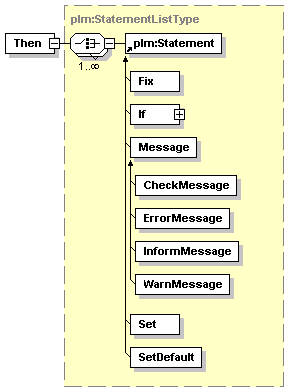 |
| namespace | http://www.plmxml.org/Schemas/PLMXMLSchema |
| type | plm:StatementListType |
| children | plm:Statement |
| source | <xsd:element name="Then" type="plm:StatementListType"/> |
| diagram | 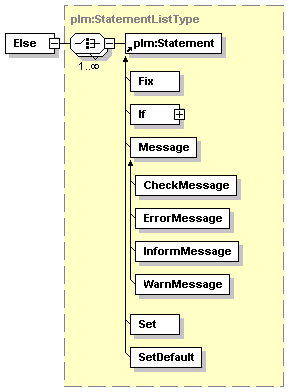 |
| namespace | http://www.plmxml.org/Schemas/PLMXMLSchema |
| type | plm:StatementListType |
| children | plm:Statement |
| source | <xsd:element name="Else" type="plm:StatementListType" minOccurs="0"/> |
| diagram | 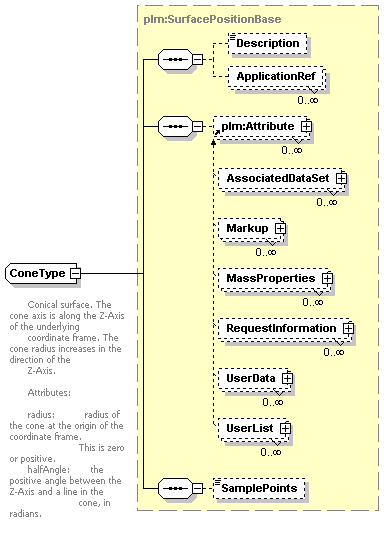 |
||
| namespace | http://www.plmxml.org/Schemas/PLMXMLSchema | ||
| type | extension of plm:SurfacePositionBase | ||
| children | Description ApplicationRef plm:Attribute SamplePoints | ||
| used by |
|
||
| attributes | |||
| annotation |
|
||
| source | <xsd:complexType name="ConeType"> <xsd:annotation> <xsd:documentation> Conical surface. The cone axis is along the Z-Axis of the underlying coordinate frame. The cone radius increases in the direction of the Z-Axis. Attributes: radius: radius of the cone at the origin of the coordinate frame. This is zero or positive. halfAngle: the positive angle between the Z-Axis and a line in the cone, in radians. </xsd:documentation> </xsd:annotation> <xsd:complexContent> <xsd:extension base="plm:SurfacePositionBase"> <xsd:attribute name="radius" type="xsd:double" use="required"/> <xsd:attribute name="halfAngle" type="xsd:double" use="required"/> </xsd:extension> </xsd:complexContent> </xsd:complexType> |
| diagram | 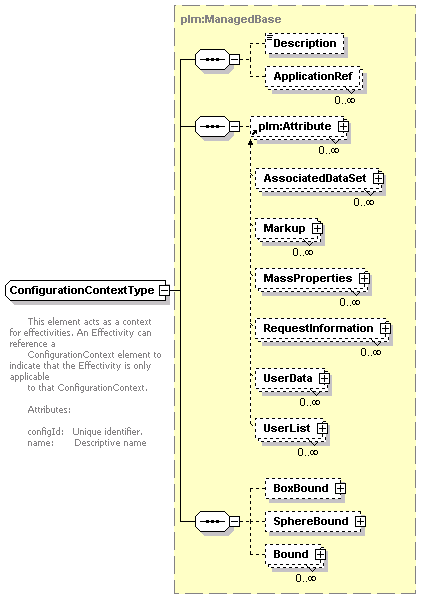 |
||
| namespace | http://www.plmxml.org/Schemas/PLMXMLSchema | ||
| type | extension of plm:ManagedBase | ||
| children | Description ApplicationRef plm:Attribute BoxBound SphereBound Bound | ||
| used by |
|
||
| attributes | |||
| annotation |
|
||
| source | <xsd:complexType name="ConfigurationContextType"> <xsd:annotation> <xsd:documentation> This element acts as a context for effectivities. An Effectivity can reference a ConfigurationContext element to indicate that the Effectivity is only applicable to that ConfigurationContext. Attributes: configId: Unique identifier. name: Descriptive name </xsd:documentation> </xsd:annotation> <xsd:complexContent> <xsd:extension base="plm:ManagedBase"> <xsd:attribute name="name" type="xsd:string" use="optional"/> <xsd:attribute name="configId" type="xsd:string" use="required"/> </xsd:extension> </xsd:complexContent> </xsd:complexType> |
| diagram | 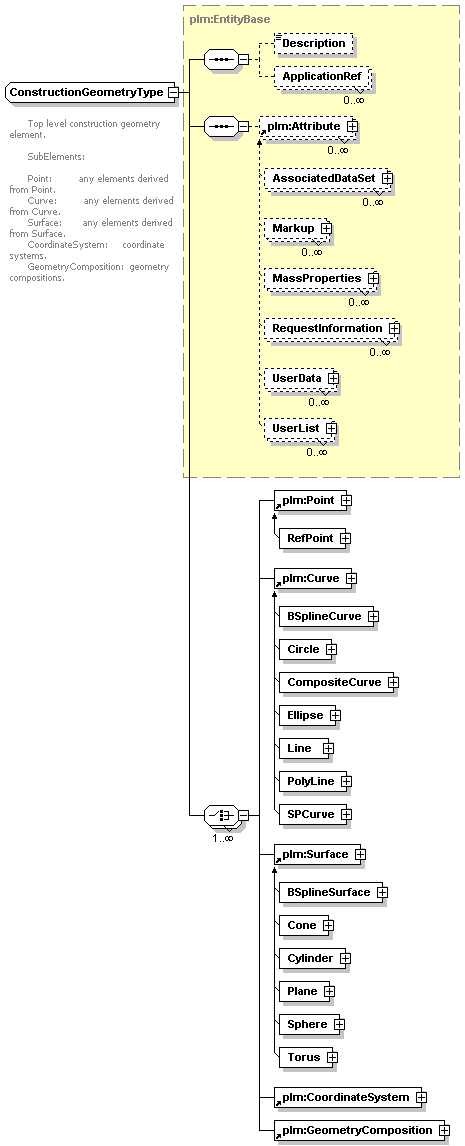 |
||||||||||||||||||||||||
| namespace | http://www.plmxml.org/Schemas/PLMXMLSchema | ||||||||||||||||||||||||
| type | extension of plm:EntityBase | ||||||||||||||||||||||||
| children | Description ApplicationRef plm:Attribute plm:Point plm:Curve plm:Surface plm:CoordinateSystem plm:GeometryComposition | ||||||||||||||||||||||||
| used by |
|
||||||||||||||||||||||||
| attributes |
|
||||||||||||||||||||||||
| annotation |
|
||||||||||||||||||||||||
| source | <xsd:complexType name="ConstructionGeometryType"> <xsd:annotation> <xsd:documentation> Top level construction geometry element. SubElements: Point: any elements derived from Point. Curve: any elements derived from Curve. Surface: any elements derived from Surface. CoordinateSystem: coordinate systems. GeometryComposition: geometry compositions. </xsd:documentation> </xsd:annotation> <xsd:complexContent> <xsd:extension base="plm:EntityBase"> <xsd:choice maxOccurs="unbounded"> <xsd:element ref="plm:Point"/> <xsd:element ref="plm:Curve"/> <xsd:element ref="plm:Surface"/> <xsd:element ref="plm:CoordinateSystem"/> <xsd:element ref="plm:GeometryComposition"/> </xsd:choice> </xsd:extension> </xsd:complexContent> </xsd:complexType> |
| diagram | 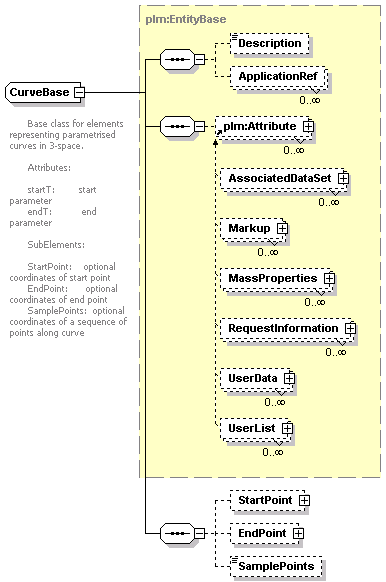 |
||||||||||||||||||||||||||||||||||||
| namespace | http://www.plmxml.org/Schemas/PLMXMLSchema | ||||||||||||||||||||||||||||||||||||
| type | extension of plm:EntityBase | ||||||||||||||||||||||||||||||||||||
| children | Description ApplicationRef plm:Attribute StartPoint EndPoint SamplePoints | ||||||||||||||||||||||||||||||||||||
| used by |
|
||||||||||||||||||||||||||||||||||||
| attributes |
|
||||||||||||||||||||||||||||||||||||
| annotation |
|
||||||||||||||||||||||||||||||||||||
| source | <xsd:complexType name="CurveBase" abstract="true"> <xsd:annotation> <xsd:documentation> Base class for elements representing parametrised curves in 3-space. Attributes: startT: start parameter endT: end parameter SubElements: StartPoint: optional coordinates of start point EndPoint: optional coordinates of end point SamplePoints: optional coordinates of a sequence of points along curve </xsd:documentation> </xsd:annotation> <xsd:complexContent> <xsd:extension base="plm:EntityBase"> <xsd:sequence> <xsd:element name="StartPoint" type="plm:ReferencePointType" minOccurs="0"/> <xsd:element name="EndPoint" type="plm:ReferencePointType" minOccurs="0"/> <xsd:element name="SamplePoints" type="plm:SamplePointsType" minOccurs="0"/> </xsd:sequence> <xsd:attribute name="startT" type="xsd:double" use="optional"/> <xsd:attribute name="endT" type="xsd:double" use="optional"/> </xsd:extension> </xsd:complexContent> </xsd:complexType> |
| diagram | 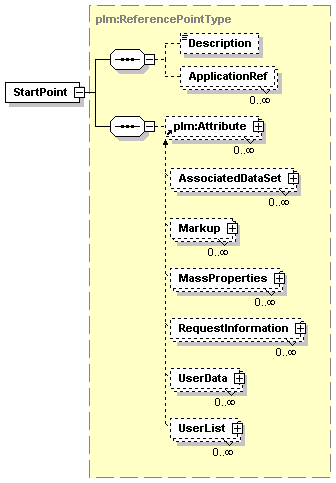 |
||||||||||||||||||||||||||||||
| namespace | http://www.plmxml.org/Schemas/PLMXMLSchema | ||||||||||||||||||||||||||||||
| type | plm:ReferencePointType | ||||||||||||||||||||||||||||||
| children | Description ApplicationRef plm:Attribute | ||||||||||||||||||||||||||||||
| attributes |
|
||||||||||||||||||||||||||||||
| source | <xsd:element name="StartPoint" type="plm:ReferencePointType" minOccurs="0"/> |
| diagram | 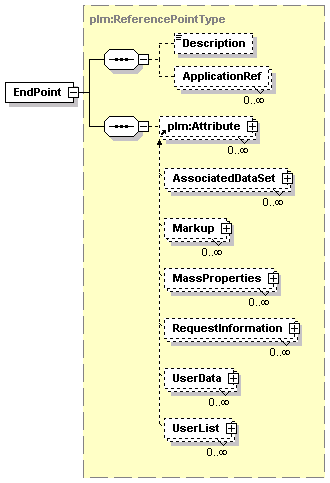 |
||||||||||||||||||||||||||||||
| namespace | http://www.plmxml.org/Schemas/PLMXMLSchema | ||||||||||||||||||||||||||||||
| type | plm:ReferencePointType | ||||||||||||||||||||||||||||||
| children | Description ApplicationRef plm:Attribute | ||||||||||||||||||||||||||||||
| attributes |
|
||||||||||||||||||||||||||||||
| source | <xsd:element name="EndPoint" type="plm:ReferencePointType" minOccurs="0"/> |
| diagram | |||||||||||||
| namespace | http://www.plmxml.org/Schemas/PLMXMLSchema | ||||||||||||
| type | plm:SamplePointsType | ||||||||||||
| attributes |
|
||||||||||||
| source | <xsd:element name="SamplePoints" type="plm:SamplePointsType" minOccurs="0"/> |
| diagram | 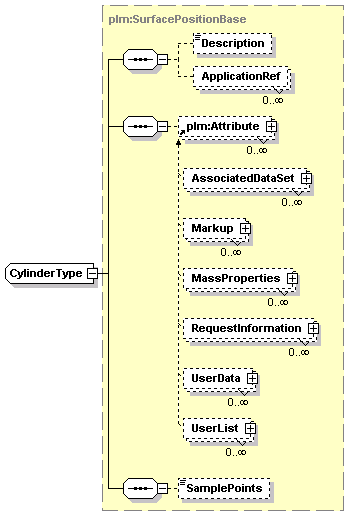 |
||
| namespace | http://www.plmxml.org/Schemas/PLMXMLSchema | ||
| type | extension of plm:SurfacePositionBase | ||
| children | Description ApplicationRef plm:Attribute SamplePoints | ||
| used by |
|
||
| attributes | |||
| source | <xsd:complexType name="CylinderType"> <xsd:complexContent> <xsd:extension base="plm:SurfacePositionBase"> <xsd:attribute name="radius" type="xsd:double" use="required"/> </xsd:extension> </xsd:complexContent> </xsd:complexType> |
| diagram | 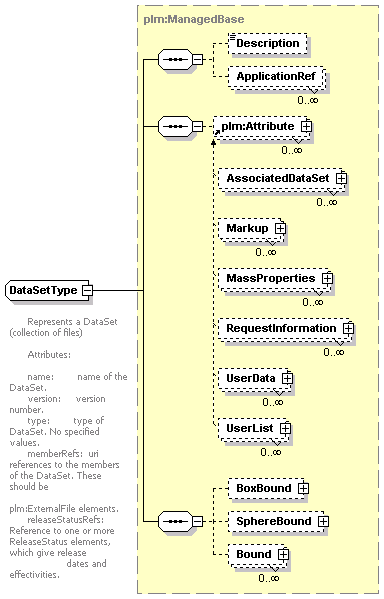 |
||
| namespace | http://www.plmxml.org/Schemas/PLMXMLSchema | ||
| type | extension of plm:ManagedBase | ||
| children | Description ApplicationRef plm:Attribute BoxBound SphereBound Bound | ||
| used by |
|
||
| attributes | |||
| annotation |
|
||
| source | <xsd:complexType name="DataSetType"> <xsd:annotation> <xsd:documentation> Represents a DataSet (collection of files) Attributes: name: name of the DataSet. version: version number. type: type of DataSet. No specified values. memberRefs: uri references to the members of the DataSet. These should be plm:ExternalFile elements. releaseStatusRefs: Reference to one or more ReleaseStatus elements, which give release dates and effectivities. </xsd:documentation> </xsd:annotation> <xsd:complexContent> <xsd:extension base="plm:ManagedBase"> <xsd:attribute name="name" type="xsd:string" use="optional"/> <xsd:attribute name="version" type="xsd:nonNegativeInteger" use="optional"/> <xsd:attribute name="type" type="xsd:string" use="optional"/> <xsd:attribute name="memberRefs" type="plm:uriReferenceListType" use="required"/> <xsd:attribute name="releaseStatusRefs" type="plm:uriReferenceListType" use="optional"/> </xsd:extension> </xsd:complexContent> </xsd:complexType> |
| diagram | 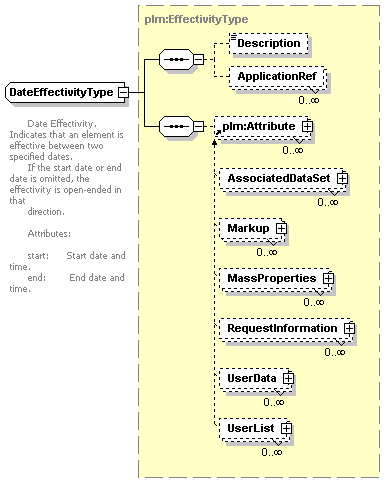 |
||||||||||||||||||||||||||||||||||||
| namespace | http://www.plmxml.org/Schemas/PLMXMLSchema | ||||||||||||||||||||||||||||||||||||
| type | extension of plm:EffectivityType | ||||||||||||||||||||||||||||||||||||
| children | Description ApplicationRef plm:Attribute | ||||||||||||||||||||||||||||||||||||
| used by |
|
||||||||||||||||||||||||||||||||||||
| attributes |
|
||||||||||||||||||||||||||||||||||||
| annotation |
|
||||||||||||||||||||||||||||||||||||
| source | <xsd:complexType name="DateEffectivityType"> <xsd:annotation> <xsd:documentation> Date Effectivity. Indicates that an element is effective between two specified dates. If the start date or end date is omitted, the effectivity is open-ended in that direction. Attributes: start: Start date and time. end: End date and time. </xsd:documentation> </xsd:annotation> <xsd:complexContent> <xsd:extension base="plm:EffectivityType"> <xsd:attribute name="start" type="xsd:dateTime" use="optional"/> <xsd:attribute name="end" type="xsd:dateTime" use="optional"/> </xsd:extension> </xsd:complexContent> </xsd:complexType> |
| diagram | |||||||||||||
| namespace | http://www.plmxml.org/Schemas/PLMXMLSchema | ||||||||||||
| type | restriction of plm:MassPropertyRealType | ||||||||||||
| used by |
|
||||||||||||
| attributes |
|
||||||||||||
| source | <xsd:complexType name="DensityType"> <xsd:simpleContent> <xsd:restriction base="plm:MassPropertyRealType"/> </xsd:simpleContent> </xsd:complexType> |
| diagram | 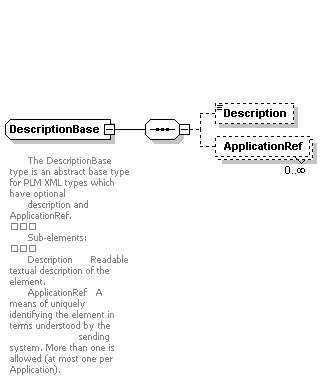 |
||||||||||||
| namespace | http://www.plmxml.org/Schemas/PLMXMLSchema | ||||||||||||
| type | extension of plm:IdBase | ||||||||||||
| children | Description ApplicationRef | ||||||||||||
| used by |
|
||||||||||||
| attributes |
|
||||||||||||
| annotation |
|
||||||||||||
| source | <xsd:complexType name="DescriptionBase" abstract="true"> <xsd:annotation> <xsd:appinfo source="PLMXMLSchemaGenerator">sdkname=DescriptionObject</xsd:appinfo> <xsd:documentation> The DescriptionBase type is an abstract base type for PLM XML types which have optional description and ApplicationRef. Sub-elements: Description Readable textual description of the element. ApplicationRef A means of uniquely identifying the element in terms understood by the sending system. More than one is allowed (at most one per Application). </xsd:documentation> </xsd:annotation> <xsd:complexContent> <xsd:extension base="plm:IdBase"> <xsd:sequence> <xsd:element name="Description" type="plm:DescriptionType" minOccurs="0"/> <xsd:element name="ApplicationRef" type="plm:ApplicationRefType" minOccurs="0" maxOccurs="unbounded"/> </xsd:sequence> </xsd:extension> </xsd:complexContent> </xsd:complexType> |
| diagram | |
| namespace | http://www.plmxml.org/Schemas/PLMXMLSchema |
| type | plm:DescriptionType |
| source | <xsd:element name="Description" type="plm:DescriptionType" minOccurs="0"/> |
| diagram | |||||||||||||||||||||||||
| namespace | http://www.plmxml.org/Schemas/PLMXMLSchema | ||||||||||||||||||||||||
| type | plm:ApplicationRefType | ||||||||||||||||||||||||
| attributes |
|
||||||||||||||||||||||||
| source | <xsd:element name="ApplicationRef" type="plm:ApplicationRefType" minOccurs="0" maxOccurs="unbounded"/> |
| diagram | 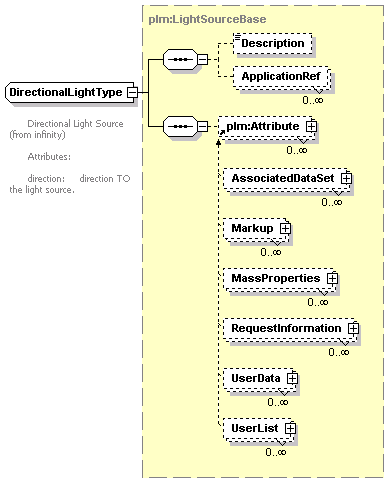 |
||
| namespace | http://www.plmxml.org/Schemas/PLMXMLSchema | ||
| type | extension of plm:LightSourceBase | ||
| children | Description ApplicationRef plm:Attribute | ||
| used by |
|
||
| attributes | |||
| annotation |
|
||
| source | <xsd:complexType name="DirectionalLightType"> <xsd:annotation> <xsd:documentation> Directional Light Source (from infinity) Attributes: direction: direction TO the light source. </xsd:documentation> </xsd:annotation> <xsd:complexContent> <xsd:extension base="plm:LightSourceBase"> <xsd:attribute name="direction" type="plm:VectorType" default="0.0 0.0 1.0"/> </xsd:extension> </xsd:complexContent> </xsd:complexType> |
| diagram | 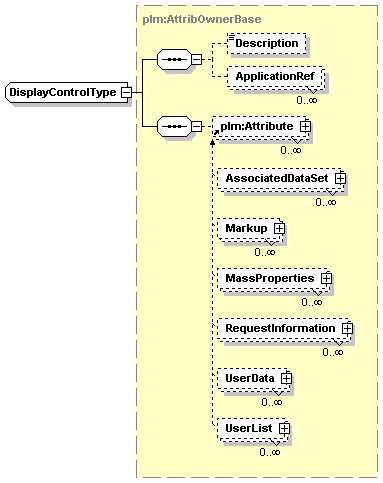 |
||
| namespace | http://www.plmxml.org/Schemas/PLMXMLSchema | ||
| type | extension of plm:AttribOwnerBase | ||
| children | Description ApplicationRef plm:Attribute | ||
| used by |
|
||
| attributes | |||
| source | <xsd:complexType name="DisplayControlType"> <xsd:complexContent> <xsd:extension base="plm:AttribOwnerBase"> <xsd:attribute name="name" type="xsd:string" use="optional"/> <xsd:attribute name="drawingStyle" type="plm:DrawingStyleType" default="shaded"/> <xsd:attribute name="shadingStyle" type="plm:ShadingStyleType" default="flat"/> <xsd:attribute name="backgroundColour" type="plm:RGBType" default="0.0 0.0 0.0"/> <xsd:attribute name="lightSourceRefs" type="xsd:IDREFS" use="optional"/> </xsd:extension> </xsd:complexContent> </xsd:complexType> |
| diagram | 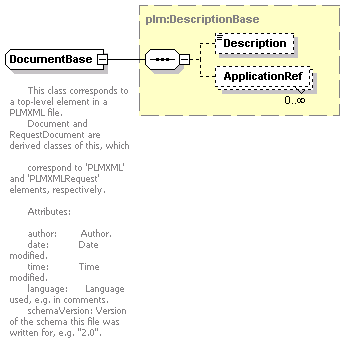 |
||||||||||||||||||||||||||||||||||||||||||
| namespace | http://www.plmxml.org/Schemas/PLMXMLSchema | ||||||||||||||||||||||||||||||||||||||||||
| type | extension of plm:DescriptionBase | ||||||||||||||||||||||||||||||||||||||||||
| children | Description ApplicationRef | ||||||||||||||||||||||||||||||||||||||||||
| used by |
|
||||||||||||||||||||||||||||||||||||||||||
| attributes |
|
||||||||||||||||||||||||||||||||||||||||||
| annotation |
|
||||||||||||||||||||||||||||||||||||||||||
| source | <xsd:complexType name="DocumentBase" abstract="true"> <xsd:annotation> <xsd:appinfo source="PLMXMLSchemaGenerator">sdkname=DocumentBase</xsd:appinfo> <xsd:documentation> This class corresponds to a top-level element in a PLMXML file. Document and RequestDocument are derived classes of this, which correspond to 'PLMXML' and 'PLMXMLRequest' elements, respectively. Attributes: author: Author. date: Date modified. time: Time modified. language: Language used, e.g. in comments. schemaVersion: Version of the schema this file was written for, e.g. "2.0". </xsd:documentation> </xsd:annotation> <xsd:complexContent> <xsd:extension base="plm:DescriptionBase"> <xsd:attribute name="schemaVersion" type="xsd:decimal" use="required"/> <xsd:attribute name="author" type="xsd:string" use="required"/> <xsd:attribute name="time" type="xsd:time" use="required"/> <xsd:attribute name="date" type="xsd:date" use="required"/> <xsd:attribute name="language" type="xsd:language" default="en"/> </xsd:extension> </xsd:complexContent> </xsd:complexType> |
| diagram | 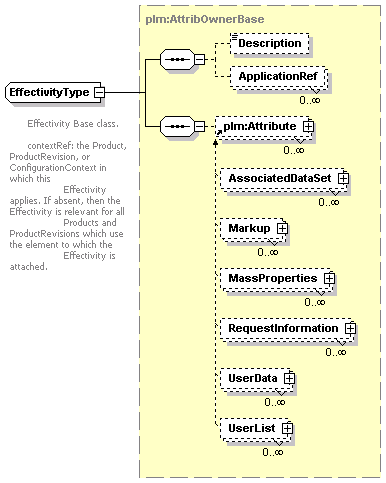 |
||||||||||||||||||||||||
| namespace | http://www.plmxml.org/Schemas/PLMXMLSchema | ||||||||||||||||||||||||
| type | extension of plm:AttribOwnerBase | ||||||||||||||||||||||||
| children | Description ApplicationRef plm:Attribute | ||||||||||||||||||||||||
| used by |
|
||||||||||||||||||||||||
| attributes |
|
||||||||||||||||||||||||
| annotation |
|
||||||||||||||||||||||||
| source | <xsd:complexType name="EffectivityType"> <xsd:annotation> <xsd:documentation> Effectivity Base class. contextRef: the Product, ProductRevision, or ConfigurationContext in which this Effectivity applies. If absent, then the Effectivity is relevant for all Products and ProductRevisions which use the element to which the Effectivity is attached. </xsd:documentation> </xsd:annotation> <xsd:complexContent> <xsd:extension base="plm:AttribOwnerBase"> <xsd:attribute name="contextRef" type="plm:anyURIType" use="optional"/> </xsd:extension> </xsd:complexContent> </xsd:complexType> |
| diagram | 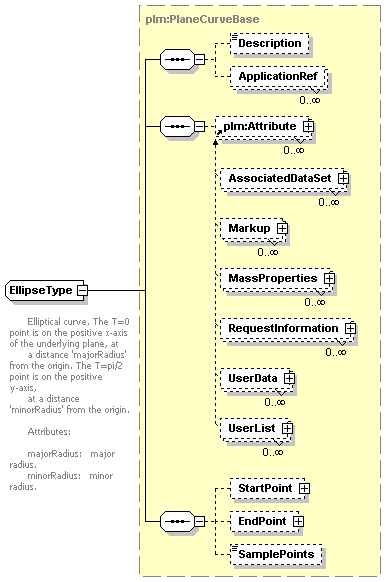 |
||
| namespace | http://www.plmxml.org/Schemas/PLMXMLSchema | ||
| type | extension of plm:PlaneCurveBase | ||
| children | Description ApplicationRef plm:Attribute StartPoint EndPoint SamplePoints | ||
| used by |
|
||
| attributes | |||
| annotation |
|
||
| source | <xsd:complexType name="EllipseType"> <xsd:annotation> <xsd:documentation> Elliptical curve. The T=0 point is on the positive x-axis of the underlying plane, at a distance 'majorRadius' from the origin. The T=pi/2 point is on the positive y-axis, at a distance 'minorRadius' from the origin. Attributes: majorRadius: major radius. minorRadius: minor radius. </xsd:documentation> </xsd:annotation> <xsd:complexContent> <xsd:extension base="plm:PlaneCurveBase"> <xsd:attribute name="majorRadius" type="xsd:double" use="required"/> <xsd:attribute name="minorRadius" type="xsd:double" use="required"/> </xsd:extension> </xsd:complexContent> </xsd:complexType> |
| diagram | 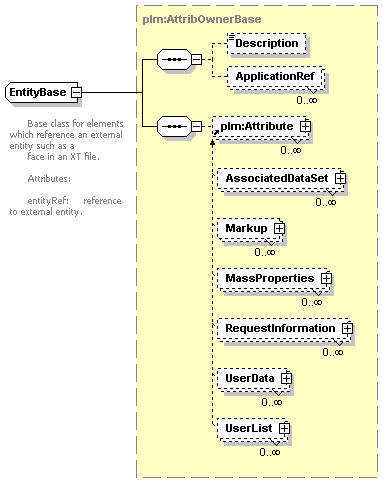 |
||||||||||||||||||||||||
| namespace | http://www.plmxml.org/Schemas/PLMXMLSchema | ||||||||||||||||||||||||
| type | extension of plm:AttribOwnerBase | ||||||||||||||||||||||||
| children | Description ApplicationRef plm:Attribute | ||||||||||||||||||||||||
| used by |
|
||||||||||||||||||||||||
| attributes |
|
||||||||||||||||||||||||
| annotation |
|
||||||||||||||||||||||||
| source | <xsd:complexType name="EntityBase" abstract="true"> <xsd:annotation> <xsd:documentation> Base class for elements which reference an external entity such as a face in an XT file. Attributes: entityRef: reference to external entity. </xsd:documentation> <xsd:appinfo source="PLMXMLSchemaGenerator">sdkname=EntityObject</xsd:appinfo> </xsd:annotation> <xsd:complexContent> <xsd:extension base="plm:AttribOwnerBase"> <xsd:attribute name="entityRef" type="plm:anyURIType" use="optional"/> </xsd:extension> </xsd:complexContent> </xsd:complexType> |
| diagram | 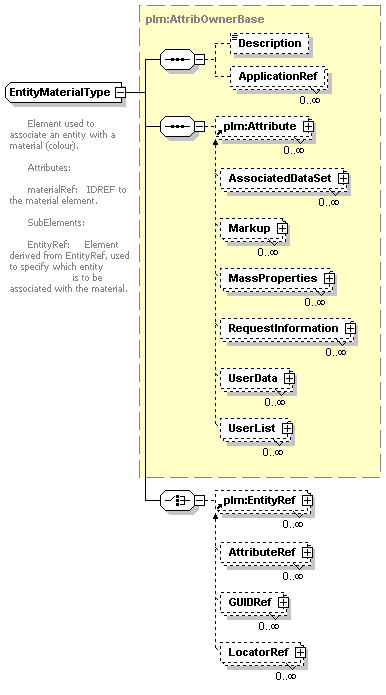 |
||||||||||||||||||||||||
| namespace | http://www.plmxml.org/Schemas/PLMXMLSchema | ||||||||||||||||||||||||
| type | extension of plm:AttribOwnerBase | ||||||||||||||||||||||||
| children | Description ApplicationRef plm:Attribute plm:EntityRef | ||||||||||||||||||||||||
| used by |
|
||||||||||||||||||||||||
| attributes |
|
||||||||||||||||||||||||
| annotation |
|
||||||||||||||||||||||||
| source | <xsd:complexType name="EntityMaterialType"> <xsd:annotation> <xsd:documentation> Element used to associate an entity with a material (colour). Attributes: materialRef: IDREF to the material element. SubElements: EntityRef: Element derived from EntityRef, used to specify which entity is to be associated with the material. </xsd:documentation> </xsd:annotation> <xsd:complexContent> <xsd:extension base="plm:AttribOwnerBase"> <xsd:choice> <xsd:element ref="plm:EntityRef" minOccurs="0" maxOccurs="unbounded"/> </xsd:choice> <xsd:attribute name="materialRef" type="xsd:IDREF" use="required"/> </xsd:extension> </xsd:complexContent> </xsd:complexType> |
| diagram | 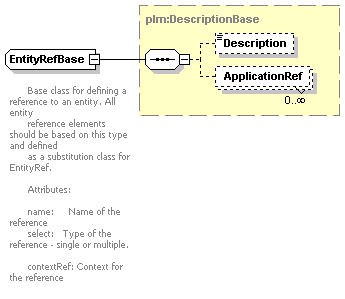 |
||||||||||||||||||||||||||||||
| namespace | http://www.plmxml.org/Schemas/PLMXMLSchema | ||||||||||||||||||||||||||||||
| type | extension of plm:DescriptionBase | ||||||||||||||||||||||||||||||
| children | Description ApplicationRef | ||||||||||||||||||||||||||||||
| used by |
|
||||||||||||||||||||||||||||||
| attributes |
|
||||||||||||||||||||||||||||||
| annotation |
|
||||||||||||||||||||||||||||||
| source | <xsd:complexType name="EntityRefBase" abstract="true"> <xsd:annotation> <xsd:documentation> Base class for defining a reference to an entity. All entity reference elements should be based on this type and defined as a substitution class for EntityRef. Attributes: name: Name of the reference select: Type of the reference - single or multiple. contextRef: Context for the reference </xsd:documentation> </xsd:annotation> <xsd:complexContent> <xsd:extension base="plm:DescriptionBase"> <xsd:attribute name="name" type="xsd:string" use="optional"/> <xsd:attribute name="contextRef" type="plm:anyURIType" use="optional"/> <xsd:attribute name="select" type="plm:RefSelectType" default="single"/> </xsd:extension> </xsd:complexContent> </xsd:complexType> |
| diagram | 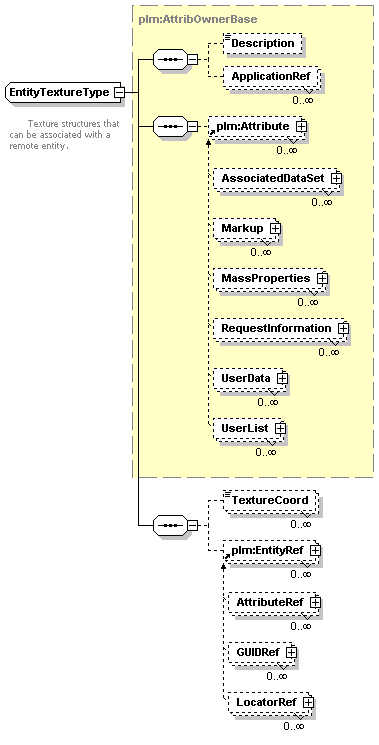 |
||||||||||||||||||||||||
| namespace | http://www.plmxml.org/Schemas/PLMXMLSchema | ||||||||||||||||||||||||
| type | extension of plm:AttribOwnerBase | ||||||||||||||||||||||||
| children | Description ApplicationRef plm:Attribute TextureCoord plm:EntityRef | ||||||||||||||||||||||||
| used by |
|
||||||||||||||||||||||||
| attributes |
|
||||||||||||||||||||||||
| annotation |
|
||||||||||||||||||||||||
| source | <xsd:complexType name="EntityTextureType"> <xsd:annotation> <xsd:documentation> Texture structures that can be associated with a remote entity. </xsd:documentation> </xsd:annotation> <xsd:complexContent> <xsd:extension base="plm:AttribOwnerBase"> <xsd:sequence> <xsd:element name="TextureCoord" type="plm:TextureCoordType" minOccurs="0" maxOccurs="unbounded"/> <xsd:element ref="plm:EntityRef" minOccurs="0" maxOccurs="unbounded"/> </xsd:sequence> <xsd:attribute name="textureRef" type="xsd:IDREF" use="required"/> </xsd:extension> </xsd:complexContent> </xsd:complexType> |
| diagram | |||||||||||||||||||||||||||||||
| namespace | http://www.plmxml.org/Schemas/PLMXMLSchema | ||||||||||||||||||||||||||||||
| type | plm:TextureCoordType | ||||||||||||||||||||||||||||||
| facets |
|
||||||||||||||||||||||||||||||
| attributes |
|
||||||||||||||||||||||||||||||
| source | <xsd:element name="TextureCoord" type="plm:TextureCoordType" minOccurs="0" maxOccurs="unbounded"/> |
| diagram | 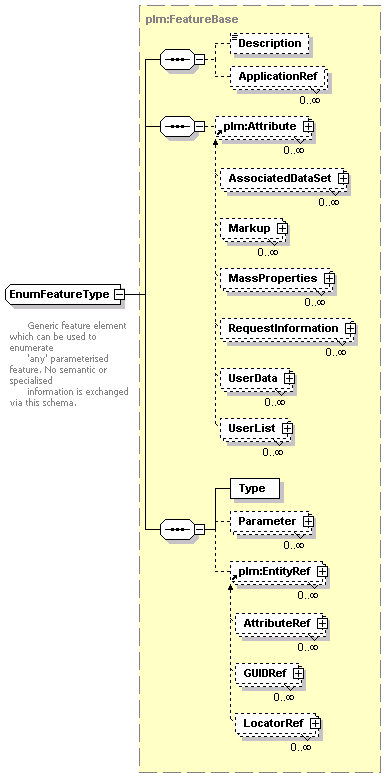 |
||||||||||||||||||||||||||||||||||||||||||||||||||||||
| namespace | http://www.plmxml.org/Schemas/PLMXMLSchema | ||||||||||||||||||||||||||||||||||||||||||||||||||||||
| type | extension of plm:FeatureBase | ||||||||||||||||||||||||||||||||||||||||||||||||||||||
| children | Description ApplicationRef plm:Attribute Type Parameter plm:EntityRef | ||||||||||||||||||||||||||||||||||||||||||||||||||||||
| used by |
|
||||||||||||||||||||||||||||||||||||||||||||||||||||||
| attributes |
|
||||||||||||||||||||||||||||||||||||||||||||||||||||||
| annotation |
|
||||||||||||||||||||||||||||||||||||||||||||||||||||||
| source | <xsd:complexType name="EnumFeatureType"> <xsd:annotation> <xsd:documentation> Generic feature element which can be used to enumerate 'any' parameterised feature. No semantic or specialised information is exchanged via this schema. </xsd:documentation> </xsd:annotation> <xsd:complexContent> <xsd:extension base="plm:FeatureBase"/> </xsd:complexContent> </xsd:complexType> |
| diagram | 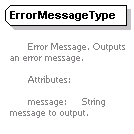 |
||||||||||||
| namespace | http://www.plmxml.org/Schemas/PLMXMLSchema | ||||||||||||
| type | extension of plm:MessageBase | ||||||||||||
| used by |
|
||||||||||||
| attributes |
|
||||||||||||
| annotation |
|
||||||||||||
| source | <xsd:complexType name="ErrorMessageType"> <xsd:annotation> <xsd:documentation> Error Message. Outputs an error message. Attributes: message: String message to output. </xsd:documentation> </xsd:annotation> <xsd:complexContent> <xsd:extension base="plm:MessageBase"> <xsd:attribute name="message" type="xsd:string" use="required"/> </xsd:extension> </xsd:complexContent> </xsd:complexType> |
| diagram |  |
||||
| namespace | http://www.plmxml.org/Schemas/PLMXMLSchema | ||||
| type | extension of plm:OperandBase | ||||
| used by |
|
||||
| annotation |
|
||||
| source | <xsd:complexType name="ExpressionBase" abstract="true"> <xsd:annotation> <xsd:documentation> Expression - abstract base class for Expressions. </xsd:documentation> </xsd:annotation> <xsd:complexContent> <xsd:extension base="plm:OperandBase"/> </xsd:complexContent> </xsd:complexType> |
| diagram | 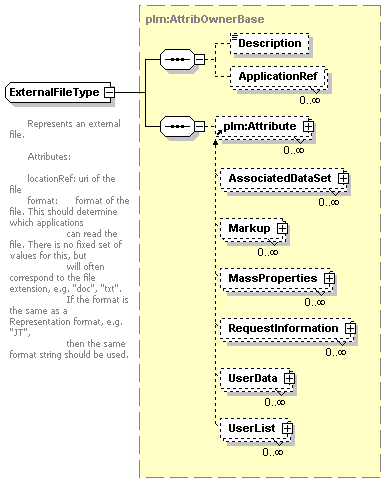 |
||||||||||||||||||||||||||||||
| namespace | http://www.plmxml.org/Schemas/PLMXMLSchema | ||||||||||||||||||||||||||||||
| type | extension of plm:AttribOwnerBase | ||||||||||||||||||||||||||||||
| children | Description ApplicationRef plm:Attribute | ||||||||||||||||||||||||||||||
| used by |
|
||||||||||||||||||||||||||||||
| attributes |
|
||||||||||||||||||||||||||||||
| annotation |
|
||||||||||||||||||||||||||||||
| source | <xsd:complexType name="ExternalFileType"> <xsd:annotation> <xsd:documentation> Represents an external file. Attributes: locationRef: uri of the file format: format of the file. This should determine which applications can read the file. There is no fixed set of values for this, but will often correspond to the file extension, e.g. "doc", "txt". If the format is the same as a Representation format, e.g. "JT", then the same format string should be used. </xsd:documentation> </xsd:annotation> <xsd:complexContent> <xsd:extension base="plm:AttribOwnerBase"> <xsd:attribute name="locationRef" type="plm:anyURIType" use="required"/> <xsd:attribute name="format" type="xsd:string" use="required"/> </xsd:extension> </xsd:complexContent> </xsd:complexType> |
| diagram | 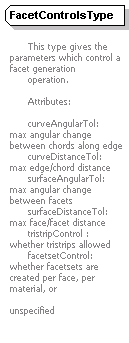 |
||
| namespace | http://www.plmxml.org/Schemas/PLMXMLSchema | ||
| used by |
|
||
| attributes | |||
| annotation |
|
||
| source | <xsd:complexType name="FacetControlsType"> <xsd:annotation> <xsd:documentation> This type gives the parameters which control a facet generation operation. Attributes: curveAngularTol: max angular change between chords along edge curveDistanceTol: max edge/chord distance surfaceAngularTol: max angular change between facets surfaceDistanceTol: max face/facet distance tristripControl : whether tristrips allowed facetsetControl: whether facetsets are created per face, per material, or unspecified </xsd:documentation> </xsd:annotation> <xsd:attribute name="curveAngularTol" type="xsd:double" use="optional"/> <xsd:attribute name="curveDistanceTol" type="xsd:double" use="optional"/> <xsd:attribute name="surfaceAngularTol" type="xsd:double" use="optional"/> <xsd:attribute name="surfaceDistanceTol" type="xsd:double" use="optional"/> <xsd:attribute name="tristripControl" type="plm:TristripControl" use="optional"/> <xsd:attribute name="facetsetControl" type="plm:FacetsetControl" use="optional"/> </xsd:complexType> |
| diagram | 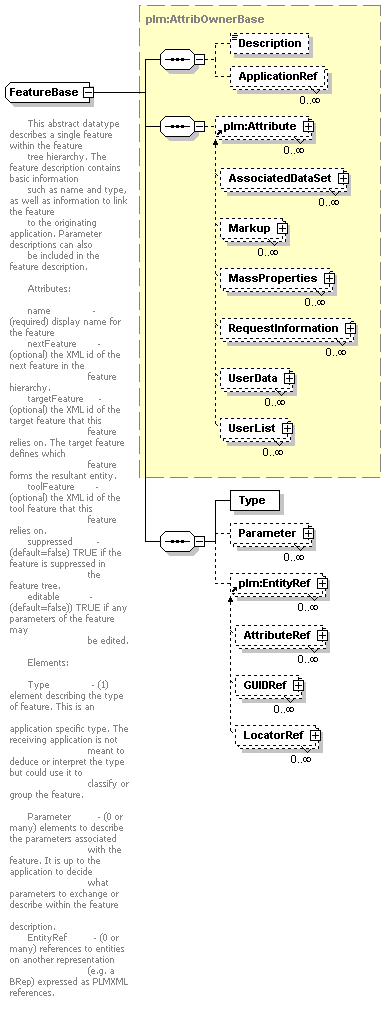 |
||||
| namespace | http://www.plmxml.org/Schemas/PLMXMLSchema | ||||
| type | extension of plm:AttribOwnerBase | ||||
| children | Description ApplicationRef plm:Attribute Type Parameter plm:EntityRef | ||||
| used by |
|
||||
| attributes | |||||
| annotation |
|
||||
| source | <xsd:complexType name="FeatureBase" abstract="true"> <xsd:annotation> <xsd:documentation> This abstract datatype describes a single feature within the feature tree hierarchy. The feature description contains basic information such as name and type, as well as information to link the feature to the originating application. Parameter descriptions can also be included in the feature description. Attributes: name - (required) display name for the feature nextFeature - (optional) the XML id of the next feature in the feature hierarchy. targetFeature - (optional) the XML id of the target feature that this feature relies on. The target feature defines which feature forms the resultant entity. toolFeature - (optional) the XML id of the tool feature that this feature relies on. suppressed - (default=false) TRUE if the feature is suppressed in the feature tree. editable - (default=false)) TRUE if any parameters of the feature may be edited. Elements: Type - (1) element describing the type of feature. This is an application specific type. The receiving application is not meant to deduce or interpret the type but could use it to classify or group the feature. Parameter - (0 or many) elements to describe the parameters associated with the feature. It is up to the application to decide what parameters to exchange or describe within the feature description. EntityRef - (0 or many) references to entities on another representation (e.g. a BRep) expressed as PLMXML references. </xsd:documentation> </xsd:annotation> <xsd:complexContent> <xsd:extension base="plm:AttribOwnerBase"> <xsd:sequence> <xsd:element name="Type" type="plm:UserEnumDataType"/> <xsd:element name="Parameter" type="plm:UserDataElementType" minOccurs="0" maxOccurs="unbounded"/> <xsd:element ref="plm:EntityRef" minOccurs="0" maxOccurs="unbounded"/> </xsd:sequence> <xsd:attribute name="name" type="xsd:string" use="required"/> <xsd:attribute name="nextFeature" type="xsd:IDREF" use="optional"/> <xsd:attribute name="targetFeature" type="xsd:IDREF" use="optional"/> <xsd:attribute name="toolFeature" type="xsd:IDREF" use="optional"/> <xsd:attribute name="suppressed" type="xsd:boolean" default="false"/> <xsd:attribute name="editable" type="xsd:boolean" default="false"/> </xsd:extension> </xsd:complexContent> </xsd:complexType> |
| diagram | |||||||||||||||||||
| namespace | http://www.plmxml.org/Schemas/PLMXMLSchema | ||||||||||||||||||
| type | plm:UserEnumDataType | ||||||||||||||||||
| attributes |
|
||||||||||||||||||
| source | <xsd:element name="Type" type="plm:UserEnumDataType"/> |
| diagram |  |
||||||||||||||||||||||||||||||||||||||||||||||||||||||||||||||||||||||||||||||||||||
| namespace | http://www.plmxml.org/Schemas/PLMXMLSchema | ||||||||||||||||||||||||||||||||||||||||||||||||||||||||||||||||||||||||||||||||||||
| type | plm:UserDataElementType | ||||||||||||||||||||||||||||||||||||||||||||||||||||||||||||||||||||||||||||||||||||
| children | UserList | ||||||||||||||||||||||||||||||||||||||||||||||||||||||||||||||||||||||||||||||||||||
| attributes |
|
||||||||||||||||||||||||||||||||||||||||||||||||||||||||||||||||||||||||||||||||||||
| source | <xsd:element name="Parameter" type="plm:UserDataElementType" minOccurs="0" maxOccurs="unbounded"/> |
| diagram | 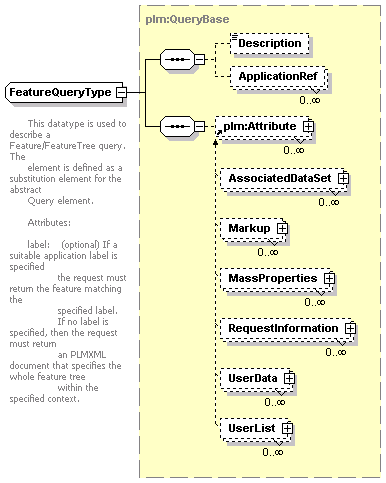 |
||||||||||||||||||||||||
| namespace | http://www.plmxml.org/Schemas/PLMXMLSchema | ||||||||||||||||||||||||
| type | extension of plm:QueryBase | ||||||||||||||||||||||||
| children | Description ApplicationRef plm:Attribute | ||||||||||||||||||||||||
| used by |
|
||||||||||||||||||||||||
| attributes |
|
||||||||||||||||||||||||
| annotation |
|
||||||||||||||||||||||||
| source | <xsd:complexType name="FeatureQueryType"> <xsd:annotation> <xsd:documentation> This datatype is used to describe a Feature/FeatureTree query. The element is defined as a substitution element for the abstract Query element. Attributes: label: (optional) If a suitable application label is specified the request must return the feature matching the specified label. If no label is specified, then the request must return an PLMXML document that specifies the whole feature tree within the specified context. </xsd:documentation> </xsd:annotation> <xsd:complexContent> <xsd:extension base="plm:QueryBase"> <xsd:attribute name="label" type="xsd:string" use="optional"/> </xsd:extension> </xsd:complexContent> </xsd:complexType> |
| diagram | 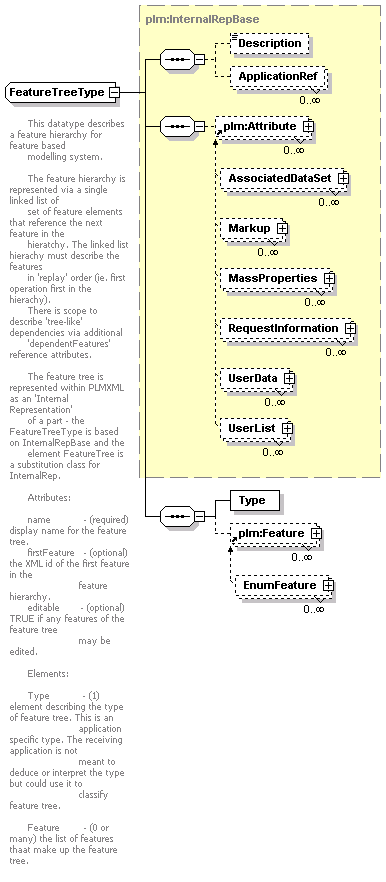 |
||||||||||||||||||||||||||||||||||||
| namespace | http://www.plmxml.org/Schemas/PLMXMLSchema | ||||||||||||||||||||||||||||||||||||
| type | extension of plm:InternalRepBase | ||||||||||||||||||||||||||||||||||||
| children | Description ApplicationRef plm:Attribute Type plm:Feature | ||||||||||||||||||||||||||||||||||||
| used by |
|
||||||||||||||||||||||||||||||||||||
| attributes |
|
||||||||||||||||||||||||||||||||||||
| annotation |
|
||||||||||||||||||||||||||||||||||||
| source | <xsd:complexType name="FeatureTreeType"> <xsd:annotation> <xsd:documentation> This datatype describes a feature hierarchy for feature based modelling system. The feature hierarchy is represented via a single linked list of set of feature elements that reference the next feature in the hieratchy. The linked list hierachy must describe the features in 'replay' order (ie. first operation first in the hierachy). There is scope to describe 'tree-like' dependencies via additional 'dependentFeatures' reference attributes. The feature tree is represented within PLMXML as an 'Internal Representation' of a part - the FeatureTreeType is based on InternalRepBase and the element FeatureTree is a substitution class for InternalRep. Attributes: name - (required) display name for the feature tree. firstFeature - (optional) the XML id of the first feature in the feature hierarchy. editable - (optional) TRUE if any features of the feature tree may be edited. Elements: Type - (1) element describing the type of feature tree. This is an application specific type. The receiving application is not meant to deduce or interpret the type but could use it to classify feature tree. Feature - (0 or many) the list of features thaat make up the feature tree. </xsd:documentation> </xsd:annotation> <xsd:complexContent> <xsd:extension base="plm:InternalRepBase"> <xsd:sequence> <xsd:element name="Type" type="plm:UserEnumDataType"/> <xsd:element ref="plm:Feature" minOccurs="0" maxOccurs="unbounded"/> </xsd:sequence> <xsd:attribute name="name" type="xsd:string" use="required"/> <xsd:attribute name="firstFeature" type="xsd:IDREF" use="optional"/> <xsd:attribute name="editable" type="xsd:boolean" default="false"/> </xsd:extension> </xsd:complexContent> </xsd:complexType> |
| diagram | |||||||||||||||||||
| namespace | http://www.plmxml.org/Schemas/PLMXMLSchema | ||||||||||||||||||
| type | plm:UserEnumDataType | ||||||||||||||||||
| attributes |
|
||||||||||||||||||
| source | <xsd:element name="Type" type="plm:UserEnumDataType"/> |
| diagram | 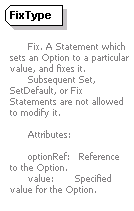 |
||||||||||||||||||
| namespace | http://www.plmxml.org/Schemas/PLMXMLSchema | ||||||||||||||||||
| type | extension of plm:StatementBase | ||||||||||||||||||
| used by |
|
||||||||||||||||||
| attributes |
|
||||||||||||||||||
| annotation |
|
||||||||||||||||||
| source | <xsd:complexType name="FixType"> <xsd:annotation> <xsd:documentation> Fix. A Statement which sets an Option to a particular value, and fixes it. Subsequent Set, SetDefault, or Fix Statements are not allowed to modify it. Attributes: optionRef: Reference to the Option. value: Specified value for the Option. </xsd:documentation> </xsd:annotation> <xsd:complexContent> <xsd:extension base="plm:StatementBase"> <xsd:attribute name="optionRef" type="plm:anyURIType" use="required"/> <xsd:attribute name="value" type="xsd:string" use="required"/> </xsd:extension> </xsd:complexContent> </xsd:complexType> |
| diagram | 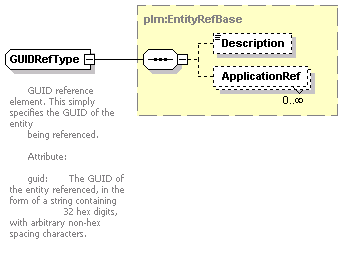 |
||||||||||||||||||||||||||||||||||||
| namespace | http://www.plmxml.org/Schemas/PLMXMLSchema | ||||||||||||||||||||||||||||||||||||
| type | extension of plm:EntityRefBase | ||||||||||||||||||||||||||||||||||||
| children | Description ApplicationRef | ||||||||||||||||||||||||||||||||||||
| used by |
|
||||||||||||||||||||||||||||||||||||
| attributes |
|
||||||||||||||||||||||||||||||||||||
| annotation |
|
||||||||||||||||||||||||||||||||||||
| source | <xsd:complexType name="GUIDRefType"> <xsd:annotation> <xsd:documentation> GUID reference element. This simply specifies the GUID of the entity being referenced. Attribute: guid: The GUID of the entity referenced, in the form of a string containing 32 hex digits, with arbitrary non-hex spacing characters. </xsd:documentation> </xsd:annotation> <xsd:complexContent> <xsd:extension base="plm:EntityRefBase"> <xsd:attribute name="guid" type="xsd:string" use="required"/> </xsd:extension> </xsd:complexContent> </xsd:complexType> |
| diagram | |||||||||||||
| namespace | http://www.plmxml.org/Schemas/PLMXMLSchema | ||||||||||||
| used by |
|
||||||||||||
| attributes |
|
||||||||||||
| annotation |
|
||||||||||||
| source | <xsd:complexType name="IdBase" abstract="true"> <xsd:annotation> <xsd:appinfo source="PLMXMLSchemaGenerator">sdkname=IdObject</xsd:appinfo> </xsd:annotation> <xsd:attributeGroup ref="plm:idGroup"/> </xsd:complexType> |
| diagram | 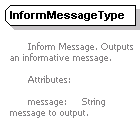 |
||||||||||||
| namespace | http://www.plmxml.org/Schemas/PLMXMLSchema | ||||||||||||
| type | extension of plm:MessageBase | ||||||||||||
| used by |
|
||||||||||||
| attributes |
|
||||||||||||
| annotation |
|
||||||||||||
| source | <xsd:complexType name="InformMessageType"> <xsd:annotation> <xsd:documentation> Inform Message. Outputs an informative message. Attributes: message: String message to output. </xsd:documentation> </xsd:annotation> <xsd:complexContent> <xsd:extension base="plm:MessageBase"> <xsd:attribute name="message" type="xsd:string" use="required"/> </xsd:extension> </xsd:complexContent> </xsd:complexType> |
| diagram | 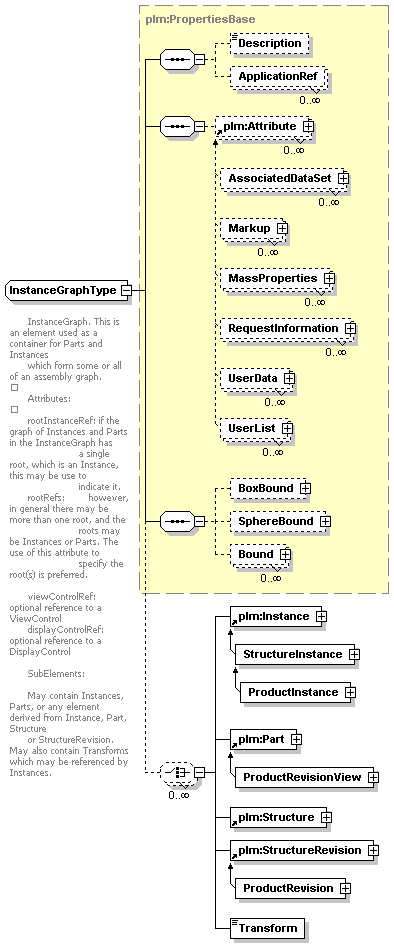 |
||
| namespace | http://www.plmxml.org/Schemas/PLMXMLSchema | ||
| type | extension of plm:PropertiesBase | ||
| children | Description ApplicationRef plm:Attribute BoxBound SphereBound Bound plm:Instance plm:Part plm:Structure plm:StructureRevision Transform | ||
| used by |
|
||
| attributes | |||
| annotation |
|
||
| source | <xsd:complexType name="InstanceGraphType"> <xsd:annotation> <xsd:documentation> InstanceGraph. This is an element used as a container for Parts and Instances which form some or all of an assembly graph. Attributes: rootInstanceRef: if the graph of Instances and Parts in the InstanceGraph has a single root, which is an Instance, this may be use to indicate it. rootRefs: however, in general there may be more than one root, and the roots may be Instances or Parts. The use of this attribute to specify the root(s) is preferred. viewControlRef: optional reference to a ViewControl displayControlRef: optional reference to a DisplayControl SubElements: May contain Instances, Parts, or any element derived from Instance, Part, Structure or StructureRevision. May also contain Transforms which may be referenced by Instances. </xsd:documentation> </xsd:annotation> <xsd:complexContent> <xsd:extension base="plm:PropertiesBase"> <xsd:choice minOccurs="0" maxOccurs="unbounded"> <xsd:element ref="plm:Instance"/> <xsd:element ref="plm:Part"/> <xsd:element ref="plm:Structure"/> <xsd:element ref="plm:StructureRevision"/> <xsd:element name="Transform" type="plm:TransformType"/> </xsd:choice> <xsd:attribute name="rootInstanceRef" type="xsd:IDREF" use="optional"/> <xsd:attribute name="rootRefs" type="xsd:IDREFS" use="optional"/> <xsd:attribute name="viewControlRef" type="xsd:IDREF" use="optional"/> <xsd:attribute name="displayControlRef" type="xsd:IDREF" use="optional"/> </xsd:extension> </xsd:complexContent> </xsd:complexType> |
| diagram | |||||||||||||||||||
| namespace | http://www.plmxml.org/Schemas/PLMXMLSchema | ||||||||||||||||||
| type | plm:TransformType | ||||||||||||||||||
| facets |
|
||||||||||||||||||
| attributes |
|
||||||||||||||||||
| source | <xsd:element name="Transform" type="plm:TransformType"/> |
| diagram | 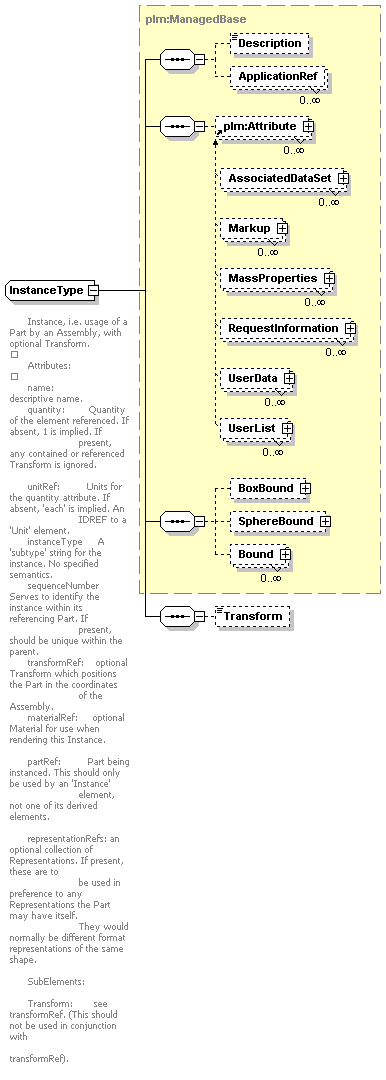 |
||||
| namespace | http://www.plmxml.org/Schemas/PLMXMLSchema | ||||
| type | extension of plm:ManagedBase | ||||
| children | Description ApplicationRef plm:Attribute BoxBound SphereBound Bound Transform | ||||
| used by |
|
||||
| attributes | |||||
| annotation |
|
||||
| source | <xsd:complexType name="InstanceType"> <xsd:annotation> <xsd:documentation> Instance, i.e. usage of a Part by an Assembly, with optional Transform. Attributes: name: descriptive name. quantity: Quantity of the element referenced. If absent, 1 is implied. If present, any contained or referenced Transform is ignored. unitRef: Units for the quantity attribute. If absent, 'each' is implied. An IDREF to a 'Unit' element. instanceType A 'subtype' string for the instance. No specified semantics. sequenceNumber Serves to identify the instance within its referencing Part. If present, should be unique within the parent. transformRef: optional Transform which positions the Part in the coordinates of the Assembly. materialRef: optional Material for use when rendering this Instance. partRef: Part being instanced. This should only be used by an 'Instance' element, not one of its derived elements. representationRefs: an optional collection of Representations. If present, these are to be used in preference to any Representations the Part may have itself. They would normally be different format representations of the same shape. SubElements: Transform: see transformRef. (This should not be used in conjunction with transformRef). </xsd:documentation> </xsd:annotation> <xsd:complexContent> <xsd:extension base="plm:ManagedBase"> <xsd:sequence> <xsd:element name="Transform" type="plm:TransformType" minOccurs="0"/> </xsd:sequence> <xsd:attribute name="name" type="xsd:string" use="optional"/> <xsd:attribute name="partRef" type="plm:anyURIType" use="optional"/> <xsd:attribute name="transformRef" type="xsd:IDREF" use="optional"/> <xsd:attribute name="materialRef" type="xsd:IDREF" use="optional"/> <xsd:attribute name="quantity" type="xsd:double" use="optional"/> <xsd:attribute name="unitRef" type="xsd:IDREF" use="optional"/> <xsd:attribute name="instanceType" type="xsd:string" use="optional"/> <xsd:attribute name="sequenceNumber" type="xsd:nonNegativeInteger" use="optional"/> <xsd:attribute name="representationRefs" type="plm:uriReferenceListType" use="optional"/> </xsd:extension> </xsd:complexContent> </xsd:complexType> |
| diagram | |||||||||||||||||||
| namespace | http://www.plmxml.org/Schemas/PLMXMLSchema | ||||||||||||||||||
| type | plm:TransformType | ||||||||||||||||||
| facets |
|
||||||||||||||||||
| attributes |
|
||||||||||||||||||
| source | <xsd:element name="Transform" type="plm:TransformType" minOccurs="0"/> |
| diagram | 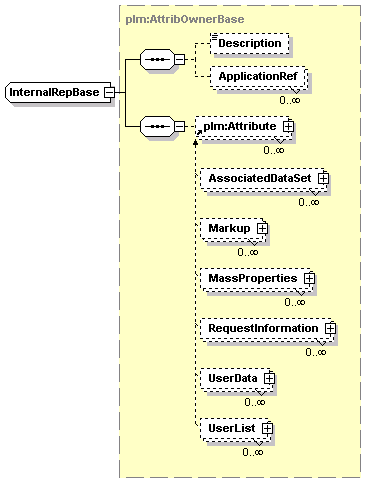 |
||||||||||||||||||
| namespace | http://www.plmxml.org/Schemas/PLMXMLSchema | ||||||||||||||||||
| type | extension of plm:AttribOwnerBase | ||||||||||||||||||
| children | Description ApplicationRef plm:Attribute | ||||||||||||||||||
| used by |
|
||||||||||||||||||
| attributes |
|
||||||||||||||||||
| source | <xsd:complexType name="InternalRepBase" abstract="true"> <xsd:complexContent> <xsd:extension base="plm:AttribOwnerBase"/> </xsd:complexContent> </xsd:complexType> |
| diagram | |||||||||||||
| namespace | http://www.plmxml.org/Schemas/PLMXMLSchema | ||||||||||||
| type | restriction of plm:MassPropertyRealType | ||||||||||||
| used by |
|
||||||||||||
| attributes |
|
||||||||||||
| source | <xsd:complexType name="LengthType"> <xsd:simpleContent> <xsd:restriction base="plm:MassPropertyRealType"/> </xsd:simpleContent> </xsd:complexType> |
| diagram | 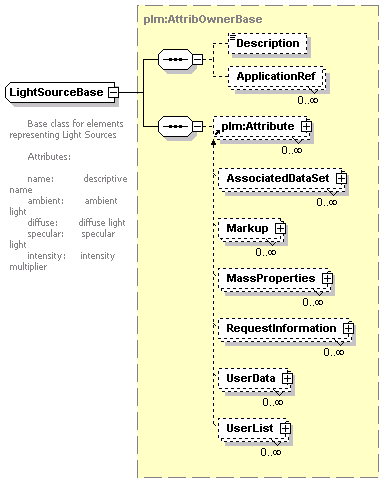 |
||||
| namespace | http://www.plmxml.org/Schemas/PLMXMLSchema | ||||
| type | extension of plm:AttribOwnerBase | ||||
| children | Description ApplicationRef plm:Attribute | ||||
| used by |
|
||||
| attributes | |||||
| annotation |
|
||||
| source | <xsd:complexType name="LightSourceBase" abstract="true"> <xsd:annotation> <xsd:documentation> Base class for elements representing Light Sources Attributes: name: descriptive name ambient: ambient light diffuse: diffuse light specular: specular light intensity: intensity multiplier </xsd:documentation> </xsd:annotation> <xsd:complexContent> <xsd:extension base="plm:AttribOwnerBase"> <xsd:attribute name="name" type="xsd:string" use="optional"/> <xsd:attribute name="ambient" type="plm:RGBType" default="0.0 0.0 0.0"/> <xsd:attribute name="diffuse" type="plm:RGBType" default="1.0 1.0 1.0"/> <xsd:attribute name="specular" type="plm:RGBType" default="1.0 1.0 1.0"/> <xsd:attribute name="intensity" type="plm:AlphaType" default="1.0"/> </xsd:extension> </xsd:complexContent> </xsd:complexType> |
| diagram | 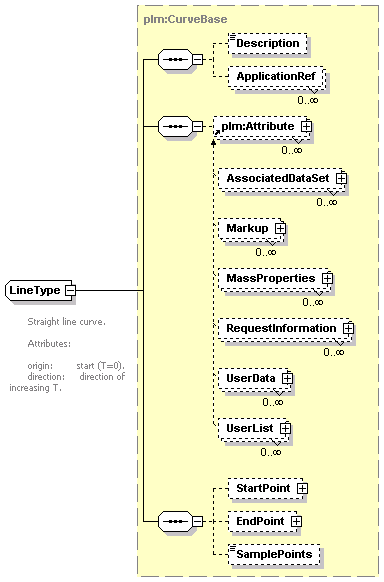 |
||
| namespace | http://www.plmxml.org/Schemas/PLMXMLSchema | ||
| type | extension of plm:CurveBase | ||
| children | Description ApplicationRef plm:Attribute StartPoint EndPoint SamplePoints | ||
| used by |
|
||
| attributes | |||
| annotation |
|
||
| source | <xsd:complexType name="LineType"> <xsd:annotation> <xsd:documentation> Straight line curve. Attributes: origin: start (T=0). direction: direction of increasing T. </xsd:documentation> </xsd:annotation> <xsd:complexContent> <xsd:extension base="plm:CurveBase"> <xsd:attribute name="origin" type="plm:VectorType" use="required"/> <xsd:attribute name="direction" type="plm:DirectionType" use="required"/> </xsd:extension> </xsd:complexContent> </xsd:complexType> |
| diagram | 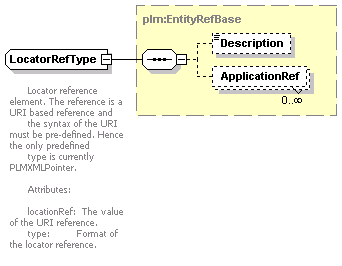 |
||
| namespace | http://www.plmxml.org/Schemas/PLMXMLSchema | ||
| type | extension of plm:EntityRefBase | ||
| children | Description ApplicationRef | ||
| used by |
|
||
| attributes | |||
| annotation |
|
||
| source | <xsd:complexType name="LocatorRefType"> <xsd:annotation> <xsd:documentation> Locator reference element. The reference is a URI based reference and the syntax of the URI must be pre-defined. Hence the only predefined type is currently PLMXMLPointer. Attributes: locationRef: The value of the URI reference. type: Format of the locator reference. </xsd:documentation> </xsd:annotation> <xsd:complexContent> <xsd:extension base="plm:EntityRefBase"> <xsd:attribute name="locationRef" type="plm:anyURIType" use="required"/> <xsd:attribute name="type" type="plm:LocatorRefFormatType" default="PLMXMLPointer"/> </xsd:extension> </xsd:complexContent> </xsd:complexType> |
| diagram |  |
||||
| namespace | http://www.plmxml.org/Schemas/PLMXMLSchema | ||||
| type | extension of plm:ExpressionBase | ||||
| used by |
|
||||
| annotation |
|
||||
| source | <xsd:complexType name="LogicalExpressionBase" abstract="true"> <xsd:annotation> <xsd:documentation> LogicalExpression - abstract base class for expressions returning a logical result. </xsd:documentation> </xsd:annotation> <xsd:complexContent> <xsd:extension base="plm:ExpressionBase"/> </xsd:complexContent> </xsd:complexType> |
| diagram | 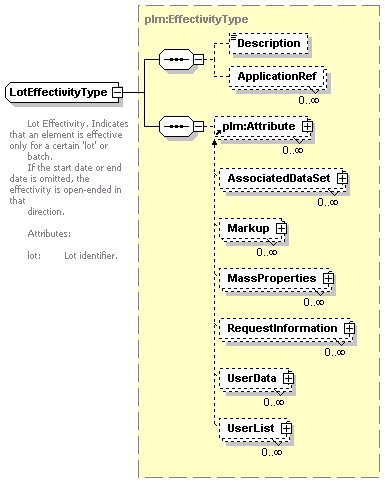 |
||||||||||||||||||||||||||||||
| namespace | http://www.plmxml.org/Schemas/PLMXMLSchema | ||||||||||||||||||||||||||||||
| type | extension of plm:EffectivityType | ||||||||||||||||||||||||||||||
| children | Description ApplicationRef plm:Attribute | ||||||||||||||||||||||||||||||
| used by |
|
||||||||||||||||||||||||||||||
| attributes |
|
||||||||||||||||||||||||||||||
| annotation |
|
||||||||||||||||||||||||||||||
| source | <xsd:complexType name="LotEffectivityType"> <xsd:annotation> <xsd:documentation> Lot Effectivity. Indicates that an element is effective only for a certain 'lot' or batch. If the start date or end date is omitted, the effectivity is open-ended in that direction. Attributes: lot: Lot identifier. </xsd:documentation> </xsd:annotation> <xsd:complexContent> <xsd:extension base="plm:EffectivityType"> <xsd:attribute name="lot" type="xsd:string" use="required"/> </xsd:extension> </xsd:complexContent> </xsd:complexType> |
| diagram | 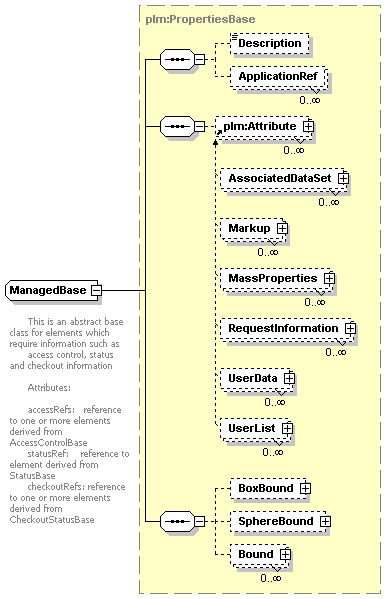 |
||||
| namespace | http://www.plmxml.org/Schemas/PLMXMLSchema | ||||
| type | extension of plm:PropertiesBase | ||||
| children | Description ApplicationRef plm:Attribute BoxBound SphereBound Bound | ||||
| used by |
|
||||
| attributes | |||||
| annotation |
|
||||
| source | <xsd:complexType name="ManagedBase" abstract="true"> <xsd:annotation> <xsd:documentation> This is an abstract base class for elements which require information such as access control, status and checkout information Attributes: accessRefs: reference to one or more elements derived from AccessControlBase statusRef: reference to element derived from StatusBase checkoutRefs: reference to one or more elements derived from CheckoutStatusBase </xsd:documentation> </xsd:annotation> <xsd:complexContent> <xsd:extension base="plm:PropertiesBase"> <xsd:attribute name="accessRefs" type="plm:uriReferenceListType" use="optional"/> <xsd:attribute name="statusRef" type="plm:anyURIType" use="optional"/> <xsd:attribute name="checkoutRefs" type="plm:uriReferenceListType" use="optional"/> </xsd:extension> </xsd:complexContent> </xsd:complexType> |
| diagram | 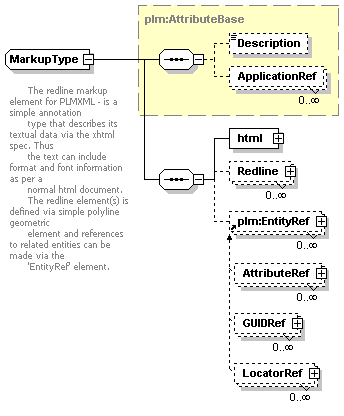 |
||||||||||||||||||||||||||||||
| namespace | http://www.plmxml.org/Schemas/PLMXMLSchema | ||||||||||||||||||||||||||||||
| type | extension of plm:AttributeBase | ||||||||||||||||||||||||||||||
| children | Description ApplicationRef html Redline plm:EntityRef | ||||||||||||||||||||||||||||||
| used by |
|
||||||||||||||||||||||||||||||
| attributes |
|
||||||||||||||||||||||||||||||
| annotation |
|
||||||||||||||||||||||||||||||
| source | <xsd:complexType name="MarkupType"> <xsd:annotation> <xsd:documentation> The redline markup element for PLMXML - is a simple annotation type that describes its textual data via the xhtml spec. Thus the text can include format and font information as per a normal html document. The redline element(s) is defined via simple polyline geometric element and references to related entities can be made via the 'EntityRef' element. </xsd:documentation> <xsd:appinfo source="PLMXMLSchemaGenerator">output=ignore</xsd:appinfo> </xsd:annotation> <xsd:complexContent> <xsd:extension base="plm:AttributeBase"> <xsd:sequence> <xsd:element name="html"> <xsd:complexType> <xsd:sequence> <xsd:any namespace="http://www.w3.org/1999/xhtml" processContents="skip" maxOccurs="unbounded"/> </xsd:sequence> <xsd:anyAttribute namespace="http://www.w3.org/1999/xhtml"/> </xsd:complexType> </xsd:element> <xsd:element name="Redline" type="plm:PolyLineType" minOccurs="0" maxOccurs="unbounded"/> <xsd:element ref="plm:EntityRef" minOccurs="0" maxOccurs="unbounded"/> </xsd:sequence> <xsd:attribute name="author" type="xsd:string" use="optional"/> <xsd:attribute name="time" type="xsd:time" use="optional"/> <xsd:attribute name="date" type="xsd:date" use="optional"/> </xsd:extension> </xsd:complexContent> </xsd:complexType> |
| diagram | |||||||
| namespace | http://www.plmxml.org/Schemas/PLMXMLSchema | ||||||
| attributes |
|
||||||
| source | <xsd:element name="html"> <xsd:complexType> <xsd:sequence> <xsd:any namespace="http://www.w3.org/1999/xhtml" processContents="skip" maxOccurs="unbounded"/> </xsd:sequence> <xsd:anyAttribute namespace="http://www.w3.org/1999/xhtml"/> </xsd:complexType> </xsd:element> |
| diagram | 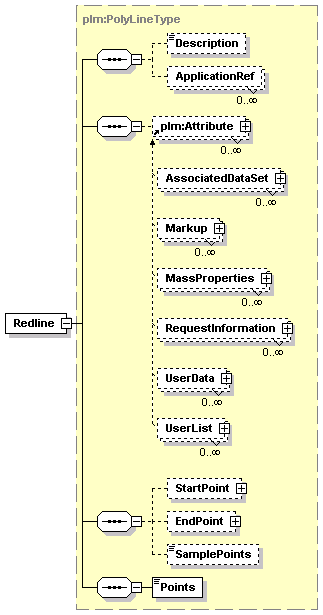 |
||||||||||||||||||||||||||||||||||||||||||
| namespace | http://www.plmxml.org/Schemas/PLMXMLSchema | ||||||||||||||||||||||||||||||||||||||||||
| type | plm:PolyLineType | ||||||||||||||||||||||||||||||||||||||||||
| children | Description ApplicationRef plm:Attribute StartPoint EndPoint SamplePoints Points | ||||||||||||||||||||||||||||||||||||||||||
| attributes |
|
||||||||||||||||||||||||||||||||||||||||||
| source | <xsd:element name="Redline" type="plm:PolyLineType" minOccurs="0" maxOccurs="unbounded"/> |
| diagram | |||||||||||||
| namespace | http://www.plmxml.org/Schemas/PLMXMLSchema | ||||||||||||
| type | extension of plm:MassPropertyArrayFieldType | ||||||||||||
| used by |
|
||||||||||||
| facets |
|
||||||||||||
| attributes |
|
||||||||||||
| source | <xsd:complexType name="MassPropertyArrayType"> <xsd:simpleContent> <xsd:extension base="plm:MassPropertyArrayFieldType"> <xsd:attributeGroup ref="plm:MassPropertyGroup"/> </xsd:extension> </xsd:simpleContent> </xsd:complexType> |
| diagram | |||||||||||||
| namespace | http://www.plmxml.org/Schemas/PLMXMLSchema | ||||||||||||
| type | extension of plm:RealFieldType | ||||||||||||
| used by |
|
||||||||||||
| attributes |
|
||||||||||||
| source | <xsd:complexType name="MassPropertyRealType"> <xsd:simpleContent> <xsd:extension base="plm:RealFieldType"> <xsd:attributeGroup ref="plm:MassPropertyGroup"/> </xsd:extension> </xsd:simpleContent> </xsd:complexType> |
| diagram | 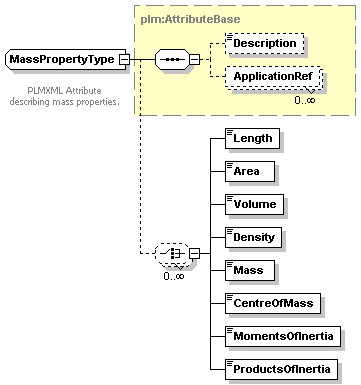 |
||||||||||||||||||
| namespace | http://www.plmxml.org/Schemas/PLMXMLSchema | ||||||||||||||||||
| type | extension of plm:AttributeBase | ||||||||||||||||||
| children | Description ApplicationRef Length Area Volume Density Mass CentreOfMass MomentsOfInertia ProductsOfInertia | ||||||||||||||||||
| used by |
|
||||||||||||||||||
| attributes |
|
||||||||||||||||||
| annotation |
|
||||||||||||||||||
| source | <xsd:complexType name="MassPropertyType"> <xsd:annotation> <xsd:documentation> PLMXML Attribute describing mass properties. </xsd:documentation> <xsd:appinfo source="PLMXMLSchemaGenerator">ChildElementOccurrences=1</xsd:appinfo> </xsd:annotation> <xsd:complexContent> <xsd:extension base="plm:AttributeBase"> <xsd:choice minOccurs="0" maxOccurs="unbounded"> <xsd:element name="Length" type="plm:LengthType"/> <xsd:element name="Area" type="plm:AreaType"/> <xsd:element name="Volume" type="plm:VolumeType"/> <xsd:element name="Density" type="plm:DensityType"/> <xsd:element name="Mass" type="plm:MassType"/> <xsd:element name="CentreOfMass" type="plm:CentreOfMassType"/> <xsd:element name="MomentsOfInertia" type="plm:MomentsOfInertiaType"/> <xsd:element name="ProductsOfInertia" type="plm:ProductsOfInertiaType"/> </xsd:choice> <xsd:attribute name="units" type="plm:MassPropertyUnitType" default="kilograms,metres"/> </xsd:extension> </xsd:complexContent> </xsd:complexType> |
| diagram | |||||||||||||
| namespace | http://www.plmxml.org/Schemas/PLMXMLSchema | ||||||||||||
| type | plm:LengthType | ||||||||||||
| attributes |
|
||||||||||||
| source | <xsd:element name="Length" type="plm:LengthType"/> |
| diagram | |||||||||||||
| namespace | http://www.plmxml.org/Schemas/PLMXMLSchema | ||||||||||||
| type | plm:AreaType | ||||||||||||
| attributes |
|
||||||||||||
| source | <xsd:element name="Area" type="plm:AreaType"/> |
| diagram | |||||||||||||
| namespace | http://www.plmxml.org/Schemas/PLMXMLSchema | ||||||||||||
| type | plm:VolumeType | ||||||||||||
| attributes |
|
||||||||||||
| source | <xsd:element name="Volume" type="plm:VolumeType"/> |
| diagram | |||||||||||||
| namespace | http://www.plmxml.org/Schemas/PLMXMLSchema | ||||||||||||
| type | plm:DensityType | ||||||||||||
| attributes |
|
||||||||||||
| source | <xsd:element name="Density" type="plm:DensityType"/> |
| diagram | |||||||||||||
| namespace | http://www.plmxml.org/Schemas/PLMXMLSchema | ||||||||||||
| type | plm:MassType | ||||||||||||
| attributes |
|
||||||||||||
| source | <xsd:element name="Mass" type="plm:MassType"/> |
| diagram | |||||||||||||
| namespace | http://www.plmxml.org/Schemas/PLMXMLSchema | ||||||||||||
| type | plm:CentreOfMassType | ||||||||||||
| facets |
|
||||||||||||
| attributes |
|
||||||||||||
| source | <xsd:element name="CentreOfMass" type="plm:CentreOfMassType"/> |
| diagram | |||||||||||||
| namespace | http://www.plmxml.org/Schemas/PLMXMLSchema | ||||||||||||
| type | plm:MomentsOfInertiaType | ||||||||||||
| facets |
|
||||||||||||
| attributes |
|
||||||||||||
| source | <xsd:element name="MomentsOfInertia" type="plm:MomentsOfInertiaType"/> |
| diagram | |||||||||||||
| namespace | http://www.plmxml.org/Schemas/PLMXMLSchema | ||||||||||||
| type | plm:ProductsOfInertiaType | ||||||||||||
| facets |
|
||||||||||||
| attributes |
|
||||||||||||
| source | <xsd:element name="ProductsOfInertia" type="plm:ProductsOfInertiaType"/> |
| diagram | |||||||||||||
| namespace | http://www.plmxml.org/Schemas/PLMXMLSchema | ||||||||||||
| type | extension of plm:VectorFieldType | ||||||||||||
| used by |
|
||||||||||||
| facets |
|
||||||||||||
| attributes |
|
||||||||||||
| source | <xsd:complexType name="MassPropertyVectorType"> <xsd:simpleContent> <xsd:extension base="plm:VectorFieldType"> <xsd:attributeGroup ref="plm:MassPropertyGroup"/> </xsd:extension> </xsd:simpleContent> </xsd:complexType> |
| diagram | |||||||||||||
| namespace | http://www.plmxml.org/Schemas/PLMXMLSchema | ||||||||||||
| type | restriction of plm:MassPropertyRealType | ||||||||||||
| used by |
|
||||||||||||
| attributes |
|
||||||||||||
| source | <xsd:complexType name="MassType"> <xsd:simpleContent> <xsd:restriction base="plm:MassPropertyRealType"/> </xsd:simpleContent> </xsd:complexType> |
| diagram | 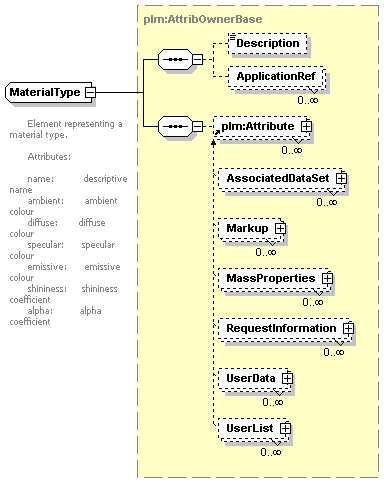 |
||
| namespace | http://www.plmxml.org/Schemas/PLMXMLSchema | ||
| type | extension of plm:AttribOwnerBase | ||
| children | Description ApplicationRef plm:Attribute | ||
| used by |
|
||
| attributes | |||
| annotation |
|
||
| source | <xsd:complexType name="MaterialType"> <xsd:annotation> <xsd:documentation> Element representing a material type. Attributes: name: descriptive name ambient: ambient colour diffuse: diffuse colour specular: specular colour emissive: emissive colour shininess: shininess coefficient alpha: alpha coefficient </xsd:documentation> </xsd:annotation> <xsd:complexContent> <xsd:extension base="plm:AttribOwnerBase"> <xsd:attribute name="name" type="xsd:string" use="optional"/> <xsd:attribute name="ambient" type="plm:RGBType" use="required"/> <xsd:attribute name="diffuse" type="plm:RGBType" use="required"/> <xsd:attribute name="specular" type="plm:RGBType" default="0.0 0.0 0.0"/> <xsd:attribute name="emissive" type="plm:RGBType" default="0.0 0.0 0.0"/> <xsd:attribute name="shininess" type="plm:ShininessType" default="0.0"/> <xsd:attribute name="alpha" type="plm:AlphaType" default="1.0"/> </xsd:extension> </xsd:complexContent> </xsd:complexType> |
| diagram |  |
||||
| namespace | http://www.plmxml.org/Schemas/PLMXMLSchema | ||||
| type | extension of plm:StatementBase | ||||
| used by |
|
||||
| annotation |
|
||||
| source | <xsd:complexType name="MessageBase" abstract="true"> <xsd:annotation> <xsd:documentation> Message - abstract base class for Message Statements. </xsd:documentation> </xsd:annotation> <xsd:complexContent> <xsd:extension base="plm:StatementBase"/> </xsd:complexContent> </xsd:complexType> |
| diagram | |||||||||||||
| namespace | http://www.plmxml.org/Schemas/PLMXMLSchema | ||||||||||||
| type | restriction of plm:MassPropertyArrayType | ||||||||||||
| used by |
|
||||||||||||
| facets |
|
||||||||||||
| attributes |
|
||||||||||||
| source | <xsd:complexType name="MomentsOfInertiaType"> <xsd:simpleContent> <xsd:restriction base="plm:MassPropertyArrayType"/> </xsd:simpleContent> </xsd:complexType> |
| diagram | |||||||||||||
| namespace | http://www.plmxml.org/Schemas/PLMXMLSchema | ||||||||||||
| type | extension of plm:VectorType | ||||||||||||
| facets |
|
||||||||||||
| attributes |
|
||||||||||||
| source | <xsd:complexType name="NormalType"> <xsd:simpleContent> <xsd:extension base="plm:VectorType"> <xsd:attributeGroup ref="plm:idGroup"/> </xsd:extension> </xsd:simpleContent> </xsd:complexType> |
| diagram | 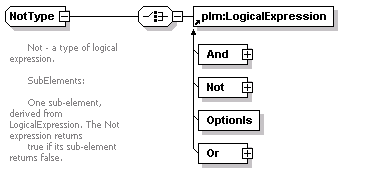 |
||
| namespace | http://www.plmxml.org/Schemas/PLMXMLSchema | ||
| type | extension of plm:LogicalExpressionBase | ||
| children | plm:LogicalExpression | ||
| used by |
|
||
| annotation |
|
||
| source | <xsd:complexType name="NotType"> <xsd:annotation> <xsd:documentation> Not - a type of logical expression. SubElements: One sub-element, derived from LogicalExpression. The Not expression returns true if its sub-element returns false. </xsd:documentation> </xsd:annotation> <xsd:complexContent> <xsd:extension base="plm:LogicalExpressionBase"> <xsd:choice> <xsd:element ref="plm:LogicalExpression"/> </xsd:choice> </xsd:extension> </xsd:complexContent> </xsd:complexType> |
| diagram |  |
||
| namespace | http://www.plmxml.org/Schemas/PLMXMLSchema | ||
| type | extension of plm:AttribOwnerBase | ||
| children | Description ApplicationRef plm:Attribute Transform Representation | ||
| used by |
|
||
| attributes | |||
| annotation |
|
||
| source | <xsd:complexType name="OccurrenceType"> <xsd:annotation> <xsd:documentation> Occurrence. An Occurrence specifies a usage of a Part in an Assembly, by specifying a chain of Instances which lead from the Assembly down to the Part, or by a chain of Instances and other Occurrences, which when joined together define an Instance chain. It is also possible for an Occurrence to reference a ProductView at the end of its Instance chain, rather than a Part. The Assembly, which is the parent of the first Instance in the Instance chain, is called the 'top Part' of the Occurrence. The Part, which is instanced by the last Instance in the Instance chain, is called the 'bottom Part' of the Occurrence. Attributes: name: descriptive name instanceRefs: chain of Instances which define the Occurrence. pathRefs: chain of Instances and Occurrences which, when joined together, define an Instance chain. Only one of instanceRefs and pathRefs should be present. transformRef: an optional reference to a Transform which overrides the transform obtained by accumulating the transforms in the Instance chain. In other words, it specifies the position of the Part in the coordinate frame of the Assembly. partRef: an optional Part to use in place of the 'bottom Part'. representationRefs: an optional collection of Representations. If present, these are to be used in preference to any Representations the Part may have itself, or which may be referenced by the last Instance in the chains. They would normally be different format representations of the same shape. materialRef: reference to a Material element to use when displaying the Part in the position defined by this Occurrence. geometryRefs: optional geometry associated with this Occurrence. occurrenceRefs: an Occurrence may have a number of 'child' Occurrences, which this attribute specifies. A child Occurrence must have an Instance chain which is the same as that of its parent, but with one more Instance added at the bottom end. An Occurrence is normally only rendered in a view if it has no child Occurrences. alternativeOfRef: It is possible for one ProductView to be defined by reference to another ProductView. In this case the first ProductView will contain some Occurrences which override Occurrences in the referenced ProductView. The 'alternativeOfRef' attribute is used to indicate the Occurrence which this Occurrence is overriding. If an Occurrence has an alternativeOfRef attribute, it should not also have an instanceRefs attribute, nor should it have an occurrenceRefs attribute. productViewRef: If an Occurrence has a productViewRef, then it is regarded as an Occurrence of that ProductView, not of its 'bottom Part'. In this case, the 'top Part' of the ProductView must be the same as the 'bottom Part' of the Occurrence. visible: Flag to indicate the Occurrence is visible. If absent, visible is implied. An Occurrence which references another Occurrence via the alternativeOfRef attribute may override its visibility, i.e. make it visible if invisible or vice-versa. SubElements: Transform: see transformRef above. Representation: see representationRefs above. </xsd:documentation> </xsd:annotation> <xsd:complexContent> <xsd:extension base="plm:AttribOwnerBase"> <xsd:sequence> <xsd:element name="Transform" type="plm:TransformType" minOccurs="0"/> <xsd:element name="Representation" type="plm:RepresentationType" minOccurs="0" maxOccurs="unbounded"/> </xsd:sequence> <xsd:attribute name="name" type="xsd:string" use="optional"/> <xsd:attribute name="transformRef" type="xsd:IDREF" use="optional"/> <xsd:attribute name="occurrenceRefs" type="xsd:IDREFS" use="optional"/> <xsd:attribute name="instanceRefs" use="optional"> <xsd:simpleType> <xsd:restriction base="plm:uriReferenceListType"> <xsd:minLength value="1"/> </xsd:restriction> </xsd:simpleType> </xsd:attribute> <xsd:attribute name="pathRefs" type="plm:uriReferenceListType" use="optional"/> <xsd:attribute name="partRef" type="plm:anyURIType" use="optional"/> <xsd:attribute name="representationRefs" type="plm:uriReferenceListType" use="optional"/> <xsd:attribute name="materialRef" type="xsd:IDREF" use="optional"/> <xsd:attribute name="geometryRefs" type="plm:uriReferenceListType" use="optional"/> <xsd:attribute name="alternativeOfRef" type="plm:anyURIType" use="optional"/> <xsd:attribute name="productViewRef" type="plm:anyURIType" use="optional"/> <xsd:attribute name="visible" type="xsd:boolean" use="optional"/> </xsd:extension> </xsd:complexContent> </xsd:complexType> |
| diagram | |||||||||||||||||||
| namespace | http://www.plmxml.org/Schemas/PLMXMLSchema | ||||||||||||||||||
| type | plm:TransformType | ||||||||||||||||||
| facets |
|
||||||||||||||||||
| attributes |
|
||||||||||||||||||
| source | <xsd:element name="Transform" type="plm:TransformType" minOccurs="0"/> |
| diagram | 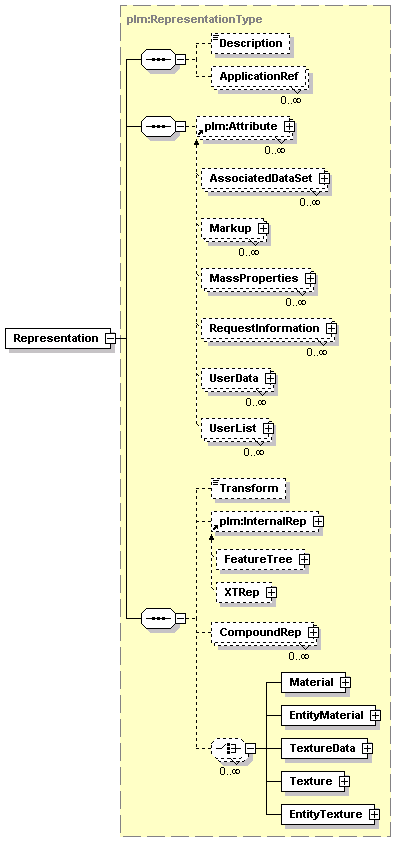 |
||||||||||||||||||||||||||||||||||||||||||||||||||||||||||||
| namespace | http://www.plmxml.org/Schemas/PLMXMLSchema | ||||||||||||||||||||||||||||||||||||||||||||||||||||||||||||
| type | plm:RepresentationType | ||||||||||||||||||||||||||||||||||||||||||||||||||||||||||||
| children | Description ApplicationRef plm:Attribute Transform plm:InternalRep CompoundRep Material EntityMaterial TextureData Texture EntityTexture | ||||||||||||||||||||||||||||||||||||||||||||||||||||||||||||
| attributes |
|
||||||||||||||||||||||||||||||||||||||||||||||||||||||||||||
| source | <xsd:element name="Representation" type="plm:RepresentationType" minOccurs="0" maxOccurs="unbounded"/> |
| diagram |  |
||||
| namespace | http://www.plmxml.org/Schemas/PLMXMLSchema | ||||
| used by |
|
||||
| annotation |
|
||||
| source | <xsd:complexType name="OperandBase" abstract="true"> <xsd:annotation> <xsd:documentation> Operand - abstract base class for Operands (arguments of operators). </xsd:documentation> </xsd:annotation> </xsd:complexType> |
| diagram | 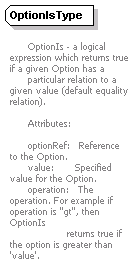 |
||||||||||||||||||||||||
| namespace | http://www.plmxml.org/Schemas/PLMXMLSchema | ||||||||||||||||||||||||
| type | extension of plm:LogicalExpressionBase | ||||||||||||||||||||||||
| used by |
|
||||||||||||||||||||||||
| attributes |
|
||||||||||||||||||||||||
| annotation |
|
||||||||||||||||||||||||
| source | <xsd:complexType name="OptionIsType"> <xsd:annotation> <xsd:documentation> OptionIs - a logical expression which returns true if a given Option has a particular relation to a given value (default equality relation). Attributes: optionRef: Reference to the Option. value: Specified value for the Option. operation: The operation. For example if operation is "gt", then OptionIs returns true if the option is greater than 'value'. </xsd:documentation> </xsd:annotation> <xsd:complexContent> <xsd:extension base="plm:LogicalExpressionBase"> <xsd:attribute name="optionRef" type="plm:anyURIType" use="required"/> <xsd:attribute name="value" type="xsd:string" use="required"/> <xsd:attribute name="operation" type="plm:LogicalOperationType" default="eq"/> </xsd:extension> </xsd:complexContent> </xsd:complexType> |
| diagram | 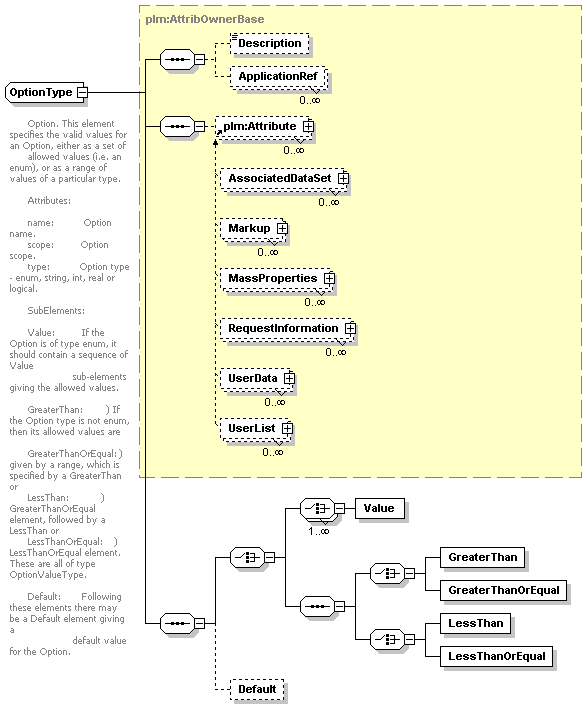 |
||||||||||||||||||||||||||||||||||||
| namespace | http://www.plmxml.org/Schemas/PLMXMLSchema | ||||||||||||||||||||||||||||||||||||
| type | extension of plm:AttribOwnerBase | ||||||||||||||||||||||||||||||||||||
| children | Description ApplicationRef plm:Attribute Value GreaterThan GreaterThanOrEqual LessThan LessThanOrEqual Default | ||||||||||||||||||||||||||||||||||||
| used by |
|
||||||||||||||||||||||||||||||||||||
| attributes |
|
||||||||||||||||||||||||||||||||||||
| annotation |
|
||||||||||||||||||||||||||||||||||||
| source | <xsd:complexType name="OptionType"> <xsd:annotation> <xsd:documentation> Option. This element specifies the valid values for an Option, either as a set of allowed values (i.e. an enum), or as a range of values of a particular type. Attributes: name: Option name. scope: Option scope. type: Option type - enum, string, int, real or logical. SubElements: Value: If the Option is of type enum, it should contain a sequence of Value sub-elements giving the allowed values. GreaterThan: ) If the Option type is not enum, then its allowed values are GreaterThanOrEqual: ) given by a range, which is specified by a GreaterThan or LessThan: ) GreaterThanOrEqual element, followed by a LessThan or LessThanOrEqual: ) LessThanOrEqual element. These are all of type OptionValueType. Default: Following these elements there may be a Default element giving a default value for the Option. </xsd:documentation> </xsd:annotation> <xsd:complexContent> <xsd:extension base="plm:AttribOwnerBase"> <xsd:sequence> <xsd:choice> <xsd:choice maxOccurs="unbounded"> <xsd:element name="Value" type="plm:OptionValueType"/> </xsd:choice> <xsd:sequence> <xsd:choice> <xsd:element name="GreaterThan" type="plm:OptionValueType"/> <xsd:element name="GreaterThanOrEqual" type="plm:OptionValueType"/> </xsd:choice> <xsd:choice> <xsd:element name="LessThan" type="plm:OptionValueType"/> <xsd:element name="LessThanOrEqual" type="plm:OptionValueType"/> </xsd:choice> </xsd:sequence> </xsd:choice> <xsd:element name="Default" type="plm:OptionValueType" minOccurs="0"/> </xsd:sequence> <xsd:attribute name="name" type="xsd:string" use="optional"/> <xsd:attribute name="scope" type="plm:OptionScopeType" use="optional"/> <xsd:attribute name="type" type="plm:OptionTypesType" default="enum"/> </xsd:extension> </xsd:complexContent> </xsd:complexType> |
| diagram | |||||||||||||
| namespace | http://www.plmxml.org/Schemas/PLMXMLSchema | ||||||||||||
| type | plm:OptionValueType | ||||||||||||
| attributes |
|
||||||||||||
| source | <xsd:element name="Value" type="plm:OptionValueType"/> |
| diagram | |||||||||||||
| namespace | http://www.plmxml.org/Schemas/PLMXMLSchema | ||||||||||||
| type | plm:OptionValueType | ||||||||||||
| attributes |
|
||||||||||||
| source | <xsd:element name="GreaterThan" type="plm:OptionValueType"/> |
| diagram | |||||||||||||
| namespace | http://www.plmxml.org/Schemas/PLMXMLSchema | ||||||||||||
| type | plm:OptionValueType | ||||||||||||
| attributes |
|
||||||||||||
| source | <xsd:element name="GreaterThanOrEqual" type="plm:OptionValueType"/> |
| diagram | |||||||||||||
| namespace | http://www.plmxml.org/Schemas/PLMXMLSchema | ||||||||||||
| type | plm:OptionValueType | ||||||||||||
| attributes |
|
||||||||||||
| source | <xsd:element name="LessThan" type="plm:OptionValueType"/> |
| diagram | |||||||||||||
| namespace | http://www.plmxml.org/Schemas/PLMXMLSchema | ||||||||||||
| type | plm:OptionValueType | ||||||||||||
| attributes |
|
||||||||||||
| source | <xsd:element name="LessThanOrEqual" type="plm:OptionValueType"/> |
| diagram | |||||||||||||
| namespace | http://www.plmxml.org/Schemas/PLMXMLSchema | ||||||||||||
| type | plm:OptionValueType | ||||||||||||
| attributes |
|
||||||||||||
| source | <xsd:element name="Default" type="plm:OptionValueType" minOccurs="0"/> |
| diagram | |||||||||||||
| namespace | http://www.plmxml.org/Schemas/PLMXMLSchema | ||||||||||||
| used by |
|
||||||||||||
| attributes |
|
||||||||||||
| source | <xsd:complexType name="OptionValueType"> <xsd:attribute name="v" type="xsd:string"/> </xsd:complexType> |
| diagram | 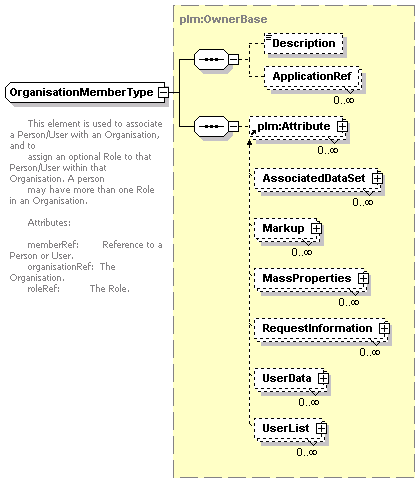 |
||||||||||||||||||||||||||||||||||||
| namespace | http://www.plmxml.org/Schemas/PLMXMLSchema | ||||||||||||||||||||||||||||||||||||
| type | extension of plm:OwnerBase | ||||||||||||||||||||||||||||||||||||
| children | Description ApplicationRef plm:Attribute | ||||||||||||||||||||||||||||||||||||
| used by |
|
||||||||||||||||||||||||||||||||||||
| attributes |
|
||||||||||||||||||||||||||||||||||||
| annotation |
|
||||||||||||||||||||||||||||||||||||
| source | <xsd:complexType name="OrganisationMemberType"> <xsd:annotation> <xsd:documentation> This element is used to associate a Person/User with an Organisation, and to assign an optional Role to that Person/User within that Organisation. A person may have more than one Role in an Organisation. Attributes: memberRef: Reference to a Person or User. organisationRef: The Organisation. roleRef: The Role. </xsd:documentation> </xsd:annotation> <xsd:complexContent> <xsd:extension base="plm:OwnerBase"> <xsd:attribute name="memberRef" type="plm:anyURIType" use="required"/> <xsd:attribute name="organisationRef" type="plm:anyURIType" use="required"/> <xsd:attribute name="roleRef" type="plm:anyURIType" use="optional"/> </xsd:extension> </xsd:complexContent> </xsd:complexType> |
| diagram | 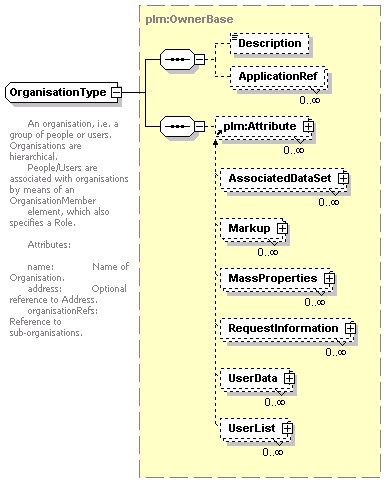 |
||
| namespace | http://www.plmxml.org/Schemas/PLMXMLSchema | ||
| type | extension of plm:OwnerBase | ||
| children | Description ApplicationRef plm:Attribute | ||
| used by |
|
||
| attributes | |||
| annotation |
|
||
| source | <xsd:complexType name="OrganisationType"> <xsd:annotation> <xsd:documentation> An organisation, i.e. a group of people or users. Organisations are hierarchical. People/Users are associated with organisations by means of an OrganisationMember element, which also specifies a Role. Attributes: name: Name of Organisation. address: Optional reference to Address. organisationRefs: Reference to sub-organisations. </xsd:documentation> </xsd:annotation> <xsd:complexContent> <xsd:extension base="plm:OwnerBase"> <xsd:attribute name="name" type="xsd:string" use="optional"/> <xsd:attribute name="organisationRefs" type="plm:uriReferenceListType" use="optional"/> <xsd:attribute name="addressRef" type="plm:anyURIType" use="optional"/> </xsd:extension> </xsd:complexContent> </xsd:complexType> |
| diagram | 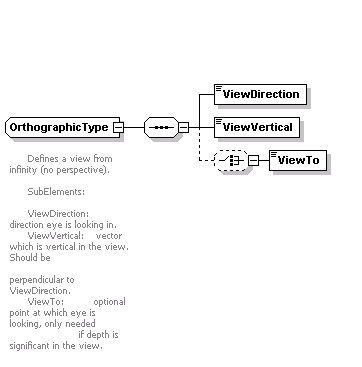 |
||
| namespace | http://www.plmxml.org/Schemas/PLMXMLSchema | ||
| children | ViewDirection ViewVertical ViewTo | ||
| used by |
|
||
| annotation |
|
||
| source | <xsd:complexType name="OrthographicType"> <xsd:annotation> <xsd:documentation> Defines a view from infinity (no perspective). SubElements: ViewDirection: direction eye is looking in. ViewVertical: vector which is vertical in the view. Should be perpendicular to ViewDirection. ViewTo: optional point at which eye is looking, only needed if depth is significant in the view. </xsd:documentation> </xsd:annotation> <xsd:sequence> <xsd:element name="ViewDirection" type="plm:VectorType"/> <xsd:element name="ViewVertical" type="plm:VectorType"/> <xsd:choice minOccurs="0"> <xsd:element name="ViewTo" type="plm:VectorType"/> </xsd:choice> </xsd:sequence> </xsd:complexType> |
| diagram | |||
| namespace | http://www.plmxml.org/Schemas/PLMXMLSchema | ||
| type | plm:VectorType | ||
| facets |
|
||
| source | <xsd:element name="ViewDirection" type="plm:VectorType"/> |
| diagram | |||
| namespace | http://www.plmxml.org/Schemas/PLMXMLSchema | ||
| type | plm:VectorType | ||
| facets |
|
||
| source | <xsd:element name="ViewVertical" type="plm:VectorType"/> |
| diagram | |||
| namespace | http://www.plmxml.org/Schemas/PLMXMLSchema | ||
| type | plm:VectorType | ||
| facets |
|
||
| source | <xsd:element name="ViewTo" type="plm:VectorType"/> |
| diagram | 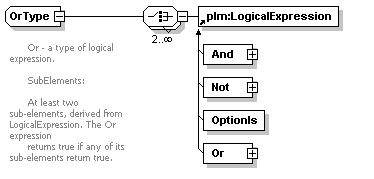 |
||
| namespace | http://www.plmxml.org/Schemas/PLMXMLSchema | ||
| type | extension of plm:LogicalExpressionBase | ||
| children | plm:LogicalExpression | ||
| used by |
|
||
| annotation |
|
||
| source | <xsd:complexType name="OrType"> <xsd:annotation> <xsd:documentation> Or - a type of logical expression. SubElements: At least two sub-elements, derived from LogicalExpression. The Or expression returns true if any of its sub-elements return true. </xsd:documentation> </xsd:annotation> <xsd:complexContent> <xsd:extension base="plm:LogicalExpressionBase"> <xsd:choice minOccurs="2" maxOccurs="unbounded"> <xsd:element ref="plm:LogicalExpression"/> </xsd:choice> </xsd:extension> </xsd:complexContent> </xsd:complexType> |
| diagram | 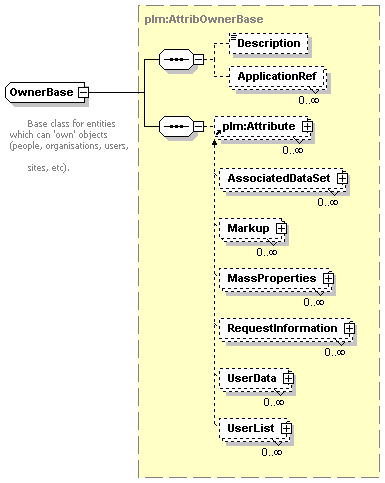 |
||||||||||||||||||
| namespace | http://www.plmxml.org/Schemas/PLMXMLSchema | ||||||||||||||||||
| type | extension of plm:AttribOwnerBase | ||||||||||||||||||
| children | Description ApplicationRef plm:Attribute | ||||||||||||||||||
| used by |
|
||||||||||||||||||
| attributes |
|
||||||||||||||||||
| annotation |
|
||||||||||||||||||
| source | <xsd:complexType name="OwnerBase"> <xsd:annotation> <xsd:documentation> Base class for entities which can 'own' objects (people, organisations, users, sites, etc). </xsd:documentation> </xsd:annotation> <xsd:complexContent> <xsd:extension base="plm:AttribOwnerBase"/> </xsd:complexContent> </xsd:complexType> |
| diagram | 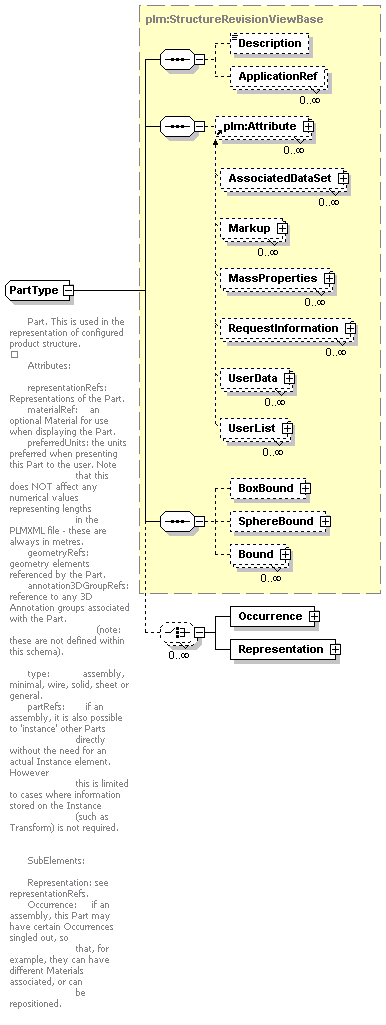 |
||||
| namespace | http://www.plmxml.org/Schemas/PLMXMLSchema | ||||
| type | extension of plm:StructureRevisionViewBase | ||||
| children | Description ApplicationRef plm:Attribute BoxBound SphereBound Bound Occurrence Representation | ||||
| used by |
|
||||
| attributes | |||||
| annotation |
|
||||
| source | <xsd:complexType name="PartType"> <xsd:annotation> <xsd:documentation> Part. This is used in the representation of configured product structure. Attributes: representationRefs: Representations of the Part. materialRef: an optional Material for use when displaying the Part. preferredUnits: the units preferred when presenting this Part to the user. Note that this does NOT affect any numerical values representing lengths in the PLMXML file - these are always in metres. geometryRefs: geometry elements referenced by the Part. annotation3DGroupRefs: reference to any 3D Annotation groups associated with the Part. (note: these are not defined within this schema). type: assembly, minimal, wire, solid, sheet or general. partRefs: if an assembly, it is also possible to 'instance' other Parts directly without the need for an actual Instance element. However this is limited to cases where information stored on the Instance (such as Transform) is not required. SubElements: Representation: see representationRefs. Occurrence: if an assembly, this Part may have certain Occurrences singled out, so that, for example, they can have different Materials associated, or can be repositioned. </xsd:documentation> <xsd:appinfo source="PLMXMLSchemaGenerator">sdkname=Part</xsd:appinfo> </xsd:annotation> <xsd:complexContent> <xsd:extension base="plm:StructureRevisionViewBase"> <xsd:choice minOccurs="0" maxOccurs="unbounded"> <xsd:element name="Occurrence" type="plm:OccurrenceType"/> <xsd:element name="Representation" type="plm:RepresentationType"/> </xsd:choice> <xsd:attribute name="type" type="plm:PartTypesType" use="optional"/> <xsd:attribute name="partRefs" type="xsd:IDREFS" use="optional"/> <xsd:attribute name="representationRefs" type="xsd:IDREFS" use="optional"/> <xsd:attribute name="materialRef" type="xsd:IDREF" use="optional"/> <xsd:attribute name="preferredUnits" type="plm:PreferredPartUnitsType" default="millimetres"/> <xsd:attribute name="geometryRefs" type="plm:uriReferenceListType" use="optional"/> <xsd:attribute name="annotation3DGroupRefs" type="plm:uriReferenceListType" use="optional"/> </xsd:extension> </xsd:complexContent> </xsd:complexType> |
| diagram | 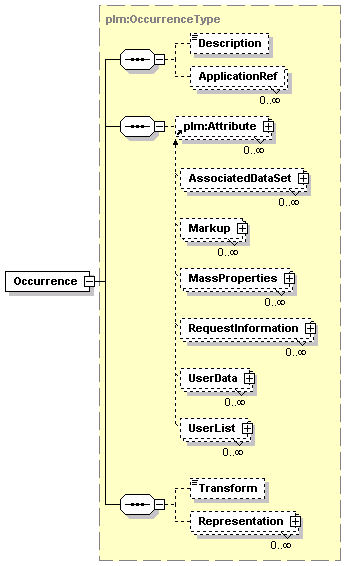 |
||||||||||||||||||||||||||||||||||||||||||||||||||||||||||||||||||||||||||||||||||||||||||
| namespace | http://www.plmxml.org/Schemas/PLMXMLSchema | ||||||||||||||||||||||||||||||||||||||||||||||||||||||||||||||||||||||||||||||||||||||||||
| type | plm:OccurrenceType | ||||||||||||||||||||||||||||||||||||||||||||||||||||||||||||||||||||||||||||||||||||||||||
| children | Description ApplicationRef plm:Attribute Transform Representation | ||||||||||||||||||||||||||||||||||||||||||||||||||||||||||||||||||||||||||||||||||||||||||
| attributes |
|
||||||||||||||||||||||||||||||||||||||||||||||||||||||||||||||||||||||||||||||||||||||||||
| source | <xsd:element name="Occurrence" type="plm:OccurrenceType"/> |
| diagram | 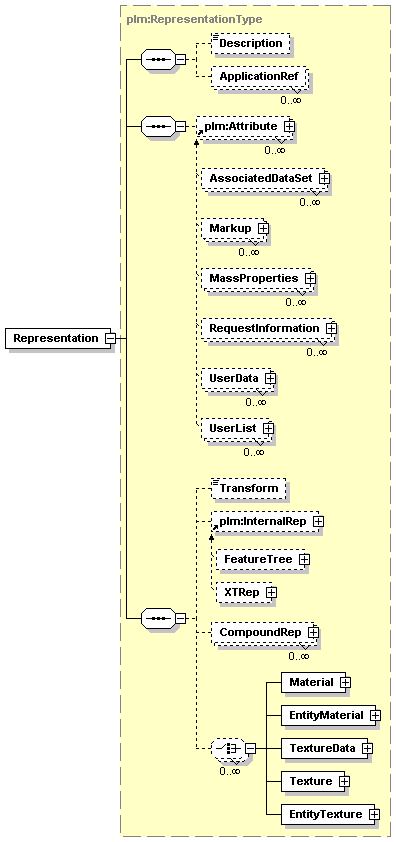 |
||||||||||||||||||||||||||||||||||||||||||||||||||||||||||||
| namespace | http://www.plmxml.org/Schemas/PLMXMLSchema | ||||||||||||||||||||||||||||||||||||||||||||||||||||||||||||
| type | plm:RepresentationType | ||||||||||||||||||||||||||||||||||||||||||||||||||||||||||||
| children | Description ApplicationRef plm:Attribute Transform plm:InternalRep CompoundRep Material EntityMaterial TextureData Texture EntityTexture | ||||||||||||||||||||||||||||||||||||||||||||||||||||||||||||
| attributes |
|
||||||||||||||||||||||||||||||||||||||||||||||||||||||||||||
| source | <xsd:element name="Representation" type="plm:RepresentationType"/> |
| diagram | 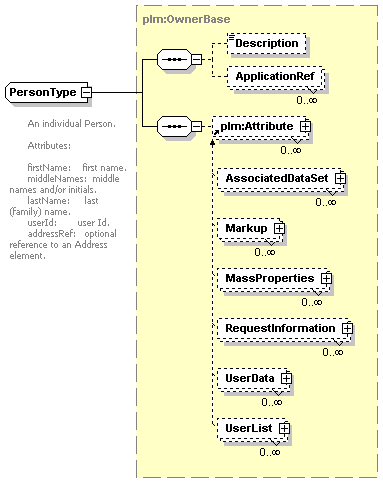 |
||
| namespace | http://www.plmxml.org/Schemas/PLMXMLSchema | ||
| type | extension of plm:OwnerBase | ||
| children | Description ApplicationRef plm:Attribute | ||
| used by |
|
||
| attributes | |||
| annotation |
|
||
| source | <xsd:complexType name="PersonType"> <xsd:annotation> <xsd:documentation> An individual Person. Attributes: firstName: first name. middleNames: middle names and/or initials. lastName: last (family) name. userId: user Id. addressRef: optional reference to an Address element. </xsd:documentation> </xsd:annotation> <xsd:complexContent> <xsd:extension base="plm:OwnerBase"> <xsd:attribute name="firstName" type="xsd:string" use="optional"/> <xsd:attribute name="middleNames" type="xsd:string" use="optional"/> <xsd:attribute name="lastName" type="xsd:string" use="optional"/> <xsd:attribute name="userId" type="xsd:string" use="optional"/> <xsd:attribute name="addressRef" type="plm:anyURIType" use="optional"/> </xsd:extension> </xsd:complexContent> </xsd:complexType> |
| diagram | 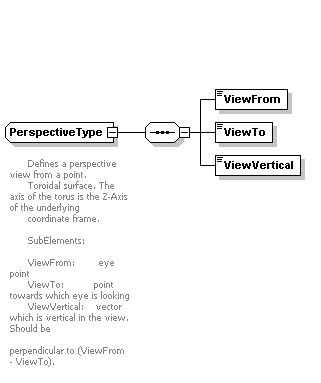 |
||
| namespace | http://www.plmxml.org/Schemas/PLMXMLSchema | ||
| children | ViewFrom ViewTo ViewVertical | ||
| used by |
|
||
| annotation |
|
||
| source | <xsd:complexType name="PerspectiveType"> <xsd:annotation> <xsd:documentation> Defines a perspective view from a point. Toroidal surface. The axis of the torus is the Z-Axis of the underlying coordinate frame. SubElements: ViewFrom: eye point ViewTo: point towards which eye is looking ViewVertical: vector which is vertical in the view. Should be perpendicular to (ViewFrom - ViewTo). </xsd:documentation> </xsd:annotation> <xsd:sequence> <xsd:element name="ViewFrom" type="plm:VectorType"/> <xsd:element name="ViewTo" type="plm:VectorType"/> <xsd:element name="ViewVertical" type="plm:VectorType"/> </xsd:sequence> </xsd:complexType> |
| diagram | |||
| namespace | http://www.plmxml.org/Schemas/PLMXMLSchema | ||
| type | plm:VectorType | ||
| facets |
|
||
| source | <xsd:element name="ViewFrom" type="plm:VectorType"/> |
| diagram | |||
| namespace | http://www.plmxml.org/Schemas/PLMXMLSchema | ||
| type | plm:VectorType | ||
| facets |
|
||
| source | <xsd:element name="ViewTo" type="plm:VectorType"/> |
| diagram | |||
| namespace | http://www.plmxml.org/Schemas/PLMXMLSchema | ||
| type | plm:VectorType | ||
| facets |
|
||
| source | <xsd:element name="ViewVertical" type="plm:VectorType"/> |
| diagram | 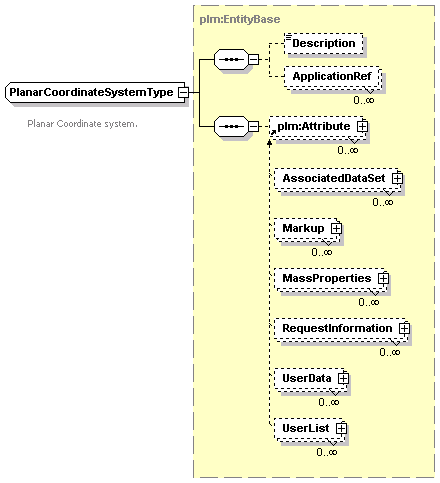 |
||
| namespace | http://www.plmxml.org/Schemas/PLMXMLSchema | ||
| type | extension of plm:EntityBase | ||
| children | Description ApplicationRef plm:Attribute | ||
| used by |
|
||
| attributes | |||
| annotation |
|
||
| source | <xsd:complexType name="PlanarCoordinateSystemType"> <xsd:annotation> <xsd:documentation> Planar Coordinate system. </xsd:documentation> </xsd:annotation> <xsd:complexContent> <xsd:extension base="plm:EntityBase"> <xsd:attribute name="origin" type="plm:VectorType" default="0 0 0"/> <xsd:attribute name="zAxis" type="plm:DirectionType" default="0 0 1"/> <xsd:attribute name="xAxis" type="plm:DirectionType" default="1 0 0"/> </xsd:extension> </xsd:complexContent> </xsd:complexType> |
| diagram | 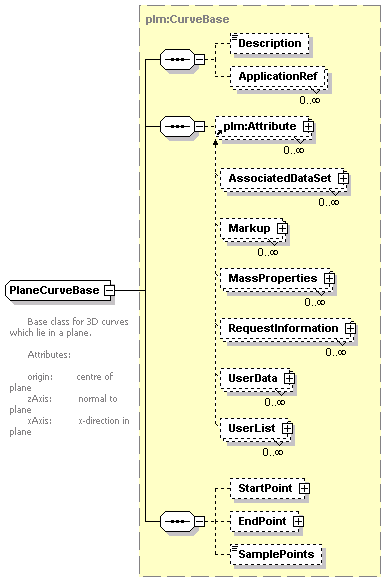 |
||
| namespace | http://www.plmxml.org/Schemas/PLMXMLSchema | ||
| type | extension of plm:CurveBase | ||
| children | Description ApplicationRef plm:Attribute StartPoint EndPoint SamplePoints | ||
| used by |
|
||
| attributes | |||
| annotation |
|
||
| source | <xsd:complexType name="PlaneCurveBase" abstract="true"> <xsd:annotation> <xsd:documentation> Base class for 3D curves which lie in a plane. Attributes: origin: centre of plane zAxis: normal to plane xAxis: x-direction in plane </xsd:documentation> </xsd:annotation> <xsd:complexContent> <xsd:extension base="plm:CurveBase"> <xsd:attribute name="origin" type="plm:VectorType" default="0 0 0"/> <xsd:attribute name="zAxis" type="plm:DirectionType" default="0 0 1"/> <xsd:attribute name="xAxis" type="plm:DirectionType" default="1 0 0"/> </xsd:extension> </xsd:complexContent> </xsd:complexType> |
| diagram | 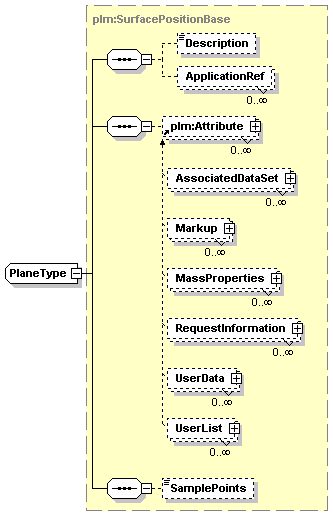 |
||||||||||||||||||||||||||||||||||||||||||||||||||||||||||||||||||
| namespace | http://www.plmxml.org/Schemas/PLMXMLSchema | ||||||||||||||||||||||||||||||||||||||||||||||||||||||||||||||||||
| type | extension of plm:SurfacePositionBase | ||||||||||||||||||||||||||||||||||||||||||||||||||||||||||||||||||
| children | Description ApplicationRef plm:Attribute SamplePoints | ||||||||||||||||||||||||||||||||||||||||||||||||||||||||||||||||||
| used by |
|
||||||||||||||||||||||||||||||||||||||||||||||||||||||||||||||||||
| attributes |
|
||||||||||||||||||||||||||||||||||||||||||||||||||||||||||||||||||
| source | <xsd:complexType name="PlaneType"> <xsd:complexContent> <xsd:extension base="plm:SurfacePositionBase"/> </xsd:complexContent> </xsd:complexType> |
| diagram | 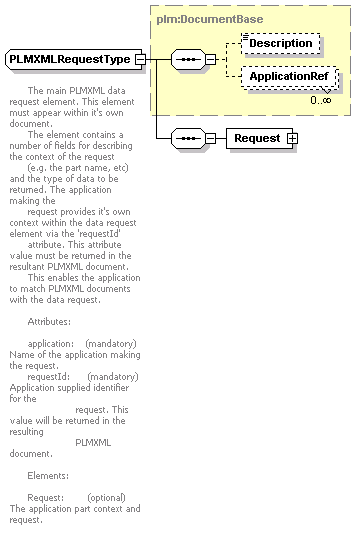 |
||
| namespace | http://www.plmxml.org/Schemas/PLMXMLSchema | ||
| type | extension of plm:DocumentBase | ||
| children | Description ApplicationRef Request | ||
| used by |
|
||
| attributes | |||
| annotation |
|
||
| source | <xsd:complexType name="PLMXMLRequestType"> <xsd:annotation> <xsd:documentation> The main PLMXML data request element. This element must appear within it's own document. The element contains a number of fields for describing the context of the request (e.g. the part name, etc) and the type of data to be returned. The application making the request provides it's own context within the data request element via the 'requestId' attribute. This attribute value must be returned in the resultant PLMXML document. This enables the application to match PLMXML documents with the data request. Attributes: application: (mandatory) Name of the application making the request. requestId: (mandatory) Application supplied identifier for the request. This value will be returned in the resulting PLMXML document. Elements: Request: (optional) The application part context and request. </xsd:documentation> </xsd:annotation> <xsd:complexContent> <xsd:extension base="plm:DocumentBase"> <xsd:sequence> <xsd:element name="Request" type="plm:RequestType"/> </xsd:sequence> <xsd:attribute name="application" type="xsd:string" use="required"/> <xsd:attribute name="requestId" type="plm:RequestIdType" use="required"/> </xsd:extension> </xsd:complexContent> </xsd:complexType> |
| diagram | 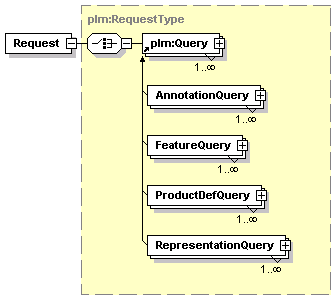 |
||||||||||||||||||||||||
| namespace | http://www.plmxml.org/Schemas/PLMXMLSchema | ||||||||||||||||||||||||
| type | plm:RequestType | ||||||||||||||||||||||||
| children | plm:Query | ||||||||||||||||||||||||
| attributes |
|
||||||||||||||||||||||||
| source | <xsd:element name="Request" type="plm:RequestType"/> |
| diagram |  |
||||||||||||||||||||||||||||||||||||||||||
| namespace | http://www.plmxml.org/Schemas/PLMXMLSchema | ||||||||||||||||||||||||||||||||||||||||||
| type | extension of plm:DocumentBase | ||||||||||||||||||||||||||||||||||||||||||
| children | Description ApplicationRef ProductDef plm:StructureDef Representation ConstructionGeometry plm:Structure plm:StructureRevision plm:Attribute plm:AttribOwner | ||||||||||||||||||||||||||||||||||||||||||
| used by |
|
||||||||||||||||||||||||||||||||||||||||||
| attributes |
|
||||||||||||||||||||||||||||||||||||||||||
| annotation |
|
||||||||||||||||||||||||||||||||||||||||||
| source | <xsd:complexType name="PLMXMLType"> <xsd:annotation> <xsd:documentation> This defines the type of the outermost element in a PLMXML file. This schema definition, in W3C format, can represent the following data in various combinations and permutations : Product definition via instance graph and occurrence view representations Part representation via facet representation and/or external refs to XT files Attribute information </xsd:documentation> </xsd:annotation> <xsd:complexContent> <xsd:extension base="plm:DocumentBase"> <xsd:choice minOccurs="0" maxOccurs="unbounded"> <xsd:element name="ProductDef" type="plm:ProductDefType"/> <xsd:element ref="plm:StructureDef"/> <xsd:element name="Representation" type="plm:RepresentationType"/> <xsd:element name="ConstructionGeometry" type="plm:ConstructionGeometryType"/> <xsd:element ref="plm:Structure"/> <xsd:element ref="plm:StructureRevision"/> <xsd:element ref="plm:Attribute"/> <xsd:element ref="plm:AttribOwner"/> </xsd:choice> </xsd:extension> </xsd:complexContent> </xsd:complexType> |
| diagram | 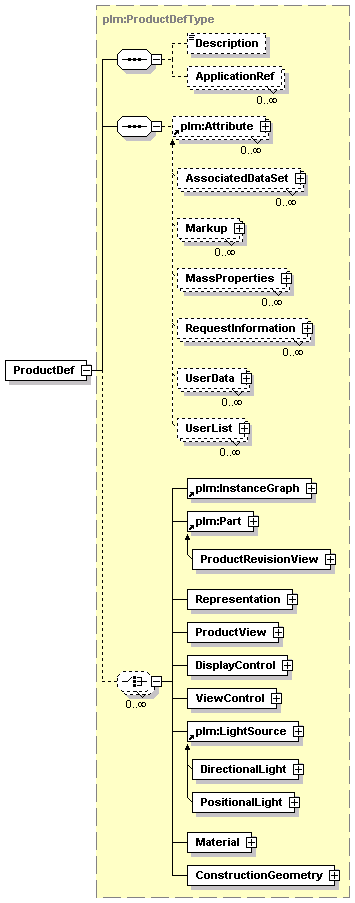 |
||||||||||||||||||||||||||||||||||||||||||
| namespace | http://www.plmxml.org/Schemas/PLMXMLSchema | ||||||||||||||||||||||||||||||||||||||||||
| type | plm:ProductDefType | ||||||||||||||||||||||||||||||||||||||||||
| children | Description ApplicationRef plm:Attribute plm:InstanceGraph plm:Part Representation ProductView DisplayControl ViewControl plm:LightSource Material ConstructionGeometry | ||||||||||||||||||||||||||||||||||||||||||
| attributes |
|
||||||||||||||||||||||||||||||||||||||||||
| source | <xsd:element name="ProductDef" type="plm:ProductDefType"/> |
| diagram | 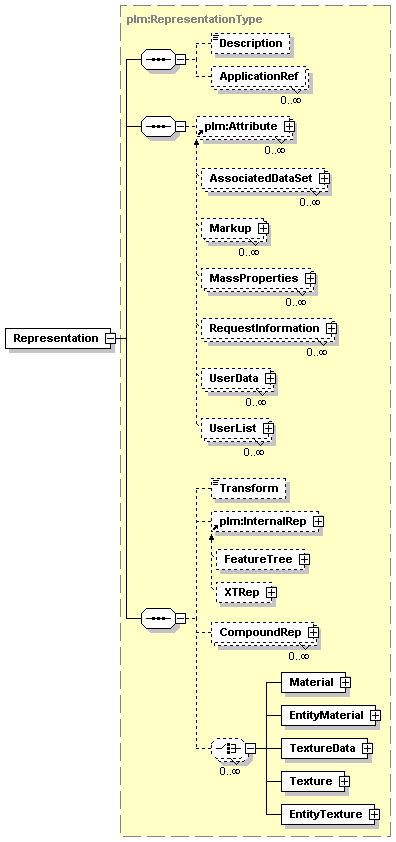 |
||||||||||||||||||||||||||||||||||||||||||||||||||||||||||||
| namespace | http://www.plmxml.org/Schemas/PLMXMLSchema | ||||||||||||||||||||||||||||||||||||||||||||||||||||||||||||
| type | plm:RepresentationType | ||||||||||||||||||||||||||||||||||||||||||||||||||||||||||||
| children | Description ApplicationRef plm:Attribute Transform plm:InternalRep CompoundRep Material EntityMaterial TextureData Texture EntityTexture | ||||||||||||||||||||||||||||||||||||||||||||||||||||||||||||
| attributes |
|
||||||||||||||||||||||||||||||||||||||||||||||||||||||||||||
| source | <xsd:element name="Representation" type="plm:RepresentationType"/> |
| diagram | 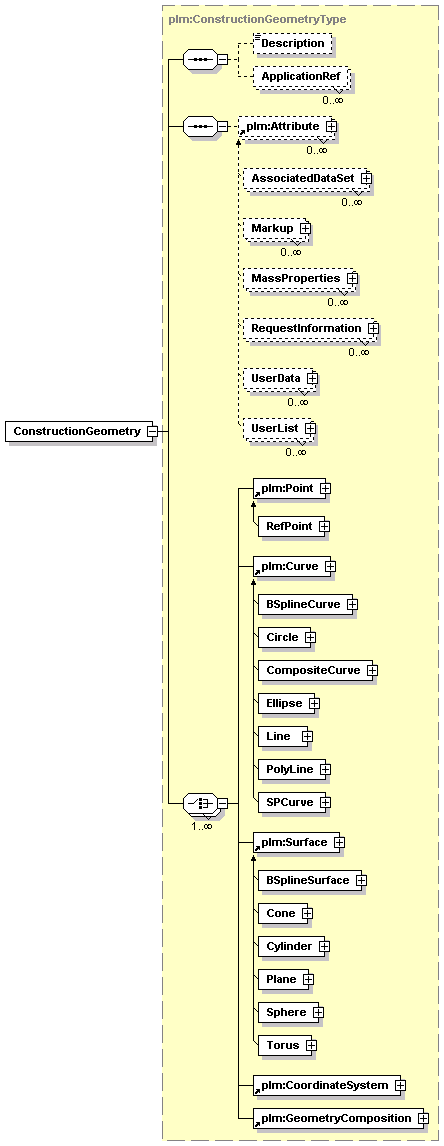 |
||||||||||||||||||||||||
| namespace | http://www.plmxml.org/Schemas/PLMXMLSchema | ||||||||||||||||||||||||
| type | plm:ConstructionGeometryType | ||||||||||||||||||||||||
| children | Description ApplicationRef plm:Attribute plm:Point plm:Curve plm:Surface plm:CoordinateSystem plm:GeometryComposition | ||||||||||||||||||||||||
| attributes |
|
||||||||||||||||||||||||
| source | <xsd:element name="ConstructionGeometry" type="plm:ConstructionGeometryType"/> |
| diagram | 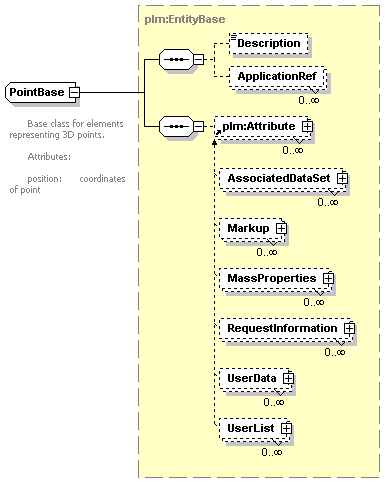 |
||||||||||||||||||||||||||||||
| namespace | http://www.plmxml.org/Schemas/PLMXMLSchema | ||||||||||||||||||||||||||||||
| type | extension of plm:EntityBase | ||||||||||||||||||||||||||||||
| children | Description ApplicationRef plm:Attribute | ||||||||||||||||||||||||||||||
| used by |
|
||||||||||||||||||||||||||||||
| attributes |
|
||||||||||||||||||||||||||||||
| annotation |
|
||||||||||||||||||||||||||||||
| source | <xsd:complexType name="PointBase" abstract="true"> <xsd:annotation> <xsd:documentation> Base class for elements representing 3D points. Attributes: position: coordinates of point </xsd:documentation> </xsd:annotation> <xsd:complexContent> <xsd:extension base="plm:EntityBase"> <xsd:attribute name="position" type="plm:VectorType"/> </xsd:extension> </xsd:complexContent> </xsd:complexType> |
| diagram | 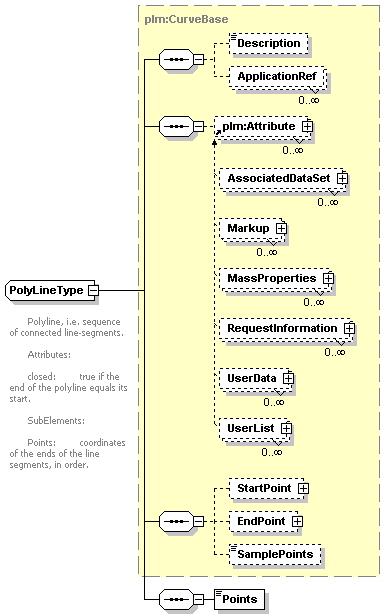 |
||
| namespace | http://www.plmxml.org/Schemas/PLMXMLSchema | ||
| type | extension of plm:CurveBase | ||
| children | Description ApplicationRef plm:Attribute StartPoint EndPoint SamplePoints Points | ||
| used by |
|
||
| attributes | |||
| annotation |
|
||
| source | <xsd:complexType name="PolyLineType"> <xsd:annotation> <xsd:documentation> Polyline, i.e. sequence of connected line-segments. Attributes: closed: true if the end of the polyline equals its start. SubElements: Points: coordinates of the ends of the line segments, in order. </xsd:documentation> </xsd:annotation> <xsd:complexContent> <xsd:extension base="plm:CurveBase"> <xsd:sequence> <xsd:element name="Points" type="plm:DoubleListType"/> </xsd:sequence> <xsd:attribute name="closed" type="xsd:boolean" default="false"/> </xsd:extension> </xsd:complexContent> </xsd:complexType> |
| diagram | |
| namespace | http://www.plmxml.org/Schemas/PLMXMLSchema |
| type | plm:DoubleListType |
| source | <xsd:element name="Points" type="plm:DoubleListType"/> |
| diagram | 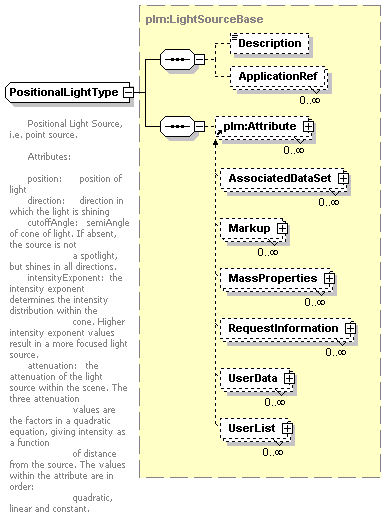 |
||
| namespace | http://www.plmxml.org/Schemas/PLMXMLSchema | ||
| type | extension of plm:LightSourceBase | ||
| children | Description ApplicationRef plm:Attribute | ||
| used by |
|
||
| attributes | |||
| annotation |
|
||
| source | <xsd:complexType name="PositionalLightType"> <xsd:annotation> <xsd:documentation> Positional Light Source, i.e. point source. Attributes: position: position of light direction: direction in which the light is shining cutoffAngle: semiAngle of cone of light. If absent, the source is not a spotlight, but shines in all directions. intensityExponent: the intensity exponent determines the intensity distribution within the cone. Higher intensity exponent values result in a more focused light source. attenuation: the attenuation of the light source within the scene. The three attenuation values are the factors in a quadratic equation, giving intensity as a function of distance from the source. The values within the attribute are in order: quadratic, linear and constant. </xsd:documentation> </xsd:annotation> <xsd:complexContent> <xsd:extension base="plm:LightSourceBase"> <xsd:attribute name="position" type="plm:VectorType" default="0.0 0.0 1.0"/> <xsd:attribute name="direction" type="plm:VectorType" default="0.0 0.0 -1.0"/> <xsd:attribute name="cutoffAngle" type="plm:CutoffAngleType" use="optional"/> <xsd:attribute name="intensityExponent" type="plm:IntensityExponentType" default="0.0"/> <xsd:attribute name="attenuation" type="plm:AttenuationType" default="0.0 0.0 1.0"/> </xsd:extension> </xsd:complexContent> </xsd:complexType> |
| diagram | |||||||||||||
| namespace | http://www.plmxml.org/Schemas/PLMXMLSchema | ||||||||||||
| type | extension of plm:VectorType | ||||||||||||
| facets |
|
||||||||||||
| attributes |
|
||||||||||||
| source | <xsd:complexType name="PositionType"> <xsd:simpleContent> <xsd:extension base="plm:VectorType"> <xsd:attributeGroup ref="plm:idGroup"/> </xsd:extension> </xsd:simpleContent> </xsd:complexType> |
| diagram | 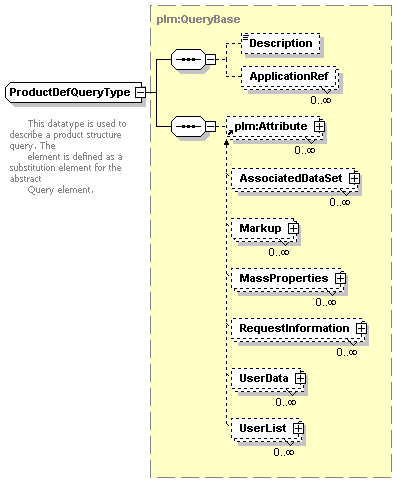 |
||||||||||||||||||
| namespace | http://www.plmxml.org/Schemas/PLMXMLSchema | ||||||||||||||||||
| type | extension of plm:QueryBase | ||||||||||||||||||
| children | Description ApplicationRef plm:Attribute | ||||||||||||||||||
| used by |
|
||||||||||||||||||
| attributes |
|
||||||||||||||||||
| annotation |
|
||||||||||||||||||
| source | <xsd:complexType name="ProductDefQueryType"> <xsd:annotation> <xsd:documentation> This datatype is used to describe a product structure query. The element is defined as a substitution element for the abstract Query element. </xsd:documentation> </xsd:annotation> <xsd:complexContent> <xsd:extension base="plm:QueryBase"/> </xsd:complexContent> </xsd:complexType> |
| diagram | 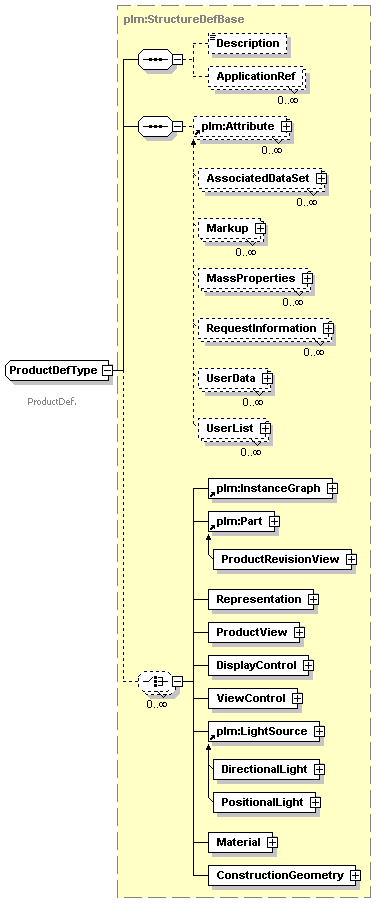 |
||||||||||||||||||||||||||||||||||||||||||
| namespace | http://www.plmxml.org/Schemas/PLMXMLSchema | ||||||||||||||||||||||||||||||||||||||||||
| type | extension of plm:StructureDefBase | ||||||||||||||||||||||||||||||||||||||||||
| children | Description ApplicationRef plm:Attribute plm:InstanceGraph plm:Part Representation ProductView DisplayControl ViewControl plm:LightSource Material ConstructionGeometry | ||||||||||||||||||||||||||||||||||||||||||
| used by |
|
||||||||||||||||||||||||||||||||||||||||||
| attributes |
|
||||||||||||||||||||||||||||||||||||||||||
| annotation |
|
||||||||||||||||||||||||||||||||||||||||||
| source | <xsd:complexType name="ProductDefType"> <xsd:annotation> <xsd:documentation> ProductDef. </xsd:documentation> </xsd:annotation> <xsd:complexContent> <xsd:extension base="plm:StructureDefBase"/> </xsd:complexContent> </xsd:complexType> |
| diagram | 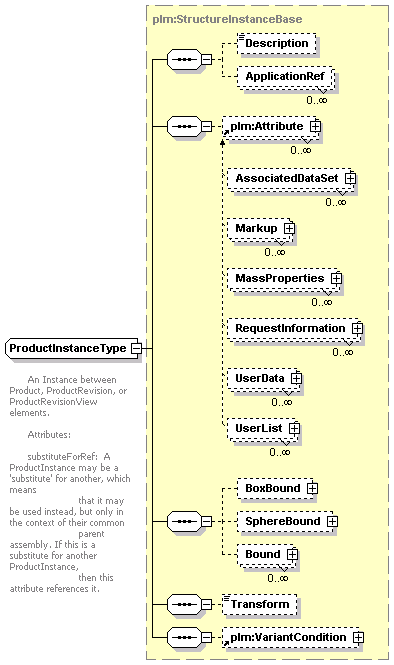 |
||
| namespace | http://www.plmxml.org/Schemas/PLMXMLSchema | ||
| type | extension of plm:StructureInstanceBase | ||
| children | Description ApplicationRef plm:Attribute BoxBound SphereBound Bound Transform plm:VariantCondition | ||
| used by |
|
||
| attributes | |||
| annotation |
|
||
| source | <xsd:complexType name="ProductInstanceType"> <xsd:annotation> <xsd:documentation> An Instance between Product, ProductRevision, or ProductRevisionView elements. Attributes: substituteForRef: A ProductInstance may be a 'substitute' for another, which means that it may be used instead, but only in the context of their common parent assembly. If this is a substitute for another ProductInstance, then this attribute references it. </xsd:documentation> </xsd:annotation> <xsd:complexContent> <xsd:extension base="plm:StructureInstanceBase"> <xsd:attribute name="substituteForRef" type="plm:anyURIType" use="optional"/> </xsd:extension> </xsd:complexContent> </xsd:complexType> |
| diagram | 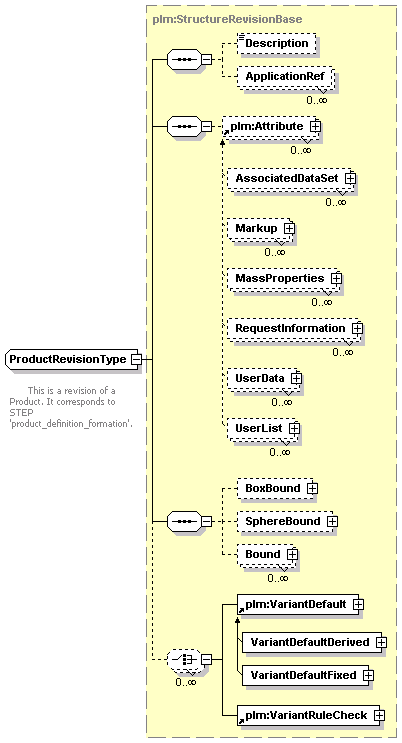 |
||||||||||||||||||||||||||||||||||||||||||||||||||||||||||||||||||||||||||||||||||||||||||
| namespace | http://www.plmxml.org/Schemas/PLMXMLSchema | ||||||||||||||||||||||||||||||||||||||||||||||||||||||||||||||||||||||||||||||||||||||||||
| type | extension of plm:StructureRevisionBase | ||||||||||||||||||||||||||||||||||||||||||||||||||||||||||||||||||||||||||||||||||||||||||
| children | Description ApplicationRef plm:Attribute BoxBound SphereBound Bound plm:VariantDefault plm:VariantRuleCheck | ||||||||||||||||||||||||||||||||||||||||||||||||||||||||||||||||||||||||||||||||||||||||||
| used by |
|
||||||||||||||||||||||||||||||||||||||||||||||||||||||||||||||||||||||||||||||||||||||||||
| attributes |
|
||||||||||||||||||||||||||||||||||||||||||||||||||||||||||||||||||||||||||||||||||||||||||
| annotation |
|
||||||||||||||||||||||||||||||||||||||||||||||||||||||||||||||||||||||||||||||||||||||||||
| source | <xsd:complexType name="ProductRevisionType"> <xsd:annotation> <xsd:documentation> This is a revision of a Product. It corresponds to STEP 'product_definition_formation'. </xsd:documentation> </xsd:annotation> <xsd:complexContent> <xsd:extension base="plm:StructureRevisionBase"/> </xsd:complexContent> </xsd:complexType> |
| diagram | 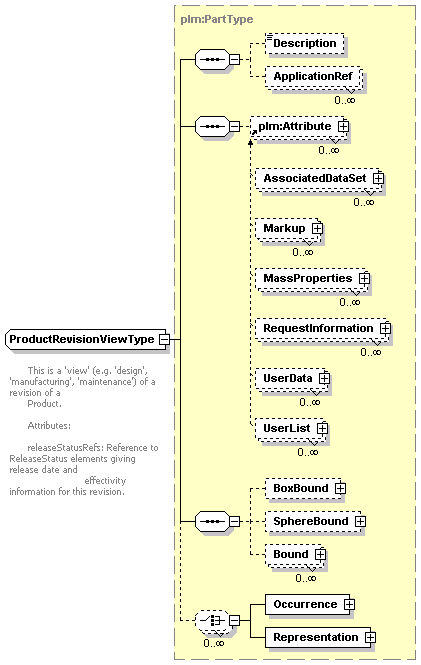 |
||
| namespace | http://www.plmxml.org/Schemas/PLMXMLSchema | ||
| type | extension of plm:PartType | ||
| children | Description ApplicationRef plm:Attribute BoxBound SphereBound Bound Occurrence Representation | ||
| used by |
|
||
| attributes | |||
| annotation |
|
||
| source | <xsd:complexType name="ProductRevisionViewType"> <xsd:annotation> <xsd:documentation> This is a 'view' (e.g. 'design', 'manufacturing', 'maintenance') of a revision of a Product. Attributes: releaseStatusRefs: Reference to ReleaseStatus elements giving release date and effectivity information for this revision. </xsd:documentation> </xsd:annotation> <xsd:complexContent> <xsd:extension base="plm:PartType"> <xsd:attribute name="releaseStatusRefs" type="plm:uriReferenceListType" use="optional"/> </xsd:extension> </xsd:complexContent> </xsd:complexType> |
| diagram | |||||||||||||
| namespace | http://www.plmxml.org/Schemas/PLMXMLSchema | ||||||||||||
| type | restriction of plm:MassPropertyArrayType | ||||||||||||
| used by |
|
||||||||||||
| facets |
|
||||||||||||
| attributes |
|
||||||||||||
| source | <xsd:complexType name="ProductsOfInertiaType"> <xsd:simpleContent> <xsd:restriction base="plm:MassPropertyArrayType"/> </xsd:simpleContent> </xsd:complexType> |
| diagram | 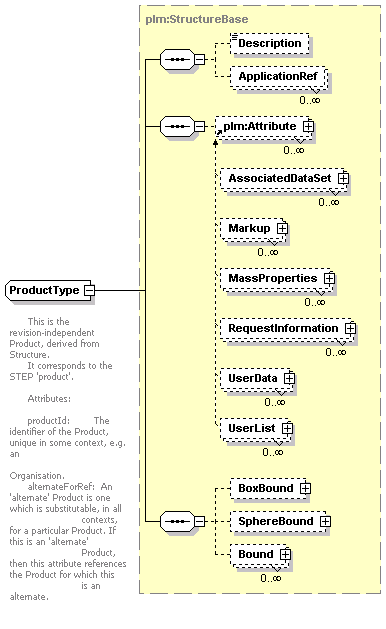 |
||
| namespace | http://www.plmxml.org/Schemas/PLMXMLSchema | ||
| type | extension of plm:StructureBase | ||
| children | Description ApplicationRef plm:Attribute BoxBound SphereBound Bound | ||
| used by |
|
||
| attributes | |||
| annotation |
|
||
| source | <xsd:complexType name="ProductType"> <xsd:annotation> <xsd:documentation> This is the revision-independent Product, derived from Structure. It corresponds to the STEP 'product'. Attributes: productId: The identifier of the Product, unique in some context, e.g. an Organisation. alternateForRef: An 'alternate' Product is one which is substitutable, in all contexts, for a particular Product. If this is an 'alternate' Product, then this attribute references the Product for which this is an alternate. </xsd:documentation> </xsd:annotation> <xsd:complexContent> <xsd:extension base="plm:StructureBase"> <xsd:attribute name="productId" type="xsd:string" use="optional"/> <xsd:attribute name="alternateForRef" type="plm:anyURIType" use="optional"/> </xsd:extension> </xsd:complexContent> </xsd:complexType> |
| diagram | 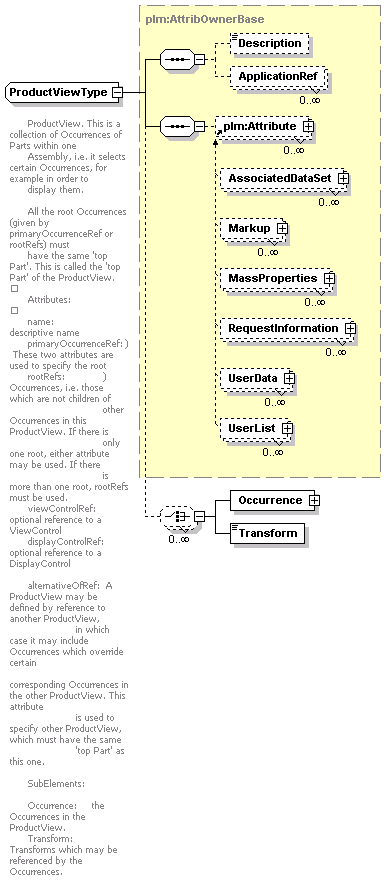 |
||
| namespace | http://www.plmxml.org/Schemas/PLMXMLSchema | ||
| type | extension of plm:AttribOwnerBase | ||
| children | Description ApplicationRef plm:Attribute Occurrence Transform | ||
| used by |
|
||
| attributes | |||
| annotation |
|
||
| source | <xsd:complexType name="ProductViewType"> <xsd:annotation> <xsd:documentation> ProductView. This is a collection of Occurrences of Parts within one Assembly, i.e. it selects certain Occurrences, for example in order to display them. All the root Occurrences (given by primaryOccurrenceRef or rootRefs) must have the same 'top Part'. This is called the 'top Part' of the ProductView. Attributes: name: descriptive name primaryOccurrenceRef: ) These two attributes are used to specify the root rootRefs: ) Occurrences, i.e. those which are not children of other Occurrences in this ProductView. If there is only one root, either attribute may be used. If there is more than one root, rootRefs must be used. viewControlRef: optional reference to a ViewControl displayControlRef: optional reference to a DisplayControl alternativeOfRef: A ProductView may be defined by reference to another ProductView, in which case it may include Occurrences which override certain corresponding Occurrences in the other ProductView. This attribute is used to specify other ProductView, which must have the same 'top Part' as this one. SubElements: Occurrence: the Occurrences in the ProductView. Transform: Transforms which may be referenced by the Occurrences. </xsd:documentation> </xsd:annotation> <xsd:complexContent> <xsd:extension base="plm:AttribOwnerBase"> <xsd:choice minOccurs="0" maxOccurs="unbounded"> <xsd:element name="Occurrence" type="plm:OccurrenceType"/> <xsd:element name="Transform" type="plm:TransformType"/> </xsd:choice> <xsd:attribute name="name" type="xsd:string" use="optional"/> <xsd:attribute name="primaryOccurrenceRef" type="xsd:IDREF" use="optional"/> <xsd:attribute name="rootRefs" type="xsd:IDREFS" use="optional"/> <xsd:attribute name="viewControlRef" type="xsd:IDREF" use="optional"/> <xsd:attribute name="displayControlRef" type="xsd:IDREF" use="optional"/> <xsd:attribute name="alternativeOfRef" type="plm:anyURIType" use="optional"/> </xsd:extension> </xsd:complexContent> </xsd:complexType> |
| diagram | 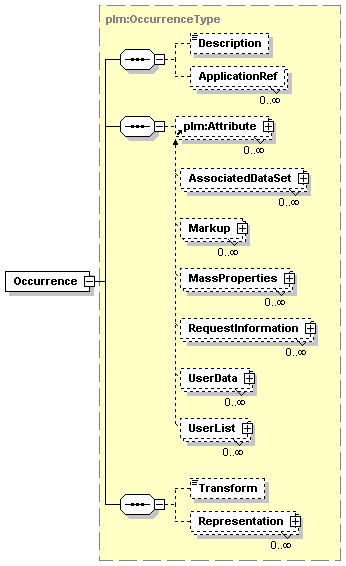 |
||||||||||||||||||||||||||||||||||||||||||||||||||||||||||||||||||||||||||||||||||||||||||
| namespace | http://www.plmxml.org/Schemas/PLMXMLSchema | ||||||||||||||||||||||||||||||||||||||||||||||||||||||||||||||||||||||||||||||||||||||||||
| type | plm:OccurrenceType | ||||||||||||||||||||||||||||||||||||||||||||||||||||||||||||||||||||||||||||||||||||||||||
| children | Description ApplicationRef plm:Attribute Transform Representation | ||||||||||||||||||||||||||||||||||||||||||||||||||||||||||||||||||||||||||||||||||||||||||
| attributes |
|
||||||||||||||||||||||||||||||||||||||||||||||||||||||||||||||||||||||||||||||||||||||||||
| source | <xsd:element name="Occurrence" type="plm:OccurrenceType"/> |
| diagram | |||||||||||||||||||
| namespace | http://www.plmxml.org/Schemas/PLMXMLSchema | ||||||||||||||||||
| type | plm:TransformType | ||||||||||||||||||
| facets |
|
||||||||||||||||||
| attributes |
|
||||||||||||||||||
| source | <xsd:element name="Transform" type="plm:TransformType"/> |
| diagram | 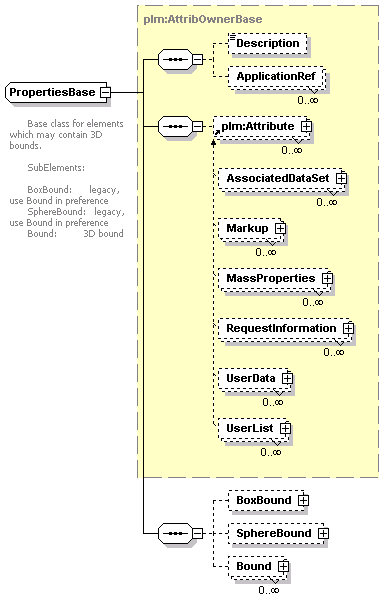 |
||||||||||||||||||
| namespace | http://www.plmxml.org/Schemas/PLMXMLSchema | ||||||||||||||||||
| type | extension of plm:AttribOwnerBase | ||||||||||||||||||
| children | Description ApplicationRef plm:Attribute BoxBound SphereBound Bound | ||||||||||||||||||
| used by |
|
||||||||||||||||||
| attributes |
|
||||||||||||||||||
| annotation |
|
||||||||||||||||||
| source | <xsd:complexType name="PropertiesBase" abstract="true"> <xsd:annotation> <xsd:documentation> Base class for elements which may contain 3D bounds. SubElements: BoxBound: legacy, use Bound in preference SphereBound: legacy, use Bound in preference Bound: 3D bound </xsd:documentation> <xsd:appinfo source="PLMXMLSchemaGenerator">sdkname=Entity3D</xsd:appinfo> </xsd:annotation> <xsd:complexContent> <xsd:extension base="plm:AttribOwnerBase"> <xsd:sequence> <xsd:element name="BoxBound" type="plm:BoxBoundType" minOccurs="0"> <xsd:annotation> <xsd:appinfo source="PLMXMLSchemaGenerator">output=ignore</xsd:appinfo> </xsd:annotation> </xsd:element> <xsd:element name="SphereBound" type="plm:SphereBoundType" minOccurs="0"> <xsd:annotation> <xsd:appinfo source="PLMXMLSchemaGenerator">output=ignore</xsd:appinfo> </xsd:annotation> </xsd:element> <xsd:element name="Bound" type="plm:BoundType" minOccurs="0" maxOccurs="unbounded"/> </xsd:sequence> </xsd:extension> </xsd:complexContent> </xsd:complexType> |
| diagram | 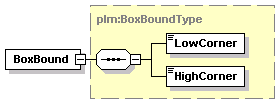 |
||
| namespace | http://www.plmxml.org/Schemas/PLMXMLSchema | ||
| type | plm:BoxBoundType | ||
| children | LowCorner HighCorner | ||
| annotation |
|
||
| source | <xsd:element name="BoxBound" type="plm:BoxBoundType" minOccurs="0"> <xsd:annotation> <xsd:appinfo source="PLMXMLSchemaGenerator">output=ignore</xsd:appinfo> </xsd:annotation> </xsd:element> |
| diagram | 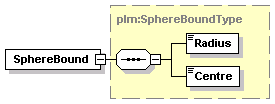 |
||
| namespace | http://www.plmxml.org/Schemas/PLMXMLSchema | ||
| type | plm:SphereBoundType | ||
| children | Radius Centre | ||
| annotation |
|
||
| source | <xsd:element name="SphereBound" type="plm:SphereBoundType" minOccurs="0"> <xsd:annotation> <xsd:appinfo source="PLMXMLSchemaGenerator">output=ignore</xsd:appinfo> </xsd:annotation> </xsd:element> |
| diagram |  |
||||||||||||||||||||||||
| namespace | http://www.plmxml.org/Schemas/PLMXMLSchema | ||||||||||||||||||||||||
| type | plm:BoundType | ||||||||||||||||||||||||
| children | Transform | ||||||||||||||||||||||||
| attributes |
|
||||||||||||||||||||||||
| source | <xsd:element name="Bound" type="plm:BoundType" minOccurs="0" maxOccurs="unbounded"/> |
| diagram | 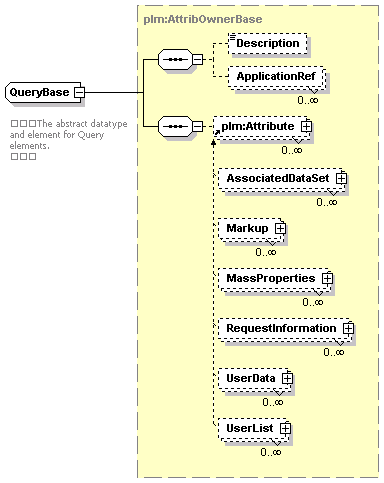 |
||||||||||||||||||
| namespace | http://www.plmxml.org/Schemas/PLMXMLSchema | ||||||||||||||||||
| type | extension of plm:AttribOwnerBase | ||||||||||||||||||
| children | Description ApplicationRef plm:Attribute | ||||||||||||||||||
| used by |
|
||||||||||||||||||
| attributes |
|
||||||||||||||||||
| annotation |
|
||||||||||||||||||
| source | <xsd:complexType name="QueryBase" abstract="true"> <xsd:annotation> <xsd:documentation> The abstract datatype and element for Query elements. </xsd:documentation> </xsd:annotation> <xsd:complexContent> <xsd:extension base="plm:AttribOwnerBase"/> </xsd:complexContent> </xsd:complexType> |
| diagram | 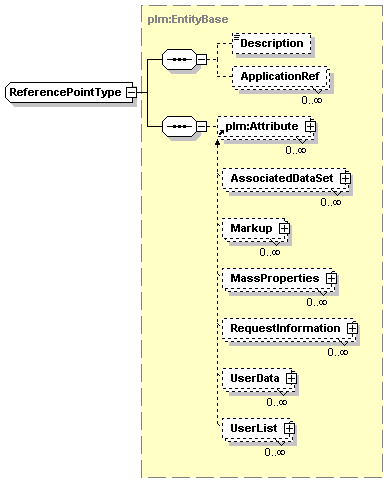 |
||||||||||||||||||||||||||||||
| namespace | http://www.plmxml.org/Schemas/PLMXMLSchema | ||||||||||||||||||||||||||||||
| type | extension of plm:EntityBase | ||||||||||||||||||||||||||||||
| children | Description ApplicationRef plm:Attribute | ||||||||||||||||||||||||||||||
| used by |
|
||||||||||||||||||||||||||||||
| attributes |
|
||||||||||||||||||||||||||||||
| source | <xsd:complexType name="ReferencePointType"> <xsd:complexContent> <xsd:extension base="plm:EntityBase"> <xsd:attribute name="position" type="plm:VectorType"/> </xsd:extension> </xsd:complexContent> </xsd:complexType> |
| diagram | 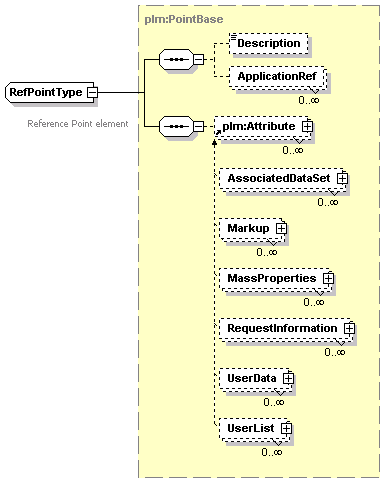 |
||||||||||||||||||||||||||||||
| namespace | http://www.plmxml.org/Schemas/PLMXMLSchema | ||||||||||||||||||||||||||||||
| type | extension of plm:PointBase | ||||||||||||||||||||||||||||||
| children | Description ApplicationRef plm:Attribute | ||||||||||||||||||||||||||||||
| used by |
|
||||||||||||||||||||||||||||||
| attributes |
|
||||||||||||||||||||||||||||||
| annotation |
|
||||||||||||||||||||||||||||||
| source | <xsd:complexType name="RefPointType"> <xsd:annotation> <xsd:documentation> Reference Point element </xsd:documentation> </xsd:annotation> <xsd:complexContent> <xsd:extension base="plm:PointBase"/> </xsd:complexContent> </xsd:complexType> |
| diagram | 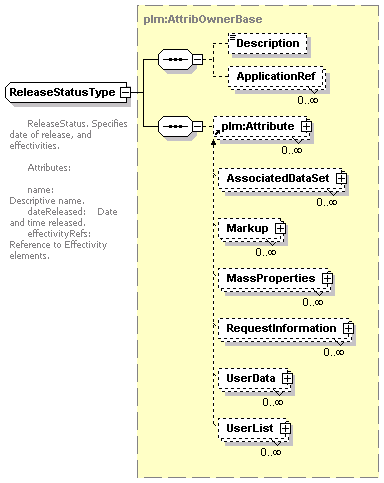 |
||||||||||||||||||||||||||||||||||||
| namespace | http://www.plmxml.org/Schemas/PLMXMLSchema | ||||||||||||||||||||||||||||||||||||
| type | extension of plm:AttribOwnerBase | ||||||||||||||||||||||||||||||||||||
| children | Description ApplicationRef plm:Attribute | ||||||||||||||||||||||||||||||||||||
| used by |
|
||||||||||||||||||||||||||||||||||||
| attributes |
|
||||||||||||||||||||||||||||||||||||
| annotation |
|
||||||||||||||||||||||||||||||||||||
| source | <xsd:complexType name="ReleaseStatusType"> <xsd:annotation> <xsd:documentation> ReleaseStatus. Specifies date of release, and effectivities. Attributes: name: Descriptive name. dateReleased: Date and time released. effectivityRefs: Reference to Effectivity elements. </xsd:documentation> </xsd:annotation> <xsd:complexContent> <xsd:extension base="plm:AttribOwnerBase"> <xsd:attribute name="name" type="xsd:string"/> <xsd:attribute name="dateReleased" type="xsd:dateTime" use="optional"/> <xsd:attribute name="effectivityRefs" type="plm:uriReferenceListType" use="optional"/> </xsd:extension> </xsd:complexContent> </xsd:complexType> |
| diagram | 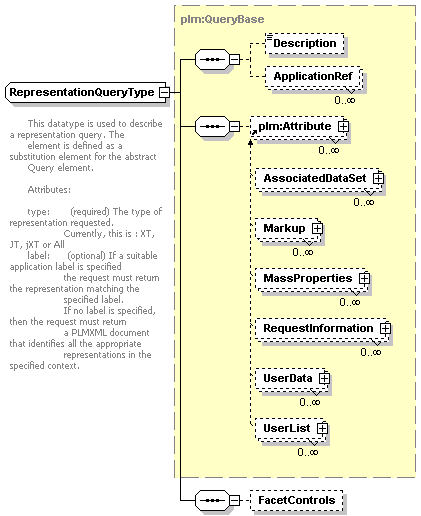 |
||||||||||||||||||||||||||||||
| namespace | http://www.plmxml.org/Schemas/PLMXMLSchema | ||||||||||||||||||||||||||||||
| type | extension of plm:QueryBase | ||||||||||||||||||||||||||||||
| children | Description ApplicationRef plm:Attribute FacetControls | ||||||||||||||||||||||||||||||
| used by |
|
||||||||||||||||||||||||||||||
| attributes |
|
||||||||||||||||||||||||||||||
| annotation |
|
||||||||||||||||||||||||||||||
| source | <xsd:complexType name="RepresentationQueryType"> <xsd:annotation> <xsd:documentation> This datatype is used to describe a representation query. The element is defined as a substitution element for the abstract Query element. Attributes: type: (required) The type of representation requested. Currently, this is : XT, JT, jXT or All label: (optional) If a suitable application label is specified the request must return the representation matching the specified label. If no label is specified, then the request must return a PLMXML document that identifies all the appropriate representations in the specified context. </xsd:documentation> </xsd:annotation> <xsd:complexContent> <xsd:extension base="plm:QueryBase"> <xsd:sequence> <xsd:element name="FacetControls" type="plm:FacetControlsType" minOccurs="0"/> </xsd:sequence> <xsd:attribute name="type" type="plm:RepQueryType" use="required"/> <xsd:attribute name="label" type="xsd:string" use="optional"/> </xsd:extension> </xsd:complexContent> </xsd:complexType> |
| diagram | |||||||||||||||||||||||||||||||||||||||||||
| namespace | http://www.plmxml.org/Schemas/PLMXMLSchema | ||||||||||||||||||||||||||||||||||||||||||
| type | plm:FacetControlsType | ||||||||||||||||||||||||||||||||||||||||||
| attributes |
|
||||||||||||||||||||||||||||||||||||||||||
| source | <xsd:element name="FacetControls" type="plm:FacetControlsType" minOccurs="0"/> |
| diagram | 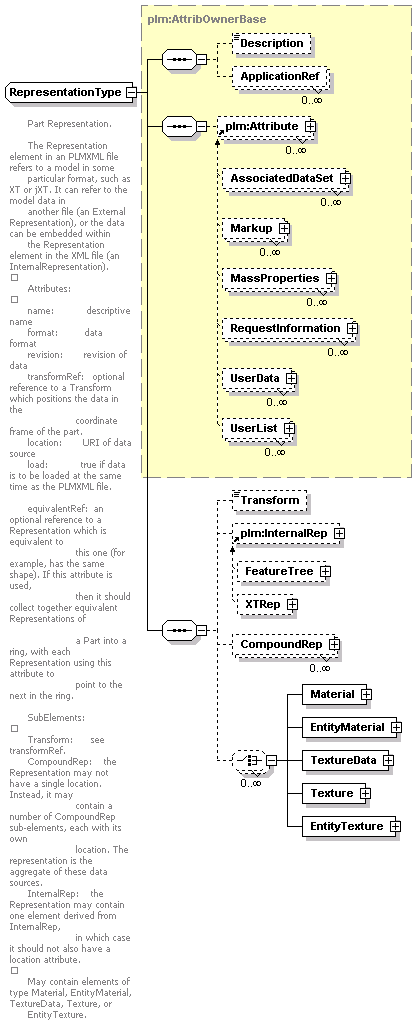 |
||
| namespace | http://www.plmxml.org/Schemas/PLMXMLSchema | ||
| type | extension of plm:AttribOwnerBase | ||
| children | Description ApplicationRef plm:Attribute Transform plm:InternalRep CompoundRep Material EntityMaterial TextureData Texture EntityTexture | ||
| used by |
|
||
| attributes | |||
| annotation |
|
||
| source | <xsd:complexType name="RepresentationType"> <xsd:annotation> <xsd:documentation> Part Representation. The Representation element in an PLMXML file refers to a model in some particular format, such as XT or jXT. It can refer to the model data in another file (an External Representation), or the data can be embedded within the Representation element in the XML file (an InternalRepresentation). Attributes: name: descriptive name format: data format revision: revision of data transformRef: optional reference to a Transform which positions the data in the coordinate frame of the part. location: URI of data source load: true if data is to be loaded at the same time as the PLMXML file. equivalentRef: an optional reference to a Representation which is equivalent to this one (for example, has the same shape). If this attribute is used, then it should collect together equivalent Representations of a Part into a ring, with each Representation using this attribute to point to the next in the ring. SubElements: Transform: see transformRef. CompoundRep: the Representation may not have a single location. Instead, it may contain a number of CompoundRep sub-elements, each with its own location. The representation is the aggregate of these data sources. InternalRep: the Representation may contain one element derived from InternalRep, in which case it should not also have a location attribute. May contain elements of type Material, EntityMaterial, TextureData, Texture, or EntityTexture. </xsd:documentation> </xsd:annotation> <xsd:complexContent> <xsd:extension base="plm:AttribOwnerBase"> <xsd:sequence> <xsd:element name="Transform" type="plm:TransformType" minOccurs="0"/> <xsd:element ref="plm:InternalRep" minOccurs="0"/> <xsd:element name="CompoundRep" type="plm:CompoundRepType" minOccurs="0" maxOccurs="unbounded"/> <xsd:choice minOccurs="0" maxOccurs="unbounded"> <xsd:element name="Material" type="plm:MaterialType"/> <xsd:element name="EntityMaterial" type="plm:EntityMaterialType"/> <xsd:element name="TextureData" type="plm:TextureDataType"/> <xsd:element name="Texture" type="plm:TextureType"/> <xsd:element name="EntityTexture" type="plm:EntityTextureType"/> </xsd:choice> </xsd:sequence> <xsd:attribute name="name" type="xsd:string" use="optional"/> <xsd:attribute name="transformRef" type="xsd:IDREF" use="optional"/> <xsd:attribute name="format" type="plm:RepresentationFormatType" use="optional"/> <xsd:attribute name="revision" type="xsd:decimal" use="optional"/> <xsd:attributeGroup ref="plm:referenceGroup"/> <xsd:attribute name="equivalentRef" type="xsd:IDREF" use="optional"/> </xsd:extension> </xsd:complexContent> </xsd:complexType> |
| diagram | |||||||||||||||||||
| namespace | http://www.plmxml.org/Schemas/PLMXMLSchema | ||||||||||||||||||
| type | plm:TransformType | ||||||||||||||||||
| facets |
|
||||||||||||||||||
| attributes |
|
||||||||||||||||||
| source | <xsd:element name="Transform" type="plm:TransformType" minOccurs="0"/> |
| diagram | 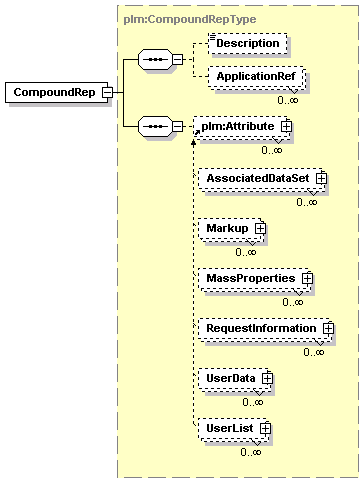 |
||||||||||||||||||||||||||||||||||||
| namespace | http://www.plmxml.org/Schemas/PLMXMLSchema | ||||||||||||||||||||||||||||||||||||
| type | plm:CompoundRepType | ||||||||||||||||||||||||||||||||||||
| children | Description ApplicationRef plm:Attribute | ||||||||||||||||||||||||||||||||||||
| attributes |
|
||||||||||||||||||||||||||||||||||||
| source | <xsd:element name="CompoundRep" type="plm:CompoundRepType" minOccurs="0" maxOccurs="unbounded"/> |
| diagram | 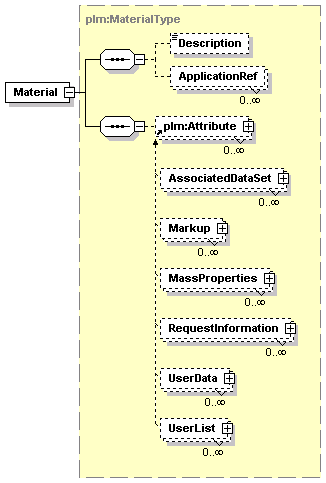 |
||||||||||||||||||||||||||||||||||||||||||||||||||||||||||||
| namespace | http://www.plmxml.org/Schemas/PLMXMLSchema | ||||||||||||||||||||||||||||||||||||||||||||||||||||||||||||
| type | plm:MaterialType | ||||||||||||||||||||||||||||||||||||||||||||||||||||||||||||
| children | Description ApplicationRef plm:Attribute | ||||||||||||||||||||||||||||||||||||||||||||||||||||||||||||
| attributes |
|
||||||||||||||||||||||||||||||||||||||||||||||||||||||||||||
| source | <xsd:element name="Material" type="plm:MaterialType"/> |
| diagram | 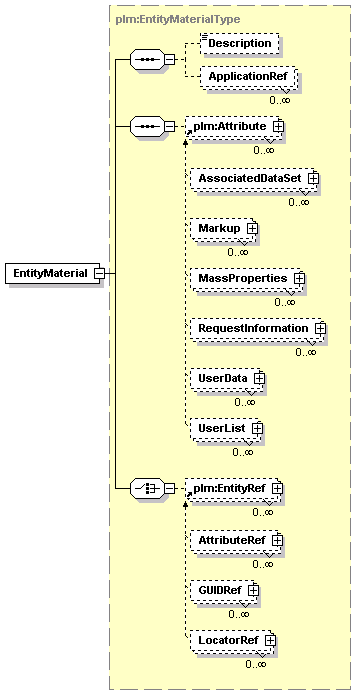 |
||||||||||||||||||||||||
| namespace | http://www.plmxml.org/Schemas/PLMXMLSchema | ||||||||||||||||||||||||
| type | plm:EntityMaterialType | ||||||||||||||||||||||||
| children | Description ApplicationRef plm:Attribute plm:EntityRef | ||||||||||||||||||||||||
| attributes |
|
||||||||||||||||||||||||
| source | <xsd:element name="EntityMaterial" type="plm:EntityMaterialType"/> |
| diagram | 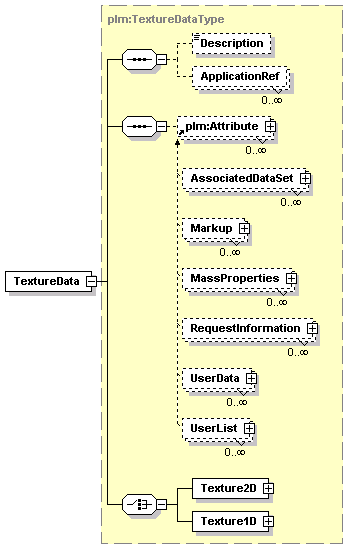 |
||||||||||||||||||||||||
| namespace | http://www.plmxml.org/Schemas/PLMXMLSchema | ||||||||||||||||||||||||
| type | plm:TextureDataType | ||||||||||||||||||||||||
| children | Description ApplicationRef plm:Attribute Texture2D Texture1D | ||||||||||||||||||||||||
| attributes |
|
||||||||||||||||||||||||
| source | <xsd:element name="TextureData" type="plm:TextureDataType"/> |
| diagram | 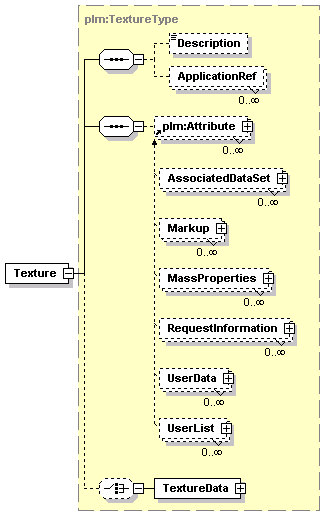 |
||||||||||||||||||||||||||||||||||||||||||||||||||||||||||||||||||
| namespace | http://www.plmxml.org/Schemas/PLMXMLSchema | ||||||||||||||||||||||||||||||||||||||||||||||||||||||||||||||||||
| type | plm:TextureType | ||||||||||||||||||||||||||||||||||||||||||||||||||||||||||||||||||
| children | Description ApplicationRef plm:Attribute TextureData | ||||||||||||||||||||||||||||||||||||||||||||||||||||||||||||||||||
| attributes |
|
||||||||||||||||||||||||||||||||||||||||||||||||||||||||||||||||||
| source | <xsd:element name="Texture" type="plm:TextureType"/> |
| diagram | 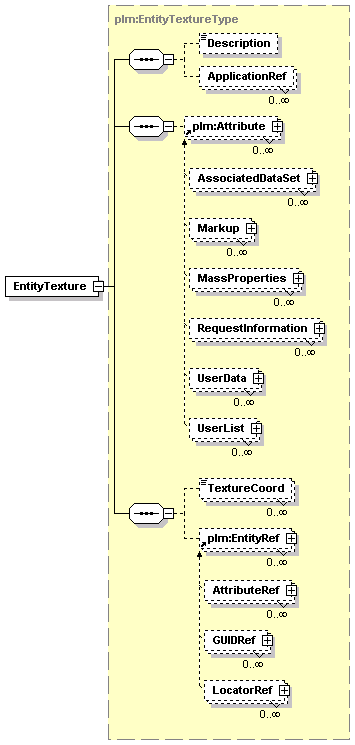 |
||||||||||||||||||||||||
| namespace | http://www.plmxml.org/Schemas/PLMXMLSchema | ||||||||||||||||||||||||
| type | plm:EntityTextureType | ||||||||||||||||||||||||
| children | Description ApplicationRef plm:Attribute TextureCoord plm:EntityRef | ||||||||||||||||||||||||
| attributes |
|
||||||||||||||||||||||||
| source | <xsd:element name="EntityTexture" type="plm:EntityTextureType"/> |
| diagram | 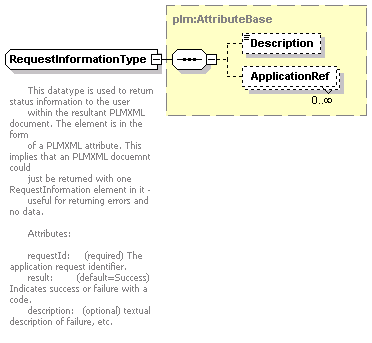 |
||||||||||||||||||||||||||||||
| namespace | http://www.plmxml.org/Schemas/PLMXMLSchema | ||||||||||||||||||||||||||||||
| type | extension of plm:AttributeBase | ||||||||||||||||||||||||||||||
| children | Description ApplicationRef | ||||||||||||||||||||||||||||||
| used by |
|
||||||||||||||||||||||||||||||
| attributes |
|
||||||||||||||||||||||||||||||
| annotation |
|
||||||||||||||||||||||||||||||
| source | <xsd:complexType name="RequestInformationType"> <xsd:annotation> <xsd:documentation> This datatype is used to return status information to the user within the resultant PLMXML document. The element is in the form of a PLMXML attribute. This implies that an PLMXML docuemnt could just be returned with one RequestInformation element in it - useful for returning errors and no data. Attributes: requestId: (required) The application request identifier. result: (default=Success) Indicates success or failure with a code. description: (optional) textual description of failure, etc. </xsd:documentation> </xsd:annotation> <xsd:complexContent> <xsd:extension base="plm:AttributeBase"> <xsd:attribute name="requestId" type="plm:RequestIdType" use="required"/> <xsd:attribute name="result" type="plm:RequestResultType" default="Success"/> <xsd:attribute name="description" type="xsd:string" use="optional"/> </xsd:extension> </xsd:complexContent> </xsd:complexType> |
| diagram | 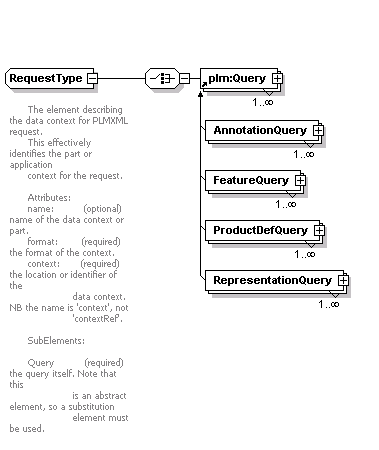 |
||||||||||||||||||||||||
| namespace | http://www.plmxml.org/Schemas/PLMXMLSchema | ||||||||||||||||||||||||
| children | plm:Query | ||||||||||||||||||||||||
| used by |
|
||||||||||||||||||||||||
| attributes |
|
||||||||||||||||||||||||
| annotation |
|
||||||||||||||||||||||||
| source | <xsd:complexType name="RequestType"> <xsd:annotation> <xsd:documentation> The element describing the data context for PLMXML request. This effectively identifies the part or application context for the request. Attributes: name: (optional) name of the data context or part. format: (required) the format of the context. context: (required) the location or identifier of the data context. NB the name is 'context', not 'contextRef'. SubElements: Query (required) the query itself. Note that this is an abstract element, so a substitution element must be used. </xsd:documentation> </xsd:annotation> <xsd:choice> <xsd:element ref="plm:Query" maxOccurs="unbounded"/> </xsd:choice> <xsd:attribute name="name" type="xsd:string" use="optional"/> <xsd:attribute name="format" type="plm:RepresentationFormatType" use="required"/> <xsd:attribute name="context" type="xsd:string" use="required"/> </xsd:complexType> |
| diagram | 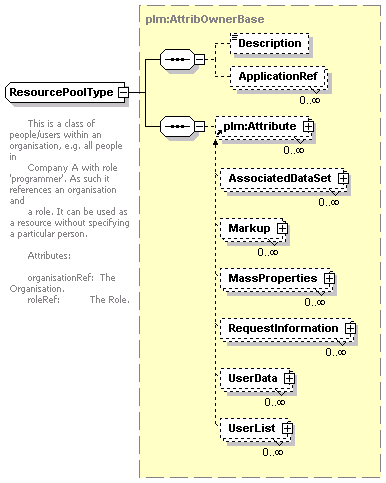 |
||||||||||||||||||||||||||||||
| namespace | http://www.plmxml.org/Schemas/PLMXMLSchema | ||||||||||||||||||||||||||||||
| type | extension of plm:AttribOwnerBase | ||||||||||||||||||||||||||||||
| children | Description ApplicationRef plm:Attribute | ||||||||||||||||||||||||||||||
| used by |
|
||||||||||||||||||||||||||||||
| attributes |
|
||||||||||||||||||||||||||||||
| annotation |
|
||||||||||||||||||||||||||||||
| source | <xsd:complexType name="ResourcePoolType"> <xsd:annotation> <xsd:documentation> This is a class of people/users within an organisation, e.g. all people in Company A with role 'programmer'. As such it references an organisation and a role. It can be used as a resource without specifying a particular person. Attributes: organisationRef: The Organisation. roleRef: The Role. </xsd:documentation> </xsd:annotation> <xsd:complexContent> <xsd:extension base="plm:AttribOwnerBase"> <xsd:attribute name="organisationRef" type="plm:anyURIType" use="optional"/> <xsd:attribute name="roleRef" type="plm:anyURIType" use="optional"/> </xsd:extension> </xsd:complexContent> </xsd:complexType> |
| diagram | 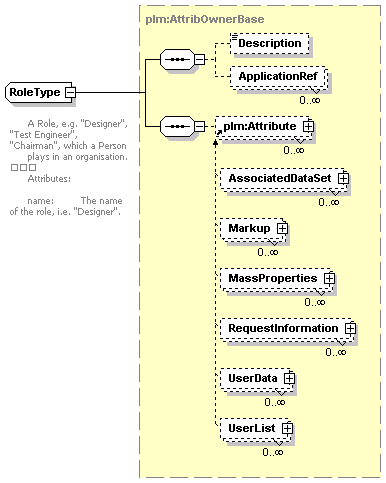 |
||||||||||||||||||||||||
| namespace | http://www.plmxml.org/Schemas/PLMXMLSchema | ||||||||||||||||||||||||
| type | extension of plm:AttribOwnerBase | ||||||||||||||||||||||||
| children | Description ApplicationRef plm:Attribute | ||||||||||||||||||||||||
| used by |
|
||||||||||||||||||||||||
| attributes |
|
||||||||||||||||||||||||
| annotation |
|
||||||||||||||||||||||||
| source | <xsd:complexType name="RoleType"> <xsd:annotation> <xsd:documentation> A Role, e.g. "Designer", "Test Engineer", "Chairman", which a Person plays in an organisation. Attributes: name: The name of the role, i.e. "Designer". </xsd:documentation> </xsd:annotation> <xsd:complexContent> <xsd:extension base="plm:AttribOwnerBase"> <xsd:attribute name="name" type="xsd:string" use="optional"/> </xsd:extension> </xsd:complexContent> </xsd:complexType> |
| diagram | |||||||||||||
| namespace | http://www.plmxml.org/Schemas/PLMXMLSchema | ||||||||||||
| type | extension of plm:DoubleListType | ||||||||||||
| used by |
|
||||||||||||
| attributes |
|
||||||||||||
| source | <xsd:complexType name="SamplePointsType"> <xsd:simpleContent> <xsd:extension base="plm:DoubleListType"> <xsd:attribute name="tolerance" type="xsd:double"/> </xsd:extension> </xsd:simpleContent> </xsd:complexType> |
| diagram | 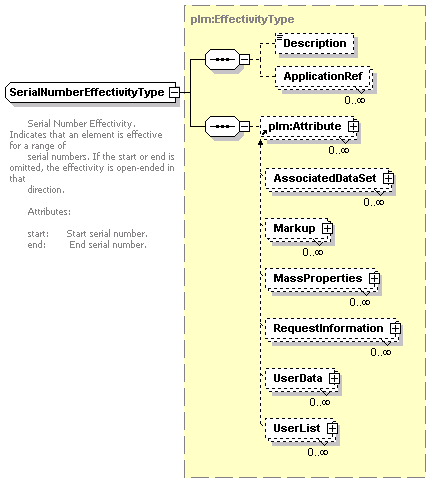 |
||||||||||||||||||||||||||||||||||||
| namespace | http://www.plmxml.org/Schemas/PLMXMLSchema | ||||||||||||||||||||||||||||||||||||
| type | extension of plm:EffectivityType | ||||||||||||||||||||||||||||||||||||
| children | Description ApplicationRef plm:Attribute | ||||||||||||||||||||||||||||||||||||
| used by |
|
||||||||||||||||||||||||||||||||||||
| attributes |
|
||||||||||||||||||||||||||||||||||||
| annotation |
|
||||||||||||||||||||||||||||||||||||
| source | <xsd:complexType name="SerialNumberEffectivityType"> <xsd:annotation> <xsd:documentation> Serial Number Effectivity. Indicates that an element is effective for a range of serial numbers. If the start or end is omitted, the effectivity is open-ended in that direction. Attributes: start: Start serial number. end: End serial number. </xsd:documentation> </xsd:annotation> <xsd:complexContent> <xsd:extension base="plm:EffectivityType"> <xsd:attribute name="start" type="xsd:string" use="optional"/> <xsd:attribute name="end" type="xsd:string" use="optional"/> </xsd:extension> </xsd:complexContent> </xsd:complexType> |
| diagram | 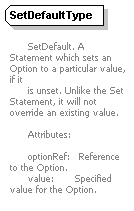 |
||||||||||||||||||
| namespace | http://www.plmxml.org/Schemas/PLMXMLSchema | ||||||||||||||||||
| type | extension of plm:StatementBase | ||||||||||||||||||
| used by |
|
||||||||||||||||||
| attributes |
|
||||||||||||||||||
| annotation |
|
||||||||||||||||||
| source | <xsd:complexType name="SetDefaultType"> <xsd:annotation> <xsd:documentation> SetDefault. A Statement which sets an Option to a particular value, if it is unset. Unlike the Set Statement, it will not override an existing value. Attributes: optionRef: Reference to the Option. value: Specified value for the Option. </xsd:documentation> </xsd:annotation> <xsd:complexContent> <xsd:extension base="plm:StatementBase"> <xsd:attribute name="optionRef" type="plm:anyURIType" use="required"/> <xsd:attribute name="value" type="xsd:string" use="required"/> </xsd:extension> </xsd:complexContent> </xsd:complexType> |
| diagram | 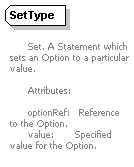 |
||||||||||||||||||
| namespace | http://www.plmxml.org/Schemas/PLMXMLSchema | ||||||||||||||||||
| type | extension of plm:StatementBase | ||||||||||||||||||
| used by |
|
||||||||||||||||||
| attributes |
|
||||||||||||||||||
| annotation |
|
||||||||||||||||||
| source | <xsd:complexType name="SetType"> <xsd:annotation> <xsd:documentation> Set. A Statement which sets an Option to a particular value. Attributes: optionRef: Reference to the Option. value: Specified value for the Option. </xsd:documentation> </xsd:annotation> <xsd:complexContent> <xsd:extension base="plm:StatementBase"> <xsd:attribute name="optionRef" type="plm:anyURIType" use="required"/> <xsd:attribute name="value" type="xsd:string" use="required"/> </xsd:extension> </xsd:complexContent> </xsd:complexType> |
| diagram | 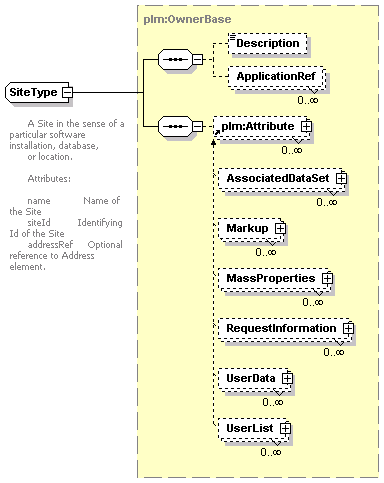 |
||||||||||||||||||||||||||||||||||||
| namespace | http://www.plmxml.org/Schemas/PLMXMLSchema | ||||||||||||||||||||||||||||||||||||
| type | extension of plm:OwnerBase | ||||||||||||||||||||||||||||||||||||
| children | Description ApplicationRef plm:Attribute | ||||||||||||||||||||||||||||||||||||
| used by |
|
||||||||||||||||||||||||||||||||||||
| attributes |
|
||||||||||||||||||||||||||||||||||||
| annotation |
|
||||||||||||||||||||||||||||||||||||
| source | <xsd:complexType name="SiteType"> <xsd:annotation> <xsd:documentation> A Site in the sense of a particular software installation, database, or location. Attributes: name Name of the Site siteId Identifying Id of the Site addressRef Optional reference to Address element. </xsd:documentation> </xsd:annotation> <xsd:complexContent> <xsd:extension base="plm:OwnerBase"> <xsd:attribute name="name" type="xsd:string" use="optional"/> <xsd:attribute name="siteId" type="xsd:string" use="optional"/> <xsd:attribute name="addressRef" type="plm:anyURIType" use="optional"/> </xsd:extension> </xsd:complexContent> </xsd:complexType> |
| diagram | 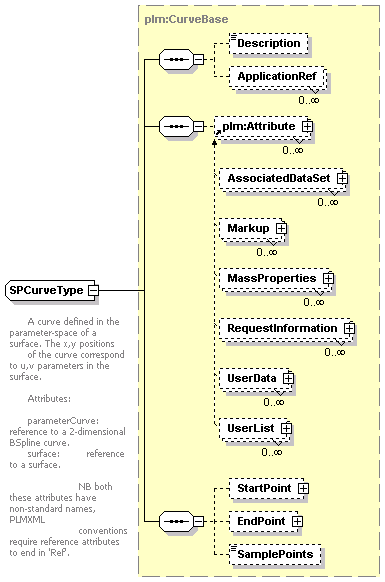 |
||
| namespace | http://www.plmxml.org/Schemas/PLMXMLSchema | ||
| type | extension of plm:CurveBase | ||
| children | Description ApplicationRef plm:Attribute StartPoint EndPoint SamplePoints | ||
| used by |
|
||
| attributes | |||
| annotation |
|
||
| source | <xsd:complexType name="SPCurveType"> <xsd:annotation> <xsd:documentation> A curve defined in the parameter-space of a surface. The x,y positions of the curve correspond to u,v parameters in the surface. Attributes: parameterCurve: reference to a 2-dimensional BSpline curve. surface: reference to a surface. NB both these attributes have non-standard names, PLMXML conventions require reference attributes to end in 'Ref'. </xsd:documentation> </xsd:annotation> <xsd:complexContent> <xsd:extension base="plm:CurveBase"> <xsd:attribute name="parameterCurve" type="xsd:IDREF" use="required"/> <xsd:attribute name="surface" type="xsd:IDREF" use="required"/> </xsd:extension> </xsd:complexContent> </xsd:complexType> |
| diagram | 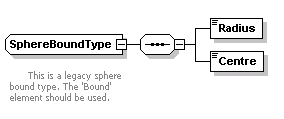 |
||||
| namespace | http://www.plmxml.org/Schemas/PLMXMLSchema | ||||
| children | Radius Centre | ||||
| used by |
|
||||
| annotation |
|
||||
| source | <xsd:complexType name="SphereBoundType"> <xsd:annotation> <xsd:documentation> This is a legacy sphere bound type. The 'Bound' element should be used. </xsd:documentation> <xsd:appinfo source="PLMXMLSchemaGenerator">output=ignore</xsd:appinfo> </xsd:annotation> <xsd:sequence> <xsd:element name="Radius" type="xsd:double"/> <xsd:element name="Centre" type="plm:VectorType"/> </xsd:sequence> </xsd:complexType> |
| diagram | |
| namespace | http://www.plmxml.org/Schemas/PLMXMLSchema |
| type | xsd:double |
| source | <xsd:element name="Radius" type="xsd:double"/> |
| diagram | |||
| namespace | http://www.plmxml.org/Schemas/PLMXMLSchema | ||
| type | plm:VectorType | ||
| facets |
|
||
| source | <xsd:element name="Centre" type="plm:VectorType"/> |
| diagram | 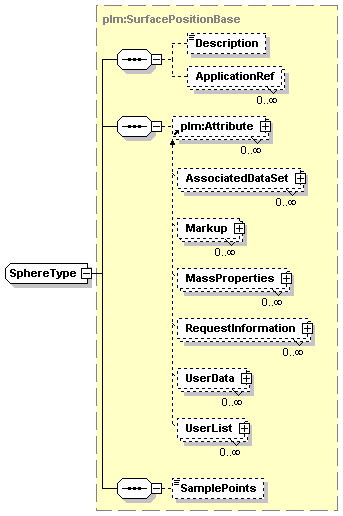 |
||
| namespace | http://www.plmxml.org/Schemas/PLMXMLSchema | ||
| type | extension of plm:SurfacePositionBase | ||
| children | Description ApplicationRef plm:Attribute SamplePoints | ||
| used by |
|
||
| attributes | |||
| source | <xsd:complexType name="SphereType"> <xsd:complexContent> <xsd:extension base="plm:SurfacePositionBase"> <xsd:attribute name="radius" type="xsd:double" use="required"/> </xsd:extension> </xsd:complexContent> </xsd:complexType> |
| diagram |  |
||||
| namespace | http://www.plmxml.org/Schemas/PLMXMLSchema | ||||
| used by |
|
||||
| annotation |
|
||||
| source | <xsd:complexType name="StatementBase" abstract="true"> <xsd:annotation> <xsd:documentation> Statement - abstract base class for statements. </xsd:documentation> </xsd:annotation> </xsd:complexType> |
| diagram | 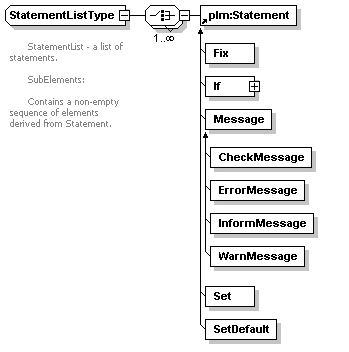 |
||
| namespace | http://www.plmxml.org/Schemas/PLMXMLSchema | ||
| children | plm:Statement | ||
| used by |
|
||
| annotation |
|
||
| source | <xsd:complexType name="StatementListType"> <xsd:annotation> <xsd:documentation> StatementList - a list of statements. SubElements: Contains a non-empty sequence of elements derived from Statement. </xsd:documentation> </xsd:annotation> <xsd:choice maxOccurs="unbounded"> <xsd:element ref="plm:Statement"/> </xsd:choice> </xsd:complexType> |
| diagram | 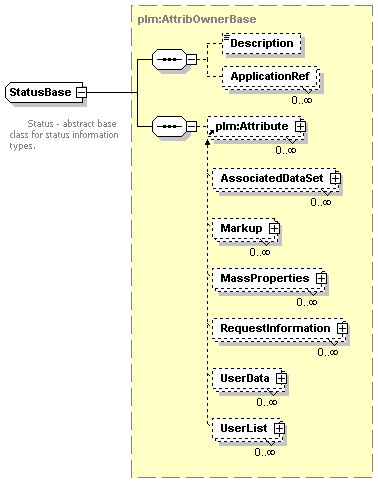 |
||||||||||||||||||
| namespace | http://www.plmxml.org/Schemas/PLMXMLSchema | ||||||||||||||||||
| type | extension of plm:AttribOwnerBase | ||||||||||||||||||
| children | Description ApplicationRef plm:Attribute | ||||||||||||||||||
| used by |
|
||||||||||||||||||
| attributes |
|
||||||||||||||||||
| annotation |
|
||||||||||||||||||
| source | <xsd:complexType name="StatusBase" abstract="true"> <xsd:annotation> <xsd:documentation> Status - abstract base class for status information types. </xsd:documentation> </xsd:annotation> <xsd:complexContent> <xsd:extension base="plm:AttribOwnerBase"/> </xsd:complexContent> </xsd:complexType> |
| diagram | 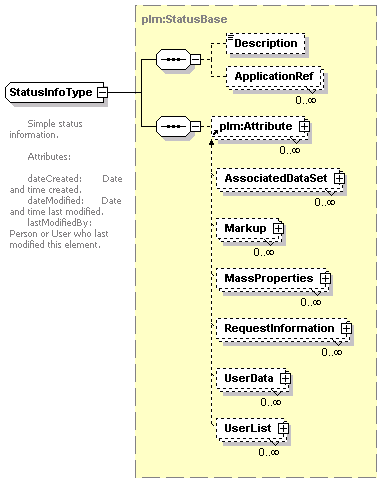 |
||||||||||||||||||||||||||||||||||||
| namespace | http://www.plmxml.org/Schemas/PLMXMLSchema | ||||||||||||||||||||||||||||||||||||
| type | extension of plm:StatusBase | ||||||||||||||||||||||||||||||||||||
| children | Description ApplicationRef plm:Attribute | ||||||||||||||||||||||||||||||||||||
| used by |
|
||||||||||||||||||||||||||||||||||||
| attributes |
|
||||||||||||||||||||||||||||||||||||
| annotation |
|
||||||||||||||||||||||||||||||||||||
| source | <xsd:complexType name="StatusInfoType"> <xsd:annotation> <xsd:documentation> Simple status information. Attributes: dateCreated: Date and time created. dateModified: Date and time last modified. lastModifiedBy: Person or User who last modified this element. </xsd:documentation> </xsd:annotation> <xsd:complexContent> <xsd:extension base="plm:StatusBase"> <xsd:attribute name="dateCreated" type="xsd:dateTime" use="optional"/> <xsd:attribute name="dateModified" type="xsd:dateTime" use="optional"/> <xsd:attribute name="lastModifiedBy" type="plm:anyURIType" use="optional"/> </xsd:extension> </xsd:complexContent> </xsd:complexType> |
| diagram | 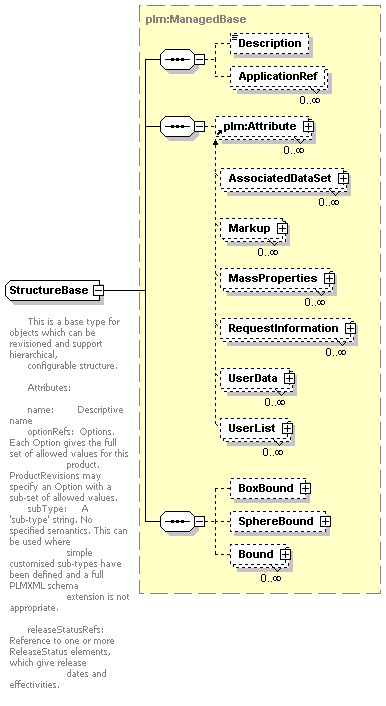 |
||||
| namespace | http://www.plmxml.org/Schemas/PLMXMLSchema | ||||
| type | extension of plm:ManagedBase | ||||
| children | Description ApplicationRef plm:Attribute BoxBound SphereBound Bound | ||||
| used by |
|
||||
| attributes | |||||
| annotation |
|
||||
| source | <xsd:complexType name="StructureBase" abstract="true"> <xsd:annotation> <xsd:documentation> This is a base type for objects which can be revisioned and support hierarchical, configurable structure. Attributes: name: Descriptive name optionRefs: Options. Each Option gives the full set of allowed values for this product. ProductRevisions may specify an Option with a sub-set of allowed values. subType: A 'sub-type' string. No specified semantics. This can be used where simple customised sub-types have been defined and a full PLMXML schema extension is not appropriate. releaseStatusRefs: Reference to one or more ReleaseStatus elements, which give release dates and effectivities. </xsd:documentation> </xsd:annotation> <xsd:complexContent> <xsd:extension base="plm:ManagedBase"> <xsd:attribute name="name" type="xsd:string" use="optional"/> <xsd:attribute name="optionRefs" type="plm:uriReferenceListType" use="optional"/> <xsd:attribute name="subType" type="xsd:string" use="optional"/> <xsd:attribute name="releaseStatusRefs" type="plm:uriReferenceListType" use="optional"/> </xsd:extension> </xsd:complexContent> </xsd:complexType> |
| diagram | 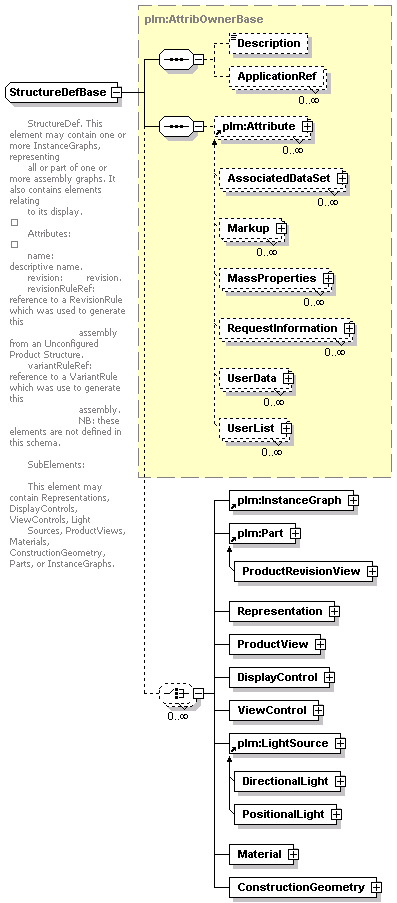 |
||||||||||||||||||||||||||||||||||||||||||
| namespace | http://www.plmxml.org/Schemas/PLMXMLSchema | ||||||||||||||||||||||||||||||||||||||||||
| type | extension of plm:AttribOwnerBase | ||||||||||||||||||||||||||||||||||||||||||
| children | Description ApplicationRef plm:Attribute plm:InstanceGraph plm:Part Representation ProductView DisplayControl ViewControl plm:LightSource Material ConstructionGeometry | ||||||||||||||||||||||||||||||||||||||||||
| used by |
|
||||||||||||||||||||||||||||||||||||||||||
| attributes |
|
||||||||||||||||||||||||||||||||||||||||||
| annotation |
|
||||||||||||||||||||||||||||||||||||||||||
| source | <xsd:complexType name="StructureDefBase"> <xsd:annotation> <xsd:documentation> StructureDef. This element may contain one or more InstanceGraphs, representing all or part of one or more assembly graphs. It also contains elements relating to its display. Attributes: name: descriptive name. revision: revision. revisionRuleRef: reference to a RevisionRule which was used to generate this assembly from an Unconfigured Product Structure. variantRuleRef: reference to a VariantRule which was use to generate this assembly. NB: these elements are not defined in this schema. SubElements: This element may contain Representations, DisplayControls, ViewControls, Light Sources, ProductViews, Materials, ConstructionGeometry, Parts, or InstanceGraphs. </xsd:documentation> </xsd:annotation> <xsd:complexContent> <xsd:extension base="plm:AttribOwnerBase"> <xsd:choice minOccurs="0" maxOccurs="unbounded"> <xsd:element ref="plm:InstanceGraph"/> <xsd:element ref="plm:Part"/> <xsd:element name="Representation" type="plm:RepresentationType"/> <xsd:element name="ProductView" type="plm:ProductViewType"/> <xsd:element name="DisplayControl" type="plm:DisplayControlType"/> <xsd:element name="ViewControl" type="plm:ViewControlType"/> <xsd:element ref="plm:LightSource"/> <xsd:element name="Material" type="plm:MaterialType"/> <xsd:element name="ConstructionGeometry" type="plm:ConstructionGeometryType"/> </xsd:choice> <xsd:attribute name="name" type="xsd:string" use="optional"/> <xsd:attribute name="revision" type="xsd:decimal" use="optional"/> <xsd:attribute name="variantRuleRef" type="xsd:anyURI"/> <xsd:attribute name="revisionRuleRef" type="xsd:anyURI"/> </xsd:extension> </xsd:complexContent> </xsd:complexType> |
| diagram | 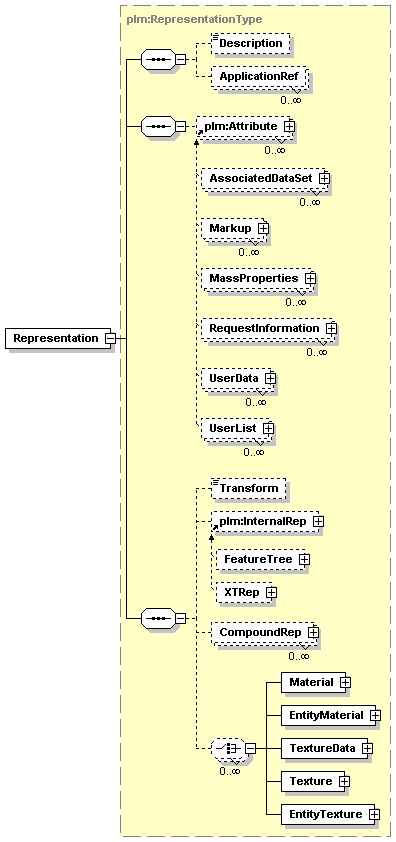 |
||||||||||||||||||||||||||||||||||||||||||||||||||||||||||||
| namespace | http://www.plmxml.org/Schemas/PLMXMLSchema | ||||||||||||||||||||||||||||||||||||||||||||||||||||||||||||
| type | plm:RepresentationType | ||||||||||||||||||||||||||||||||||||||||||||||||||||||||||||
| children | Description ApplicationRef plm:Attribute Transform plm:InternalRep CompoundRep Material EntityMaterial TextureData Texture EntityTexture | ||||||||||||||||||||||||||||||||||||||||||||||||||||||||||||
| attributes |
|
||||||||||||||||||||||||||||||||||||||||||||||||||||||||||||
| source | <xsd:element name="Representation" type="plm:RepresentationType"/> |
| diagram | 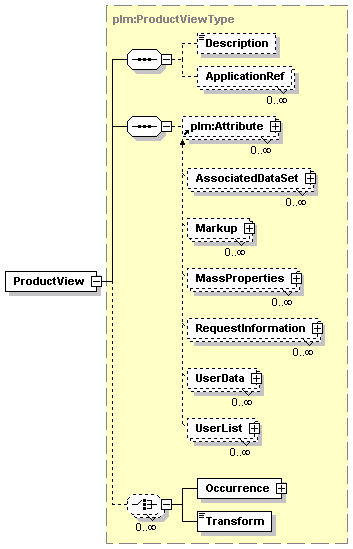 |
||||||||||||||||||||||||||||||||||||||||||||||||||||||
| namespace | http://www.plmxml.org/Schemas/PLMXMLSchema | ||||||||||||||||||||||||||||||||||||||||||||||||||||||
| type | plm:ProductViewType | ||||||||||||||||||||||||||||||||||||||||||||||||||||||
| children | Description ApplicationRef plm:Attribute Occurrence Transform | ||||||||||||||||||||||||||||||||||||||||||||||||||||||
| attributes |
|
||||||||||||||||||||||||||||||||||||||||||||||||||||||
| source | <xsd:element name="ProductView" type="plm:ProductViewType"/> |
| diagram | 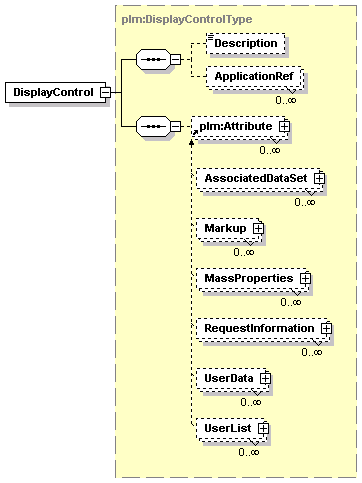 |
||||||||||||||||||||||||||||||||||||||||||||||||
| namespace | http://www.plmxml.org/Schemas/PLMXMLSchema | ||||||||||||||||||||||||||||||||||||||||||||||||
| type | plm:DisplayControlType | ||||||||||||||||||||||||||||||||||||||||||||||||
| children | Description ApplicationRef plm:Attribute | ||||||||||||||||||||||||||||||||||||||||||||||||
| attributes |
|
||||||||||||||||||||||||||||||||||||||||||||||||
| source | <xsd:element name="DisplayControl" type="plm:DisplayControlType"/> |
| diagram | 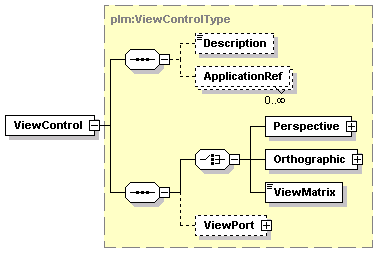 |
||||||||||||
| namespace | http://www.plmxml.org/Schemas/PLMXMLSchema | ||||||||||||
| type | plm:ViewControlType | ||||||||||||
| children | Description ApplicationRef Perspective Orthographic ViewMatrix ViewPort | ||||||||||||
| attributes |
|
||||||||||||
| source | <xsd:element name="ViewControl" type="plm:ViewControlType"/> |
| diagram | 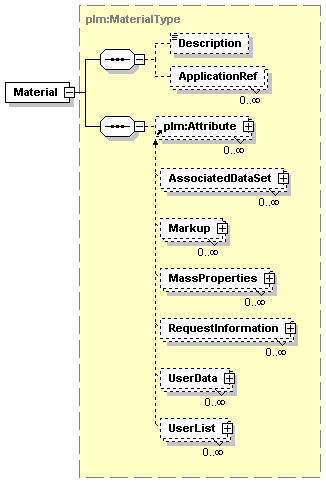 |
||||||||||||||||||||||||||||||||||||||||||||||||||||||||||||
| namespace | http://www.plmxml.org/Schemas/PLMXMLSchema | ||||||||||||||||||||||||||||||||||||||||||||||||||||||||||||
| type | plm:MaterialType | ||||||||||||||||||||||||||||||||||||||||||||||||||||||||||||
| children | Description ApplicationRef plm:Attribute | ||||||||||||||||||||||||||||||||||||||||||||||||||||||||||||
| attributes |
|
||||||||||||||||||||||||||||||||||||||||||||||||||||||||||||
| source | <xsd:element name="Material" type="plm:MaterialType"/> |
| diagram | 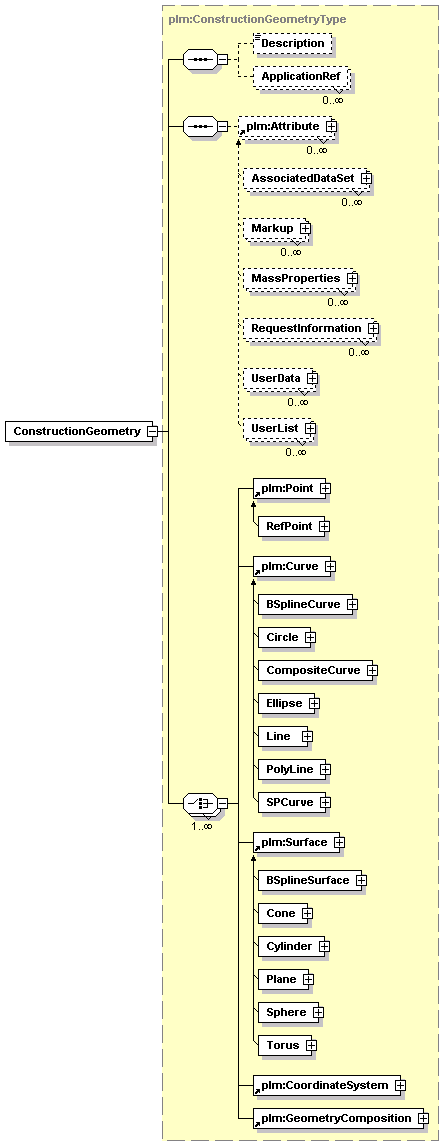 |
||||||||||||||||||||||||
| namespace | http://www.plmxml.org/Schemas/PLMXMLSchema | ||||||||||||||||||||||||
| type | plm:ConstructionGeometryType | ||||||||||||||||||||||||
| children | Description ApplicationRef plm:Attribute plm:Point plm:Curve plm:Surface plm:CoordinateSystem plm:GeometryComposition | ||||||||||||||||||||||||
| attributes |
|
||||||||||||||||||||||||
| source | <xsd:element name="ConstructionGeometry" type="plm:ConstructionGeometryType"/> |
| diagram | 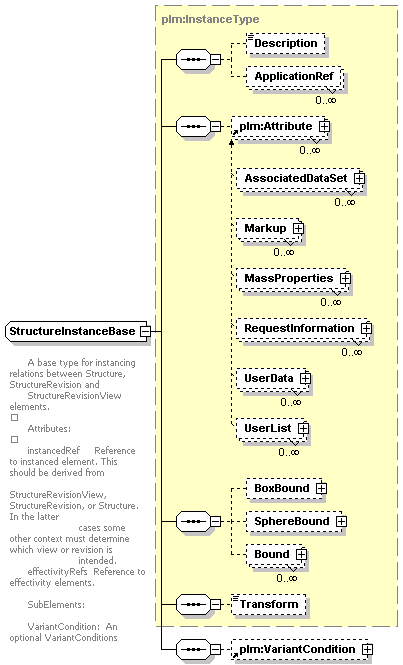 |
||||
| namespace | http://www.plmxml.org/Schemas/PLMXMLSchema | ||||
| type | extension of plm:InstanceType | ||||
| children | Description ApplicationRef plm:Attribute BoxBound SphereBound Bound Transform plm:VariantCondition | ||||
| used by |
|
||||
| attributes | |||||
| annotation |
|
||||
| source | <xsd:complexType name="StructureInstanceBase"> <xsd:annotation> <xsd:documentation> A base type for instancing relations between Structure, StructureRevision and StructureRevisionView elements. Attributes: instancedRef Reference to instanced element. This should be derived from StructureRevisionView, StructureRevision, or Structure. In the latter cases some other context must determine which view or revision is intended. effectivityRefs Reference to effectivity elements. SubElements: VariantCondition: An optional VariantConditions </xsd:documentation> </xsd:annotation> <xsd:complexContent> <xsd:extension base="plm:InstanceType"> <xsd:sequence> <xsd:element ref="plm:VariantCondition" minOccurs="0"/> </xsd:sequence> <xsd:attribute name="instancedRef" type="plm:anyURIType" use="optional"/> <xsd:attribute name="effectivityRefs" type="plm:uriReferenceListType" use="optional"/> </xsd:extension> </xsd:complexContent> </xsd:complexType> |
| diagram | 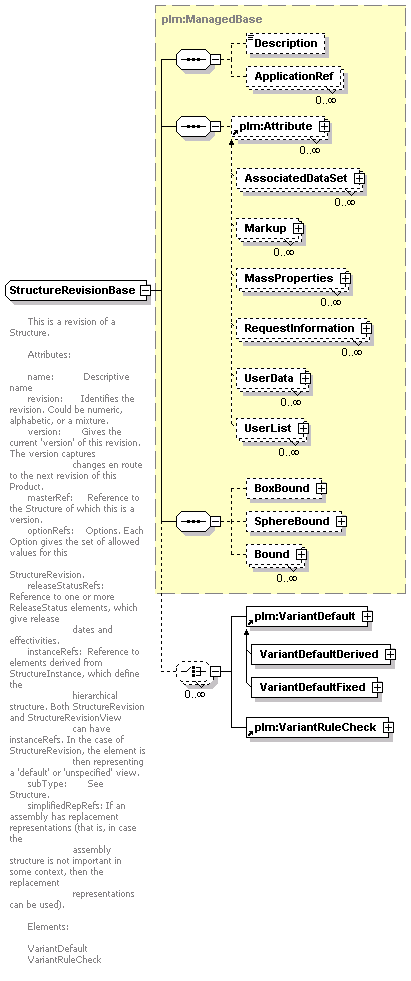 |
||||
| namespace | http://www.plmxml.org/Schemas/PLMXMLSchema | ||||
| type | extension of plm:ManagedBase | ||||
| children | Description ApplicationRef plm:Attribute BoxBound SphereBound Bound plm:VariantDefault plm:VariantRuleCheck | ||||
| used by |
|
||||
| attributes | |||||
| annotation |
|
||||
| source | <xsd:complexType name="StructureRevisionBase" abstract="true"> <xsd:annotation> <xsd:documentation> This is a revision of a Structure. Attributes: name: Descriptive name revision: Identifies the revision. Could be numeric, alphabetic, or a mixture. version: Gives the current 'version' of this revision. The version captures changes en route to the next revision of this Product. masterRef: Reference to the Structure of which this is a version. optionRefs: Options. Each Option gives the set of allowed values for this StructureRevision. releaseStatusRefs: Reference to one or more ReleaseStatus elements, which give release dates and effectivities. instanceRefs: Reference to elements derived from StructureInstance, which define the hierarchical structure. Both StructureRevision and StructureRevisionView can have instanceRefs. In the case of StructureRevision, the element is then representing a 'default' or 'unspecified' view. subType: See Structure. simplifiedRepRefs: If an assembly has replacement representations (that is, in case the assembly structure is not important in some context, then the replacement representations can be used). Elements: VariantDefault VariantRuleCheck </xsd:documentation> </xsd:annotation> <xsd:complexContent> <xsd:extension base="plm:ManagedBase"> <xsd:choice minOccurs="0" maxOccurs="unbounded"> <xsd:element ref="plm:VariantDefault"/> <xsd:element ref="plm:VariantRuleCheck"/> </xsd:choice> <xsd:attribute name="name" type="xsd:string" use="optional"/> <xsd:attribute name="revision" type="xsd:string" use="required"/> <xsd:attribute name="version" type="xsd:nonNegativeInteger" use="optional"/> <xsd:attribute name="masterRef" type="plm:anyURIType" use="required"/> <xsd:attribute name="optionRefs" type="plm:uriReferenceListType" use="optional"/> <xsd:attribute name="releaseStatusRefs" type="plm:uriReferenceListType" use="optional"/> <xsd:attribute name="instanceRefs" type="plm:uriReferenceListType" use="optional"/> <xsd:attribute name="subType" type="xsd:string" use="optional"/> <xsd:attribute name="simplifiedRepRefs" type="plm:uriReferenceListType" use="optional"/> </xsd:extension> </xsd:complexContent> </xsd:complexType> |
| diagram | 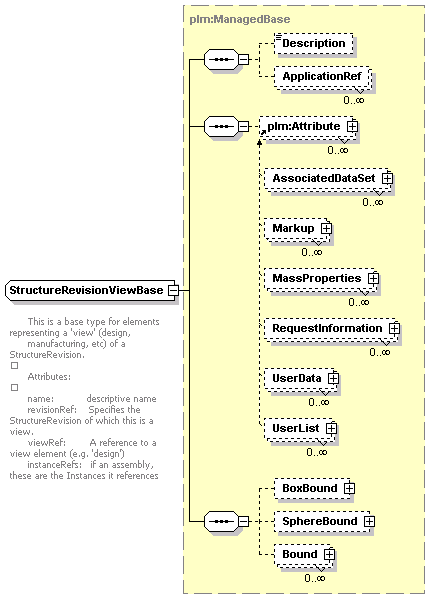 |
||||
| namespace | http://www.plmxml.org/Schemas/PLMXMLSchema | ||||
| type | extension of plm:ManagedBase | ||||
| children | Description ApplicationRef plm:Attribute BoxBound SphereBound Bound | ||||
| used by |
|
||||
| attributes | |||||
| annotation |
|
||||
| source | <xsd:complexType name="StructureRevisionViewBase"> <xsd:annotation> <xsd:documentation> This is a base type for elements representing a 'view' (design, manufacturing, etc) of a StructureRevision. Attributes: name: descriptive name revisionRef: Specifies the StructureRevision of which this is a view. viewRef: A reference to a view element (e.g. 'design') instanceRefs: if an assembly, these are the Instances it references </xsd:documentation> </xsd:annotation> <xsd:complexContent> <xsd:extension base="plm:ManagedBase"> <xsd:attribute name="name" type="xsd:string" use="optional"/> <xsd:attribute name="revisionRef" type="plm:anyURIType" use="optional"/> <xsd:attribute name="viewRef" type="plm:anyURIType" use="optional"/> <xsd:attribute name="instanceRefs" type="xsd:IDREFS" use="optional"/> </xsd:extension> </xsd:complexContent> </xsd:complexType> |
| diagram | 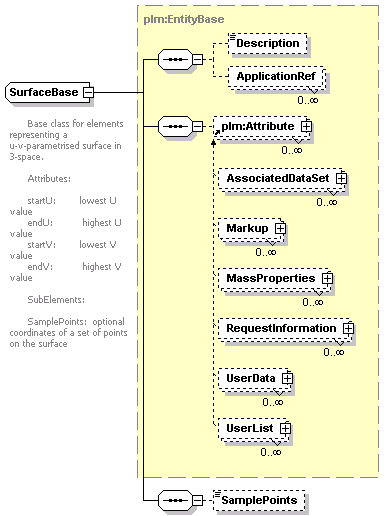 |
||||
| namespace | http://www.plmxml.org/Schemas/PLMXMLSchema | ||||
| type | extension of plm:EntityBase | ||||
| children | Description ApplicationRef plm:Attribute SamplePoints | ||||
| used by |
|
||||
| attributes | |||||
| annotation |
|
||||
| source | <xsd:complexType name="SurfaceBase" abstract="true"> <xsd:annotation> <xsd:documentation> Base class for elements representing a u-v-parametrised surface in 3-space. Attributes: startU: lowest U value endU: highest U value startV: lowest V value endV: highest V value SubElements: SamplePoints: optional coordinates of a set of points on the surface </xsd:documentation> </xsd:annotation> <xsd:complexContent> <xsd:extension base="plm:EntityBase"> <xsd:sequence> <xsd:element name="SamplePoints" type="plm:SamplePointsType" minOccurs="0"/> </xsd:sequence> <xsd:attribute name="startU" type="xsd:double" use="optional"/> <xsd:attribute name="endU" type="xsd:double" use="optional"/> <xsd:attribute name="startV" type="xsd:double" use="optional"/> <xsd:attribute name="endV" type="xsd:double" use="optional"/> </xsd:extension> </xsd:complexContent> </xsd:complexType> |
| diagram | |||||||||||||
| namespace | http://www.plmxml.org/Schemas/PLMXMLSchema | ||||||||||||
| type | plm:SamplePointsType | ||||||||||||
| attributes |
|
||||||||||||
| source | <xsd:element name="SamplePoints" type="plm:SamplePointsType" minOccurs="0"/> |
| diagram | 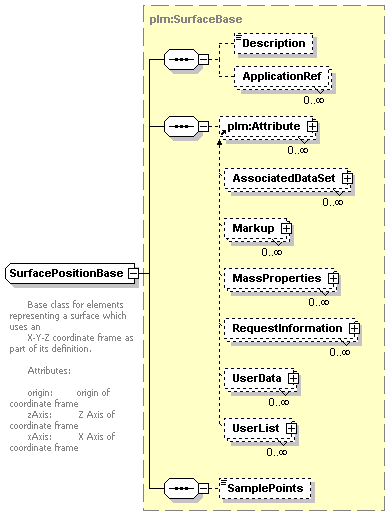 |
||
| namespace | http://www.plmxml.org/Schemas/PLMXMLSchema | ||
| type | extension of plm:SurfaceBase | ||
| children | Description ApplicationRef plm:Attribute SamplePoints | ||
| used by |
|
||
| attributes | |||
| annotation |
|
||
| source | <xsd:complexType name="SurfacePositionBase" abstract="true"> <xsd:annotation> <xsd:documentation> Base class for elements representing a surface which uses an X-Y-Z coordinate frame as part of its definition. Attributes: origin: origin of coordinate frame zAxis: Z Axis of coordinate frame xAxis: X Axis of coordinate frame </xsd:documentation> </xsd:annotation> <xsd:complexContent> <xsd:extension base="plm:SurfaceBase"> <xsd:attribute name="origin" type="plm:VectorType" default="0 0 0"/> <xsd:attribute name="zAxis" type="plm:DirectionType" default="0 0 1"/> <xsd:attribute name="xAxis" type="plm:DirectionType" default="1 0 0"/> </xsd:extension> </xsd:complexContent> </xsd:complexType> |
| diagram |  |
||||||||||||||||||||||||||||||
| namespace | http://www.plmxml.org/Schemas/PLMXMLSchema | ||||||||||||||||||||||||||||||
| type | extension of xsd:hexBinary | ||||||||||||||||||||||||||||||
| used by |
|
||||||||||||||||||||||||||||||
| attributes |
|
||||||||||||||||||||||||||||||
| annotation |
|
||||||||||||||||||||||||||||||
| source | <xsd:complexType name="Texture1DDataType"> <xsd:annotation> <xsd:documentation> Basic 1D texture data definition </xsd:documentation> </xsd:annotation> <xsd:simpleContent> <xsd:extension base="xsd:hexBinary"> <xsd:attribute name="level" type="xsd:nonNegativeInteger" use="required"/> <xsd:attribute name="width" type="xsd:positiveInteger" use="required"/> <xsd:attribute name="border" type="xsd:nonNegativeInteger" default="0"/> <xsd:attribute name="location" type="plm:anyURIType" use="optional"/> </xsd:extension> </xsd:simpleContent> </xsd:complexType> |
| diagram |  |
||||||||||||||||||
| namespace | http://www.plmxml.org/Schemas/PLMXMLSchema | ||||||||||||||||||
| children | Data | ||||||||||||||||||
| used by |
|
||||||||||||||||||
| attributes |
|
||||||||||||||||||
| source | <xsd:complexType name="Texture1DType"> <xsd:choice maxOccurs="unbounded"> <xsd:element name="Data" type="plm:Texture1DDataType"/> </xsd:choice> <xsd:attribute name="format" type="plm:TextureDataFormatType" use="required"/> <xsd:attribute name="levels" type="xsd:positiveInteger" default="1"/> </xsd:complexType> |
| diagram | |||||||||||||||||||||||||||||||
| namespace | http://www.plmxml.org/Schemas/PLMXMLSchema | ||||||||||||||||||||||||||||||
| type | plm:Texture1DDataType | ||||||||||||||||||||||||||||||
| attributes |
|
||||||||||||||||||||||||||||||
| source | <xsd:element name="Data" type="plm:Texture1DDataType"/> |
| diagram |  |
||
| namespace | http://www.plmxml.org/Schemas/PLMXMLSchema | ||
| type | extension of xsd:hexBinary | ||
| used by |
|
||
| attributes | |||
| annotation |
|
||
| source | <xsd:complexType name="Texture2DDataType"> <xsd:annotation> <xsd:documentation> Basic 2D texture data definition </xsd:documentation> </xsd:annotation> <xsd:simpleContent> <xsd:extension base="xsd:hexBinary"> <xsd:attribute name="level" type="xsd:nonNegativeInteger" use="required"/> <xsd:attribute name="width" type="xsd:positiveInteger" use="required"/> <xsd:attribute name="height" type="xsd:positiveInteger" use="required"/> <xsd:attribute name="border" type="xsd:nonNegativeInteger" default="0"/> <xsd:attribute name="location" type="plm:anyURIType" use="optional"/> </xsd:extension> </xsd:simpleContent> </xsd:complexType> |
| diagram |  |
||||||||||||||||||
| namespace | http://www.plmxml.org/Schemas/PLMXMLSchema | ||||||||||||||||||
| children | Data | ||||||||||||||||||
| used by |
|
||||||||||||||||||
| attributes |
|
||||||||||||||||||
| source | <xsd:complexType name="Texture2DType"> <xsd:choice maxOccurs="unbounded"> <xsd:element name="Data" type="plm:Texture2DDataType"/> </xsd:choice> <xsd:attribute name="format" type="plm:TextureDataFormatType" use="required"/> <xsd:attribute name="levels" type="xsd:positiveInteger" default="1"/> </xsd:complexType> |
| diagram | |||||||||||||||||||||||||||||||||||||
| namespace | http://www.plmxml.org/Schemas/PLMXMLSchema | ||||||||||||||||||||||||||||||||||||
| type | plm:Texture2DDataType | ||||||||||||||||||||||||||||||||||||
| attributes |
|
||||||||||||||||||||||||||||||||||||
| source | <xsd:element name="Data" type="plm:Texture2DDataType"/> |
| diagram | |||||||||||||||||||||||||||||||
| namespace | http://www.plmxml.org/Schemas/PLMXMLSchema | ||||||||||||||||||||||||||||||
| type | extension of plm:TextureCoordDataType | ||||||||||||||||||||||||||||||
| used by |
|
||||||||||||||||||||||||||||||
| facets |
|
||||||||||||||||||||||||||||||
| attributes |
|
||||||||||||||||||||||||||||||
| source | <xsd:complexType name="TextureCoordType"> <xsd:simpleContent> <xsd:extension base="plm:TextureCoordDataType"> <xsd:attributeGroup ref="plm:idGroup"/> <xsd:attribute name="textureRef" type="xsd:IDREF" use="optional"/> <xsd:attribute name="geometryCoord" type="plm:VectorType" use="optional"/> <xsd:attribute name="geometryParam" type="plm:GeometryParamType" use="optional"/> </xsd:extension> </xsd:simpleContent> </xsd:complexType> |
| diagram | 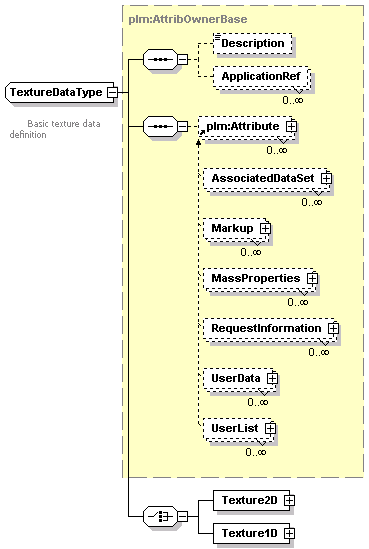 |
||||||||||||||||||||||||
| namespace | http://www.plmxml.org/Schemas/PLMXMLSchema | ||||||||||||||||||||||||
| type | extension of plm:AttribOwnerBase | ||||||||||||||||||||||||
| children | Description ApplicationRef plm:Attribute Texture2D Texture1D | ||||||||||||||||||||||||
| used by |
|
||||||||||||||||||||||||
| attributes |
|
||||||||||||||||||||||||
| annotation |
|
||||||||||||||||||||||||
| source | <xsd:complexType name="TextureDataType"> <xsd:annotation> <xsd:documentation> Basic texture data definition </xsd:documentation> </xsd:annotation> <xsd:complexContent> <xsd:extension base="plm:AttribOwnerBase"> <xsd:choice> <xsd:element name="Texture2D" type="plm:Texture2DType"/> <xsd:element name="Texture1D" type="plm:Texture1DType"/> </xsd:choice> <xsd:attribute name="name" type="xsd:string" use="optional"/> </xsd:extension> </xsd:complexContent> </xsd:complexType> |
| diagram |  |
||||||||||||||||||
| namespace | http://www.plmxml.org/Schemas/PLMXMLSchema | ||||||||||||||||||
| type | plm:Texture2DType | ||||||||||||||||||
| children | Data | ||||||||||||||||||
| attributes |
|
||||||||||||||||||
| source | <xsd:element name="Texture2D" type="plm:Texture2DType"/> |
| diagram |  |
||||||||||||||||||
| namespace | http://www.plmxml.org/Schemas/PLMXMLSchema | ||||||||||||||||||
| type | plm:Texture1DType | ||||||||||||||||||
| children | Data | ||||||||||||||||||
| attributes |
|
||||||||||||||||||
| source | <xsd:element name="Texture1D" type="plm:Texture1DType"/> |
| diagram | 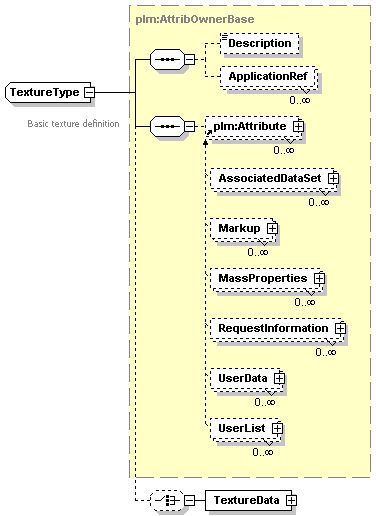 |
||
| namespace | http://www.plmxml.org/Schemas/PLMXMLSchema | ||
| type | extension of plm:AttribOwnerBase | ||
| children | Description ApplicationRef plm:Attribute TextureData | ||
| used by |
|
||
| attributes | |||
| annotation |
|
||
| source | <xsd:complexType name="TextureType"> <xsd:annotation> <xsd:documentation> Basic texture definition </xsd:documentation> </xsd:annotation> <xsd:complexContent> <xsd:extension base="plm:AttribOwnerBase"> <xsd:choice minOccurs="0"> <xsd:element name="TextureData" type="plm:TextureDataType"/> </xsd:choice> <xsd:attribute name="name" type="xsd:string" use="optional"/> <xsd:attribute name="dataRef" type="xsd:IDREF" use="optional"/> <xsd:attribute name="mapping" type="plm:TextureMapType" use="required"/> <xsd:attribute name="subsamplingLow" type="plm:TextureSampleType" default="nearest"/> <xsd:attribute name="subsamplingHigh" type="plm:TextureSampleType" default="nearest"/> <xsd:attribute name="oversampling" type="plm:TextureSampleType" default="nearest"/> <xsd:attribute name="wrapping" type="plm:TextureWrapType" default="clamp"/> <xsd:attribute name="borderColour" type="plm:RGBAType" use="optional"/> </xsd:extension> </xsd:complexContent> </xsd:complexType> |
| diagram | 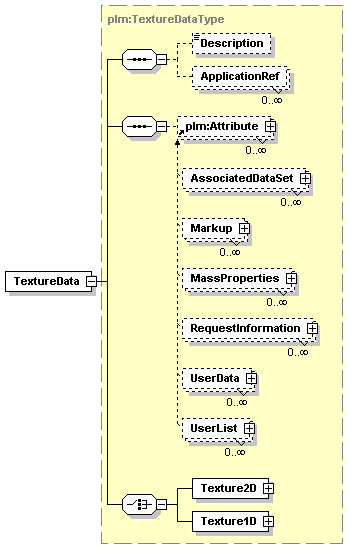 |
||||||||||||||||||||||||
| namespace | http://www.plmxml.org/Schemas/PLMXMLSchema | ||||||||||||||||||||||||
| type | plm:TextureDataType | ||||||||||||||||||||||||
| children | Description ApplicationRef plm:Attribute Texture2D Texture1D | ||||||||||||||||||||||||
| attributes |
|
||||||||||||||||||||||||
| source | <xsd:element name="TextureData" type="plm:TextureDataType"/> |
| diagram | 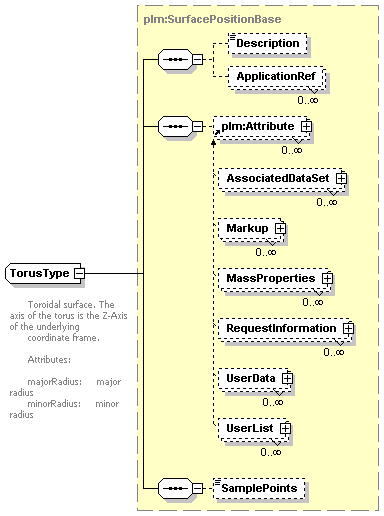 |
||
| namespace | http://www.plmxml.org/Schemas/PLMXMLSchema | ||
| type | extension of plm:SurfacePositionBase | ||
| children | Description ApplicationRef plm:Attribute SamplePoints | ||
| used by |
|
||
| attributes | |||
| annotation |
|
||
| source | <xsd:complexType name="TorusType"> <xsd:annotation> <xsd:documentation> Toroidal surface. The axis of the torus is the Z-Axis of the underlying coordinate frame. Attributes: majorRadius: major radius minorRadius: minor radius </xsd:documentation> </xsd:annotation> <xsd:complexContent> <xsd:extension base="plm:SurfacePositionBase"> <xsd:attribute name="majorRadius" type="xsd:double" use="required"/> <xsd:attribute name="minorRadius" type="xsd:double" use="required"/> </xsd:extension> </xsd:complexContent> </xsd:complexType> |
| diagram | |||||||||||||||||||
| namespace | http://www.plmxml.org/Schemas/PLMXMLSchema | ||||||||||||||||||
| type | extension of plm:MatrixType | ||||||||||||||||||
| used by |
|
||||||||||||||||||
| facets |
|
||||||||||||||||||
| attributes |
|
||||||||||||||||||
| source | <xsd:complexType name="TransformType"> <xsd:simpleContent> <xsd:extension base="plm:MatrixType"> <xsd:attributeGroup ref="plm:idGroup"/> <xsd:attribute name="type" type="plm:TransformationType" default="general"/> </xsd:extension> </xsd:simpleContent> </xsd:complexType> |
| diagram | 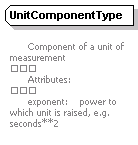 |
||||||||||||
| namespace | http://www.plmxml.org/Schemas/PLMXMLSchema | ||||||||||||
| used by |
|
||||||||||||
| attributes |
|
||||||||||||
| annotation |
|
||||||||||||
| source | <xsd:complexType name="UnitComponentType"> <xsd:annotation> <xsd:documentation> Component of a unit of measurement Attributes: exponent: power to which unit is raised, e.g. seconds**2 </xsd:documentation> </xsd:annotation> <xsd:attribute name="exponent" type="xsd:double" use="required"/> </xsd:complexType> |
| diagram | 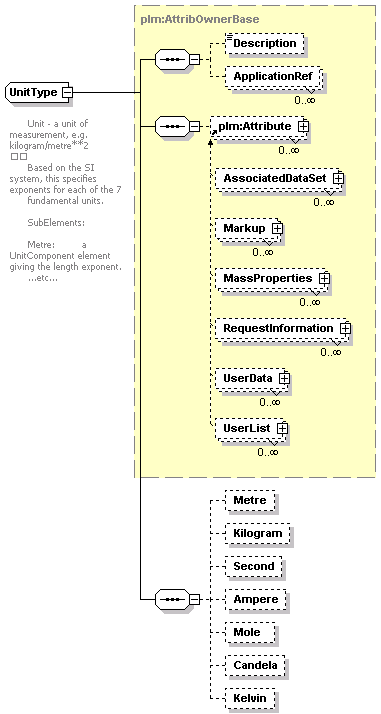 |
||||||||||||||||||
| namespace | http://www.plmxml.org/Schemas/PLMXMLSchema | ||||||||||||||||||
| type | extension of plm:AttribOwnerBase | ||||||||||||||||||
| children | Description ApplicationRef plm:Attribute Metre Kilogram Second Ampere Mole Candela Kelvin | ||||||||||||||||||
| used by |
|
||||||||||||||||||
| attributes |
|
||||||||||||||||||
| annotation |
|
||||||||||||||||||
| source | <xsd:complexType name="UnitType"> <xsd:annotation> <xsd:documentation> Unit - a unit of measurement, e.g. kilogram/metre**2 Based on the SI system, this specifies exponents for each of the 7 fundamental units. SubElements: Metre: a UnitComponent element giving the length exponent. ...etc... </xsd:documentation> </xsd:annotation> <xsd:complexContent> <xsd:extension base="plm:AttribOwnerBase"> <xsd:sequence> <xsd:element name="Metre" type="plm:UnitComponentType" minOccurs="0"/> <xsd:element name="Kilogram" type="plm:UnitComponentType" minOccurs="0"/> <xsd:element name="Second" type="plm:UnitComponentType" minOccurs="0"/> <xsd:element name="Ampere" type="plm:UnitComponentType" minOccurs="0"/> <xsd:element name="Mole" type="plm:UnitComponentType" minOccurs="0"/> <xsd:element name="Candela" type="plm:UnitComponentType" minOccurs="0"/> <xsd:element name="Kelvin" type="plm:UnitComponentType" minOccurs="0"/> </xsd:sequence> </xsd:extension> </xsd:complexContent> </xsd:complexType> |
| diagram | |||||||||||||
| namespace | http://www.plmxml.org/Schemas/PLMXMLSchema | ||||||||||||
| type | plm:UnitComponentType | ||||||||||||
| attributes |
|
||||||||||||
| source | <xsd:element name="Metre" type="plm:UnitComponentType" minOccurs="0"/> |
| diagram | |||||||||||||
| namespace | http://www.plmxml.org/Schemas/PLMXMLSchema | ||||||||||||
| type | plm:UnitComponentType | ||||||||||||
| attributes |
|
||||||||||||
| source | <xsd:element name="Kilogram" type="plm:UnitComponentType" minOccurs="0"/> |
| diagram | |||||||||||||
| namespace | http://www.plmxml.org/Schemas/PLMXMLSchema | ||||||||||||
| type | plm:UnitComponentType | ||||||||||||
| attributes |
|
||||||||||||
| source | <xsd:element name="Second" type="plm:UnitComponentType" minOccurs="0"/> |
| diagram | |||||||||||||
| namespace | http://www.plmxml.org/Schemas/PLMXMLSchema | ||||||||||||
| type | plm:UnitComponentType | ||||||||||||
| attributes |
|
||||||||||||
| source | <xsd:element name="Ampere" type="plm:UnitComponentType" minOccurs="0"/> |
| diagram | |||||||||||||
| namespace | http://www.plmxml.org/Schemas/PLMXMLSchema | ||||||||||||
| type | plm:UnitComponentType | ||||||||||||
| attributes |
|
||||||||||||
| source | <xsd:element name="Mole" type="plm:UnitComponentType" minOccurs="0"/> |
| diagram | |||||||||||||
| namespace | http://www.plmxml.org/Schemas/PLMXMLSchema | ||||||||||||
| type | plm:UnitComponentType | ||||||||||||
| attributes |
|
||||||||||||
| source | <xsd:element name="Candela" type="plm:UnitComponentType" minOccurs="0"/> |
| diagram | |||||||||||||
| namespace | http://www.plmxml.org/Schemas/PLMXMLSchema | ||||||||||||
| type | plm:UnitComponentType | ||||||||||||
| attributes |
|
||||||||||||
| source | <xsd:element name="Kelvin" type="plm:UnitComponentType" minOccurs="0"/> |
| diagram |  |
||||
| namespace | http://www.plmxml.org/Schemas/PLMXMLSchema | ||||
| children | UserList | ||||
| used by |
|
||||
| attributes | |||||
| annotation |
|
||||
| source | <xsd:complexType name="UserDataElementType"> <xsd:annotation> <xsd:appinfo source="PLMXMLSchemaGenerator">sdkname=UserValue</xsd:appinfo> <xsd:documentation> This element defines a single title/value pair in a UserData table. Attributes: title: name of this entry in the table. value: value of the entry. type: datatype of the value - int, ints, real, reals, boolean, booleans, string, reference, enum or list. format: editable: false if this value should not be modified by the receiving application. dataRef: If type is 'enum' or 'list', then a UserList element should be specified either by dataRef, or by being included as a sub-element. In the 'enum' case, the UserList gives the valid values of the enum; in the 'list' case, 'value' is ignored and the UserList IS the value of this entry in the table. minInclusive: Minimum value allowed (inclusive). minExclusive: Minimum value allowed (exclusive). maxInclusive: Maximum value allowed (inclusive). maxExclusive: Maximum value allowed (exclusive). stepValue: Allowed values go from min to max in steps of 'stepValue'. minLength: Minimum list length allowed (only for type="list"). maxLength: Maximum list length allowed (ditto). SubElements: UserList: May contain a single UserList element (see dataRef above). </xsd:documentation> </xsd:annotation> <xsd:sequence> <xsd:element name="UserList" type="plm:UserListDataType" minOccurs="0"/> </xsd:sequence> <xsd:attribute name="title" type="xsd:string" use="required"/> <xsd:attribute name="value" type="xsd:string" use="required"/> <xsd:attribute name="type" type="plm:UserValueDataType" default="string"/> <xsd:attribute name="format" type="xsd:string" use="optional"/> <xsd:attribute name="dataRef" type="plm:anyURIType" use="optional"/> <xsd:attribute name="editable" type="xsd:boolean" default="false"/> <xsd:attribute name="minInclusive" type="xsd:double" use="optional"/> <xsd:attribute name="minExclusive" type="xsd:double" use="optional"/> <xsd:attribute name="maxInclusive" type="xsd:double" use="optional"/> <xsd:attribute name="maxExclusive" type="xsd:double" use="optional"/> <xsd:attribute name="stepValue" type="xsd:double" use="optional"/> <xsd:attribute name="minLength" type="xsd:nonNegativeInteger" use="optional"/> <xsd:attribute name="maxLength" type="xsd:nonNegativeInteger" use="optional"/> </xsd:complexType> |
| diagram | 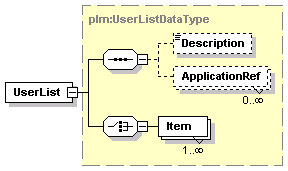 |
||||||||||||||||||||||||
| namespace | http://www.plmxml.org/Schemas/PLMXMLSchema | ||||||||||||||||||||||||
| type | plm:UserListDataType | ||||||||||||||||||||||||
| children | Description ApplicationRef Item | ||||||||||||||||||||||||
| attributes |
|
||||||||||||||||||||||||
| source | <xsd:element name="UserList" type="plm:UserListDataType" minOccurs="0"/> |
| diagram | 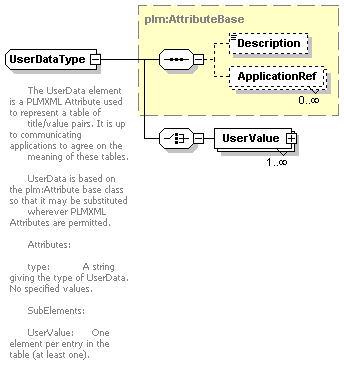 |
||||||||||||||||||
| namespace | http://www.plmxml.org/Schemas/PLMXMLSchema | ||||||||||||||||||
| type | extension of plm:AttributeBase | ||||||||||||||||||
| children | Description ApplicationRef UserValue | ||||||||||||||||||
| used by |
|
||||||||||||||||||
| attributes |
|
||||||||||||||||||
| annotation |
|
||||||||||||||||||
| source | <xsd:complexType name="UserDataType"> <xsd:annotation> <xsd:documentation> The UserData element is a PLMXML Attribute used to represent a table of title/value pairs. It is up to communicating applications to agree on the meaning of these tables. UserData is based on the plm:Attribute base class so that it may be substituted wherever PLMXML Attributes are permitted. Attributes: type: A string giving the type of UserData. No specified values. SubElements: UserValue: One element per entry in the table (at least one). </xsd:documentation> </xsd:annotation> <xsd:complexContent> <xsd:extension base="plm:AttributeBase"> <xsd:choice> <xsd:element name="UserValue" type="plm:UserDataElementType" maxOccurs="unbounded"/> </xsd:choice> <xsd:attribute name="type" type="xsd:string" use="optional"/> </xsd:extension> </xsd:complexContent> </xsd:complexType> |
| diagram |  |
||||||||||||||||||||||||||||||||||||||||||||||||||||||||||||||||||||||||||||||||||||
| namespace | http://www.plmxml.org/Schemas/PLMXMLSchema | ||||||||||||||||||||||||||||||||||||||||||||||||||||||||||||||||||||||||||||||||||||
| type | plm:UserDataElementType | ||||||||||||||||||||||||||||||||||||||||||||||||||||||||||||||||||||||||||||||||||||
| children | UserList | ||||||||||||||||||||||||||||||||||||||||||||||||||||||||||||||||||||||||||||||||||||
| attributes |
|
||||||||||||||||||||||||||||||||||||||||||||||||||||||||||||||||||||||||||||||||||||
| source | <xsd:element name="UserValue" type="plm:UserDataElementType" maxOccurs="unbounded"/> |
| diagram | 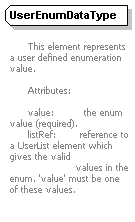 |
||||||||||||||||||
| namespace | http://www.plmxml.org/Schemas/PLMXMLSchema | ||||||||||||||||||
| used by |
|
||||||||||||||||||
| attributes |
|
||||||||||||||||||
| annotation |
|
||||||||||||||||||
| source | <xsd:complexType name="UserEnumDataType"> <xsd:annotation> <xsd:appinfo source="PLMXMLSchemaGenerator">sdkname=UserEnum</xsd:appinfo> <xsd:documentation> This element represents a user defined enumeration value. Attributes: value: the enum value (required). listRef: reference to a UserList element which gives the valid values in the enum. 'value' must be one of these values. </xsd:documentation> </xsd:annotation> <xsd:attribute name="value" type="xsd:string" use="required"/> <xsd:attribute name="listRef" type="plm:anyURIType" use="optional"/> </xsd:complexType> |
| diagram | 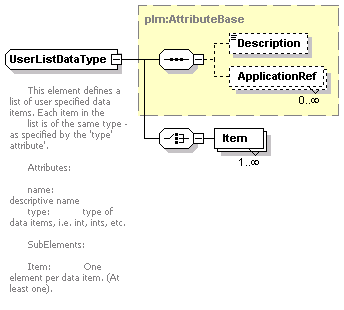 |
||||||||||||||||||||||||
| namespace | http://www.plmxml.org/Schemas/PLMXMLSchema | ||||||||||||||||||||||||
| type | extension of plm:AttributeBase | ||||||||||||||||||||||||
| children | Description ApplicationRef Item | ||||||||||||||||||||||||
| used by |
|
||||||||||||||||||||||||
| attributes |
|
||||||||||||||||||||||||
| annotation |
|
||||||||||||||||||||||||
| source | <xsd:complexType name="UserListDataType"> <xsd:annotation> <xsd:documentation> This element defines a list of user specified data items. Each item in the list is of the same type - as specified by the 'type' attribute'. Attributes: name: descriptive name type: type of data items, i.e. int, ints, etc. SubElements: Item: One element per data item. (At least one). </xsd:documentation> </xsd:annotation> <xsd:complexContent> <xsd:extension base="plm:AttributeBase"> <xsd:choice> <xsd:element name="Item" type="plm:UserListElementType" maxOccurs="unbounded"/> </xsd:choice> <xsd:attribute name="name" type="xsd:string" use="optional"/> <xsd:attribute name="type" type="plm:UserValueDataType" default="string"/> </xsd:extension> </xsd:complexContent> </xsd:complexType> |
| diagram | |||||||||||||||||||
| namespace | http://www.plmxml.org/Schemas/PLMXMLSchema | ||||||||||||||||||
| type | plm:UserListElementType | ||||||||||||||||||
| attributes |
|
||||||||||||||||||
| source | <xsd:element name="Item" type="plm:UserListElementType" maxOccurs="unbounded"/> |
| diagram | 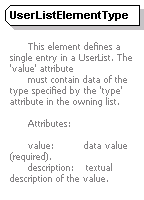 |
||||||||||||||||||
| namespace | http://www.plmxml.org/Schemas/PLMXMLSchema | ||||||||||||||||||
| used by |
|
||||||||||||||||||
| attributes |
|
||||||||||||||||||
| annotation |
|
||||||||||||||||||
| source | <xsd:complexType name="UserListElementType"> <xsd:annotation> <xsd:documentation> This element defines a single entry in a UserList. The 'value' attribute must contain data of the type specified by the 'type' attribute in the owning list. Attributes: value: data value (required). description: textual description of the value. </xsd:documentation> </xsd:annotation> <xsd:attribute name="value" type="xsd:string" use="required"/> <xsd:attribute name="description" type="xsd:string" use="optional"/> </xsd:complexType> |
| diagram | 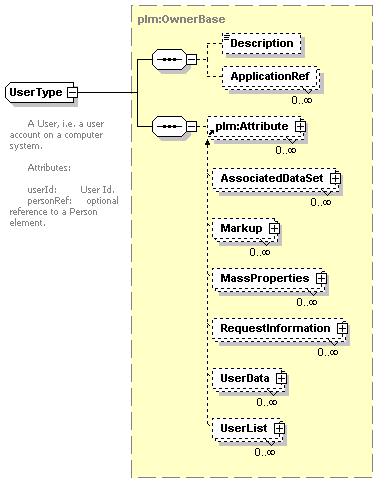 |
||||||||||||||||||||||||||||||
| namespace | http://www.plmxml.org/Schemas/PLMXMLSchema | ||||||||||||||||||||||||||||||
| type | extension of plm:OwnerBase | ||||||||||||||||||||||||||||||
| children | Description ApplicationRef plm:Attribute | ||||||||||||||||||||||||||||||
| used by |
|
||||||||||||||||||||||||||||||
| attributes |
|
||||||||||||||||||||||||||||||
| annotation |
|
||||||||||||||||||||||||||||||
| source | <xsd:complexType name="UserType"> <xsd:annotation> <xsd:documentation> A User, i.e. a user account on a computer system. Attributes: userId: User Id. personRef: optional reference to a Person element. </xsd:documentation> </xsd:annotation> <xsd:complexContent> <xsd:extension base="plm:OwnerBase"> <xsd:attribute name="userId" type="xsd:string" use="required"/> <xsd:attribute name="personRef" type="plm:anyURIType" use="optional"/> </xsd:extension> </xsd:complexContent> </xsd:complexType> |
| diagram | 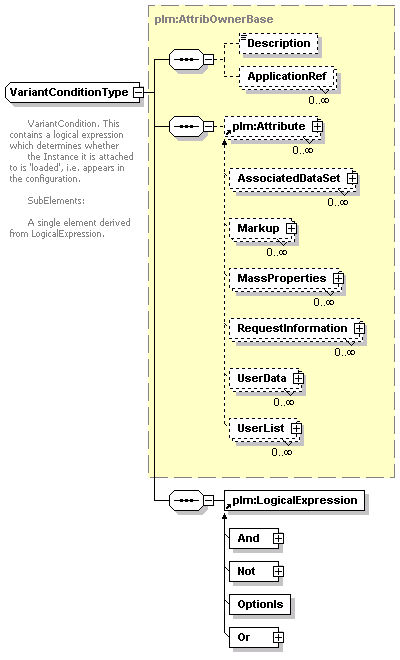 |
||||||||||||||||||
| namespace | http://www.plmxml.org/Schemas/PLMXMLSchema | ||||||||||||||||||
| type | extension of plm:AttribOwnerBase | ||||||||||||||||||
| children | Description ApplicationRef plm:Attribute plm:LogicalExpression | ||||||||||||||||||
| used by |
|
||||||||||||||||||
| attributes |
|
||||||||||||||||||
| annotation |
|
||||||||||||||||||
| source | <xsd:complexType name="VariantConditionType"> <xsd:annotation> <xsd:documentation> VariantCondition. This contains a logical expression which determines whether the Instance it is attached to is 'loaded', i.e. appears in the configuration. SubElements: A single element derived from LogicalExpression. </xsd:documentation> </xsd:annotation> <xsd:complexContent> <xsd:extension base="plm:AttribOwnerBase"> <xsd:sequence> <xsd:element ref="plm:LogicalExpression"/> </xsd:sequence> </xsd:extension> </xsd:complexContent> </xsd:complexType> |
| diagram | 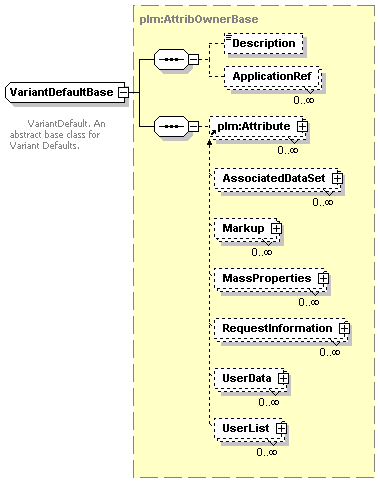 |
||||||||||||||||||
| namespace | http://www.plmxml.org/Schemas/PLMXMLSchema | ||||||||||||||||||
| type | extension of plm:AttribOwnerBase | ||||||||||||||||||
| children | Description ApplicationRef plm:Attribute | ||||||||||||||||||
| used by |
|
||||||||||||||||||
| attributes |
|
||||||||||||||||||
| annotation |
|
||||||||||||||||||
| source | <xsd:complexType name="VariantDefaultBase" abstract="true"> <xsd:annotation> <xsd:documentation> VariantDefault. An abstract base class for Variant Defaults. </xsd:documentation> </xsd:annotation> <xsd:complexContent> <xsd:extension base="plm:AttribOwnerBase"/> </xsd:complexContent> </xsd:complexType> |
| diagram | 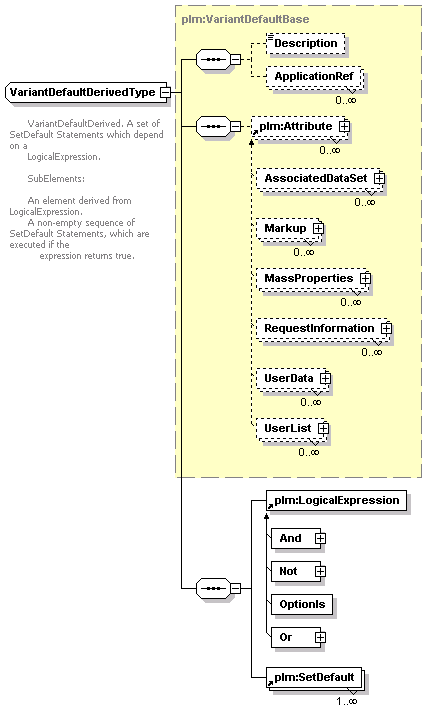 |
||||||||||||||||||
| namespace | http://www.plmxml.org/Schemas/PLMXMLSchema | ||||||||||||||||||
| type | extension of plm:VariantDefaultBase | ||||||||||||||||||
| children | Description ApplicationRef plm:Attribute plm:LogicalExpression plm:SetDefault | ||||||||||||||||||
| used by |
|
||||||||||||||||||
| attributes |
|
||||||||||||||||||
| annotation |
|
||||||||||||||||||
| source | <xsd:complexType name="VariantDefaultDerivedType"> <xsd:annotation> <xsd:documentation> VariantDefaultDerived. A set of SetDefault Statements which depend on a LogicalExpression. SubElements: An element derived from LogicalExpression. A non-empty sequence of SetDefault Statements, which are executed if the expression returns true. </xsd:documentation> </xsd:annotation> <xsd:complexContent> <xsd:extension base="plm:VariantDefaultBase"> <xsd:sequence> <xsd:element ref="plm:LogicalExpression"/> <xsd:element ref="plm:SetDefault" maxOccurs="unbounded"/> </xsd:sequence> </xsd:extension> </xsd:complexContent> </xsd:complexType> |
| diagram | 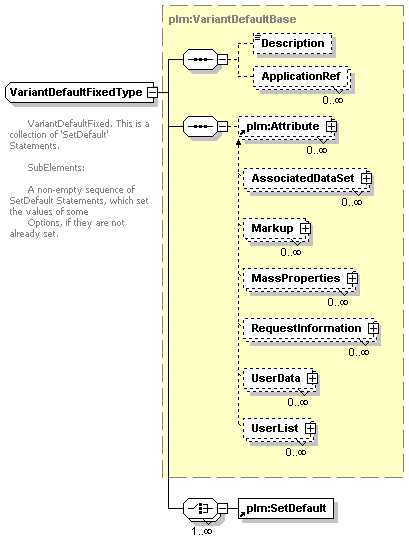 |
||||||||||||||||||
| namespace | http://www.plmxml.org/Schemas/PLMXMLSchema | ||||||||||||||||||
| type | extension of plm:VariantDefaultBase | ||||||||||||||||||
| children | Description ApplicationRef plm:Attribute plm:SetDefault | ||||||||||||||||||
| used by |
|
||||||||||||||||||
| attributes |
|
||||||||||||||||||
| annotation |
|
||||||||||||||||||
| source | <xsd:complexType name="VariantDefaultFixedType"> <xsd:annotation> <xsd:documentation> VariantDefaultFixed. This is a collection of 'SetDefault' Statements. SubElements: A non-empty sequence of SetDefault Statements, which set the values of some Options, if they are not already set. </xsd:documentation> </xsd:annotation> <xsd:complexContent> <xsd:extension base="plm:VariantDefaultBase"> <xsd:choice maxOccurs="unbounded"> <xsd:element ref="plm:SetDefault"/> </xsd:choice> </xsd:extension> </xsd:complexContent> </xsd:complexType> |
| diagram | 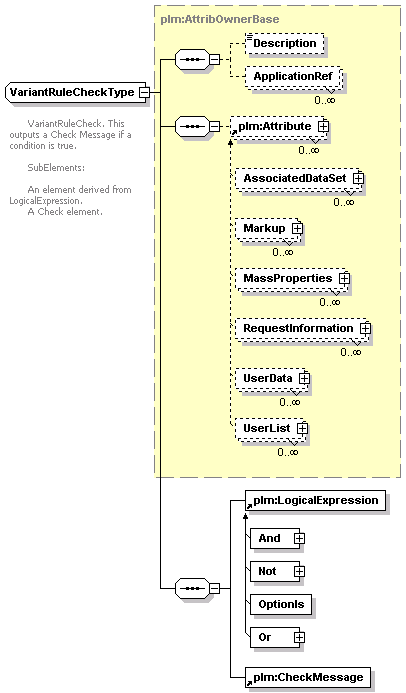 |
||||||||||||||||||
| namespace | http://www.plmxml.org/Schemas/PLMXMLSchema | ||||||||||||||||||
| type | extension of plm:AttribOwnerBase | ||||||||||||||||||
| children | Description ApplicationRef plm:Attribute plm:LogicalExpression plm:CheckMessage | ||||||||||||||||||
| used by |
|
||||||||||||||||||
| attributes |
|
||||||||||||||||||
| annotation |
|
||||||||||||||||||
| source | <xsd:complexType name="VariantRuleCheckType"> <xsd:annotation> <xsd:documentation> VariantRuleCheck. This outputs a Check Message if a condition is true. SubElements: An element derived from LogicalExpression. A Check element. </xsd:documentation> </xsd:annotation> <xsd:complexContent> <xsd:extension base="plm:AttribOwnerBase"> <xsd:sequence> <xsd:element ref="plm:LogicalExpression"/> <xsd:element ref="plm:CheckMessage"/> </xsd:sequence> </xsd:extension> </xsd:complexContent> </xsd:complexType> |
| diagram | 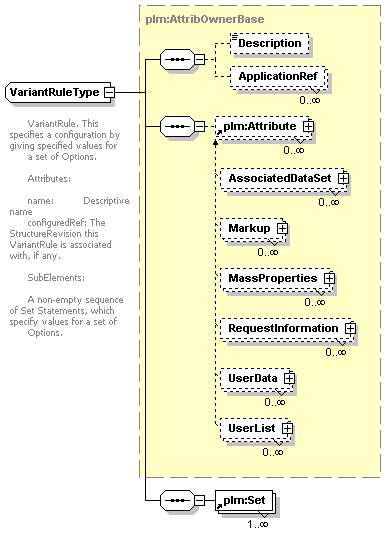 |
||||||||||||||||||||||||||||||
| namespace | http://www.plmxml.org/Schemas/PLMXMLSchema | ||||||||||||||||||||||||||||||
| type | extension of plm:AttribOwnerBase | ||||||||||||||||||||||||||||||
| children | Description ApplicationRef plm:Attribute plm:Set | ||||||||||||||||||||||||||||||
| used by |
|
||||||||||||||||||||||||||||||
| attributes |
|
||||||||||||||||||||||||||||||
| annotation |
|
||||||||||||||||||||||||||||||
| source | <xsd:complexType name="VariantRuleType"> <xsd:annotation> <xsd:documentation> VariantRule. This specifies a configuration by giving specified values for a set of Options. Attributes: name: Descriptive name configuredRef: The StructureRevision this VariantRule is associated with, if any. SubElements: A non-empty sequence of Set Statements, which specify values for a set of Options. </xsd:documentation> </xsd:annotation> <xsd:complexContent> <xsd:extension base="plm:AttribOwnerBase"> <xsd:sequence> <xsd:element ref="plm:Set" maxOccurs="unbounded"/> </xsd:sequence> <xsd:attribute name="name" type="xsd:string" use="optional"/> <xsd:attribute name="configuredRef" type="plm:anyURIType" use="optional"/> </xsd:extension> </xsd:complexContent> </xsd:complexType> |
| diagram | 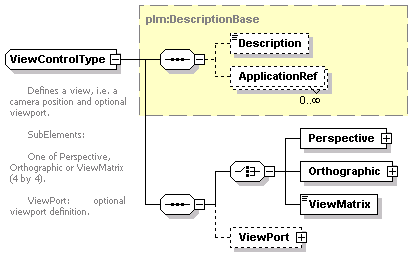 |
||||||||||||
| namespace | http://www.plmxml.org/Schemas/PLMXMLSchema | ||||||||||||
| type | extension of plm:DescriptionBase | ||||||||||||
| children | Description ApplicationRef Perspective Orthographic ViewMatrix ViewPort | ||||||||||||
| used by |
|
||||||||||||
| attributes |
|
||||||||||||
| annotation |
|
||||||||||||
| source | <xsd:complexType name="ViewControlType"> <xsd:annotation> <xsd:documentation> Defines a view, i.e. a camera position and optional viewport. SubElements: One of Perspective, Orthographic or ViewMatrix (4 by 4). ViewPort: optional viewport definition. </xsd:documentation> </xsd:annotation> <xsd:complexContent> <xsd:extension base="plm:DescriptionBase"> <xsd:sequence> <xsd:choice> <xsd:element name="Perspective" type="plm:PerspectiveType"/> <xsd:element name="Orthographic" type="plm:OrthographicType"/> <xsd:element name="ViewMatrix" type="plm:MatrixType"/> </xsd:choice> <xsd:element name="ViewPort" type="plm:ViewPortType" minOccurs="0"/> </xsd:sequence> </xsd:extension> </xsd:complexContent> </xsd:complexType> |
| diagram | 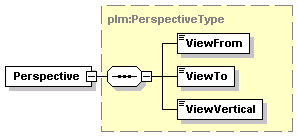 |
| namespace | http://www.plmxml.org/Schemas/PLMXMLSchema |
| type | plm:PerspectiveType |
| children | ViewFrom ViewTo ViewVertical |
| source | <xsd:element name="Perspective" type="plm:PerspectiveType"/> |
| diagram | 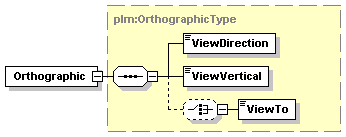 |
| namespace | http://www.plmxml.org/Schemas/PLMXMLSchema |
| type | plm:OrthographicType |
| children | ViewDirection ViewVertical ViewTo |
| source | <xsd:element name="Orthographic" type="plm:OrthographicType"/> |
| diagram | |||||
| namespace | http://www.plmxml.org/Schemas/PLMXMLSchema | ||||
| type | plm:MatrixType | ||||
| facets |
|
||||
| source | <xsd:element name="ViewMatrix" type="plm:MatrixType"/> |
| diagram | 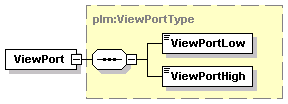 |
| namespace | http://www.plmxml.org/Schemas/PLMXMLSchema |
| type | plm:ViewPortType |
| children | ViewPortLow ViewPortHigh |
| source | <xsd:element name="ViewPort" type="plm:ViewPortType" minOccurs="0"/> |
| diagram |  |
||
| namespace | http://www.plmxml.org/Schemas/PLMXMLSchema | ||
| children | ViewPortLow ViewPortHigh | ||
| used by |
|
||
| source | <xsd:complexType name="ViewPortType"> <xsd:sequence> <xsd:element name="ViewPortLow" type="plm:ViewPortCornerType"/> <xsd:element name="ViewPortHigh" type="plm:ViewPortCornerType"/> </xsd:sequence> </xsd:complexType> |
| diagram | |||
| namespace | http://www.plmxml.org/Schemas/PLMXMLSchema | ||
| type | plm:ViewPortCornerType | ||
| facets |
|
||
| source | <xsd:element name="ViewPortLow" type="plm:ViewPortCornerType"/> |
| diagram | |||
| namespace | http://www.plmxml.org/Schemas/PLMXMLSchema | ||
| type | plm:ViewPortCornerType | ||
| facets |
|
||
| source | <xsd:element name="ViewPortHigh" type="plm:ViewPortCornerType"/> |
| diagram | 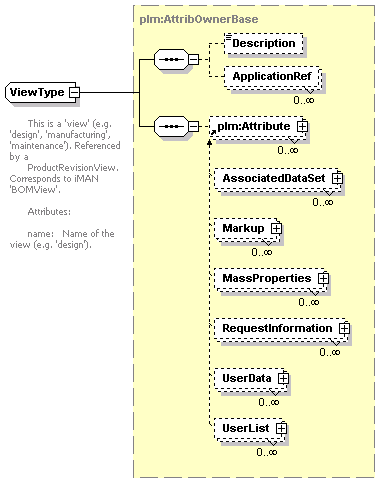 |
||||||||||||||||||||||||
| namespace | http://www.plmxml.org/Schemas/PLMXMLSchema | ||||||||||||||||||||||||
| type | extension of plm:AttribOwnerBase | ||||||||||||||||||||||||
| children | Description ApplicationRef plm:Attribute | ||||||||||||||||||||||||
| used by |
|
||||||||||||||||||||||||
| attributes |
|
||||||||||||||||||||||||
| annotation |
|
||||||||||||||||||||||||
| source | <xsd:complexType name="ViewType"> <xsd:annotation> <xsd:documentation> This is a 'view' (e.g. 'design', 'manufacturing', 'maintenance'). Referenced by a ProductRevisionView. Corresponds to iMAN 'BOMView'. Attributes: name: Name of the view (e.g. 'design'). </xsd:documentation> </xsd:annotation> <xsd:complexContent> <xsd:extension base="plm:AttribOwnerBase"> <xsd:attribute name="name" type="xsd:string" use="optional"/> </xsd:extension> </xsd:complexContent> </xsd:complexType> |
| diagram | |||||||||||||
| namespace | http://www.plmxml.org/Schemas/PLMXMLSchema | ||||||||||||
| type | restriction of plm:MassPropertyRealType | ||||||||||||
| used by |
|
||||||||||||
| attributes |
|
||||||||||||
| source | <xsd:complexType name="VolumeType"> <xsd:simpleContent> <xsd:restriction base="plm:MassPropertyRealType"/> </xsd:simpleContent> </xsd:complexType> |
| diagram | 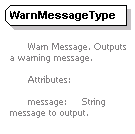 |
||||||||||||
| namespace | http://www.plmxml.org/Schemas/PLMXMLSchema | ||||||||||||
| type | extension of plm:MessageBase | ||||||||||||
| used by |
|
||||||||||||
| attributes |
|
||||||||||||
| annotation |
|
||||||||||||
| source | <xsd:complexType name="WarnMessageType"> <xsd:annotation> <xsd:documentation> Warn Message. Outputs a warning message. Attributes: message: String message to output. </xsd:documentation> </xsd:annotation> <xsd:complexContent> <xsd:extension base="plm:MessageBase"> <xsd:attribute name="message" type="xsd:string" use="required"/> </xsd:extension> </xsd:complexContent> </xsd:complexType> |
| diagram | 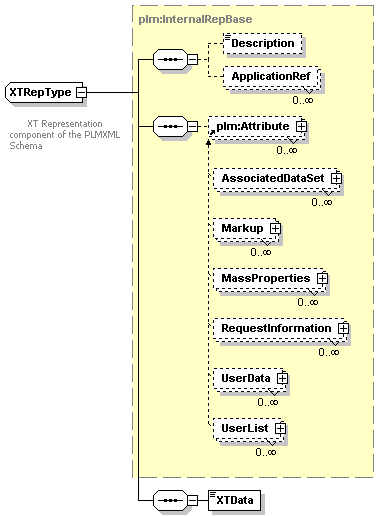 |
||||||||||||||||||
| namespace | http://www.plmxml.org/Schemas/PLMXMLSchema | ||||||||||||||||||
| type | extension of plm:InternalRepBase | ||||||||||||||||||
| children | Description ApplicationRef plm:Attribute XTData | ||||||||||||||||||
| used by |
|
||||||||||||||||||
| attributes |
|
||||||||||||||||||
| annotation |
|
||||||||||||||||||
| source | <xsd:complexType name="XTRepType"> <xsd:annotation> <xsd:documentation> XT Representation component of the PLMXML Schema </xsd:documentation> </xsd:annotation> <xsd:complexContent> <xsd:extension base="plm:InternalRepBase"> <xsd:sequence> <xsd:element name="XTData" type="plm:XTDataType"/> </xsd:sequence> </xsd:extension> </xsd:complexContent> </xsd:complexType> |
| diagram | |
| namespace | http://www.plmxml.org/Schemas/PLMXMLSchema |
| type | plm:XTDataType |
| source | <xsd:element name="XTData" type="plm:XTDataType"/> |
| namespace | http://www.plmxml.org/Schemas/PLMXMLSchema | ||||||
| type | restriction of xsd:NMTOKEN | ||||||
| used by |
|
||||||
| facets |
|
||||||
| annotation |
|
||||||
| source | <xsd:simpleType name="AccessIntentEnum"> <xsd:annotation> <xsd:documentation> Simple Access Control enum. reference: read-only modifiable: read-write noAccess: may not be accessed at all. </xsd:documentation> </xsd:annotation> <xsd:restriction base="xsd:NMTOKEN"> <xsd:enumeration value="reference"/> <xsd:enumeration value="modifiable"/> <xsd:enumeration value="noAccess"/> </xsd:restriction> </xsd:simpleType> |
| namespace | http://www.plmxml.org/Schemas/PLMXMLSchema | ||||
| type | restriction of xsd:float | ||||
| used by |
|
||||
| facets |
|
||||
| source | <xsd:simpleType name="AlphaType"> <xsd:restriction base="xsd:float"> <xsd:minInclusive value="0.0"/> <xsd:maxInclusive value="1.0"/> </xsd:restriction> </xsd:simpleType> |
| namespace | http://www.plmxml.org/Schemas/PLMXMLSchema | ||
| type | restriction of plm:DoubleListType | ||
| used by |
|
||
| facets |
|
||
| source | <xsd:simpleType name="AttenuationType"> <xsd:restriction base="plm:DoubleListType"> <xsd:length value="3"/> </xsd:restriction> </xsd:simpleType> |
| namespace | http://www.plmxml.org/Schemas/PLMXMLSchema | ||||||||||||||
| type | restriction of xsd:NMTOKEN | ||||||||||||||
| used by |
|
||||||||||||||
| facets |
|
||||||||||||||
| annotation |
|
||||||||||||||
| source | <xsd:simpleType name="AttributeClassType"> <xsd:annotation> <xsd:appinfo source="PLMXMLSchemaGenerator">output=ignore</xsd:appinfo> </xsd:annotation> <xsd:restriction base="xsd:NMTOKEN"> <xsd:enumeration value="class_01"/> <xsd:enumeration value="class_02"/> <xsd:enumeration value="class_03"/> <xsd:enumeration value="class_04"/> <xsd:enumeration value="class_05"/> <xsd:enumeration value="class_06"/> <xsd:enumeration value="class_07"/> </xsd:restriction> </xsd:simpleType> |
| namespace | http://www.plmxml.org/Schemas/PLMXMLSchema | ||||||||||||||||||||||||||||
| type | restriction of xsd:NMTOKEN | ||||||||||||||||||||||||||||
| used by |
|
||||||||||||||||||||||||||||
| facets |
|
||||||||||||||||||||||||||||
| annotation |
|
||||||||||||||||||||||||||||
| source | <xsd:simpleType name="AttributeOwnerType"> <xsd:annotation> <xsd:appinfo source="PLMXMLSchemaGenerator">output=ignore</xsd:appinfo> </xsd:annotation> <xsd:restriction base="xsd:NMTOKEN"> <xsd:enumeration value="assembly"/> <xsd:enumeration value="instance"/> <xsd:enumeration value="body"/> <xsd:enumeration value="region"/> <xsd:enumeration value="shell"/> <xsd:enumeration value="face"/> <xsd:enumeration value="loop"/> <xsd:enumeration value="edge"/> <xsd:enumeration value="fin"/> <xsd:enumeration value="vertex"/> <xsd:enumeration value="group"/> <xsd:enumeration value="surface"/> <xsd:enumeration value="curve"/> <xsd:enumeration value="point"/> </xsd:restriction> </xsd:simpleType> |
| namespace | http://www.plmxml.org/Schemas/PLMXMLSchema | ||
| type | restriction of plm:DoubleListType | ||
| facets |
|
||
| source | <xsd:simpleType name="AxisFieldType"> <xsd:restriction base="plm:DoubleListType"> <xsd:length value="6"/> </xsd:restriction> </xsd:simpleType> |
| namespace | http://www.plmxml.org/Schemas/PLMXMLSchema |
| type | list of xsd:boolean |
| source | <xsd:simpleType name="BooleanListType"> <xsd:list itemType="xsd:boolean"/> </xsd:simpleType> |
| namespace | http://www.plmxml.org/Schemas/PLMXMLSchema | ||||
| type | restriction of xsd:NMTOKEN | ||||
| used by |
|
||||
| facets |
|
||||
| source | <xsd:simpleType name="BoundingType"> <xsd:restriction base="xsd:NMTOKEN"> <xsd:enumeration value="box"/> <xsd:enumeration value="sphere"/> </xsd:restriction> </xsd:simpleType> |
| namespace | http://www.plmxml.org/Schemas/PLMXMLSchema | ||
| type | restriction of plm:DoubleListType | ||
| facets |
|
||
| source | <xsd:simpleType name="CoordinateFieldType"> <xsd:restriction base="plm:DoubleListType"> <xsd:length value="3"/> </xsd:restriction> </xsd:simpleType> |
| namespace | http://www.plmxml.org/Schemas/PLMXMLSchema | ||||
| type | restriction of xsd:float | ||||
| used by |
|
||||
| facets |
|
||||
| source | <xsd:simpleType name="CutoffAngleType"> <xsd:restriction base="xsd:float"> <xsd:minInclusive value="0.0"/> <xsd:maxInclusive value="90.0"/> </xsd:restriction> </xsd:simpleType> |
| namespace | http://www.plmxml.org/Schemas/PLMXMLSchema | ||
| type | xsd:string | ||
| used by |
|
||
| source | <xsd:simpleType name="DescriptionType"> <xsd:restriction base="xsd:string"/> </xsd:simpleType> |
| namespace | http://www.plmxml.org/Schemas/PLMXMLSchema | ||
| type | restriction of plm:DoubleListType | ||
| facets |
|
||
| source | <xsd:simpleType name="DirectionFieldType"> <xsd:restriction base="plm:DoubleListType"> <xsd:length value="3"/> </xsd:restriction> </xsd:simpleType> |
| namespace | http://www.plmxml.org/Schemas/PLMXMLSchema | ||
| type | restriction of plm:DoubleListType | ||
| used by |
|
||
| facets |
|
||
| source | <xsd:simpleType name="DirectionType"> <xsd:restriction base="plm:DoubleListType"> <xsd:length value="3"/> </xsd:restriction> </xsd:simpleType> |
| namespace | http://www.plmxml.org/Schemas/PLMXMLSchema | ||||||||
| type | list of xsd:double | ||||||||
| used by |
|
||||||||
| source | <xsd:simpleType name="DoubleListType"> <xsd:list itemType="xsd:double"/> </xsd:simpleType> |
| namespace | http://www.plmxml.org/Schemas/PLMXMLSchema | ||||||||||
| type | restriction of xsd:NMTOKEN | ||||||||||
| used by |
|
||||||||||
| facets |
|
||||||||||
| source | <xsd:simpleType name="DrawingStyleType"> <xsd:restriction base="xsd:NMTOKEN"> <xsd:enumeration value="wireframe"/> <xsd:enumeration value="hidden"/> <xsd:enumeration value="hiddenMarked"/> <xsd:enumeration value="shaded"/> <xsd:enumeration value="shadedWithEdges"/> </xsd:restriction> </xsd:simpleType> |
| namespace | http://www.plmxml.org/Schemas/PLMXMLSchema | ||||||
| type | restriction of xsd:NMTOKEN | ||||||
| used by |
|
||||||
| facets |
|
||||||
| source | <xsd:simpleType name="FacetsetControl"> <xsd:restriction base="xsd:NMTOKEN"> <xsd:enumeration value="unspecified"/> <xsd:enumeration value="perFace"/> <xsd:enumeration value="perMaterial"/> </xsd:restriction> </xsd:simpleType> |
| namespace | http://www.plmxml.org/Schemas/PLMXMLSchema |
| type | list of xsd:float |
| source | <xsd:simpleType name="FloatListType"> <xsd:list itemType="xsd:float"/> </xsd:simpleType> |
| namespace | http://www.plmxml.org/Schemas/PLMXMLSchema | ||
| type | restriction of plm:DoubleListType | ||
| used by |
|
||
| facets |
|
||
| source | <xsd:simpleType name="GeometryParamType"> <xsd:restriction base="plm:DoubleListType"> <xsd:length value="2"/> </xsd:restriction> </xsd:simpleType> |
| namespace | http://www.plmxml.org/Schemas/PLMXMLSchema |
| type | list of plm:IntegerFieldType |
| source | <xsd:simpleType name="IntegerFieldListType"> <xsd:list itemType="plm:IntegerFieldType"/> </xsd:simpleType> |
| namespace | http://www.plmxml.org/Schemas/PLMXMLSchema | ||
| type | xsd:integer | ||
| used by |
|
||
| source | <xsd:simpleType name="IntegerFieldType"> <xsd:restriction base="xsd:integer"/> </xsd:simpleType> |
| namespace | http://www.plmxml.org/Schemas/PLMXMLSchema | ||
| type | list of xsd:integer | ||
| used by |
|
||
| source | <xsd:simpleType name="IntegerListType"> <xsd:list itemType="xsd:integer"/> </xsd:simpleType> |
| namespace | http://www.plmxml.org/Schemas/PLMXMLSchema | ||||
| type | restriction of xsd:float | ||||
| used by |
|
||||
| facets |
|
||||
| source | <xsd:simpleType name="IntensityExponentType"> <xsd:restriction base="xsd:float"> <xsd:minInclusive value="0.0"/> <xsd:maxInclusive value="255.0"/> </xsd:restriction> </xsd:simpleType> |
| namespace | http://www.plmxml.org/Schemas/PLMXMLSchema | ||||
| type | restriction of xsd:NMTOKEN | ||||
| used by |
|
||||
| facets |
|
||||
| annotation |
|
||||
| source | <xsd:simpleType name="LocatorRefFormatType"> <xsd:annotation> <xsd:documentation> Locator reference format. </xsd:documentation> </xsd:annotation> <xsd:restriction base="xsd:NMTOKEN"> <xsd:enumeration value="PLMXMLPointer"/> <xsd:enumeration value="Unregistered"/> </xsd:restriction> </xsd:simpleType> |
| namespace | http://www.plmxml.org/Schemas/PLMXMLSchema | ||||||||||||
| type | restriction of xsd:NMTOKEN | ||||||||||||
| used by |
|
||||||||||||
| facets |
|
||||||||||||
| source | <xsd:simpleType name="LogicalOperationType"> <xsd:restriction base="xsd:NMTOKEN"> <xsd:enumeration value="eq"/> <xsd:enumeration value="ne"/> <xsd:enumeration value="gt"/> <xsd:enumeration value="ge"/> <xsd:enumeration value="lt"/> <xsd:enumeration value="le"/> </xsd:restriction> </xsd:simpleType> |
| namespace | http://www.plmxml.org/Schemas/PLMXMLSchema | ||
| type | restriction of plm:DoubleListType | ||
| used by |
|
||
| facets |
|
||
| source | <xsd:simpleType name="MassPropertyArrayFieldType"> <xsd:restriction base="plm:DoubleListType"> <xsd:length value="3"/> </xsd:restriction> </xsd:simpleType> |
| namespace | http://www.plmxml.org/Schemas/PLMXMLSchema | ||||||||||
| type | restriction of xsd:string | ||||||||||
| used by |
|
||||||||||
| facets |
|
||||||||||
| source | <xsd:simpleType name="MassPropertyUnitType"> <xsd:restriction base="xsd:string"> <xsd:enumeration value="grams,millimetres"> <xsd:annotation> <xsd:appinfo source="PLMXMLSchemaGenerator">sdkname=GramsMillimetres</xsd:appinfo> </xsd:annotation> </xsd:enumeration> <xsd:enumeration value="grams,centimetres"> <xsd:annotation> <xsd:appinfo source="PLMXMLSchemaGenerator">sdkname=GramsCentimetres</xsd:appinfo> </xsd:annotation> </xsd:enumeration> <xsd:enumeration value="kilograms,metres"> <xsd:annotation> <xsd:appinfo source="PLMXMLSchemaGenerator">sdkname=KilogramsMetres</xsd:appinfo> </xsd:annotation> </xsd:enumeration> <xsd:enumeration value="pounds,feet"> <xsd:annotation> <xsd:appinfo source="PLMXMLSchemaGenerator">sdkname=PoundsFeet</xsd:appinfo> </xsd:annotation> </xsd:enumeration> <xsd:enumeration value="pounds,inches"> <xsd:annotation> <xsd:appinfo source="PLMXMLSchemaGenerator">sdkname=PoundsInches</xsd:appinfo> </xsd:annotation> </xsd:enumeration> </xsd:restriction> </xsd:simpleType> |
| namespace | http://www.plmxml.org/Schemas/PLMXMLSchema | ||||
| type | restriction of plm:DoubleListType | ||||
| used by |
|
||||
| facets |
|
||||
| source | <xsd:simpleType name="MatrixType"> <xsd:restriction base="plm:DoubleListType"> <xsd:minLength value="1"/> <xsd:maxLength value="16"/> </xsd:restriction> </xsd:simpleType> |
| namespace | http://www.plmxml.org/Schemas/PLMXMLSchema | ||||||
| type | restriction of xsd:NMTOKEN | ||||||
| used by |
|
||||||
| facets |
|
||||||
| source | <xsd:simpleType name="OptionScopeType"> <xsd:restriction base="xsd:NMTOKEN"> <xsd:enumeration value="public"/> <xsd:enumeration value="private"/> <xsd:enumeration value="legacy"/> </xsd:restriction> </xsd:simpleType> |
| namespace | http://www.plmxml.org/Schemas/PLMXMLSchema | ||||||||||
| type | restriction of xsd:NMTOKEN | ||||||||||
| used by |
|
||||||||||
| facets |
|
||||||||||
| source | <xsd:simpleType name="OptionTypesType"> <xsd:restriction base="xsd:NMTOKEN"> <xsd:enumeration value="enum"/> <xsd:enumeration value="string"/> <xsd:enumeration value="int"/> <xsd:enumeration value="real"/> <xsd:enumeration value="logical"/> </xsd:restriction> </xsd:simpleType> |
| namespace | http://www.plmxml.org/Schemas/PLMXMLSchema | ||||||||||||
| type | restriction of xsd:NMTOKEN | ||||||||||||
| used by |
|
||||||||||||
| facets |
|
||||||||||||
| annotation |
|
||||||||||||
| source | <xsd:simpleType name="PartTypesType"> <xsd:annotation> <xsd:appinfo source="PLMXMLSchemaGenerator">sdkname=PartType</xsd:appinfo> </xsd:annotation> <xsd:restriction base="xsd:NMTOKEN"> <xsd:enumeration value="assembly"/> <xsd:enumeration value="minimal"/> <xsd:enumeration value="wire"/> <xsd:enumeration value="solid"/> <xsd:enumeration value="sheet"/> <xsd:enumeration value="general"/> </xsd:restriction> </xsd:simpleType> |
| namespace | http://www.plmxml.org/Schemas/PLMXMLSchema | ||||||
| type | restriction of xsd:NMTOKEN | ||||||
| used by |
|
||||||
| facets |
|
||||||
| source | <xsd:simpleType name="PreferredPartUnitsType"> <xsd:restriction base="xsd:NMTOKEN"> <xsd:enumeration value="millimetres"/> <xsd:enumeration value="metres"/> <xsd:enumeration value="inches"/> </xsd:restriction> </xsd:simpleType> |
| namespace | http://www.plmxml.org/Schemas/PLMXMLSchema |
| type | plm:DoubleListType |
| source | <xsd:simpleType name="RealFieldListType"> <xsd:restriction base="plm:DoubleListType"/> </xsd:simpleType> |
| namespace | http://www.plmxml.org/Schemas/PLMXMLSchema | ||||
| type | xsd:double | ||||
| used by |
|
||||
| source | <xsd:simpleType name="RealFieldType"> <xsd:restriction base="xsd:double"/> </xsd:simpleType> |
| namespace | http://www.plmxml.org/Schemas/PLMXMLSchema | ||||
| type | restriction of xsd:NMTOKEN | ||||
| used by |
|
||||
| facets |
|
||||
| annotation |
|
||||
| source | <xsd:simpleType name="RefSelectType"> <xsd:annotation> <xsd:documentation> This type describes whether the PLMXML reference is specifying a single entity or a set of entities. </xsd:documentation> </xsd:annotation> <xsd:restriction base="xsd:NMTOKEN"> <xsd:enumeration value="single"/> <xsd:enumeration value="multiple"/> </xsd:restriction> </xsd:simpleType> |
| namespace | http://www.plmxml.org/Schemas/PLMXMLSchema | ||||||||
| type | restriction of xsd:NMTOKEN | ||||||||
| used by |
|
||||||||
| facets |
|
||||||||
| source | <xsd:simpleType name="RepQueryType"> <xsd:restriction base="xsd:NMTOKEN"> <xsd:enumeration value="XT"/> <xsd:enumeration value="JT"/> <xsd:enumeration value="jXT"/> <xsd:enumeration value="All"/> </xsd:restriction> </xsd:simpleType> |
| namespace | http://www.plmxml.org/Schemas/PLMXMLSchema | ||||||||||||||||||||||||||||||||||||||||||||||||||||||||
| type | restriction of xsd:NMTOKEN | ||||||||||||||||||||||||||||||||||||||||||||||||||||||||
| used by |
|
||||||||||||||||||||||||||||||||||||||||||||||||||||||||
| facets |
|
||||||||||||||||||||||||||||||||||||||||||||||||||||||||
| source | <xsd:simpleType name="RepresentationFormatType"> <xsd:restriction base="xsd:NMTOKEN"> <xsd:enumeration value="XT"/> <xsd:enumeration value="eXT"/> <xsd:enumeration value="PLMXML"/> <xsd:enumeration value="jXT"/> <xsd:enumeration value="JT"/> <xsd:enumeration value="XPK"/> <xsd:enumeration value="XGL"/> <xsd:enumeration value="VRML"/> <xsd:enumeration value="STL"/> <xsd:enumeration value="SAT"/> <xsd:enumeration value="STEP"/> <xsd:enumeration value="IGES"/> <xsd:enumeration value="UGBkm"/> <xsd:enumeration value="UGPrt"/> <xsd:enumeration value="SEPrt"/> <xsd:enumeration value="SEAsm"/> <xsd:enumeration value="IdeasPrt"/> <xsd:enumeration value="IdeasAsm"/> <xsd:enumeration value="IdeasIDI"/> <xsd:enumeration value="Cat4Prt"/> <xsd:enumeration value="Cat5Prt"/> <xsd:enumeration value="Cat5Asm"/> <xsd:enumeration value="SWPrt"/> <xsd:enumeration value="SWAsm"/> <xsd:enumeration value="IDI"/> <xsd:enumeration value="TX"/> <xsd:enumeration value="DWG"/> <xsd:enumeration value="Unregistered"/> </xsd:restriction> </xsd:simpleType> |
| namespace | http://www.plmxml.org/Schemas/PLMXMLSchema | ||
| type | xsd:string | ||
| used by |
|
||
| annotation |
|
||
| source | <xsd:simpleType name="RequestIdType"> <xsd:annotation> <xsd:documentation> Request identifier. </xsd:documentation> </xsd:annotation> <xsd:restriction base="xsd:string"/> </xsd:simpleType> |
| namespace | http://www.plmxml.org/Schemas/PLMXMLSchema | ||||||
| type | restriction of xsd:NMTOKEN | ||||||
| used by |
|
||||||
| facets |
|
||||||
| annotation |
|
||||||
| source | <xsd:simpleType name="RequestResultType"> <xsd:annotation> <xsd:documentation> The request return types. </xsd:documentation> </xsd:annotation> <xsd:restriction base="xsd:NMTOKEN"> <xsd:enumeration value="Success"/> <xsd:enumeration value="InvalidRequest"/> <xsd:enumeration value="ContextNotIdentified"/> </xsd:restriction> </xsd:simpleType> |
| namespace | http://www.plmxml.org/Schemas/PLMXMLSchema | ||||||||
| type | restriction of xsd:NMTOKEN | ||||||||
| facets |
|
||||||||
| source | <xsd:simpleType name="RequestSeverityType"> <xsd:restriction base="xsd:NMTOKEN"> <xsd:enumeration value="none"/> <xsd:enumeration value="mild"/> <xsd:enumeration value="severe"/> <xsd:enumeration value="aborted"/> </xsd:restriction> </xsd:simpleType> |
| namespace | http://www.plmxml.org/Schemas/PLMXMLSchema | ||
| type | restriction of plm:RGBFloatListType | ||
| used by |
|
||
| facets |
|
||
| annotation |
|
||
| source | <xsd:simpleType name="RGBAType"> <xsd:annotation> <xsd:documentation> Type representing a colour in Red-Green-Blue-Alpha format. </xsd:documentation> </xsd:annotation> <xsd:restriction base="plm:RGBFloatListType"> <xsd:length value="4"/> </xsd:restriction> </xsd:simpleType> |
| namespace | http://www.plmxml.org/Schemas/PLMXMLSchema | ||
| type | list of plm:RGBFloatType | ||
| used by |
|
||
| source | <xsd:simpleType name="RGBFloatListType"> <xsd:list itemType="plm:RGBFloatType"/> </xsd:simpleType> |
| namespace | http://www.plmxml.org/Schemas/PLMXMLSchema | ||||
| type | restriction of xsd:float | ||||
| used by |
|
||||
| facets |
|
||||
| source | <xsd:simpleType name="RGBFloatType"> <xsd:restriction base="xsd:float"> <xsd:minInclusive value="0.0"/> <xsd:maxInclusive value="1.0"/> </xsd:restriction> </xsd:simpleType> |
| namespace | http://www.plmxml.org/Schemas/PLMXMLSchema | ||
| type | restriction of plm:RGBFloatListType | ||
| used by |
|
||
| facets |
|
||
| annotation |
|
||
| source | <xsd:simpleType name="RGBType"> <xsd:annotation> <xsd:documentation> Type representing a Red-Green-Blue colour. </xsd:documentation> </xsd:annotation> <xsd:restriction base="plm:RGBFloatListType"> <xsd:length value="3"/> </xsd:restriction> </xsd:simpleType> |
| namespace | http://www.plmxml.org/Schemas/PLMXMLSchema | ||||
| type | restriction of xsd:NMTOKEN | ||||
| used by |
|
||||
| facets |
|
||||
| source | <xsd:simpleType name="ShadingStyleType"> <xsd:restriction base="xsd:NMTOKEN"> <xsd:enumeration value="flat"/> <xsd:enumeration value="smooth"/> </xsd:restriction> </xsd:simpleType> |
| namespace | http://www.plmxml.org/Schemas/PLMXMLSchema | ||||
| type | restriction of xsd:float | ||||
| used by |
|
||||
| facets |
|
||||
| source | <xsd:simpleType name="ShininessType"> <xsd:restriction base="xsd:float"> <xsd:minInclusive value="0.0"/> <xsd:maxInclusive value="255.0"/> </xsd:restriction> </xsd:simpleType> |
| namespace | http://www.plmxml.org/Schemas/PLMXMLSchema | ||||||
| type | restriction of xsd:NMTOKEN | ||||||
| used by |
|
||||||
| facets |
|
||||||
| source | <xsd:simpleType name="SplineCurveFormType"> <xsd:restriction base="xsd:NMTOKEN"> <xsd:enumeration value="planar"/> <xsd:enumeration value="general"/> <xsd:enumeration value="unknown"/> </xsd:restriction> </xsd:simpleType> |
| namespace | http://www.plmxml.org/Schemas/PLMXMLSchema | ||||
| type | restriction of xsd:positiveInteger | ||||
| used by |
|
||||
| facets |
|
||||
| source | <xsd:simpleType name="SplineDimensionType"> <xsd:restriction base="xsd:positiveInteger"> <xsd:minInclusive value="2"/> <xsd:maxInclusive value="3"/> </xsd:restriction> </xsd:simpleType> |
| namespace | http://www.plmxml.org/Schemas/PLMXMLSchema |
| type | xsd:string |
| source | <xsd:simpleType name="StringFieldType"> <xsd:restriction base="xsd:string"/> </xsd:simpleType> |
| namespace | http://www.plmxml.org/Schemas/PLMXMLSchema | ||||
| type | restriction of plm:DoubleListType | ||||
| used by |
|
||||
| facets |
|
||||
| annotation |
|
||||
| source | <xsd:simpleType name="TextureCoordDataType"> <xsd:annotation> <xsd:documentation> Texture coordinates </xsd:documentation> </xsd:annotation> <xsd:restriction base="plm:DoubleListType"> <xsd:minLength value="1"/> <xsd:maxLength value="4"/> </xsd:restriction> </xsd:simpleType> |
| namespace | http://www.plmxml.org/Schemas/PLMXMLSchema | ||||||||||
| type | restriction of xsd:NMTOKEN | ||||||||||
| used by |
|
||||||||||
| facets |
|
||||||||||
| annotation |
|
||||||||||
| source | <xsd:simpleType name="TextureDataFormatType"> <xsd:annotation> <xsd:documentation> Basic texture data format definition Determines the length of each data element in the hexBinary data element. RGBA = 4 bytes of red, green, blue and alpha RGB = 3 bytes of red, green and blue LA = 2 bytes of luminance and alpha A = 1 byte of alpha L = 1 byte of luminance </xsd:documentation> </xsd:annotation> <xsd:restriction base="xsd:NMTOKEN"> <xsd:enumeration value="RGBA"/> <xsd:enumeration value="RGB"/> <xsd:enumeration value="LA"/> <xsd:enumeration value="A"/> <xsd:enumeration value="L"/> </xsd:restriction> </xsd:simpleType> |
| namespace | http://www.plmxml.org/Schemas/PLMXMLSchema | ||||||
| type | restriction of xsd:NMTOKEN | ||||||
| used by |
|
||||||
| facets |
|
||||||
| annotation |
|
||||||
| source | <xsd:simpleType name="TextureMapType"> <xsd:annotation> <xsd:documentation> Texture control definition </xsd:documentation> </xsd:annotation> <xsd:restriction base="xsd:NMTOKEN"> <xsd:enumeration value="decal"/> <xsd:enumeration value="modulate"/> <xsd:enumeration value="blend"/> </xsd:restriction> </xsd:simpleType> |
| namespace | http://www.plmxml.org/Schemas/PLMXMLSchema | ||||
| type | restriction of xsd:NMTOKEN | ||||
| used by |
|
||||
| facets |
|
||||
| source | <xsd:simpleType name="TextureSampleType"> <xsd:restriction base="xsd:NMTOKEN"> <xsd:enumeration value="nearest"/> <xsd:enumeration value="linear"/> </xsd:restriction> </xsd:simpleType> |
| namespace | http://www.plmxml.org/Schemas/PLMXMLSchema | ||||
| type | restriction of xsd:NMTOKEN | ||||
| used by |
|
||||
| facets |
|
||||
| source | <xsd:simpleType name="TextureWrapType"> <xsd:restriction base="xsd:NMTOKEN"> <xsd:enumeration value="clamp"/> <xsd:enumeration value="wrap"/> </xsd:restriction> </xsd:simpleType> |
| namespace | http://www.plmxml.org/Schemas/PLMXMLSchema | ||||||||||
| type | restriction of xsd:NMTOKEN | ||||||||||
| used by |
|
||||||||||
| facets |
|
||||||||||
| source | <xsd:simpleType name="TransformationType"> <xsd:restriction base="xsd:NMTOKEN"> <xsd:enumeration value="general"/> <xsd:enumeration value="general3"/> <xsd:enumeration value="rotate"/> <xsd:enumeration value="translate"/> <xsd:enumeration value="scale"/> </xsd:restriction> </xsd:simpleType> |
| namespace | http://www.plmxml.org/Schemas/PLMXMLSchema | ||||||
| type | restriction of xsd:NMTOKEN | ||||||
| used by |
|
||||||
| facets |
|
||||||
| source | <xsd:simpleType name="TristripControl"> <xsd:restriction base="xsd:NMTOKEN"> <xsd:enumeration value="facets"/> <xsd:enumeration value="tristrips"/> <xsd:enumeration value="facetsAndTristrips"/> </xsd:restriction> </xsd:simpleType> |
| namespace | http://www.plmxml.org/Schemas/PLMXMLSchema | ||||
| type | list of plm:anyURIType | ||||
| used by |
|
||||
| source | <xsd:simpleType name="uriReferenceListType"> <xsd:list itemType="plm:anyURIType"/> </xsd:simpleType> |
| namespace | http://www.plmxml.org/Schemas/PLMXMLSchema | ||||||||||||||||||||
| type | restriction of xsd:NMTOKEN | ||||||||||||||||||||
| used by |
|
||||||||||||||||||||
| facets |
|
||||||||||||||||||||
| annotation |
|
||||||||||||||||||||
| source | <xsd:simpleType name="UserValueDataType"> <xsd:annotation> <xsd:documentation> Basic types that can be represented by user value entries and tables. int = Data entity is an integer ints = Data entity is a list of integers real = Data entity is a real reals = Data entity is a list of reals boolean = Data entity is a boolean (true/false) booleans = Data entity is a list of booleans reference = Data entity is a reference (anyURI) enum = Data entity is an enumeration. list = Data entity is a list item. </xsd:documentation> </xsd:annotation> <xsd:restriction base="xsd:NMTOKEN"> <xsd:enumeration value="int"/> <xsd:enumeration value="ints"/> <xsd:enumeration value="real"/> <xsd:enumeration value="reals"/> <xsd:enumeration value="boolean"/> <xsd:enumeration value="booleans"/> <xsd:enumeration value="string"/> <xsd:enumeration value="reference"/> <xsd:enumeration value="enum"/> <xsd:enumeration value="list"/> </xsd:restriction> </xsd:simpleType> |
| namespace | http://www.plmxml.org/Schemas/PLMXMLSchema | ||
| type | restriction of plm:DoubleListType | ||
| used by |
|
||
| facets |
|
||
| source | <xsd:simpleType name="VectorFieldType"> <xsd:restriction base="plm:DoubleListType"> <xsd:length value="3"/> </xsd:restriction> </xsd:simpleType> |
| namespace | http://www.plmxml.org/Schemas/PLMXMLSchema | ||||||
| type | restriction of plm:DoubleListType | ||||||
| used by |
|
||||||
| facets |
|
||||||
| source | <xsd:simpleType name="VectorType"> <xsd:restriction base="plm:DoubleListType"> <xsd:length value="3"/> </xsd:restriction> </xsd:simpleType> |
| namespace | http://www.plmxml.org/Schemas/PLMXMLSchema | ||
| type | restriction of plm:DoubleListType | ||
| used by |
|
||
| facets |
|
||
| source | <xsd:simpleType name="ViewPortCornerType"> <xsd:restriction base="plm:DoubleListType"> <xsd:length value="2"/> </xsd:restriction> </xsd:simpleType> |
| namespace | http://www.plmxml.org/Schemas/PLMXMLSchema | ||
| type | xsd:string | ||
| used by |
|
||
| annotation |
|
||
| source | <xsd:simpleType name="XTDataType"> <xsd:annotation> <xsd:documentation> This class represents the <XTData> element in a PLMXML file, which is used to embed XT files in a Representation element, for example: <Representation ...> <XTRep> <XTData>T51 : TRANSMIT FILE created by modeller version 130021217 SCH_1300212_130060 12 1 63 2 3 0 0 0 0 1e3 1e-8 0 0 0 1 0 1 1 4 5 6 7 8 9 10 81 1 2 63 11 1 0 0 0 0 1 ... </XTData> </XTRep> </Representation> </xsd:documentation> </xsd:annotation> <xsd:restriction base="xsd:string"/> </xsd:simpleType> |
| namespace | http://www.plmxml.org/Schemas/PLMXMLSchema | ||||||||||||
| used by |
|
||||||||||||
| attributes |
|
||||||||||||
| annotation |
|
||||||||||||
| source | <xsd:attributeGroup name="idGroup"> <xsd:annotation> <xsd:documentation> The 'id' attribute is used for references between elements. It should not be use to encode other information. </xsd:documentation> </xsd:annotation> <xsd:attribute name="id" type="xsd:ID" use="optional"/> </xsd:attributeGroup> |
| namespace | http://www.plmxml.org/Schemas/PLMXMLSchema | ||||||||||||
| used by |
|
||||||||||||
| attributes |
|
||||||||||||
| source | <xsd:attributeGroup name="MassPropertyGroup"> <xsd:attribute name="error" type="plm:RealFieldType" use="optional"/> </xsd:attributeGroup> |
| namespace | http://www.plmxml.org/Schemas/PLMXMLSchema | ||||||||||||||||||
| used by |
|
||||||||||||||||||
| attributes |
|
||||||||||||||||||
| source | <xsd:attributeGroup name="referenceGroup"> <xsd:attribute name="location" type="plm:anyURIType" use="optional"/> <xsd:attribute name="load" type="xsd:boolean" default="false"/> </xsd:attributeGroup> |